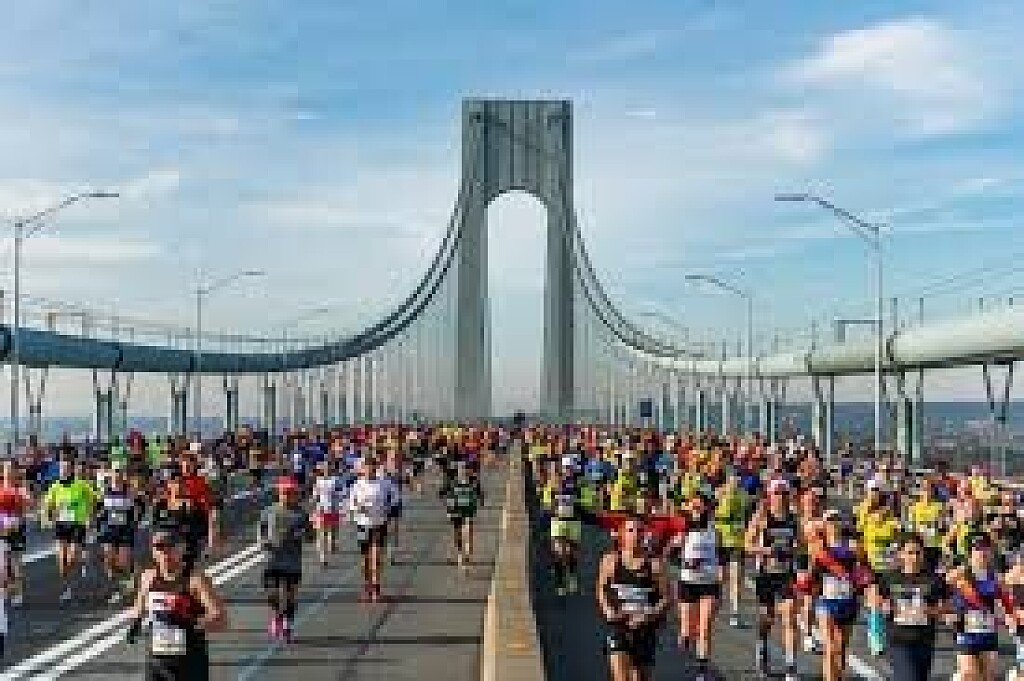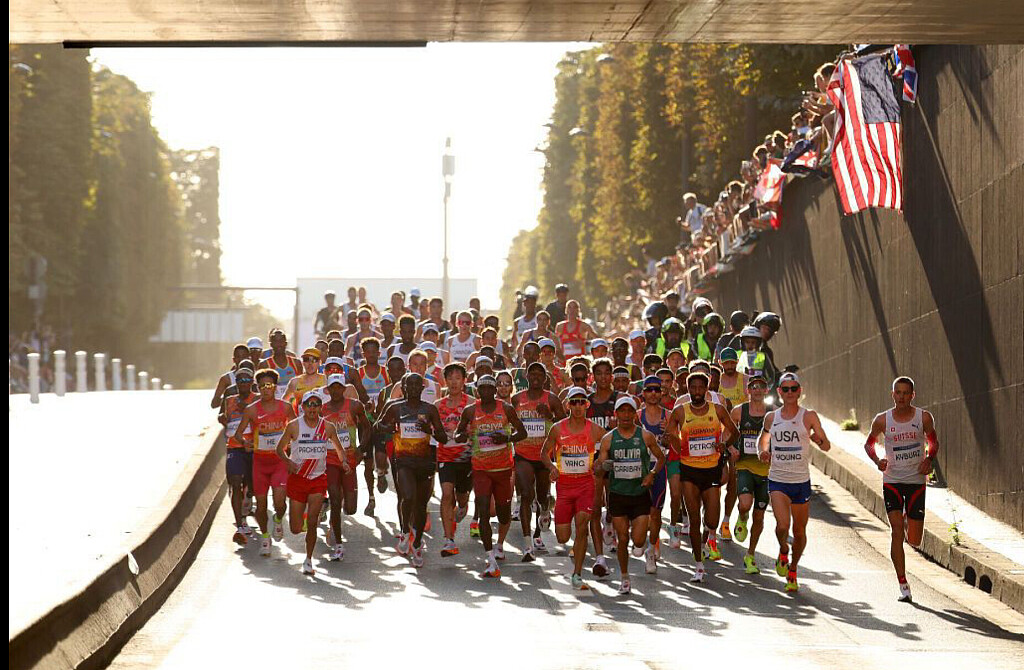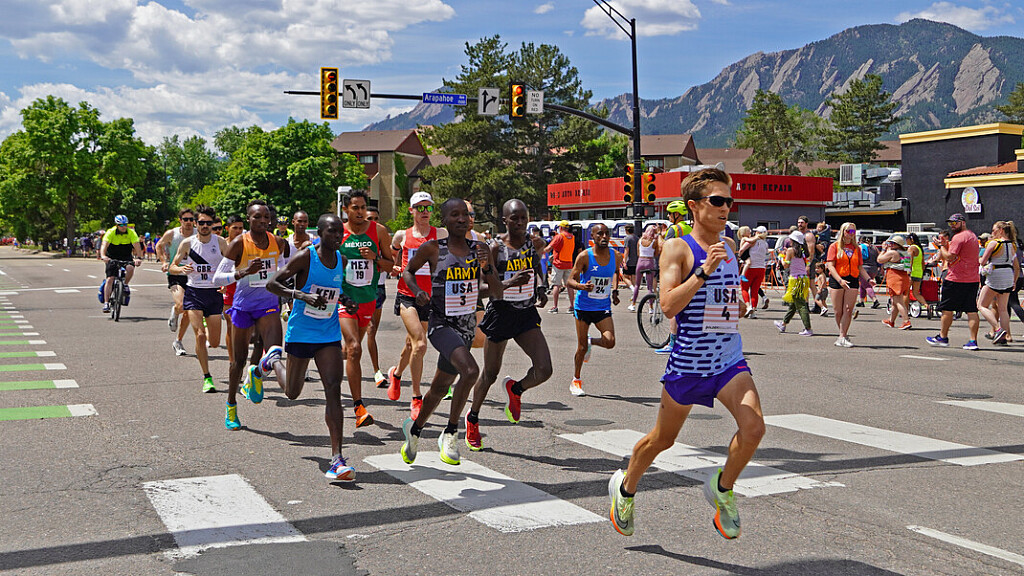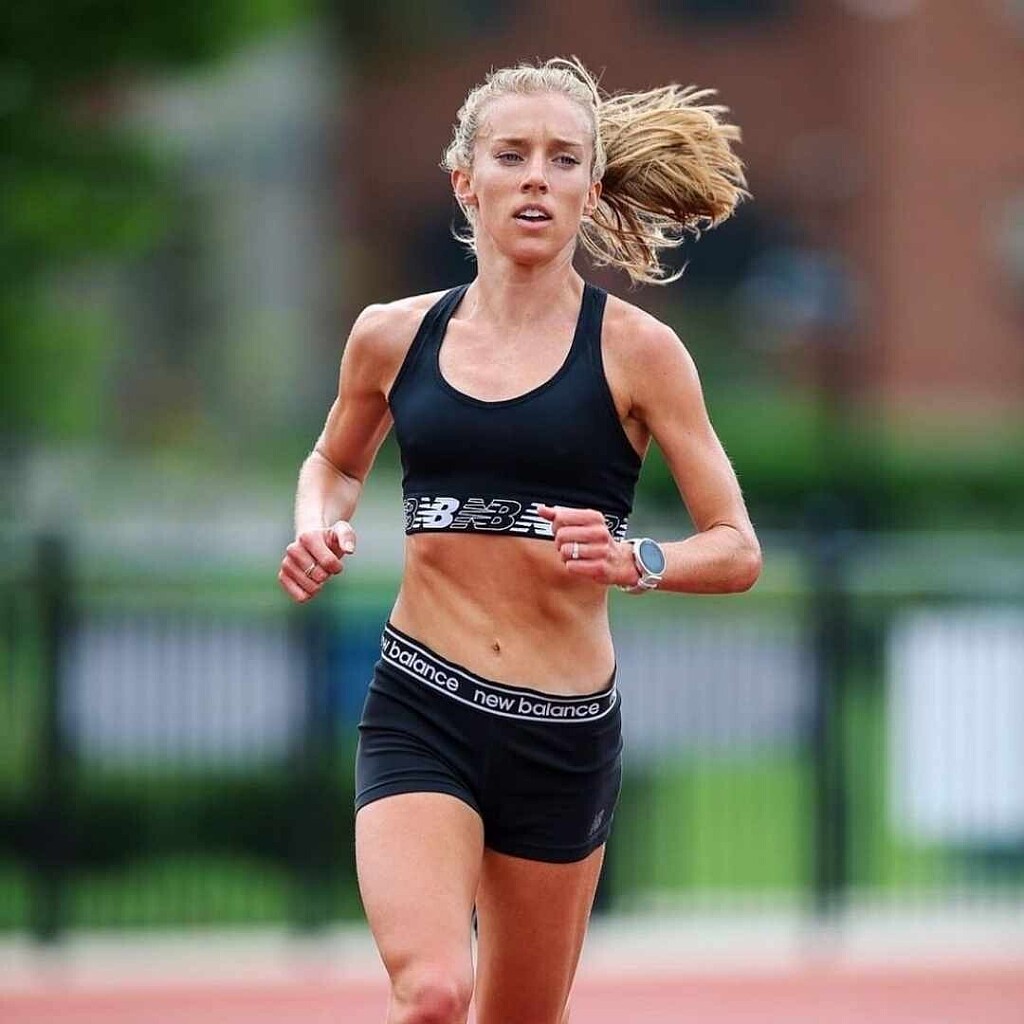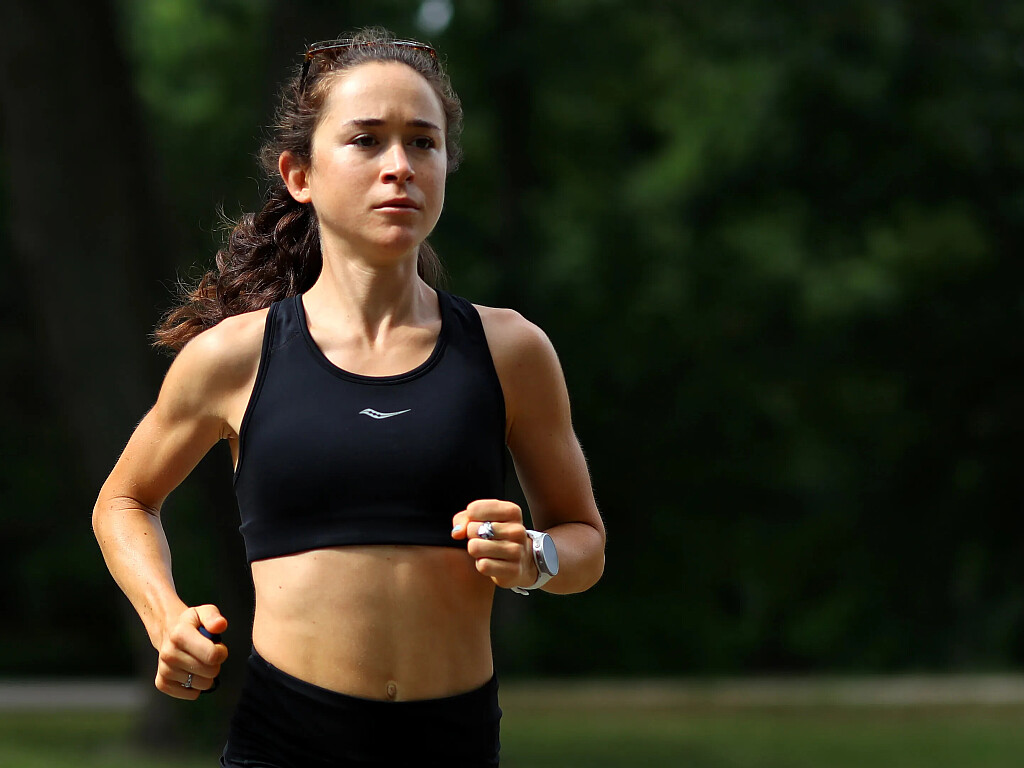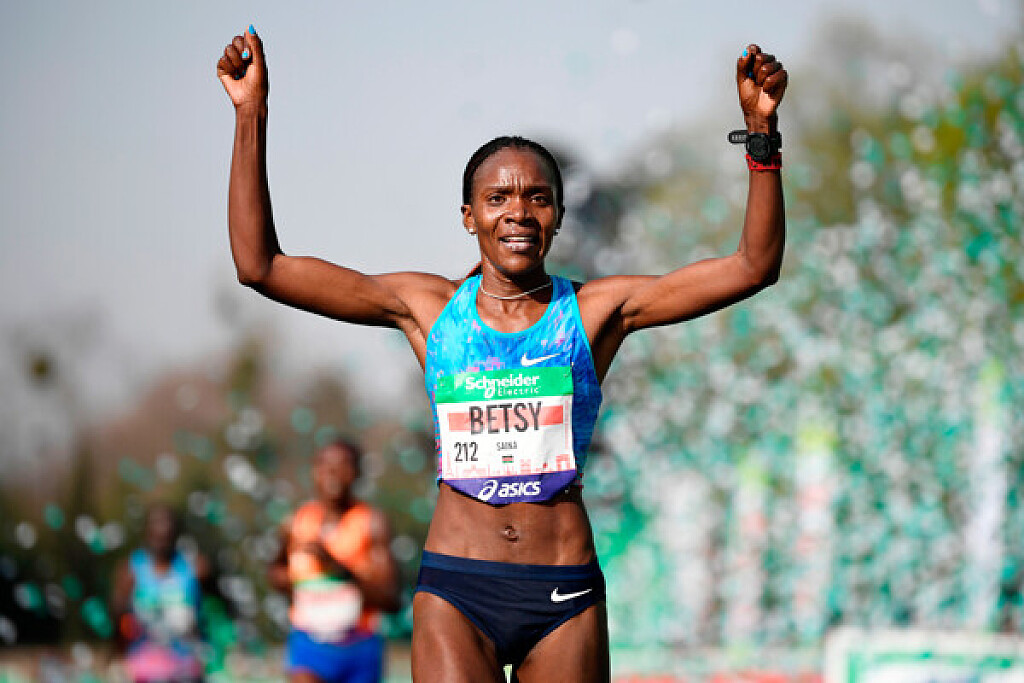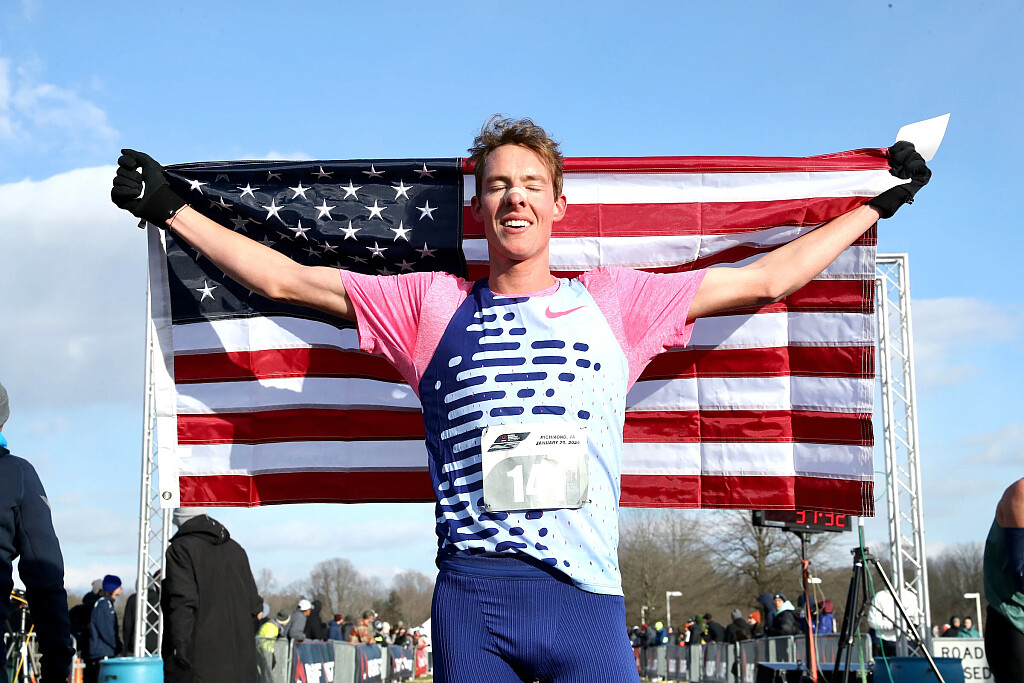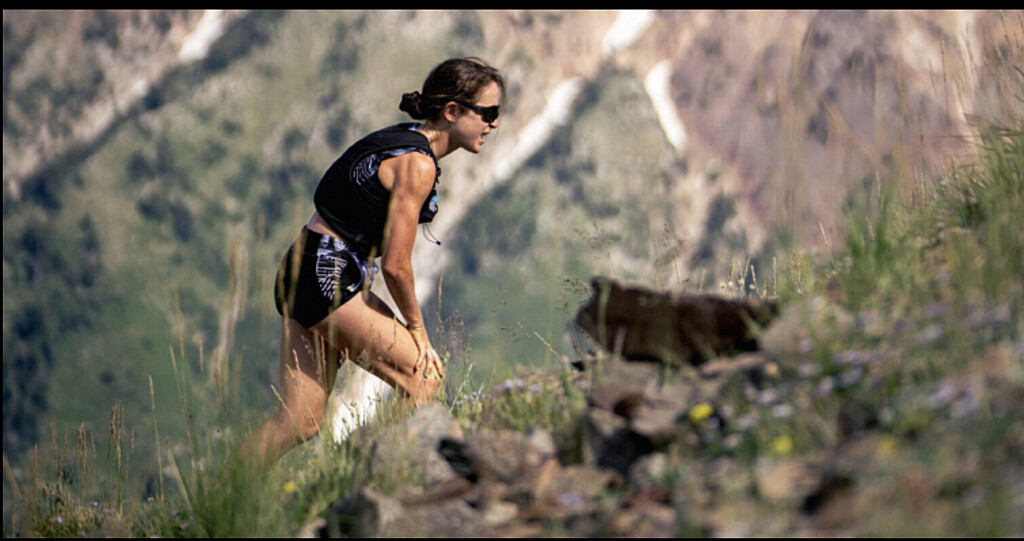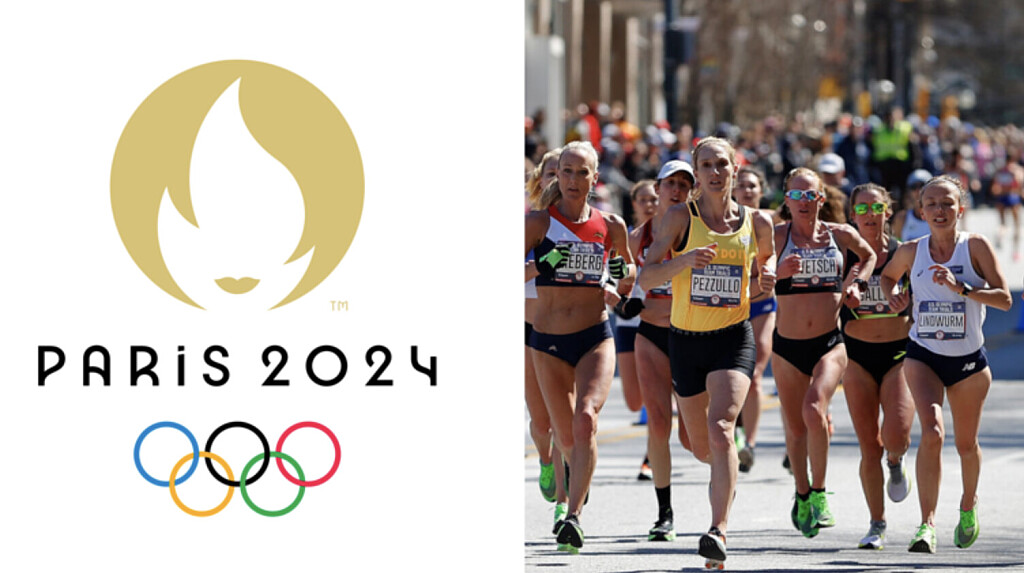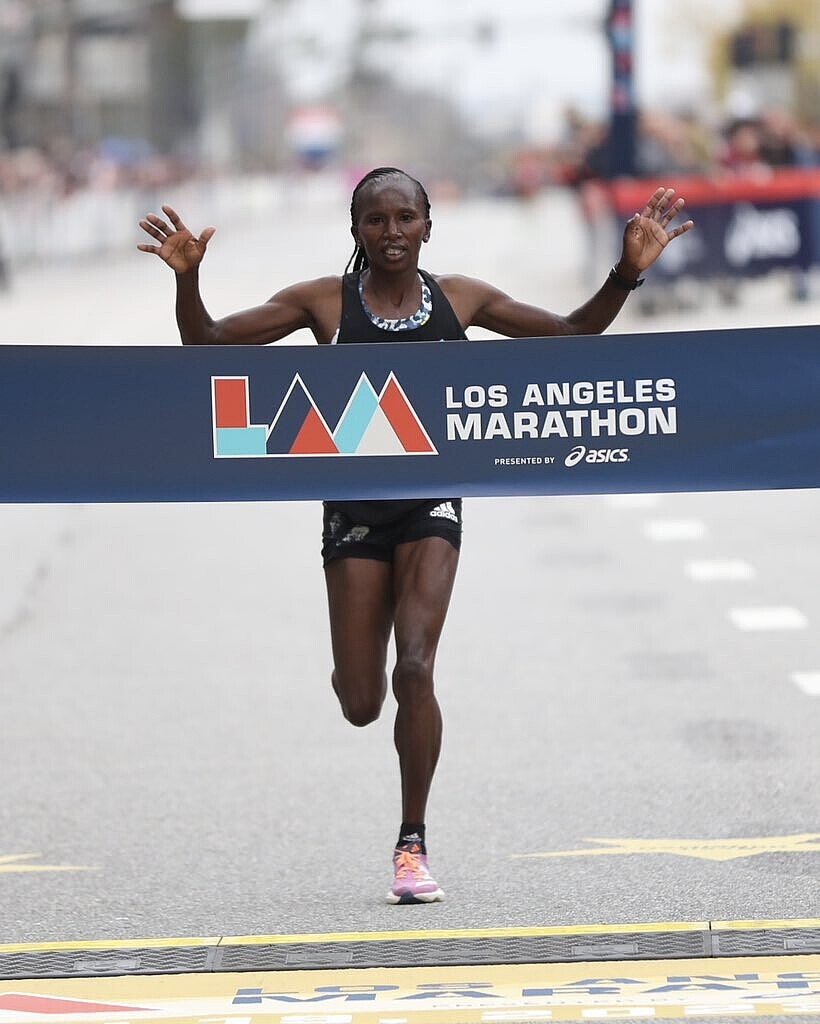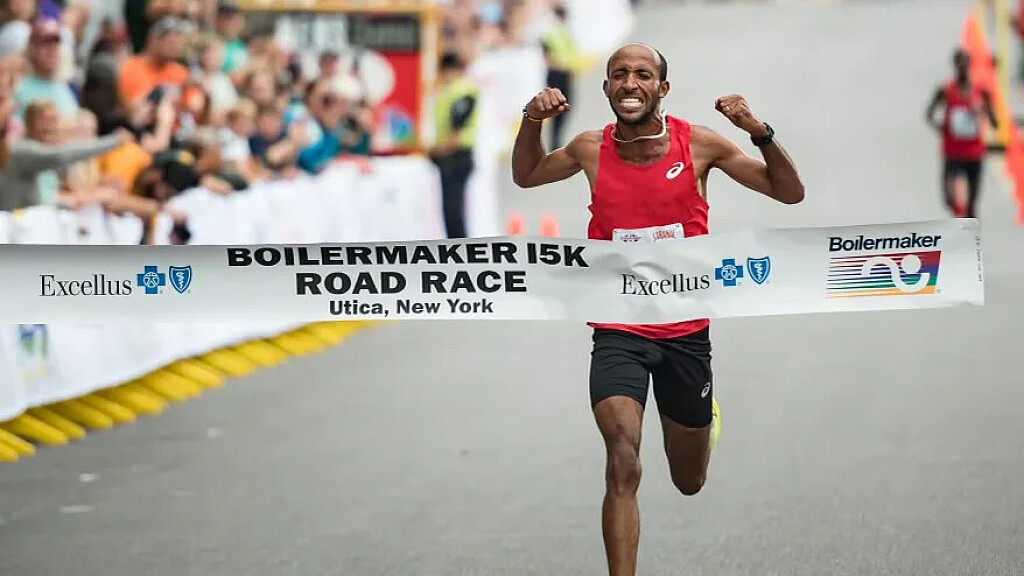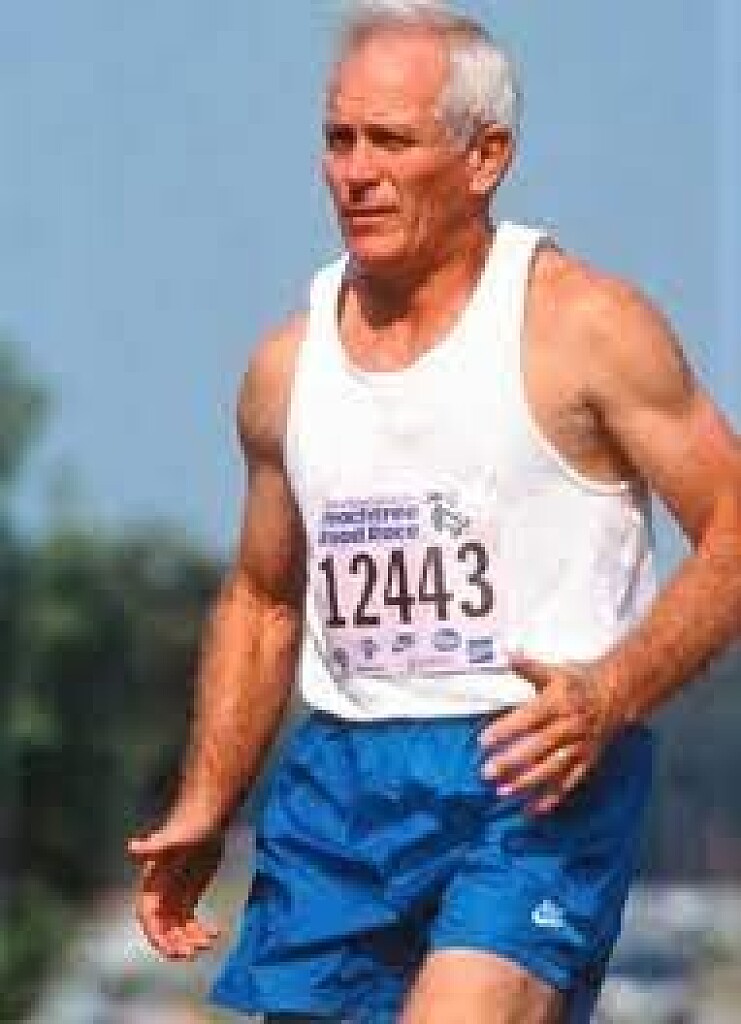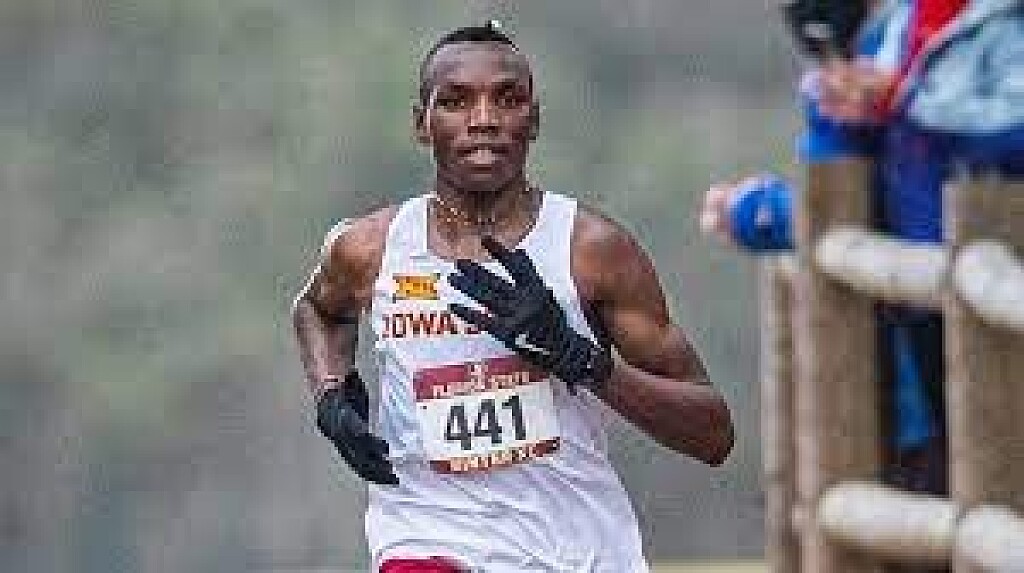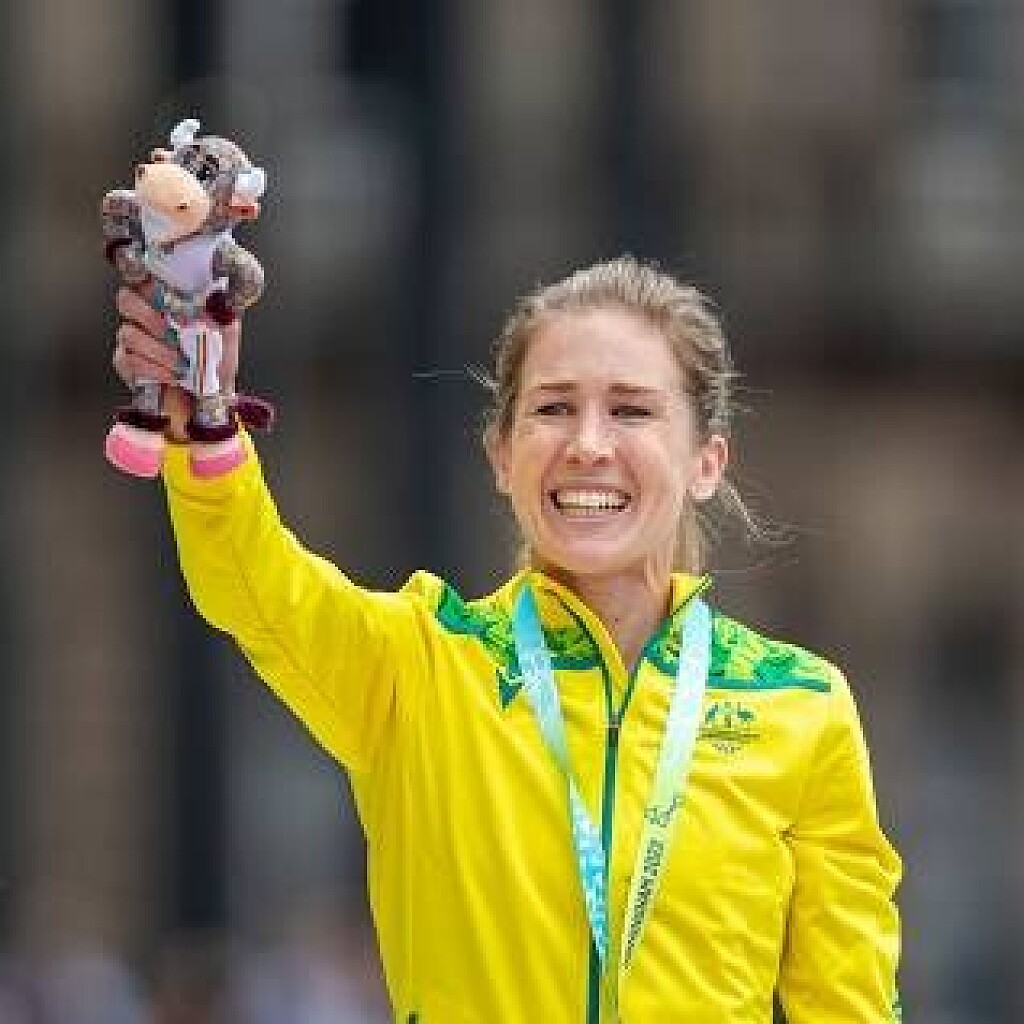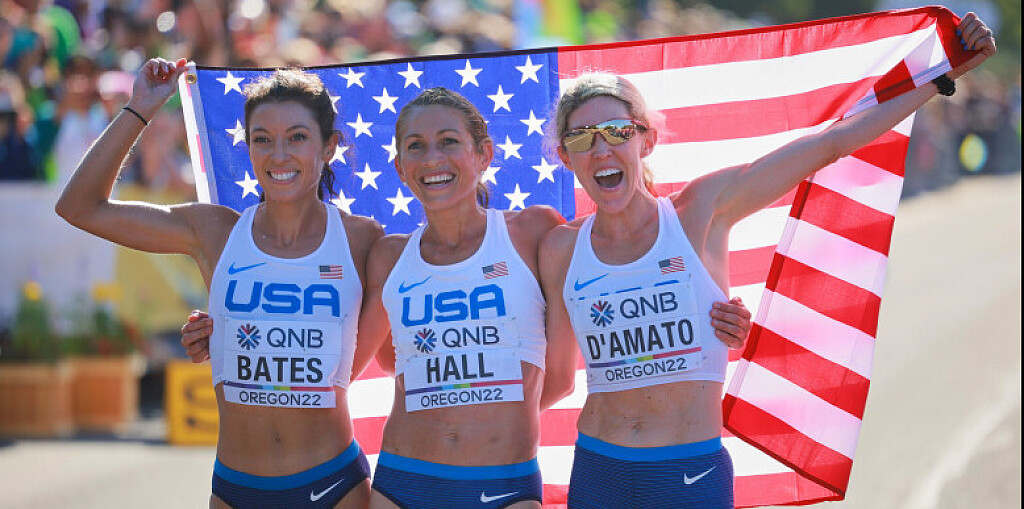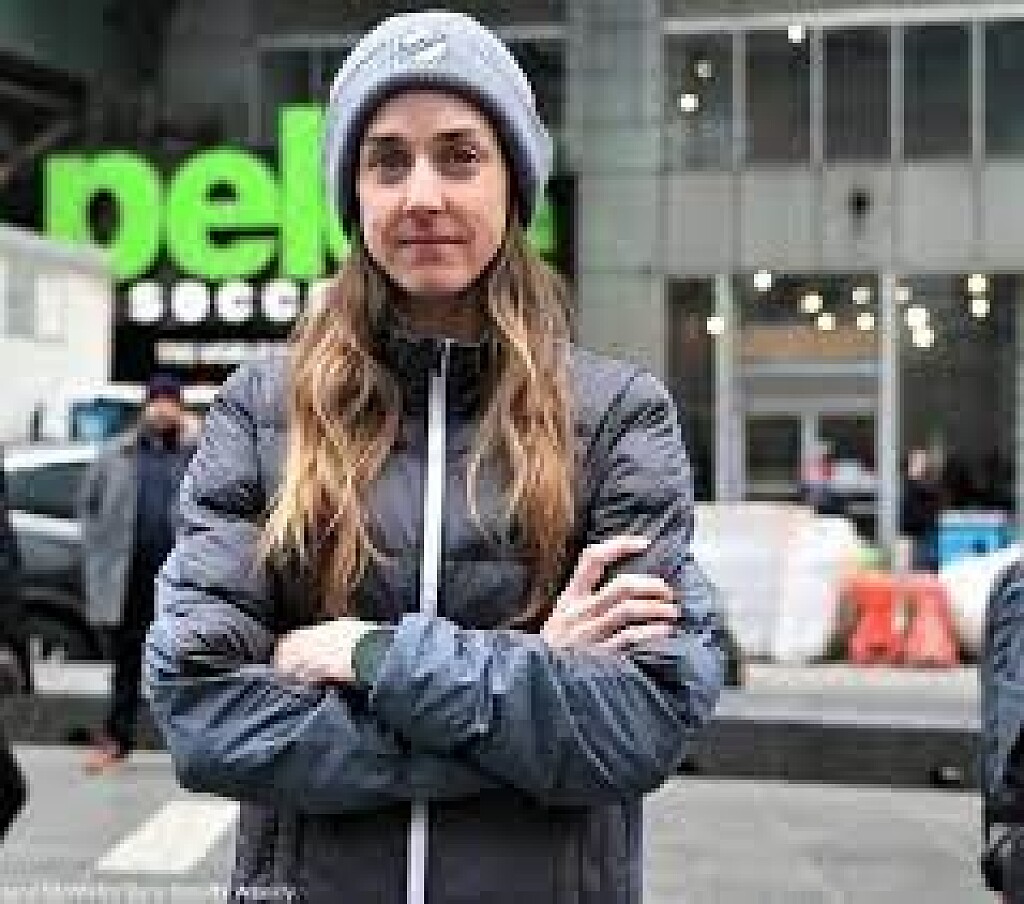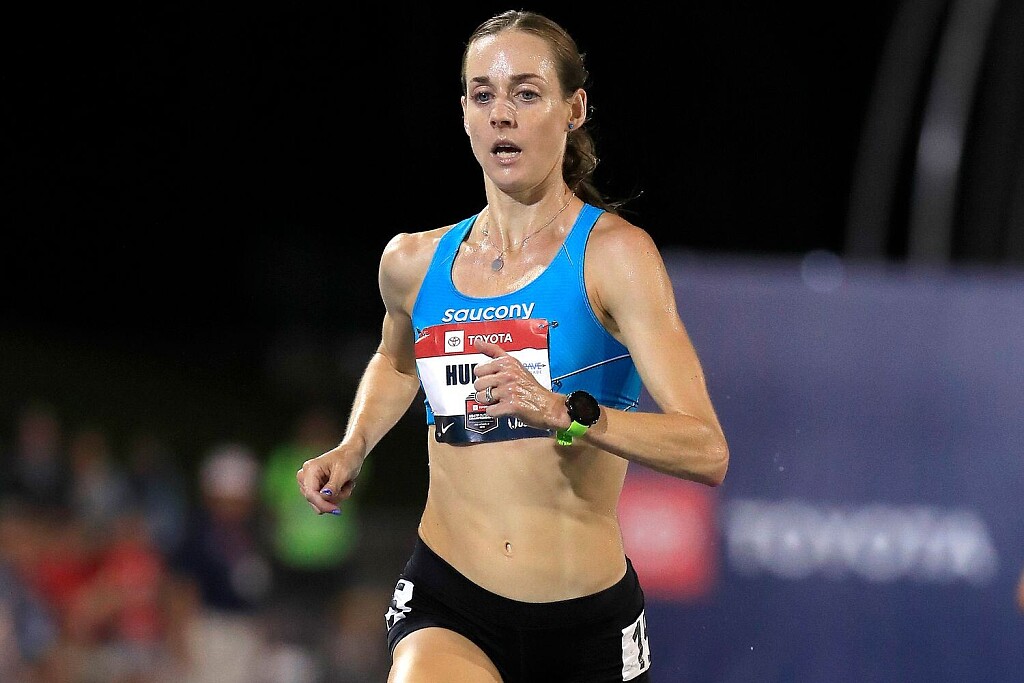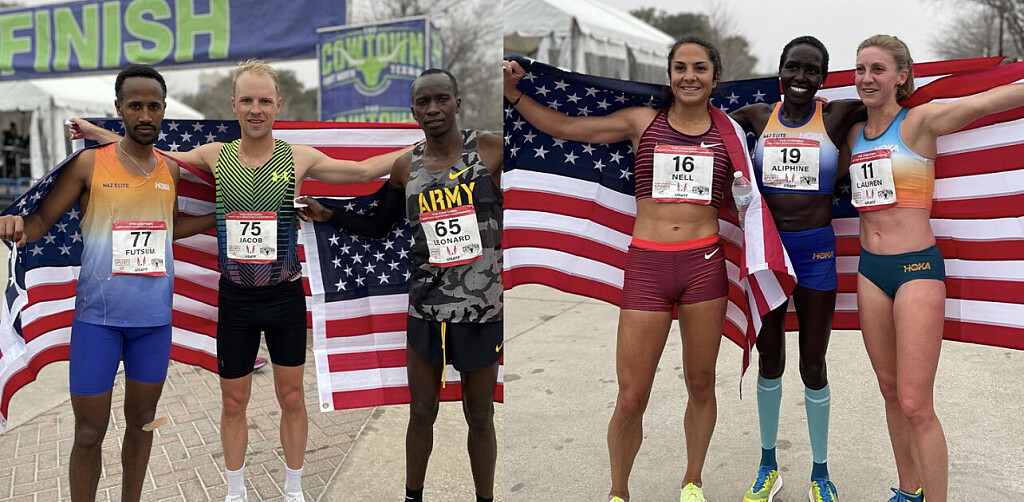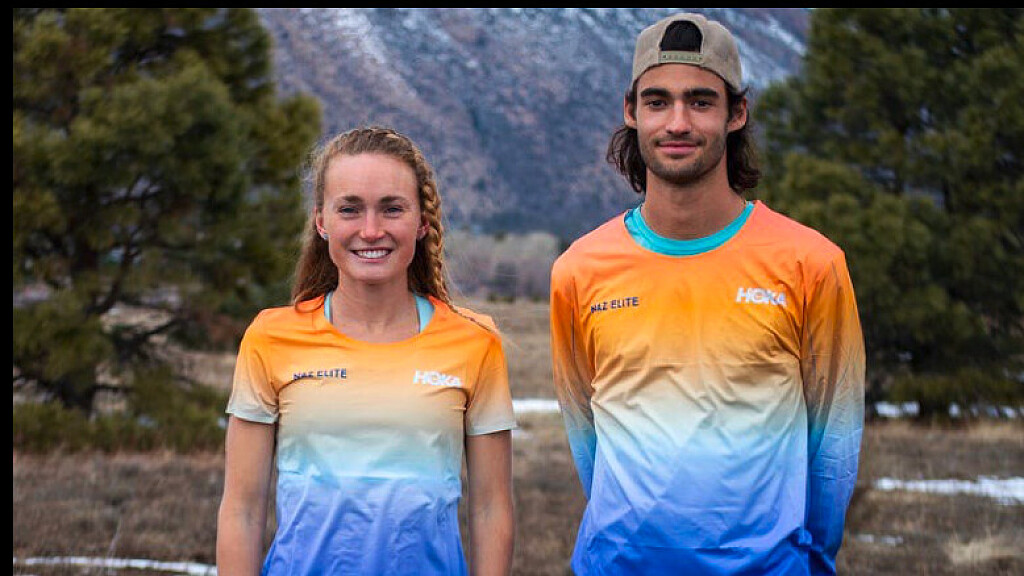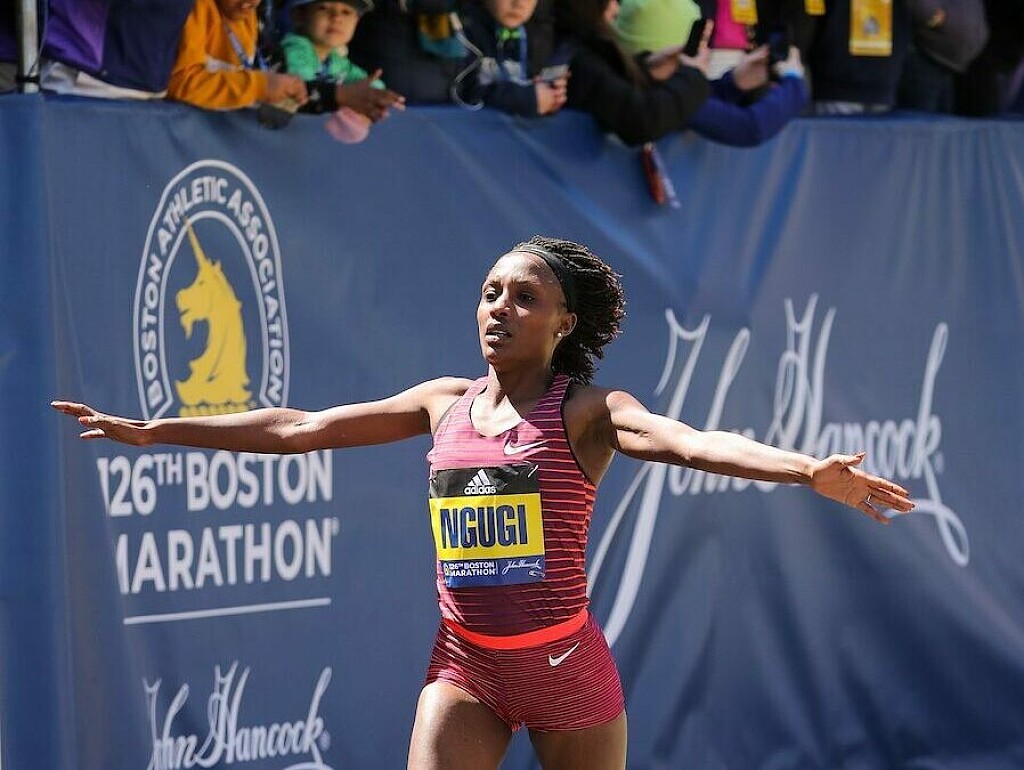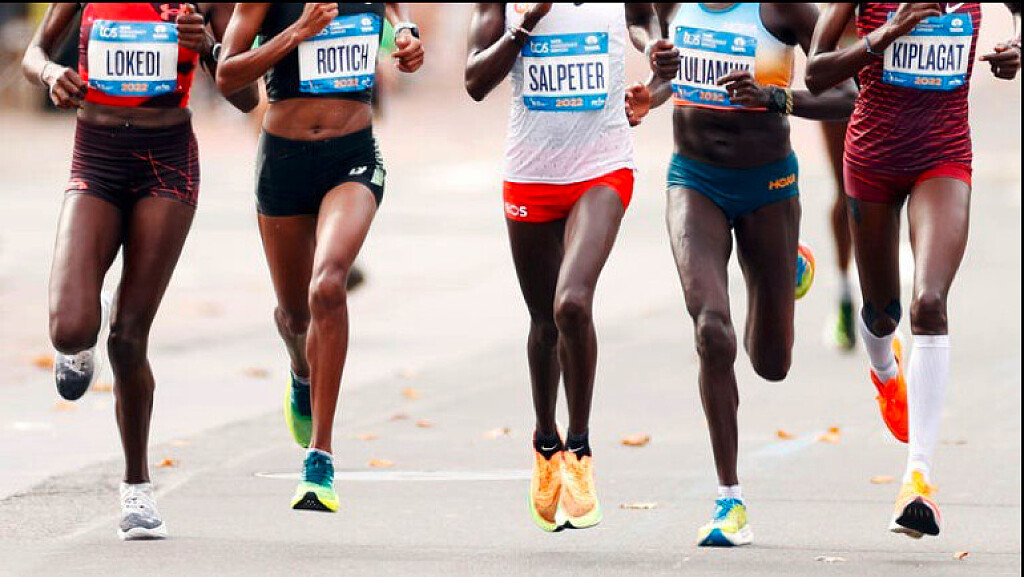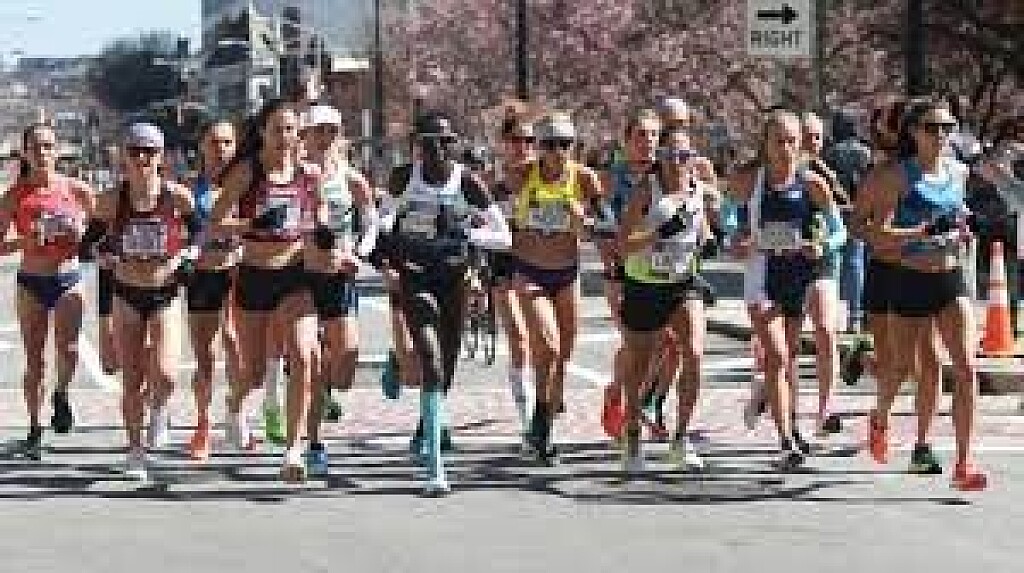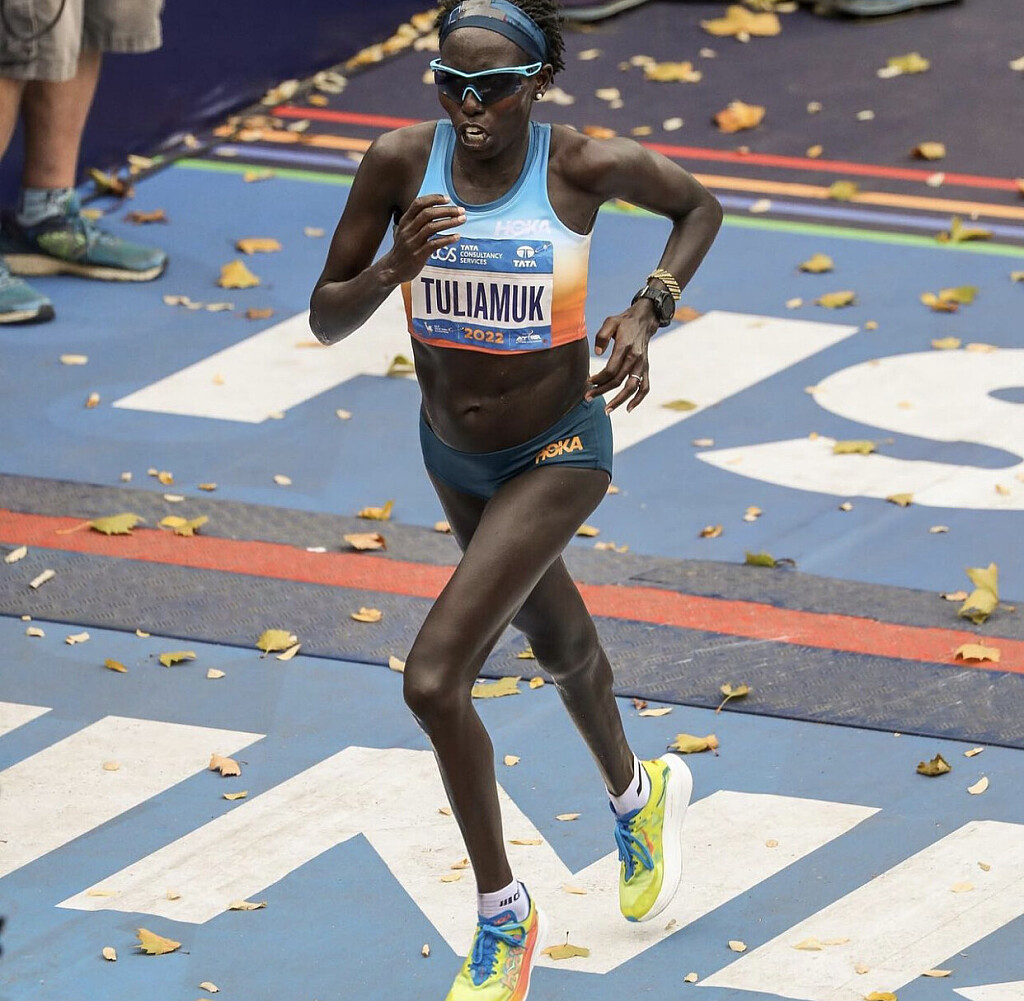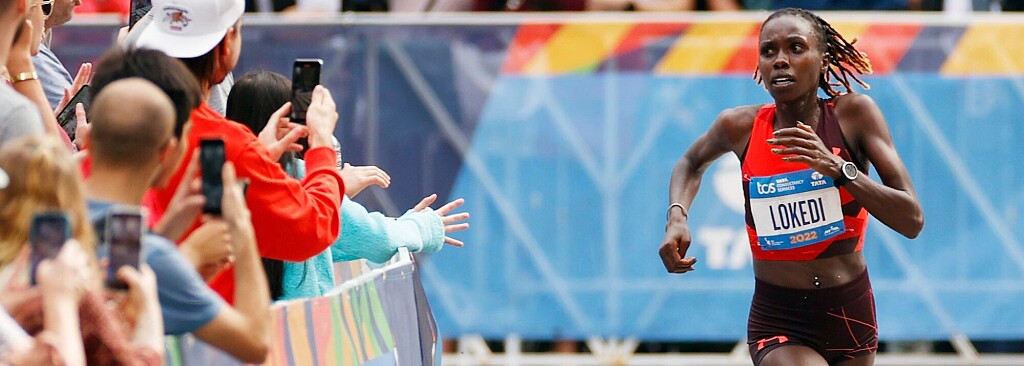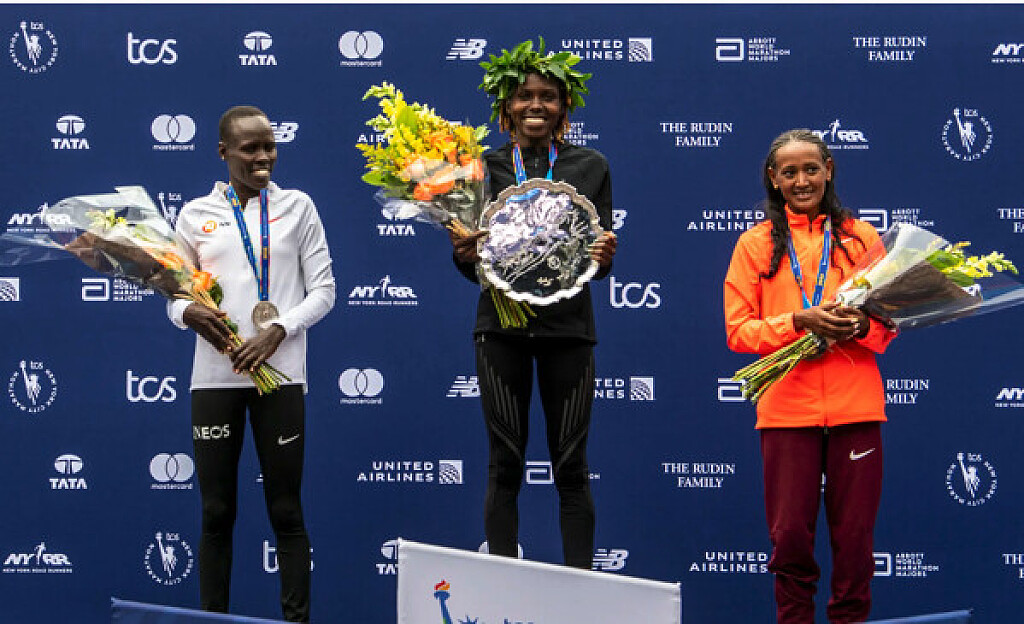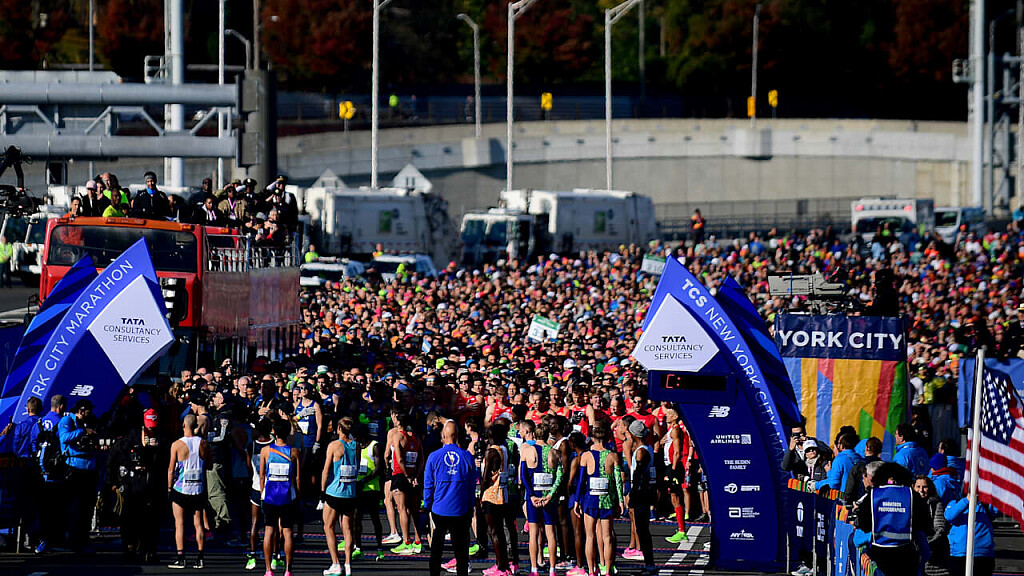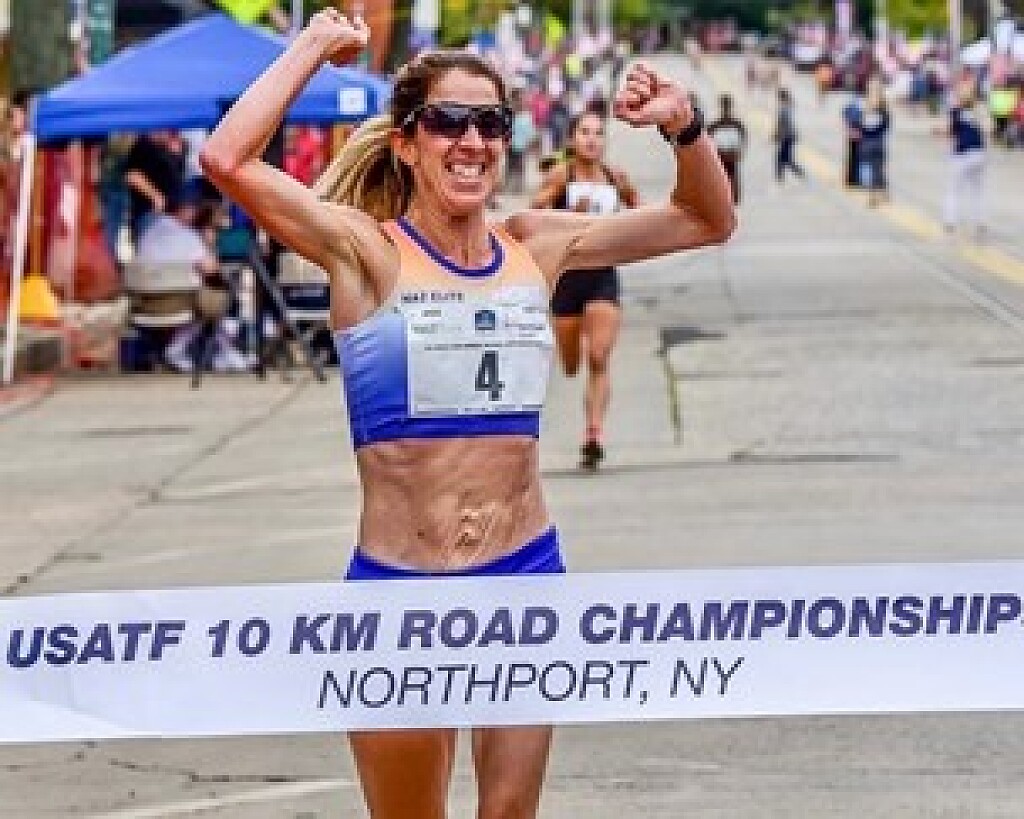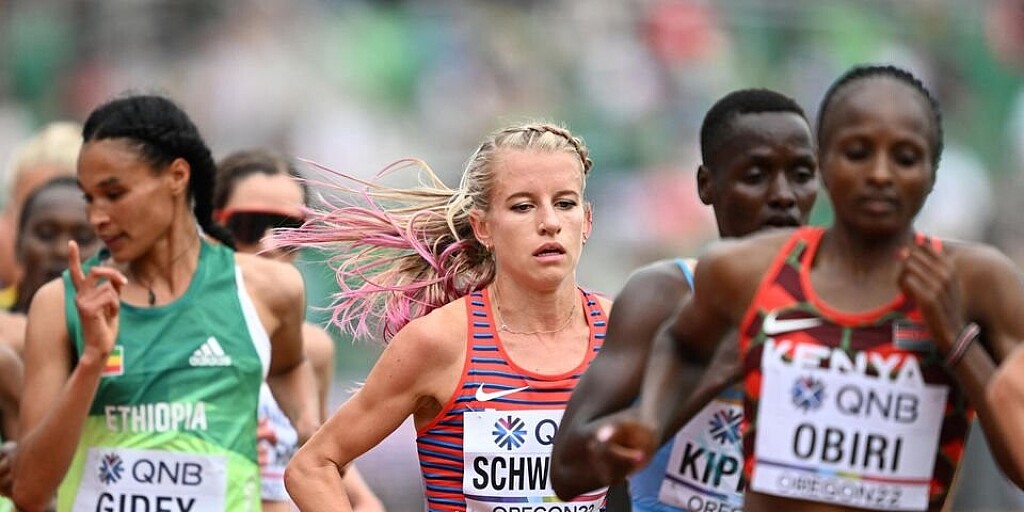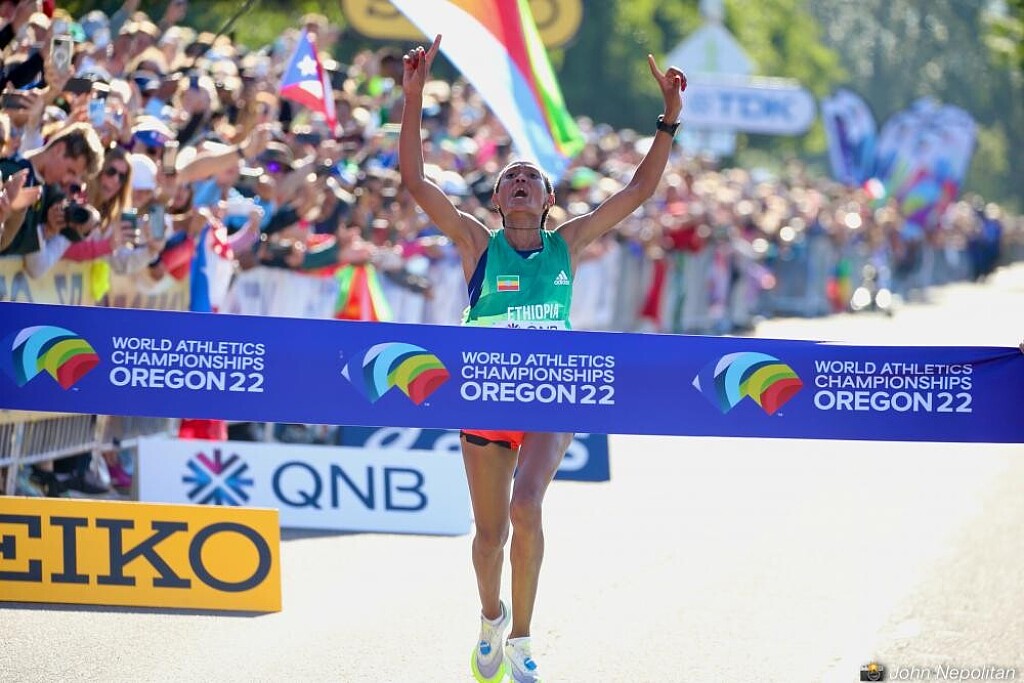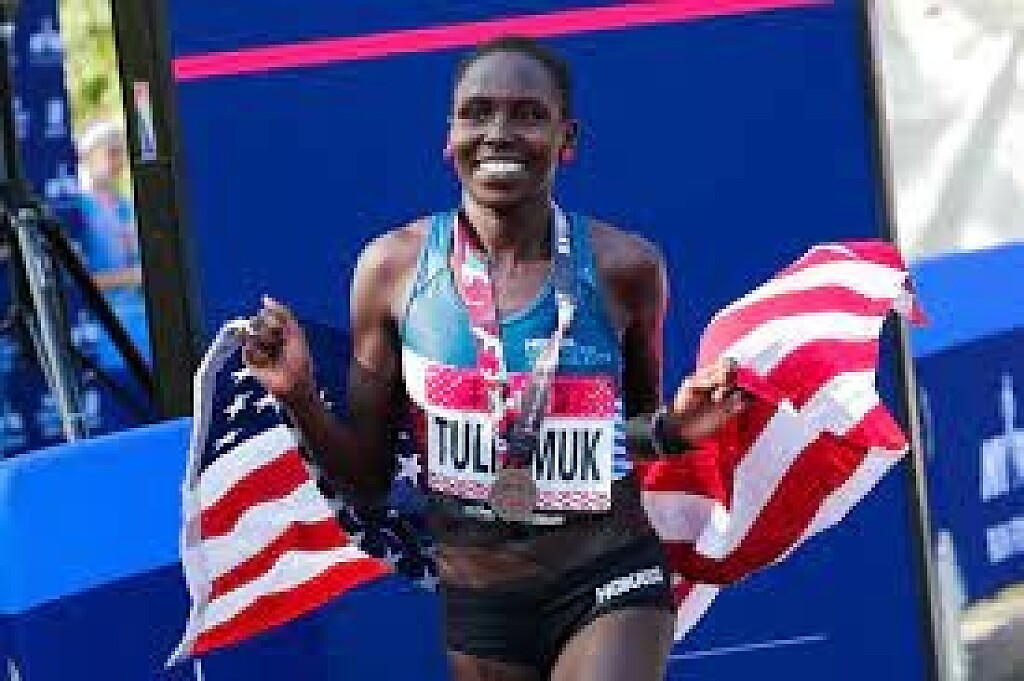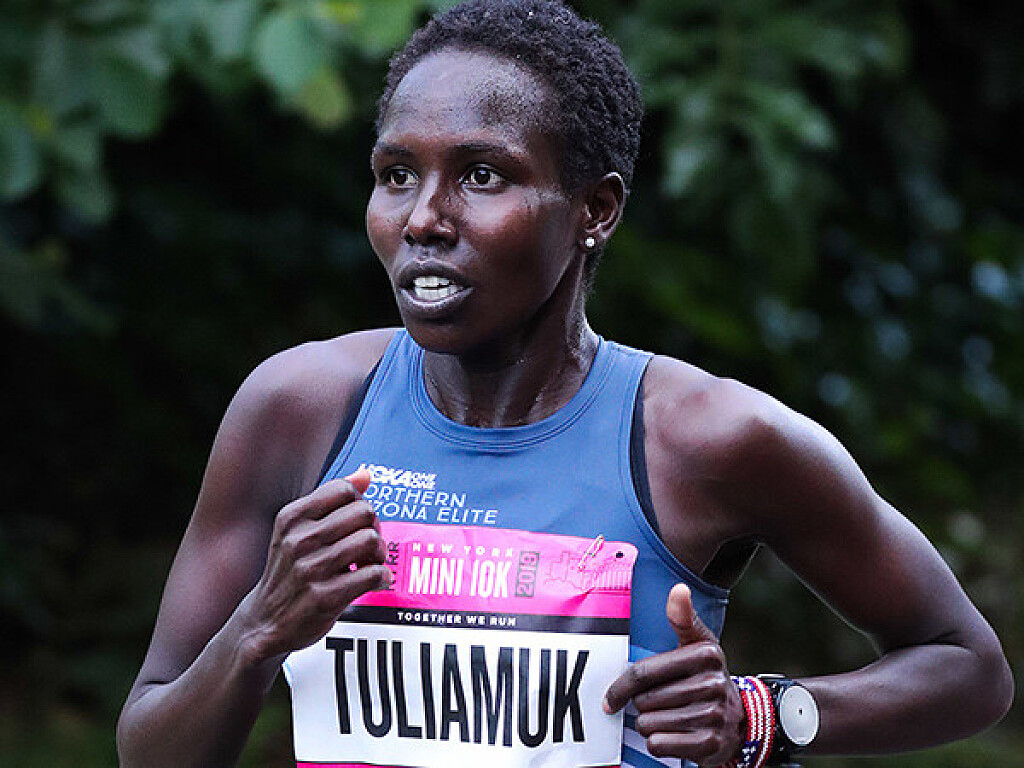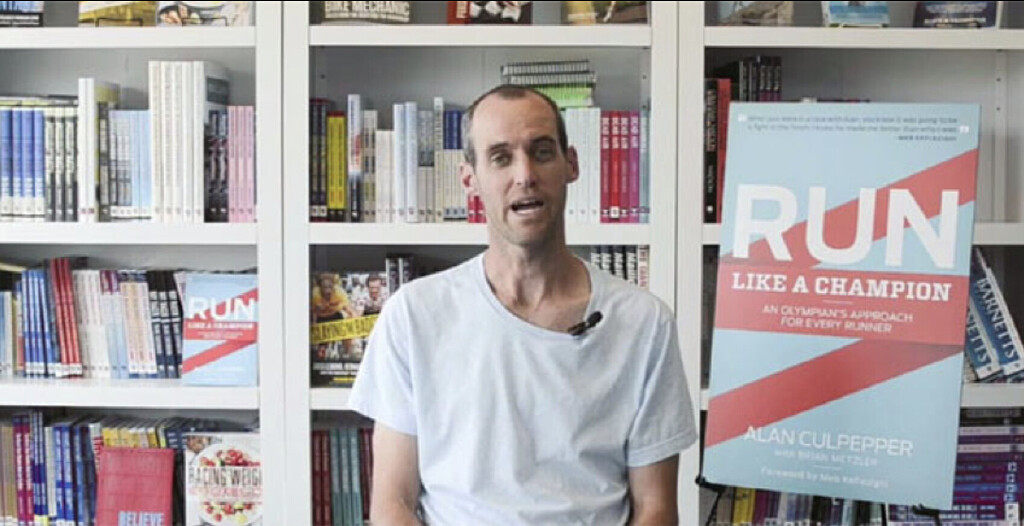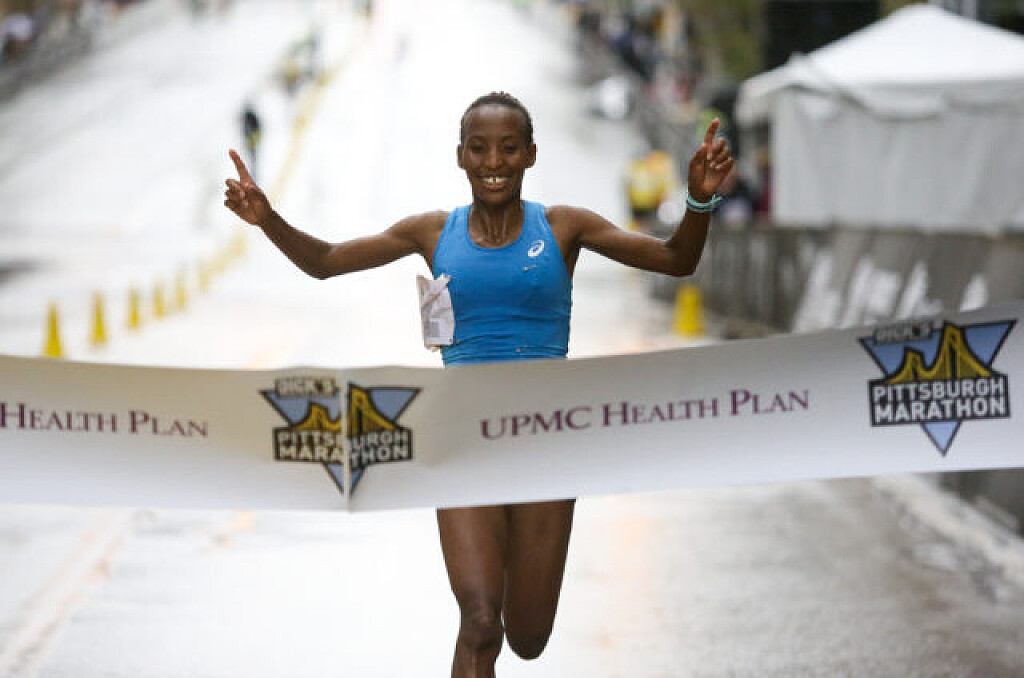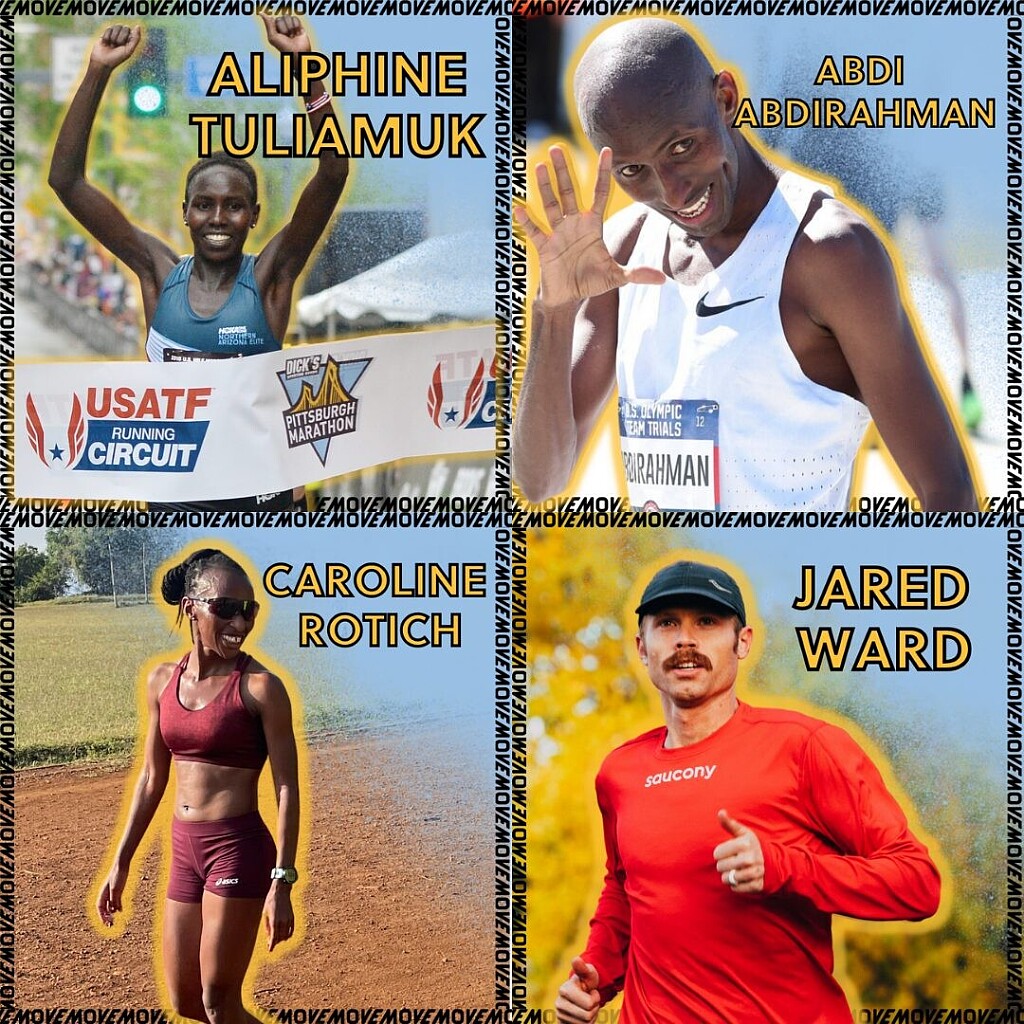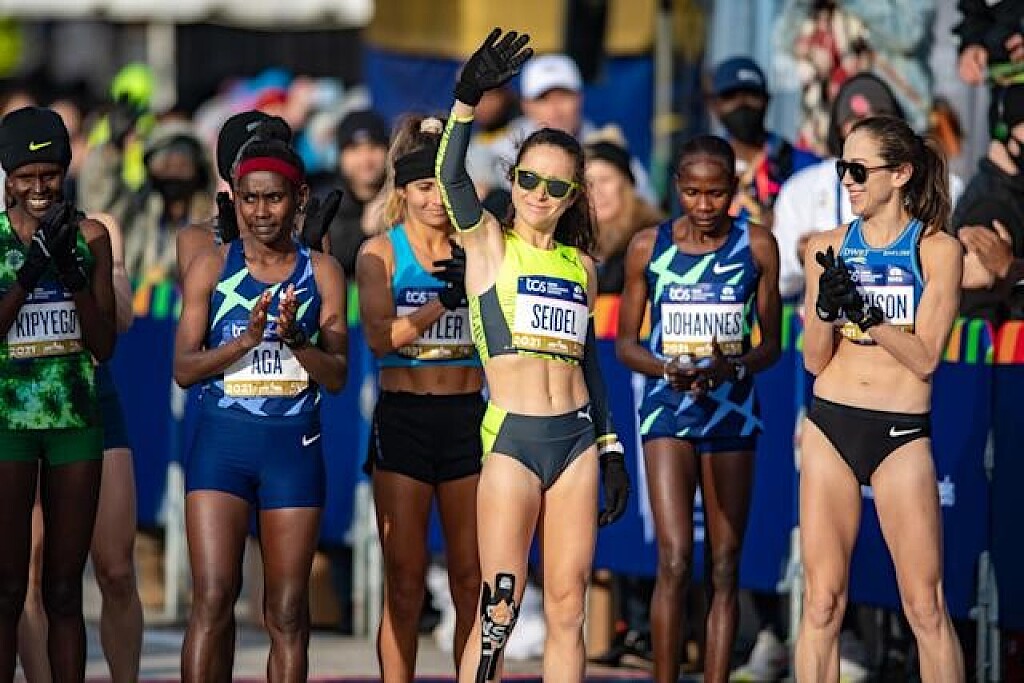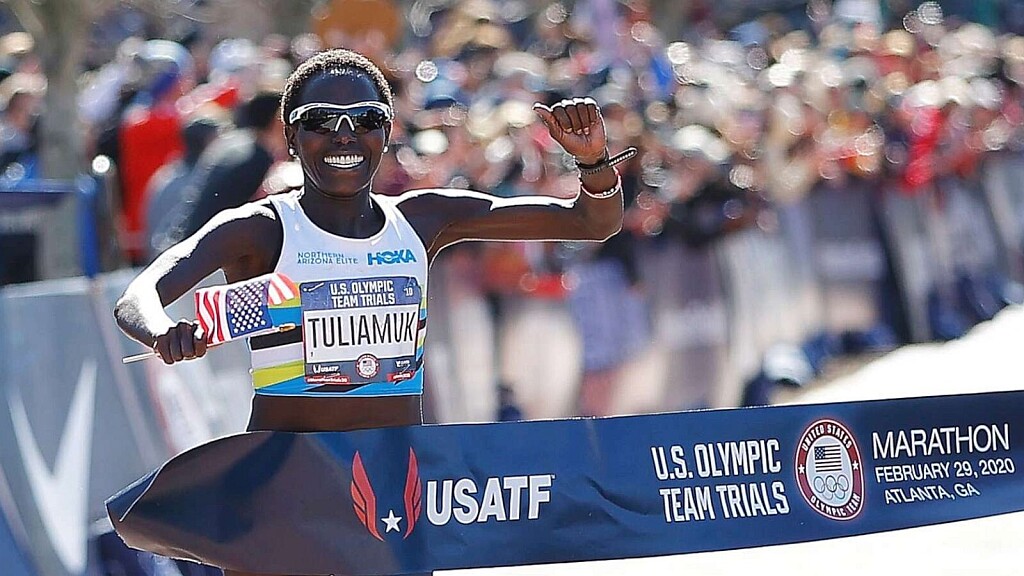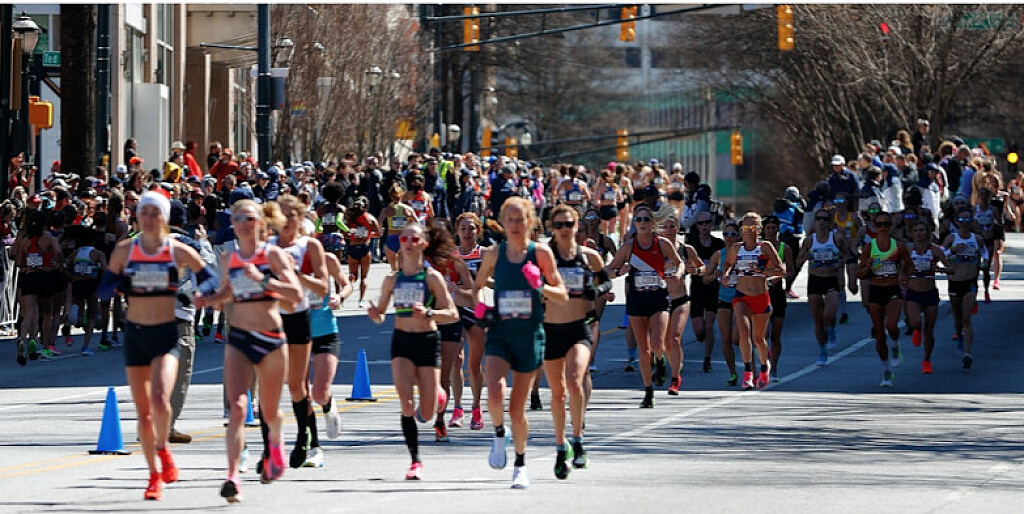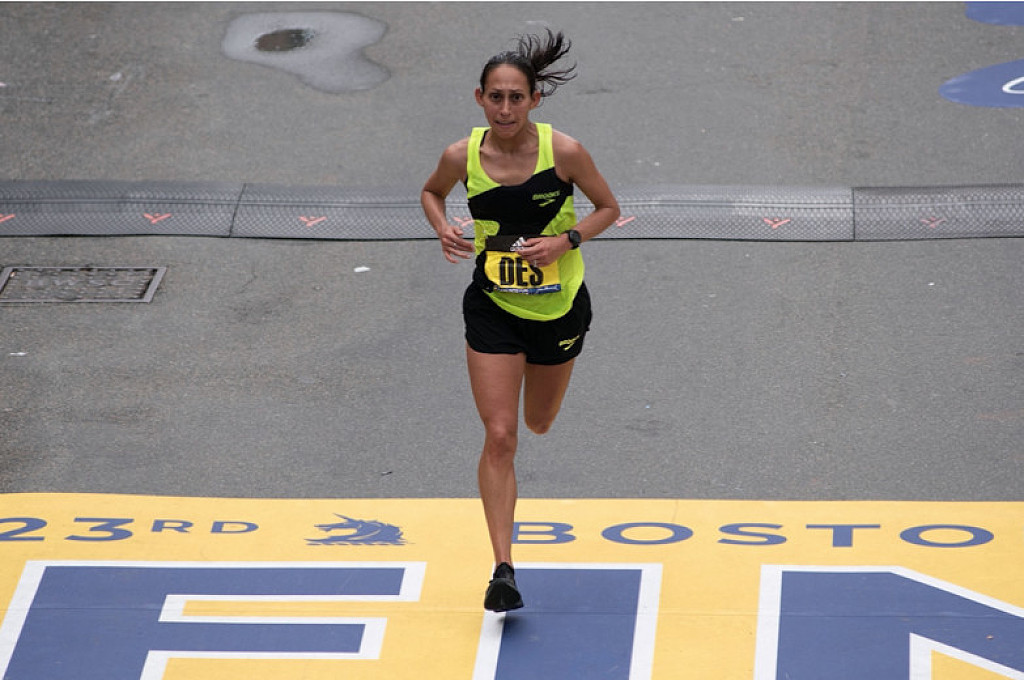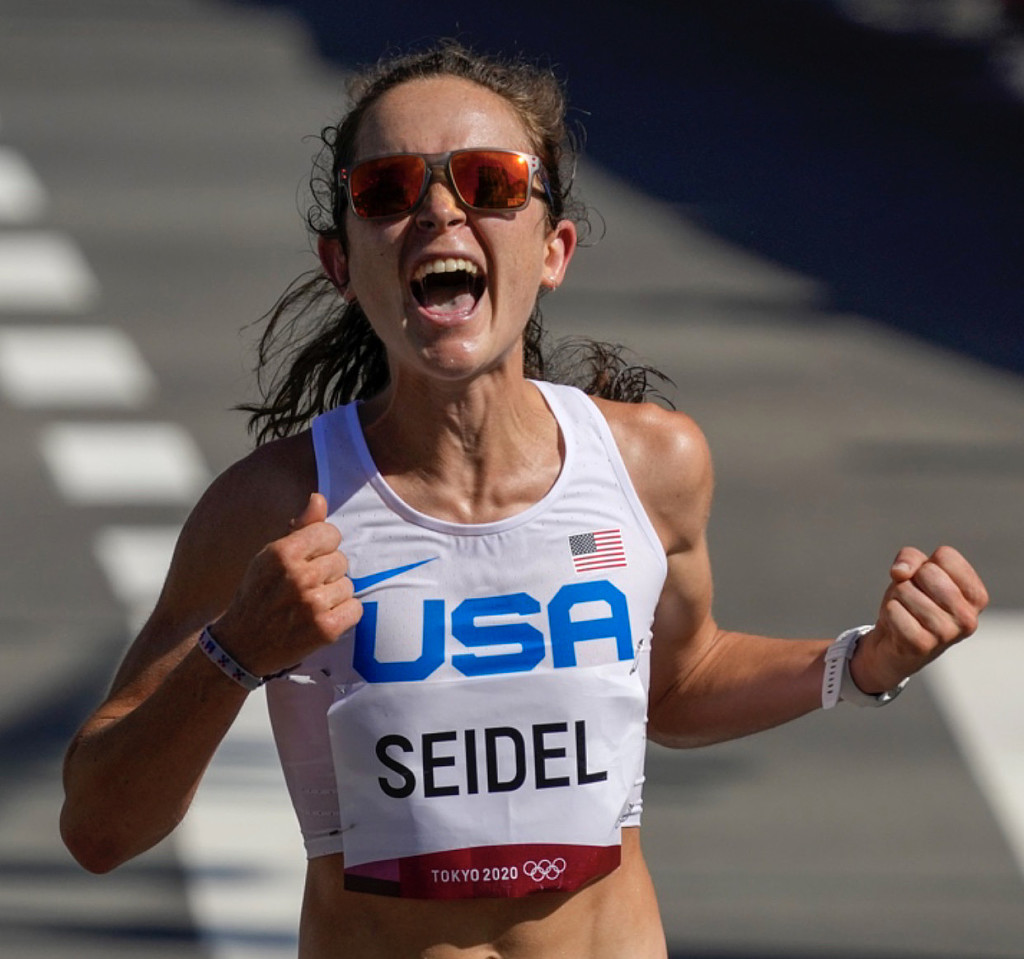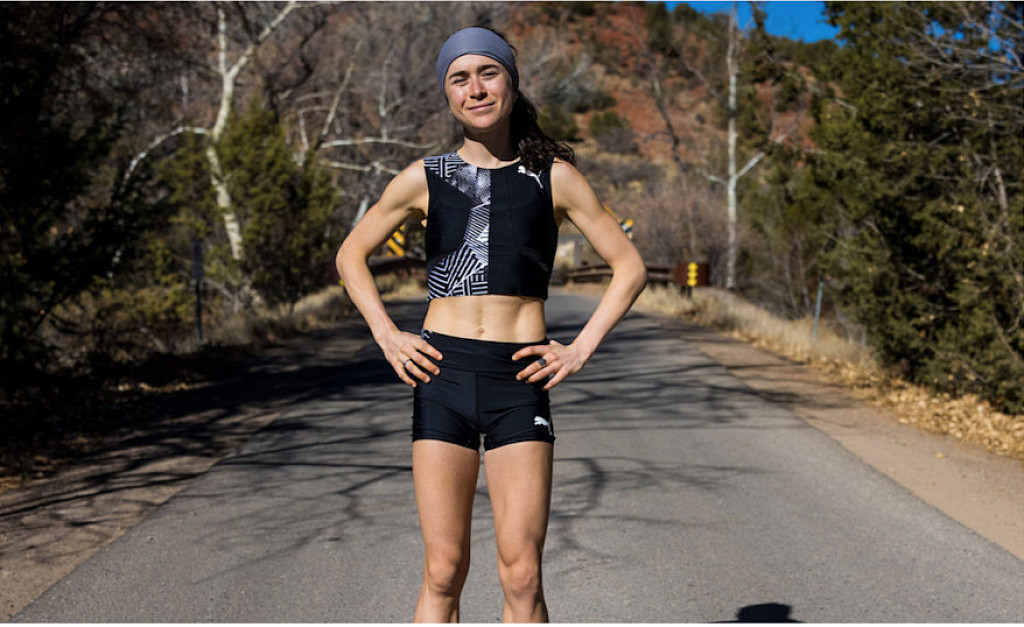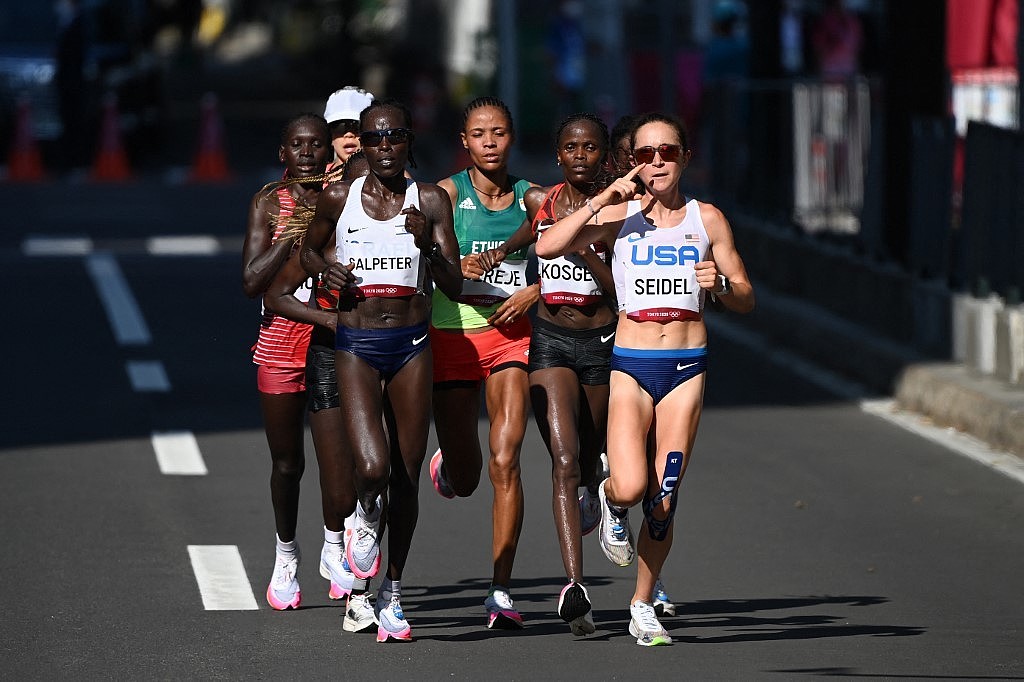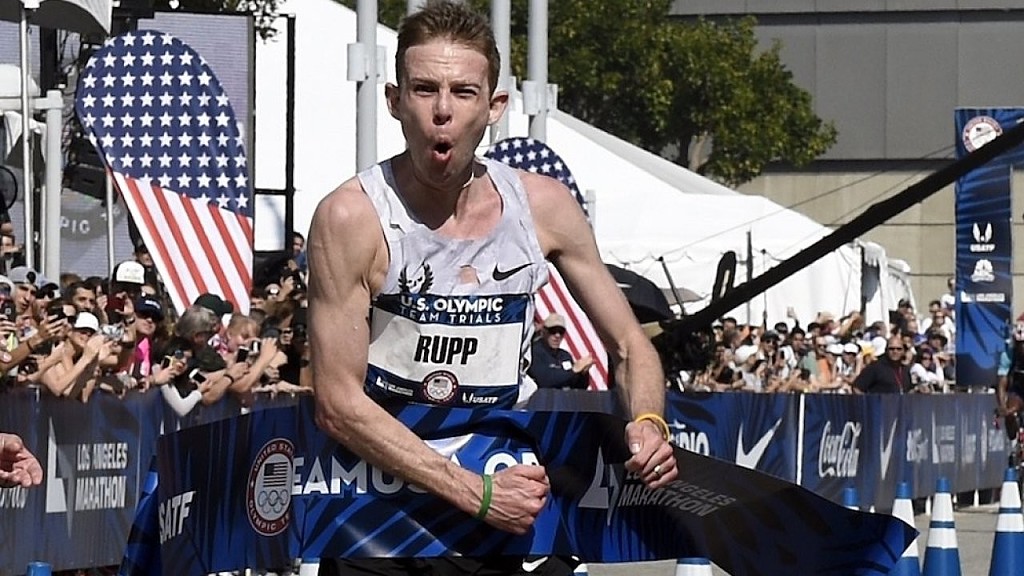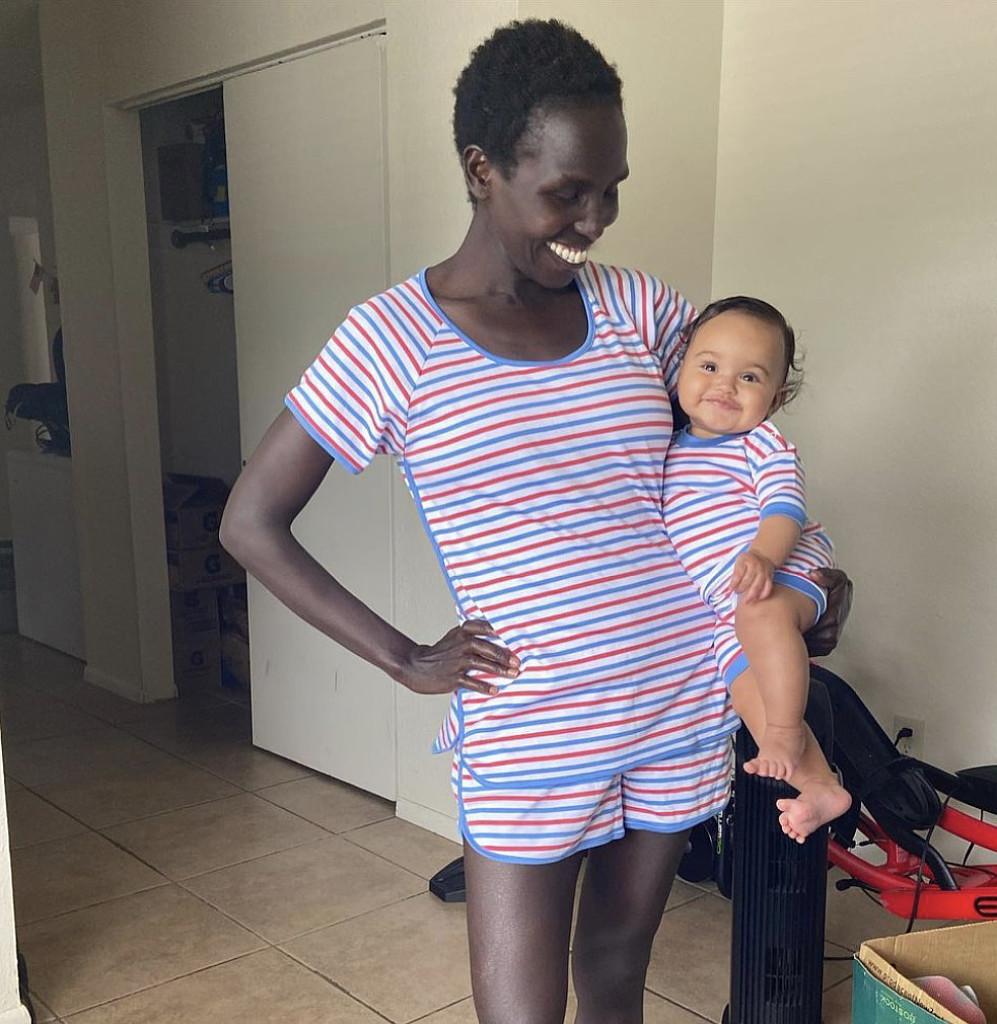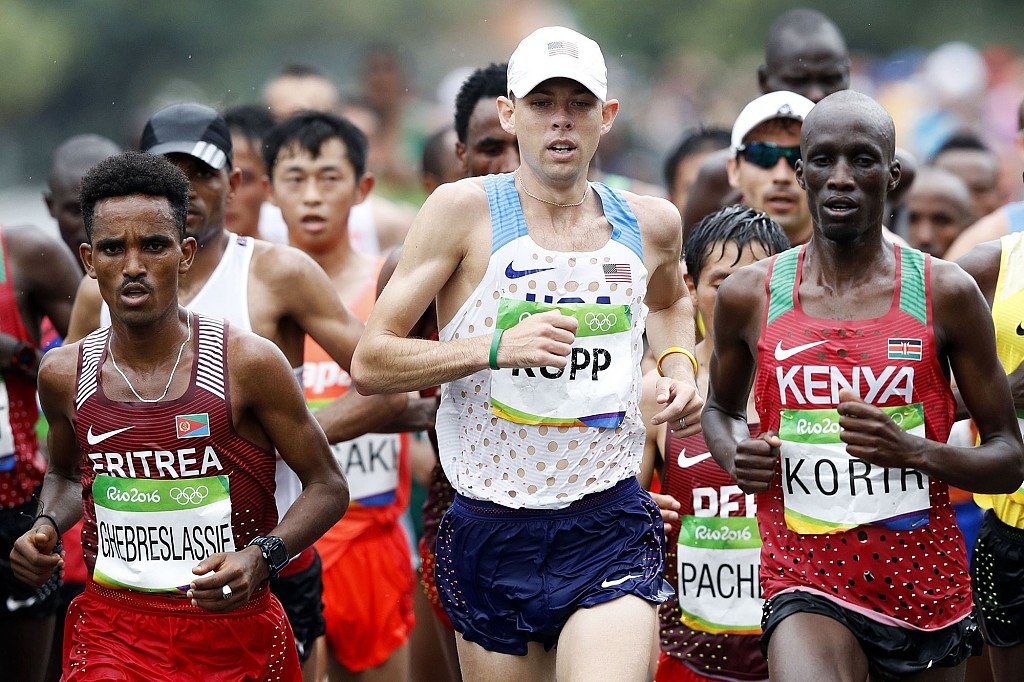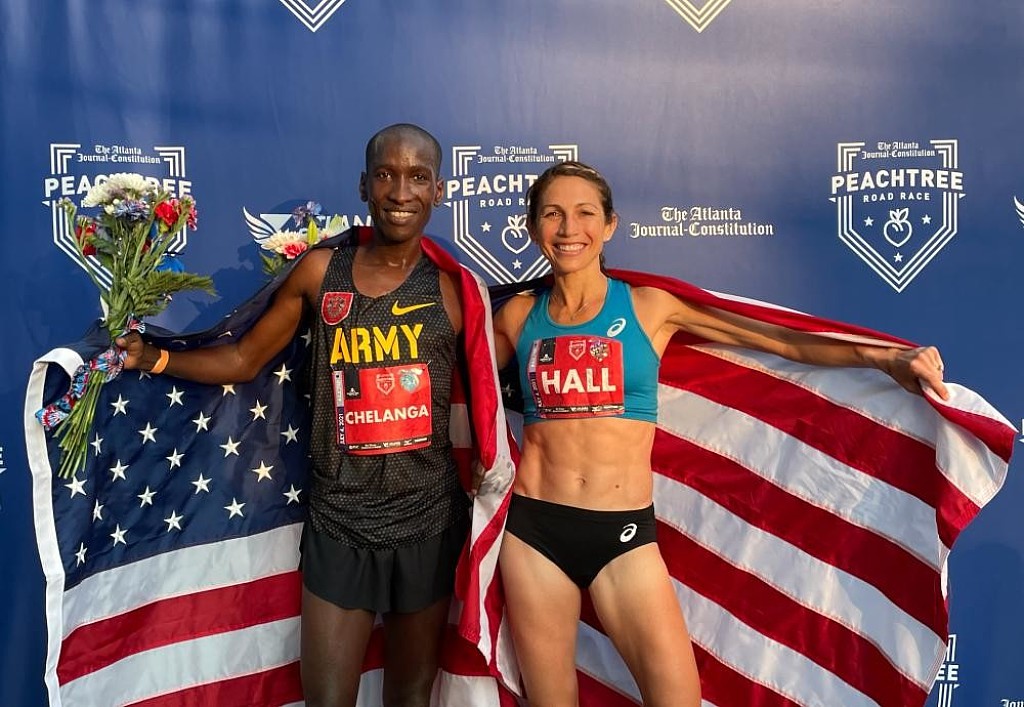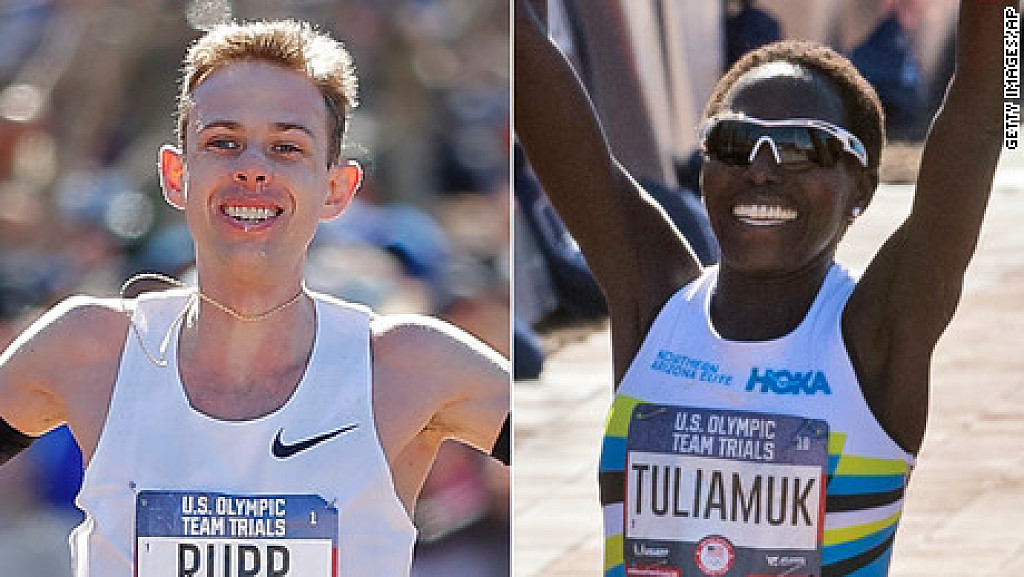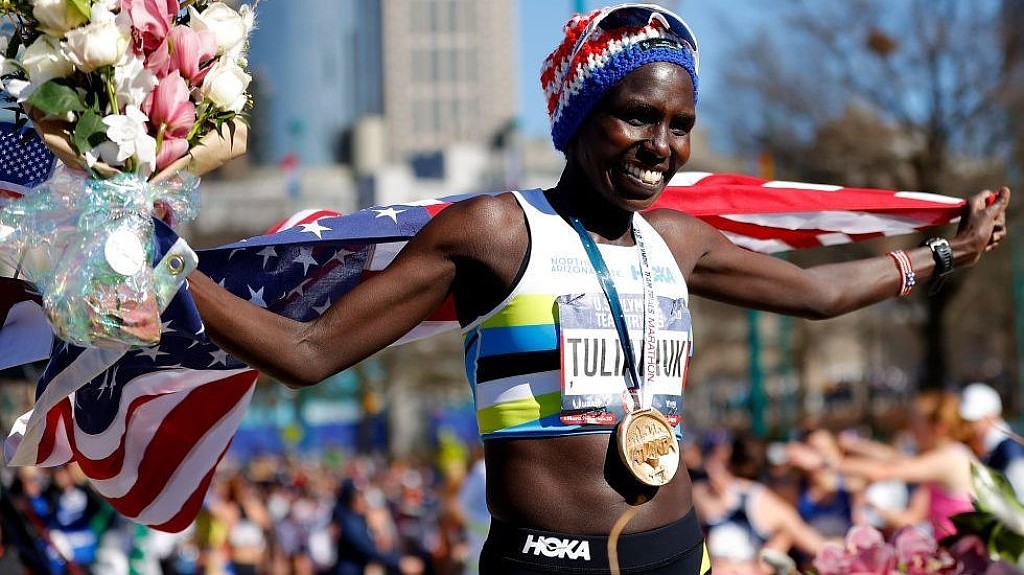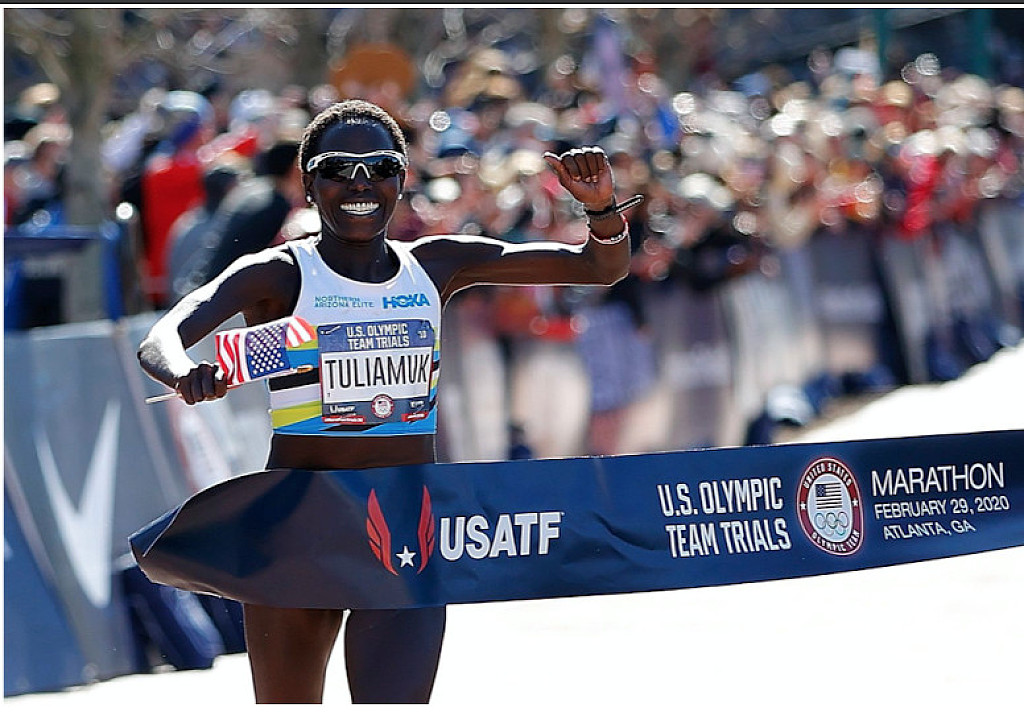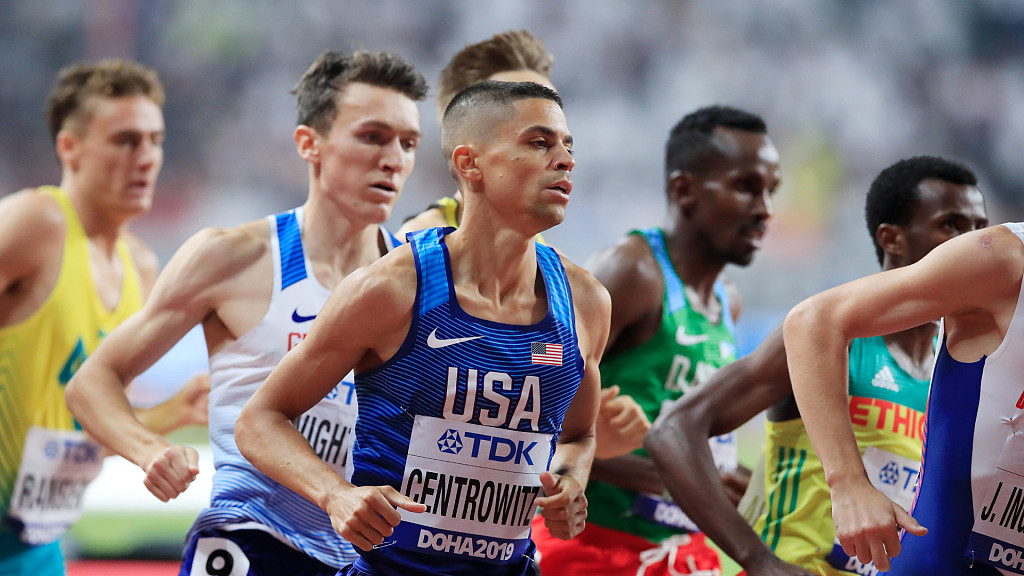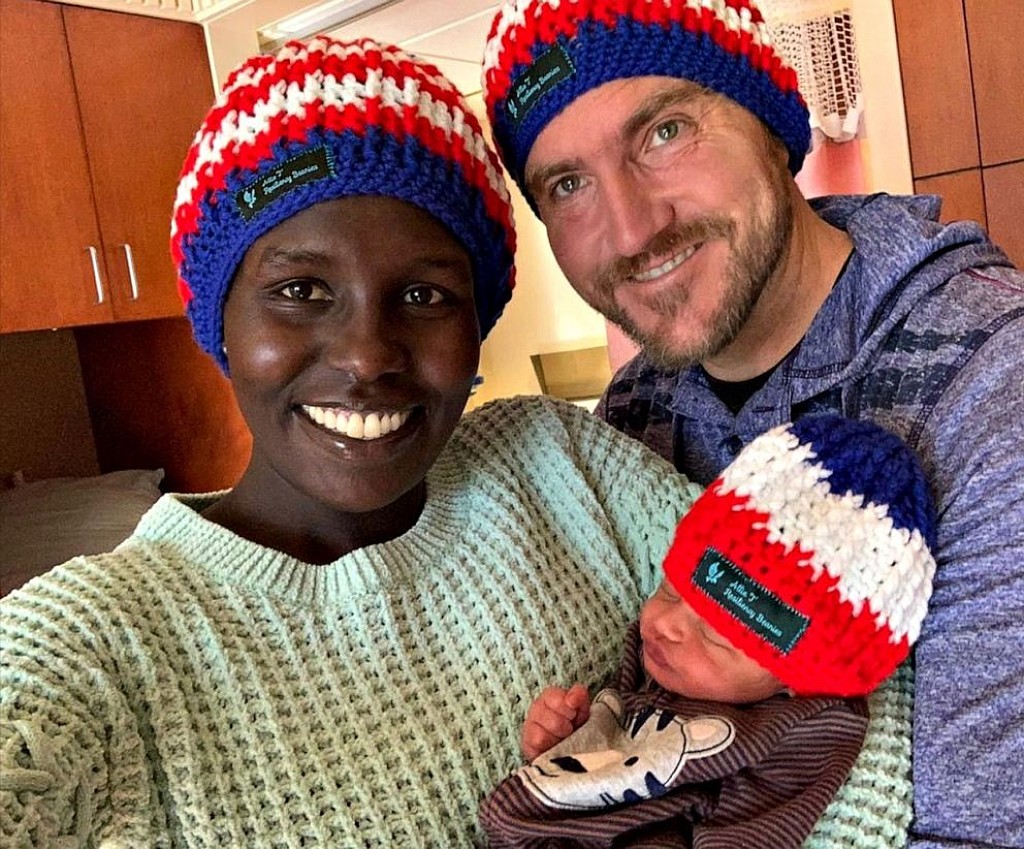Running News Daily
Running News Daily is edited by Bob Anderson. Send your news items to bob@mybestruns.com Advertising opportunities available. Train the Kenyan Way at KATA Kenya and Portugal owned and operated by Bob Anderson. Be sure to catch our movie A Long Run the movie KATA Running Camps and KATA Potato Farms - 31 now open in Kenya! https://kata.ke/
Index to Daily Posts · Sign Up For Updates · Run The World Feed
Articles tagged #Aliphine Tuliamuk
Today's Running News
Tola and Obiri lead elite fields for New York City Marathon
Organisers of the 2024 TCS New York City Marathon have revealed a world-class line up for this year’s World Athletics Platinum Label road race on 3 November, led by defending champions Tamirat Tola and Hellen Obiri.
Since winning last year in a course record of 2:04:58, Tola won the Olympic title in Paris in a Games record of 2:06:26. What made his feat all the more impressive is that he was only drafted into the Ethiopian team two weeks before the Games, having initially been named as a reserve.
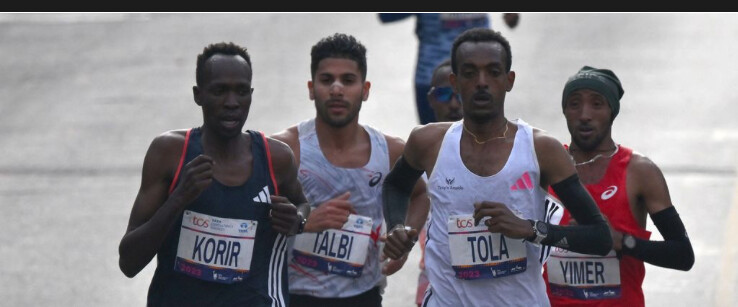
“I’m excited to defend my title in New York, especially coming off an Olympic-record marathon performance,” said Tola. “The hilly course and crowds in Paris definitely prepared me well for the bridges and spectators in New York, where maybe I can go even faster this year.”
Two-time Olympic medallist Bashir Abdi will also be one to watch; the Belgian earned silver at the recent Olympics, having taken bronze at the Tokyo Olympics in 2021 and at the 2022 World Championships.
Three past winners – all from Kenya – are also in the field: 2022 champion Evans Chebet, 2021 winner Albert Korir, and 2019 and 2017 victor Geoffrey Kamworor. Chebet has twice won the Boston Marathon, and has finished first or second in 13 marathons. Kamworor has made it on to the podium in all four of his New York Marathon appearances.
Fellow Kenyan Abel Kipchumba, who won this year’s NYC Half Marathon, will be making his New York City Marathon debut.
The US charge is led by Conner Mantz and Clayton Young, who finished eighth and ninth respectively in the Paris Olympic marathon.
Women’s Open Division
Obiri is a three-time Olympic medallist and seven-time world medallist. Last year the Kenyan became the first woman in 34 years to win both Boston and New York in the same calendar year. So far this year, she retained her Boston Marathon title and went on to earn bronze in the Olympic marathon.
“There’s no place like New York, and I am so ready to defend my title,” said Obiri. “I have been racing very well on the roads in the US, and I hope I can have another good day that sees me in contention once we enter the final stages in Central Park.”
Fellow Kenyan Sharon Lokedi, the 2022 NYC Marathon winner, will return after finishing third last year and fourth in the Olympic marathon in Paris. The Kenyan delegation will also include 2010 champion Edna Kiplagat, four-time Olympic medallist Vivian Cheruiyot, and Sheila Chepkirui, who owns the fastest personal best in the field.
Ethiopia’s Tirunesh Dibaba will make her New York City Marathon debut and is one of the world’s most accomplished long-distance runners as a three-time Olympic and 16-time world champion. She will be joined by compatriot Senbere Teferi.
Dakotah Lindwurm, the top US finisher in the marathon at the Paris Olympics, will lead the US contingent.
Elite field
WomenSheila Chepkirui (KEN) 2:17:29Tirunesh Dibaba (ETH) 2:17:56Vivian Cheruiyot (KEN) 2:18:31Senbere Teferi (ETH) 2:19:21Dera Dida (ETH) 2:19:24Edna Kiplagat (KEN) 2:19:50Eunice Chumba (BRN) 2:20:02Sharon Lokedi (KEN) 2:22:45Hellen Obiri (KEN) 2:23:10Fatima Gardadi (MAR) 2:24:12Kellyn Taylor (USA) 2:24:29Fabienne Schlumpf (SUI) 2:24:30Aliphine Tuliamuk (USA) 2:24:37Dakotah Lindwurm (USA) 2:24:40Lily Partridge (GBR) 2:25:12Jessica McClain (USA) 2:25:46Des Linden (USA) 2:25:55Tristin Van Ord (USA) 2:25:58Khishigasaikhan Galbadrakh (MGL) 2:26:32Maggie Montoya (USA) 2:28:07Katja Goldring (USA) 2:29:01Savannah Berry (USA) 2:29:13
MenEvans Chebet (KEN) 2:03:00Gabriel Geay (TAN) 2:03:00Bashir Abdi (BEL) 2:03:36Tamirat Tola (ETH) 2:03:39Geoffrey Kamworor (KEN) 2:04:23Abdi Nageeye (NED) 2:04:45Addisu Gobena (ETH) 2:05:01Abel Kipchumba (KEN) 2:06:49Albert Korir (KEN) 2:06:57Conner Mantz (USA) 2:07:47Clayton Young (USA) 2:08:00Rory Linkletter (CAN) 2:08:01Callum Hawkins (GBR) 2:08:14Ser-Od Bat-Ochir (MGL) 2:08:50Elkanah Kibet (USA) 2:09:07Noah Droddy (USA) 2:09:09Jonny Mellor (GBR) 2:09:09Jared Ward (USA) 2:09:25Colin Bennie (USA) 2:09:38Futsum Zienasellassie (USA) 2:09:40CJ Albertson (USA) 2:09:53Nico Montanez (USA) 2:09:55Yuma Morii (JPN) 2:09:59
by World Athletics
Login to leave a comment
Another Marathon Already? Top Americans from Paris Will Run New York in 11 Weeks
On Tuesday, the New York Road Runners announced the elite fields for this year’s New York City Marathon on November 3. The reigning champions are returning—Hellen Obiri and Tamirat Tola—as are three of the top Americans from the Paris Olympics marathon in August: Conner Mantz, Clayton Young, and Dakotah Lindwurm.
Also running New York are Evans Chebet, the 2022 champion and a two-time winner of the Boston Marathon, and Bashir Abdi, who won the silver medal in Paris. Tola, a last-minute addition to the Ethiopian Olympic team and NYC course record holder, enters as the presumptive favorite after winning the gold medal in Paris.
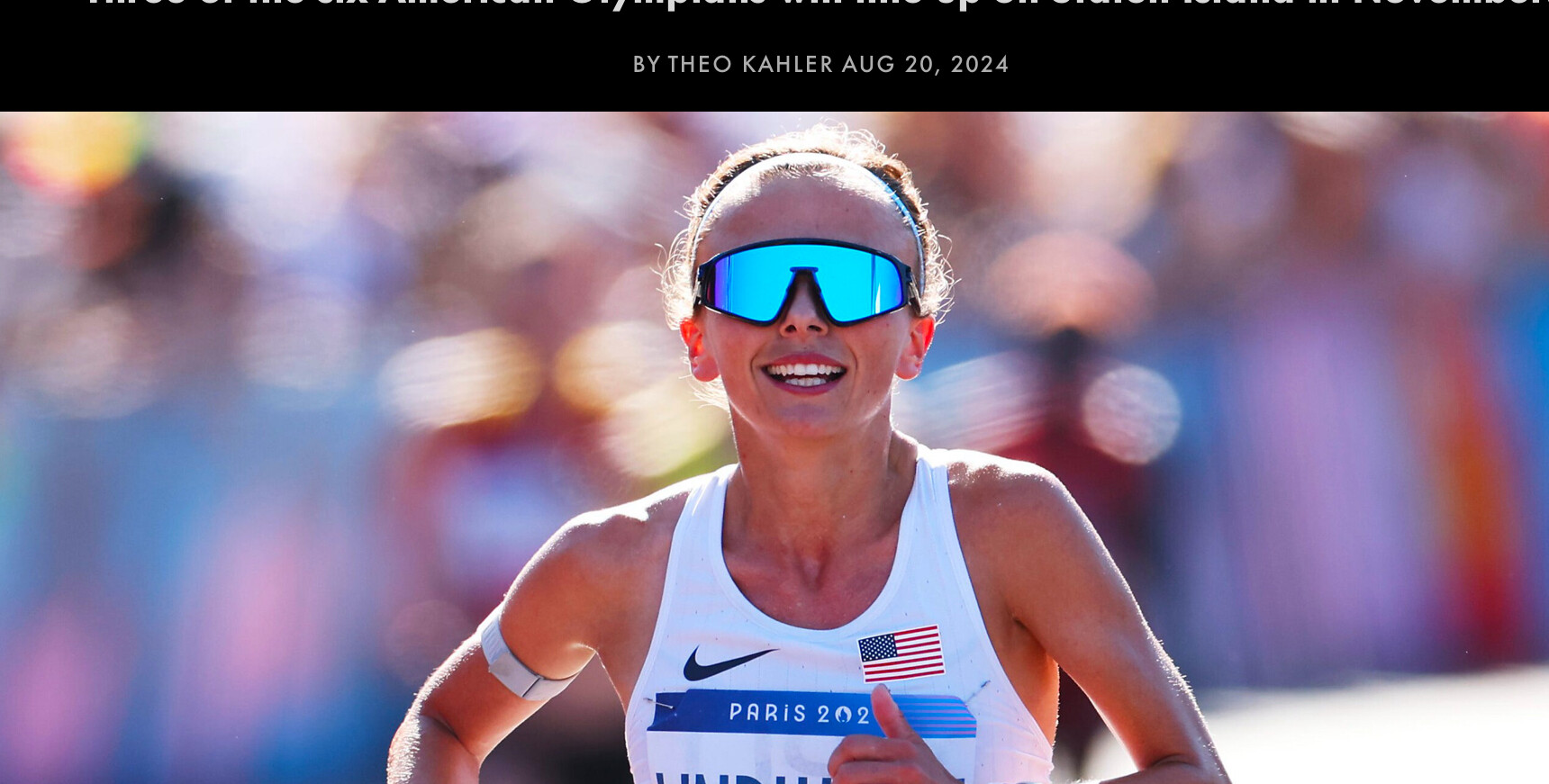
In addition to Mantz and Young, the American men will be represented by Elkanah Kibet, CJ Albertson, and Futsum Zienasellassie, among others.
The biggest competition for Obiri, who took bronze in Paris, will likely come from Sharon Lokedi, the winner of the 2022 New York City Marathon. Lokedi was just off the podium in Paris, finishing four seconds behind Obiri in fourth (2:23:14). Lindwurm, who placed 12th in Paris, will lead the Americans, but Jess McClain, Kellyn Taylor, and Aliphine Tuliamuk are all experienced, as is 2018 Boston Marathon winner Des Linden.
You can view the full elite fields here.
The two courses are both hilly, but the inclines in New York are more gradual. The Paris course had two major climbs, including a steep segment during mile 18 that averaged a 10.5 percent grade. In the men’s race, Tola made a strong move on the hill to separate from the field, which ended up getting him the gold medal. Although New York has 810 feet of elevation compared to 1,430 feet in Paris, it’s still a tough course—in fact, we ranked it the toughest of the six World Marathon Majors.
There’s a relatively tight 11-week turnaround from Paris (after you factor in a week for rest). The men’s Olympic race was August 10 and the women’s race was August 11. The New York City Marathon is scheduled for Sunday, November 3.
Young, who placed ninth at the Olympics, knows 11 weeks isn’t ideal for a full marathon build—he took 16 weeks for Paris—but he’s confident he can run well in November. He’ll resume full-on training next week and is being careful to take a physical and mental break after Paris.
“I think there can be this mentality that you want to hold onto that fitness from Paris, and that can be a debilitating mentality because if you try too hard to hang on to that fitness, you’re gonna be toast by race day by not taking a proper break,” he said. “It’s a tricky balance.”
Lindwurm, on the other hand, is used to running three marathons a year. The past two years, she’s raced the Boston Marathon in the spring, Grandma’s Marathon in June, and either the Chicago or New York City Marathon in the fall.
“For courses like New York, I like to say it’s better to show up al dente than overcooked,” she said. “I have no issues looking at an 11 week build, especially because I’ve done Boston to Grandma’s, which I think is like seven or eight weeks, quite a few times. So that never really scares me. I feel like every marathon build you’re just building off of what you did last time, so even if I don’t get any more fit than I was in Paris, I think I’m still in a really good spot.”
In 2022, when she ran New York, she had a tough race and dropped out at mile 18. But Lindwurm said she’s a totally different runner now, so this time, she’s “back for revenge.” She’s coming in with ‘A,’ ‘B,’ and ‘C’ goals: C is to finish the race, B is to crack the top 10, and A is to get on the podium.
Young wants to be more competitive, too.
He ran a fairly conservative race in Paris, holding back slightly on the steep hill at mile 18, but his apprehension caused him to run most of the later miles by himself. “I missed the move,” he admitted.
At New York, he hopes to race more aggressively, even if it comes with the risk of pushing too hard. “I’m excited to be able to cover more moves late in the race and to be more competitive towards the end, instead of finding myself in no man’s land,” he said.
He’ll run the race alongside his training partner, Conner Mantz, who finished one spot ahead of him in Paris, in eighth place. The two are longtime friends, but, at the end of the day, they’re competitors. And Young is 0-4 against Mantz in marathons.
Young wants to chip away at the score.
“I love training with Conner every day, and he’s a big reason why I was able to have such a great day in Paris and at the [U.S. Olympic] Trials and previous marathons, but man, I gotta beat him sometime, right?” he said.
“I wanna be competitive with him, and so I’m excited to toe the line with him again and to have that rivalry continue, as well as our friendship.”
Login to leave a comment
U.S. Olympic Marathoners Will Race the Bolder Boulder 10K as a Pre-Paris Tune-Up
Conner Mantz, Clayton Young, and Leonard Korir will run in the International Pro Team Challenge on May 27.
Memorial Day is always an exceptional celebration for runners in Boulder, Colorado, but this year, it will have some extra special Olympic flair.
On Monday, May 27, more than 40,000 runners will run through the city that’s known for the iconic Flatirons rock formations, the Pearl Street pedestrian mall, and an exceptionally active population in the annual Bolder Boulder 10K. Now in its 44th year, it’s been one of the top road running races in the U.S. since its inception, and this year will serve as one of the final tune-ups for the men’s U.S. Olympic marathon squad before racing in the Paris Olympics later this summer.
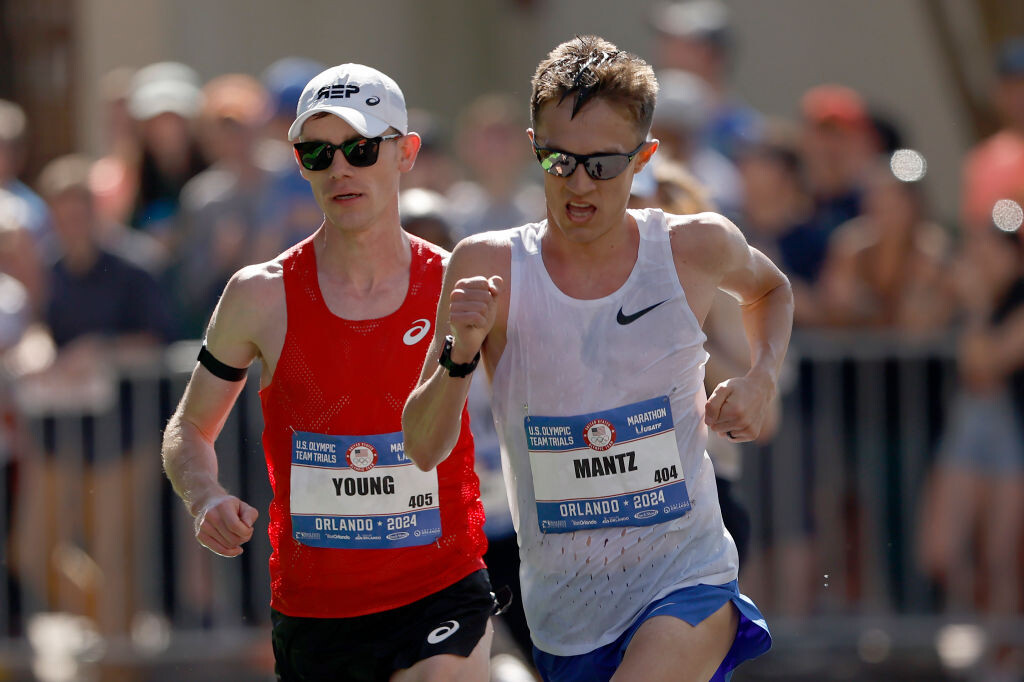
Conner Mantz, Clayton Young, and Leonard Korir, the top three finishers in the 2024 U.S. Olympic Trials who will be racing the marathon in the Paris Olympics on August 10, will be competing as Team USA Red in the Bolder Boulder’s International Pro Team Challenge that follows the citizen’s races. (Korir is expected to officially be named to the U.S. team in early May based on final pre-Olympic international rankings.)
The pro race, which has a prize purse of $83,700 before potential bonuses, is one of the things that makes the Bolder Boulder so unique. After all the runners in 98 citizen waves have completed the race, professional men’s and women’s international teams from more than a dozen countries compete on the same course for team and individual titles. The races feature a staggered start, with women beginning 15 minutes before the men so the winners of each race will finish about 10 minutes apart inside the University of Colorado’s Folsom Field football stadium.
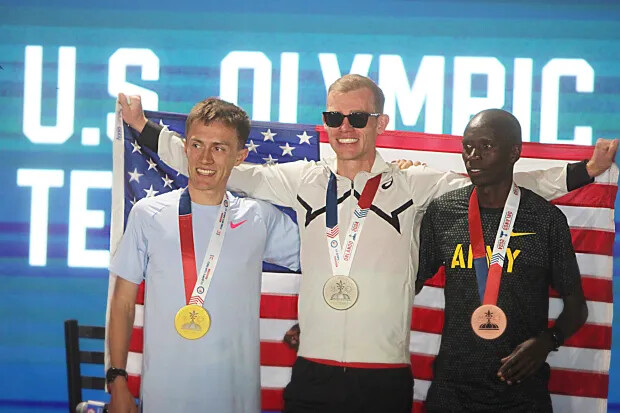
The finishing moments are among the thrilling spectacles in American running. By that point, the stadium is filled with a near-capacity crowd of roaring runners, family, and friends who have been watching the action play out on the massive video screens.
“The finish in the full stadium is like nothing else in the sport,” says Mantz, 27, who won the men’s race last year in 29:08 with a thrilling late-race surge to pass Kenya’s Alex Masai in the final 200 meters before the finish. “It was pretty electric. It took away all the pain you’re feeling mid-race. I was like, ‘Just race as hard as you can.’”
Team USA Red will have plenty of competition, from Team USA White, the secondary American team of Jared Ward, Futsum Zienasellassie, and Sam Chelanga, as well as teams from Kenya, Ethiopia, Mexico, and Rwanda. Teams are scored like a cross country race, with points awarded on the basis of finishing place, which means the team with the lowest combined score for all three runners is the winner. Ties are decided by the positions of the third-place finishers.
The women’s Team USA Red team will be led by defending champion Emily Durgin, along with Sara Hall and Boulder native Nell Rojas. Durgin finished ninth at the U.S. Olympic Trials in February and won the USATF 10 Mile Championships on April 7 in Washington D.C. At last year’s Bolder Boulder, she stormed to victory in 33:24, winning by 24 seconds over Kenya’s Daisy Kimeli.
Hall placed fifth in the U.S. Olympic Trials Marathon on February 3 in a U.S. master’s record (2:26:06) and 15th in the Boston Marathon on April 15. The women’s Team USA White roster will be composed of an all-University of Colorado alumnae squad—Makena Morley, Sara Vaughn, and Carrie Verdon.
“I can’t wait to be back in Boulder for the best day of the year,” says Durgin, 29, who will compete in the U.S. Olympic Trials 10,000 meters on the track in late June with the hopes of making the U.S. Olympic team. “Competing with Nell and Sara will make the experience even better.”
The women’s U.S. Olympic marathon team of Fionna O’Keefe, Emily Sisson, and Dakotah Lindwurm were invited to race in the Bolder Boulder but each runner declined, citing scheduling timing conflicts or a disinterest in racing at Boulder’s lofty altitude (5,430 feet). All of the runners who are racing for the U.S. teams in Boulder live at 4,500 feet or higher.
An Olympic Legacy
Boulder is known as one of the top running meccas in the U.S., in part because elite-level American and international runners have made it their training base since Olympic gold medalist Frank Shorter arrived in the early 1970s. Emma Coburn, Jenny Simpson, Yared Nuguse, Joe Klecker, Jake Riley, Hellen Obiri, and Edna Kiplagat are among the many top-level runners who are currently training in Boulder. Shorter, the 1972 marathon gold medalist, was a co-founder of Bolder Boulder 10K in 1979, and helped it grow into one of the country’s largest races.
Since then, numerous U.S. Olympians have raced in the Bolder Boulder, including Deena Kastor (a three-time women’s champion), Aliphine Tuliamuk (the 2022 women’s winner), Alan Culpepper, Elva Dyer, Ryan Hall, Abdi Abdirahman, Jorge Torres, Shalane Flanagan, Amy Cragg, Magdalena Boulet, and Libby Hickman, as well as Korir (who won it in 2022), and Ward (who was fourth in 2022).
Thanks to Boulder’s robust running community and the prestige of the race, the Bolder Boulder has also always featured fast sub-elite runners competing in the early citizen waves. Yet, the race has also celebrated dedicated middle-of-the-pack runners, as well as the first-time runners and walkers in the later waves. It was one of the first races to have bands playing along the course (as well as belly dancers and other entertainers), runners dressed up in costumes, elite wheelchair races, and in recent years, it has been known for a mid-race slip-and-slide and unofficial bacon aid station.
For the past 25 years, the Bolder Boulder has organized a special Memorial Day tribute—one of the largest in the country—that honors military veterans and new cadets.
The U.S. men’s Olympic marathon team competing in this year’s Bolder Boulder will be a legacy moment for the race, says Bolder Boulder race director Cliff Bosley.
“Having the three men that will represent our country in the marathon at this summer’s Paris Olympic Games is something we are extremely proud of,” Bosley says. “All three ran here last year, and to have them back is just incredible for the race, the city of Boulder, and the sport of running.”
by Brian Metzler
Login to leave a comment
Emily Sisson, Olympic Marathon Trials favorite, is ready for Saturday
Emily Sisson is the American record holder (2:18:29) in the marathon and the pre-race favorite to win the 2024 US Olympic Marathon Trials.
At the time of publication, 64.2% of you are picking her to win the Trials in the LRC $20,024 Prediction Contest Sponsored by Relay.
Sisson talked to LRC this week via video conference, and by all accounts her buildup for Orlando has gone very well.
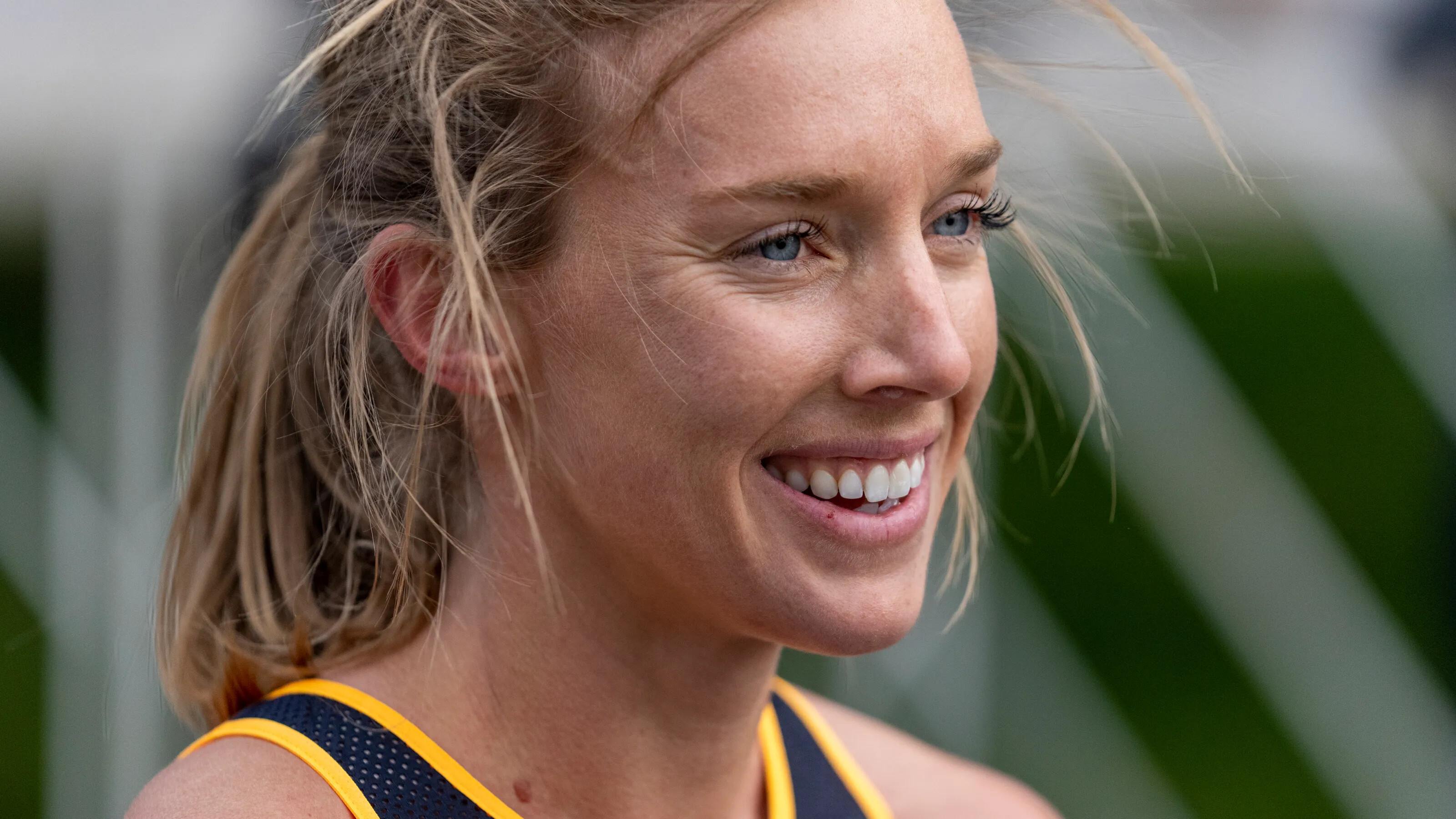
“Everything’s been better, all the long runs, all the tempos, and actually my long interval workouts, those have actually been better than they’ve been before.”
When Sisson was asked to compare her fitness and buildup to the 2022 Bank of America Chicago Marathon where she broke the American record, she said:
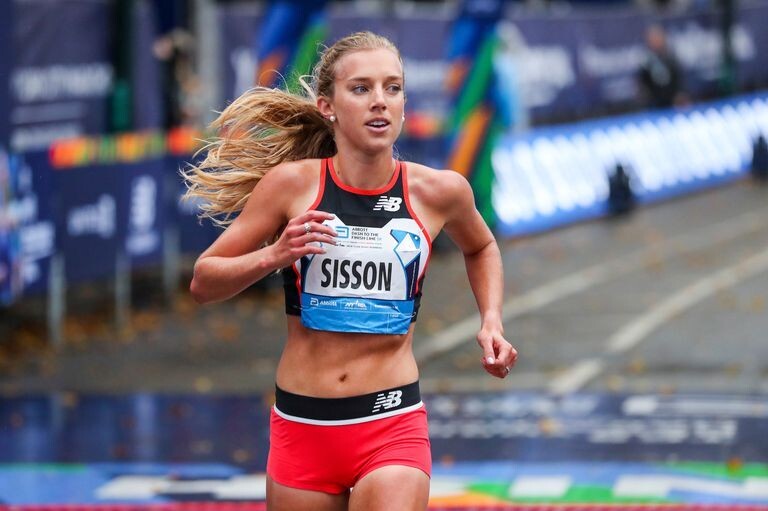
Everything’s been better, all the long runs, all the tempos, and actually my long interval workouts, those have actually been better than they’ve been before.
The workouts like on paper, like the times they’re all better. I think like I get confidence from that, but also just I’m feeling good and I’m feeling strong. So the training’s been good.
Sisson ran a 30:52 time trial on the roads in Arizona, which is just slightly slower than her official track PB of 30:49. Sisson, unlike Trials #2 contender Betsy Saina who ran a workout with 12 male pacers in Kenya, ran the workout all alone although her husband Shane was next to her on a bike. Sisson wasn’t blown away by almost setting a 10k PR in practice, as she said her track PR should be much faster. But she was pleased she could run that pace by herself. “I was happy that I was able to push myself that hard on my own,” she said.
Lessons from Chicago 2023
Chicago 2023 didn’t go as well as Chicago 2022 for Sisson, as she developed a side stitch later in the race and ran 2:22:09 for 7th place.
Sisson now views the Chicago 2023 setback as a positive experience as she learned from it. “We found some videos early on in Chicago and I just looked a little less fluid this past fall than I did in my 2022 Chicago. It was really subtle, like there was a little bit more movement in my upper body. So, we’re trying to like stay on top of that a bit more this time just to make sure nothing like a side stitch or anything else breaks down again,” she said, adding she worked with chiropractor John Ball.
Respect for the competition and the marathon distance
Sisson enters the Trials not only fit but healthy. When asked whether she worries about the other competitors in the race, she said, “It’s not that I don’t worry about my competitors. It’s not that I don’t think about them, but, I just feel like the marathon’s different than like a half marathon or a 10k. When I go into those races, I’m just trying to be as fit as I can and try to be fitter than my other competitors. But in the marathon, you are racing your other competitors, but you’re also racing the marathon itself. So it doesn’t matter, what your competitors are doing.”
“I feel fit and I feel healthy. With a marathon, that’s not everything, but those are two big parts of it. So I am happy with that. I’m happy with how training went,” Sisson said.
Getting a Real Olympic Experience
While Sisson made the 2020 Olympic in the 10,000m, she, like Aliphine Tuliamuk, said she missed out on the traditional Olympic experience because of the Covid protocols. She’d like to get another shot at it. “Being an Olympian is like the biggest dream,” she said of a goal that started when she watched Olympic gymnastics with her mom as a kid.
“I was so thankful they happened in 2021, but it was definitely a different Olympic experience than Olympics prior. So I’d love to get back there.”
Of Sisson’s 5 marathons, the only one that went poorly was the 2020 Olympic Marathon Trials in Atlanta where she dropped out.
Now with some time to reflect, Sisson has a better picture of what she think went wrong. “I think I went too hard in the buildup. I think my body, when I was standing on the start line, I think I was tired and, and I just didn’t realize it at the time because I was so new to the marathon, I thought it was just so normal to be tired, but there were things afterwards that I looked back on and there were signs that maybe I’d pushed it too hard in training.”
Sisson has backed off a little in her training this time. “So we did try to focus this time on getting good training in, getting in a good buildup, but just not overdoing it. I don’t wanna leave my race in training,” she said.
Sisson does believe she can do well in a hilly marathon. If she qualifies for Paris, she’ll get the chance as the Olympic course has a massive uphill heading to Versailles.
by Weldon Johnson
Login to leave a comment
2028 US Olympic Trials Marathon
Most countries around the world use a selection committee to choose their Olympic Team Members, but not the USA. Prior to 1968, a series of races were used to select the USA Olympic Marathon team, but beginning in 1968 the format was changed to a single race on a single day with the top three finishers selected to be part...
more...Molly Seidel withdraws from Olympic Marathon Trials due to injury
Tokyo Olympic bronze medalist Molly Seidel announced she is withdrawing from Saturday’s U.S. marathon trials for the Paris Games due to a knee injury.
Seidel, 29, said in a video posted Thursday that she suffered a knee injury a month ago, couldn’t run on it and got an MRI that revealed a broken patella and a partially torn patella tendon.
“I have done everything in my power over this last month to try and get myself to the (starting) line,” she said. “I’ve had just the most incredible physios and doctors doing everything in their power to help me. I’ve been cross-training my (butt) off, but ultimately I got to this week, and my knee had not healed up enough, and I knew that I could not race a marathon hard on it in its current state without really, really injuring myself.”
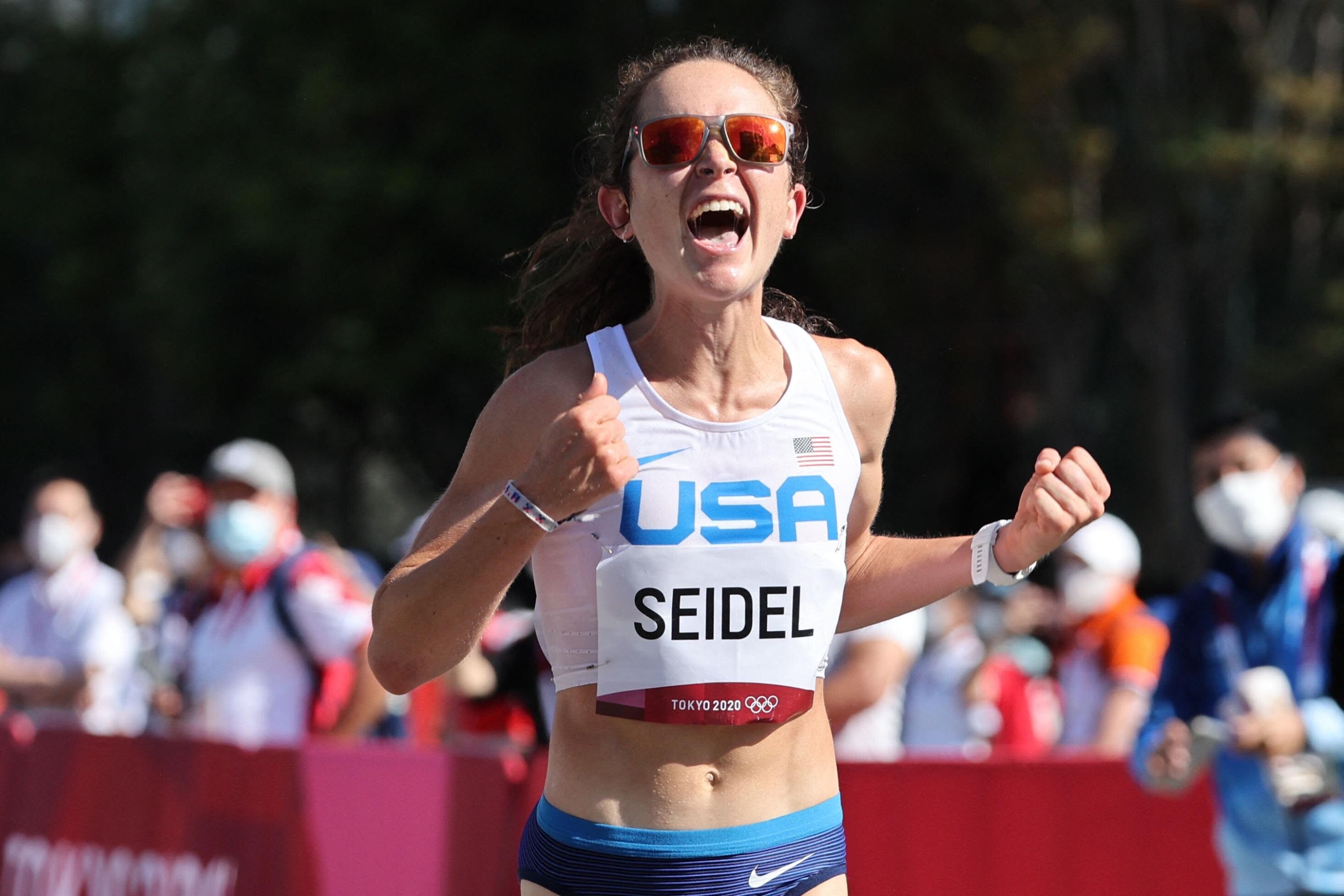
The trials are Saturday at 10 a.m. ET from Orlando, airing live on Peacock with coverage on NBC, NBCSports.com and the NBC Sports app at noon.
Four years ago, Seidel placed second in the trials in her marathon debut to make the three-woman Olympic team.
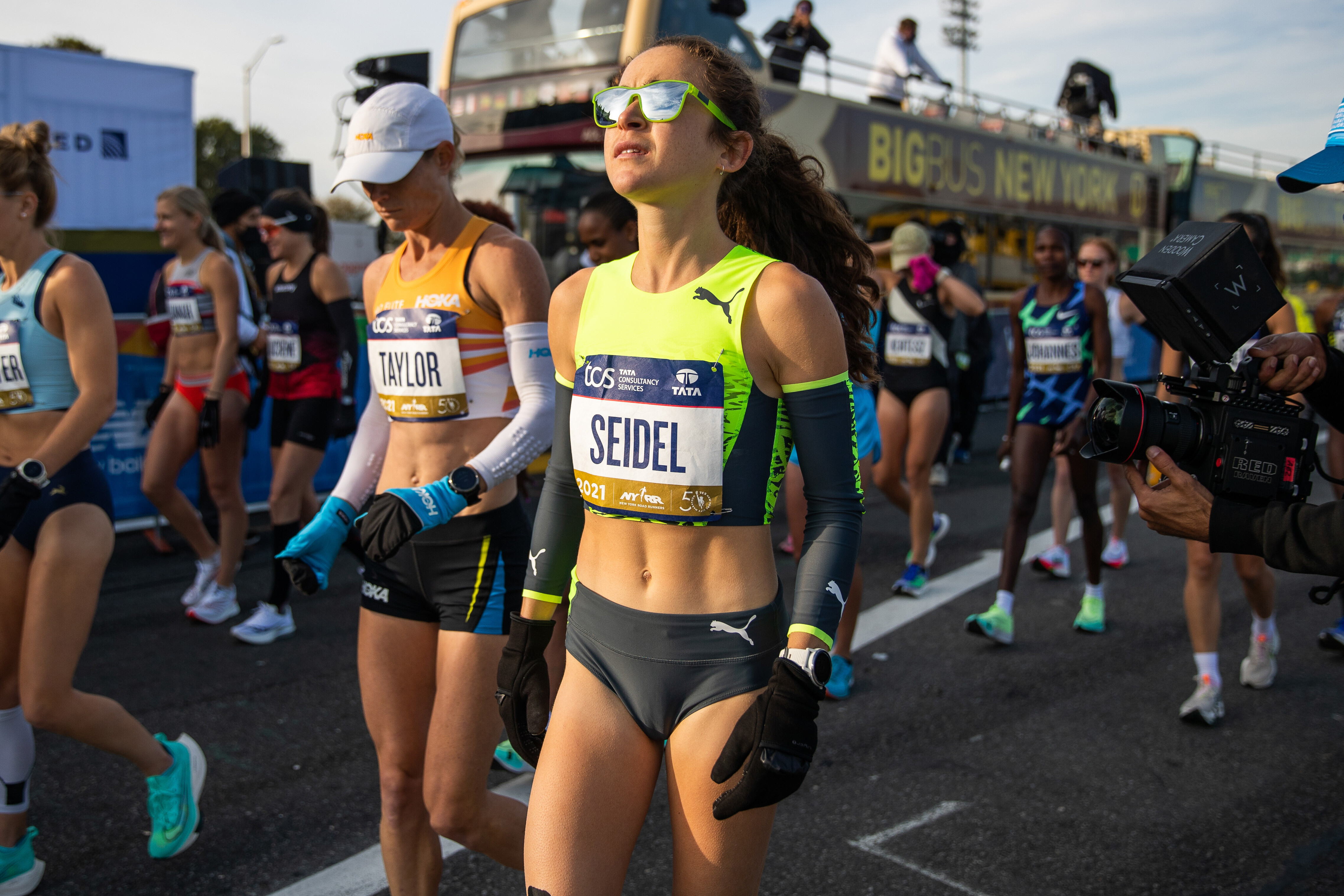
After the COVID-19 pandemic postponed the Tokyo Games by one year, Seidel finished third in the Olympic marathon held in Sapporo.
She became the third U.S. woman to win a marathon medal after Joan Benoit Samuelson, who won the first Olympic women’s marathon in 1984, and Deena Kastor, the 2004 bronze medalist.
After Tokyo, Seidel dealt with a hip injury and anemia, plus took time to focus on mental health after an eating disorder relapse.
Then last Oct. 8, Seidel finished a 26.2-mile race for the first time in two years. She was the second-fastest American woman at the Chicago Marathon, running a personal best and re-establishing herself as a prime candidate to make the Paris team of three at trials.
Seidel is the second contender to withdraw in the lead-up to trials.
Emma Bates, the third-fastest U.S. female marathoner of 2023, bowed out Jan. 7, saying then, “There’s just not enough time to be where I need to be.”
The field still includes three of the four fastest American women in history — American record holder Emily Sisson, former American record holder Keira D’Amato and Sara Hall, No. 4 on the all-time list.
Plus, former Iowa State teammates Betsy Saina (the fastest American in 2023) and Aliphine Tuliamuk (Tokyo Olympic Trials winner).
by Olympic Talk
Login to leave a comment
2028 US Olympic Trials Marathon
Most countries around the world use a selection committee to choose their Olympic Team Members, but not the USA. Prior to 1968, a series of races were used to select the USA Olympic Marathon team, but beginning in 1968 the format was changed to a single race on a single day with the top three finishers selected to be part...
more...For Betsy Saina, the U.S. Olympic Trials Marathon Presents a Chance to Represent Her Son
For much of last year, Betsy Saina had a plan. She would race the Chicago Marathon in October, eager to run alongside Emma Bates (who placed fifth at last year’s Boston Marathon in a new personal best of 2:22:10) in pursuit of breaking Emily Sisson’s American record of 2:18:29, set the previous year at that same race.
Saina, 35, a naturalized U.S. citizen who represented Kenya in the 2016 Olympics in Rio de Janeiro—she placed fifth in the 10,000 meters 30:07.78—had reason to be confident. Last spring, she set a new personal best of 2:21:40 with her fifth-place finish at the Tokyo Marathon, which wound up being the fastest marathon by an American woman in 2023 and made her the eighth-fastest U.S. female marathoner of all-time, solidifying her position as a top U.S. Olympic marathon team contender.
The Chicago Marathon had assured Saina’s agent, Tom Broadbent, that she was in for the race. But when the elite field was announced in August, Saina learned she had not been accepted, which not only threw a wrench in her fall training plans, but made for a lot of stress as she was planning her U.S. Olympic Marathon Team Trials buildup.
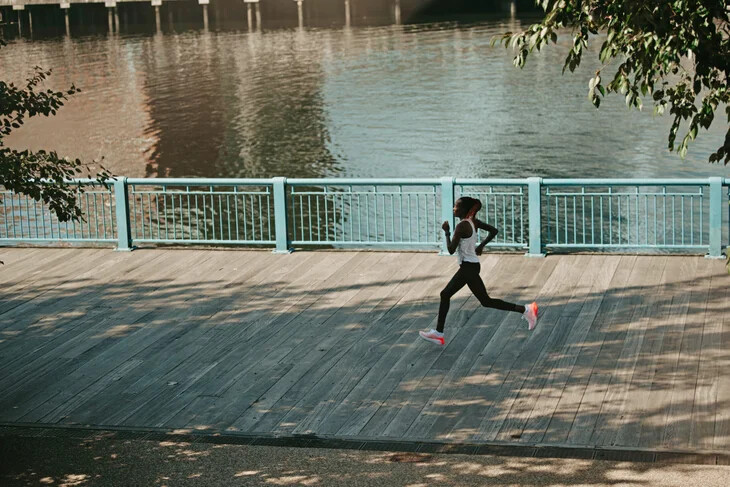
“I was shocked and spent three days looking at myself and trying to find any mistakes I made to not make the field, especially after running 2:21 in Tokyo,” Saina says. “I had never been rejected from a race before, and never got a response or an explanation as to why I didn’t make it. Being denied to run in Chicago honestly was one of the most disappointing things I’ve experienced in my career.”
Saina looked into entering the Berlin Marathon the following month, but had no such luck getting in with it being so late in the game. She was ultimately accepted into the Sydney Marathon (which shares its sponsor, ASICS, with Saina) on September 16. Unlike Chicago—with its fast, flat course that ended up having ideal racing conditions with temperatures in the 40s—Sydney has a hilly course and race-day weather was on the hotter side, with a starting temperature of 68 degrees.
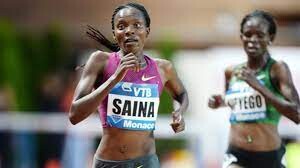
Despite the conditions, Saina proved herself once again, winning the race in 2:26:47. This sealed her confidence as she began to look ahead to the Olympic Trials in Orlando on February 3. If she’s one of the top three finishers in the women’s race in Florida, she’ll earn a spot on the U.S. team that will compete in the marathon at the Paris Olympics on August 11.
“Challenges make people strong, and running a good marathon on a harder course made me come back feeling motivated,” she says. “[Even though it wasn’t the faster time I originally wanted], it didn’t stop me from being a better version of myself.”
Transcendent Transplant
Despite her impressive performances in 2023, Saina has remained largely under the radar in terms of media coverage and fan predictions leading up to the Trials in Orlando, similarly to what fellow Kenyan-born marathoners Aliphine Tuliamuk and Sally Kipyego (both of whom made the last Olympic marathon team) experienced in 2020. The lack of attention relative to her competitors hasn’t fazed Saina, however.
“I know how to deal with pressure, having been in the sport since 2013, so as long as my training is going well, I don’t pay too much attention to what people say,” Saina says. “I’m just more excited to see many of the U.S. women [who are also] my friends, like Emily Sisson, Sara Hall, and Keira D’Amato, and to be racing so many amazing U.S. athletes for the first time.”
Saina’s result in Tokyo was only about a minute faster than her debut at the distance at the 2018 Paris Marathon, which she won in 2:22:56 (after dropping out of the 2017 Tokyo and New York City Marathons). It was also a confidence boost for Saina because it was also her first marathon since giving birth to her son, Kalya, now two, in December 2021, after previously running 2:22:43 and 2:31:51 at the 2019 Toronto Waterfront and Honolulu Marathons, respectively.
Saina—who originally came to the U.S. to attend Iowa State University where she trained alongside Tuliamuk and was a three-time individual NCAA champion and 11-time NCAA All-American—has remained in her hometown of Iten, Kenya, for the majority of the time since having her son, as her husband, Meshack Korir, is a doctor completing his postgraduate education there.
Although Saina became a U.S. citizen in late 2020 and has a home base in Colorado Springs, she made the decision to return to Kenya to have additional family support and childcare as she worked to come back from pregnancy and childbirth to prepare for the Olympic Trials, which she’ll return for just a few days before the race. Saina also keeps busy managing a couple of guesthouses, which she regularly rents out to visiting athletes and tourists. She also works with Cross World Africa, a nonprofit that sponsors underprivileged children in pursuing secondary and higher education.
“Before I came from Kenya, my family was struggling and we had to fundraise for my flight ticket to come to the U.S. Being here has changed my family in a different way—I have two sisters who are now nurses in the U.S., and my parents can now more easily fly to visit us, and while it is not where I began running, the U.S. where I began competing at such a high level,” she says. “My son also gives me so much motivation and is my inspiration. When I see him, I see beauty in myself and see myself getting better when I’m running. So I am excited both to compete and represent my son, and to hopefully wear the U.S. uniform because it has so much meaning for me.”
Back in Iten, Saina has been training in a group with personal pacemakers alongside 2019 New York City Marathon champion Joyciline Jepkosgei, which she describes as game-changing for her progress in the marathon. Both Saina and Jepkosgei, who is also the former world-record holder in the half marathon and Saina’s best friend from high school, are coached by Jepkosgei’s husband, Nicholas Koech.
“Sometimes you will train with people who don’t want to help someone else get better, but [Jepkosgei], who has run 1:04 [in the half marathon] and 2:17 [in the marathon] is unique in that she has sacrificed a lot, which I don’t think a lot of women will ever do for each other, and I don’t think I would either,” Saina says. “But she has been pushing me a lot since the first day I joined her, and I think that’s the reason I came back and I’ve had better races. I have someone to chase and it’s like competition in training, but in a good way.”
American Original
Saina returned to the U.S. twice last year, to race the USATF 25K Championships in Grand Rapids, Michigan, (where she took the win in 1:24:32 for her first U.S. title, narrowly beating D’Amato) and to be inducted into Iowa State’s Athletics Hall of Fame in September. Saina had planned to do some shorter U.S. races, including the Bolder Boulder 10K in May and the NYRR Mini 10K in June, following her national championship title in the 25K. However, she ultimately decided she couldn’t bear to be away from her son any longer.
“As a mom, when you’re away, you are so worried because you’re like, ‘How is he doing right now? How can I handle the pressure, being away from him?’” Saina says. “This year, it’s really different for me because the only race I want to travel to without Kalya is the Olympic Trials. He is growing now and getting better, so I want to travel with him afterward to compete in the USATF circuit. That’s the biggest goal for 2024, to travel with my son.”
Later this year, Saina hopes to also run the April 7 Cherry Blossom 10-Miler in Washington, D.C., the Mini 10K on June 8 in New York City, and a fast spring half marathon to pursue the current American record (which was broken yet again by Weini Kelati on January 14 in Houston), before running another marathon in the fall. In the meantime, she noted that she is especially eager to compete in one of the deepest fields ever assembled for the Trials.
Although Bates withdrew from the Trials, Saina figures to be one of the favorites in Orlando along with Sisson, Hall, Tuliamuk, D’Amato, and Seidel. However, Lindsay Flanagan (ninth in last summer’s world championships), Sara Vaughn, Susanna Sullivan, Gabriella Rooker, Dakotah Lindwurm, and Nell Rojas are all sub-2:25 marathoners, and thus top contenders, too.
“The U.S. is no longer small and non-competitive. Look at Molly Seidel. She got bronze at the Tokyo Olympics, and I remember when Amy [Cragg] was a bronze medalist at the 2017 World Championships. If you put that in perspective, it has changed even more right now compared to that time,” she says. “The competition [to make the U.S. team] is no longer as easy as the way some people [thought], and I’m super excited to be competing with a lot of solid women. There is no difference between the U.S. and other countries right now—it’s not just to go compete at the Olympics; they’re going to compete for the medals, just like other countries.”
by Emilia Benton
Login to leave a comment
2028 US Olympic Trials Marathon
Most countries around the world use a selection committee to choose their Olympic Team Members, but not the USA. Prior to 1968, a series of races were used to select the USA Olympic Marathon team, but beginning in 1968 the format was changed to a single race on a single day with the top three finishers selected to be part...
more...Cooper Teare And Weini Kelati Win 2024 USATF Cross Country Titles
Weini Kelati and Cooper Teare earned convincing victories at the 2024 USATF Cross Country Championships, held on Saturday at Pole Green Park in Mechanicsville, Va. Running just six days after setting an American record in the half marathon in Houston, Kelati took off just after 4k and destroyed the field, running 32:58.6 for the 10k course to win by 37.3 seconds — the largest margin of victory since Aliphine Tuliamuk‘s 48.2 in 2017.
Teare took a different approach, staying patient as former University of Colorado runner turned Olympic triathlete Morgan Pearson pushed the pace during the second half of the race. Teare was the only one to go with Pearson’s move at 8k and made a strong move of his own at 9k that allowed him to cruise to victory in 29:06.5. 2020 champion Anthony Rotich of the US Army was 2nd in 29:11.6 as Pearson hung on for 4th. Teare’s training partner Cole Hocker was 12th in 29:52.3.
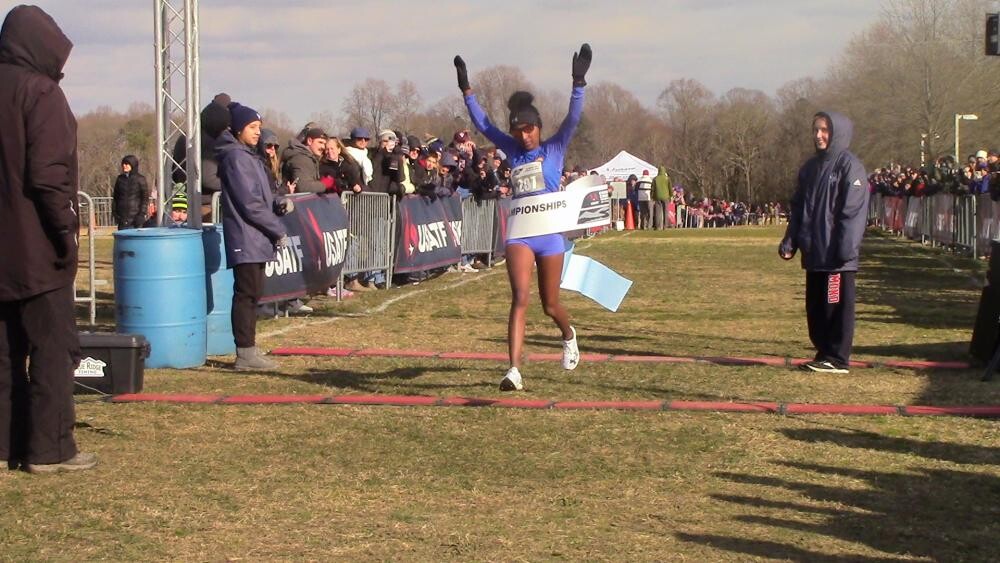
The top six finishers in each raced earned the right to represent Team USA at the World Cross Country Championships in Belgrade, Serbia, on March 30. Kelati’s coach/agent Stephen Haas told LetsRun last week that Kelati plans to run there while Teare’s agent Isaya Okwiya said Teare’s plans are still TBD.
High school junior Zariel Macchia of Shirley, N.Y., won the women’s U20 race in 20:31.0 for the 6k course; Macchia previously won the title as a freshman in 2022. Notre Dame freshman Kevin Sanchez won the men’s U20 title in 24:07.1 for the 8k course.
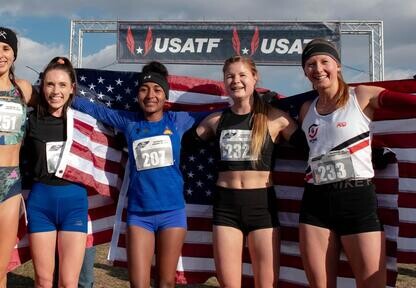
Cooper Teare shows his range with impressive victory
Teare was the 2021 NCAA 5,000m champion at the University of Oregon and has shown that his range extends both up and down the distance spectrum. Teare is the NCAA mile record holder at 3:50.39 and was the 2022 US champion at 1500 and now he is the US cross country champion. That sort of range has become increasingly common on the international level but in the US, it’s rare for a 1500 guy to run USA XC, let alone win it. Teare is the first man to win US titles at both 1500 meters and cross country since John Mason in 1968, and even that comes with a caveat as the US championships were separate from the Olympic Trials back then. Before Mason, the last guy to win both was Abel Kiviat (cross country in 1913, US mile title in 1914). You all remember him.
On the women’s side, Shelby Houlihan, since banned for a doping violation, won USA XC and the US 1500 title back in 2019.
Teare’s coach Ben Thomas told Carrie Tollefson, who was calling the race for USATF.TV, that the aim of this race was just to see where his fitness was at against a top field. Clearly, it’s very good. In his first race since leaving the Bowerman Track Club after the 2023 season, Teare, wearing a bright pink undershirt beneath his Nike singlet, ran with the lead pack until Morgan Pearson began to string things out just before entering the final 2k loop. As opposed to Pearson, who was giving it all he could to drop the field, Teare looked relaxed and in control, and at 9k he eased past Pearson into the lead before dropping the hammer to win comfortably. It was a smart run and an impressive display of fitness.
Teare may also have slayed some demons from his last cross country race in 2021, when he crawled across the finish line in the final meters. Now he’s gone from 247th at NCAA XC to a national champion.
Teare’s plans for the rest of the winter are up in the air. He will run in a stacked 2-mile at Millrose on February 11 against the likes of Grant Fisher and Josh Kerr before competing at USA Indoors a week later. World Indoors could be an option if he makes the team — as could World XC, if he wants it. No matter what he chooses, Saturday’s run was a great way for Teare to kick off the Olympic year.
Weini Kelati demolishes the competition
On paper, Kelati, who runs for Under Armour’s Dark Sky Distance team in Flagstaff, was the class of this field. The only question was whether she would be recovered from racing hard at last weekend’s Houston Half Marathon, where she set the American record of 66:25. The answer was a definitive “yes” as Kelati, after running with the leaders for the first 4k, dropped a 3:05 5th kilometer to break open the field. From there, her lead would only grow to the finish line as she won by a massive 37.3 seconds over runner-up Emma Hurley.
Kelati was not at her best heading into last year’s World XC in Australia as she had missed some time in the buildup due to injury. She still managed to finish a respectable 21st overall. Her aims will be much higher for this year’s edition in Belgrade.
Kelati also made some history with her win today. She’s the first woman to win Foot Locker, NCAA, and USA cross country titles.
by Jonathan Gault
Login to leave a comment
USATF Cross Country Championships
About USATF Based in Indianapolis, USA Track & Field (USATF) is the National Governing Body for track and field, long distance running, and race walking in the United States. USATF encompasses the world's oldest organized sports, the most-watched events of Olympic broadcasts, the number one high school and junior high school participatory sport, and more than 30 million adult runners...
more...Molly Seidel Stunned the World (and Herself) with Olympic Bronze in Tokyo. Then Life Went Sideways.
She stunned the world (and herself) with Olympic bronze in Tokyo. Then life went sideways. How America’s unexpected marathon phenom is getting her body—and brain—back on track.
On a clear December night in 2019, Molly Seidel was at a rooftop holiday party in Boston, wearing a black velvet dress, doing what a lot of 25-year-olds do: passing a joint between friends, wondering what she was doing with her life.
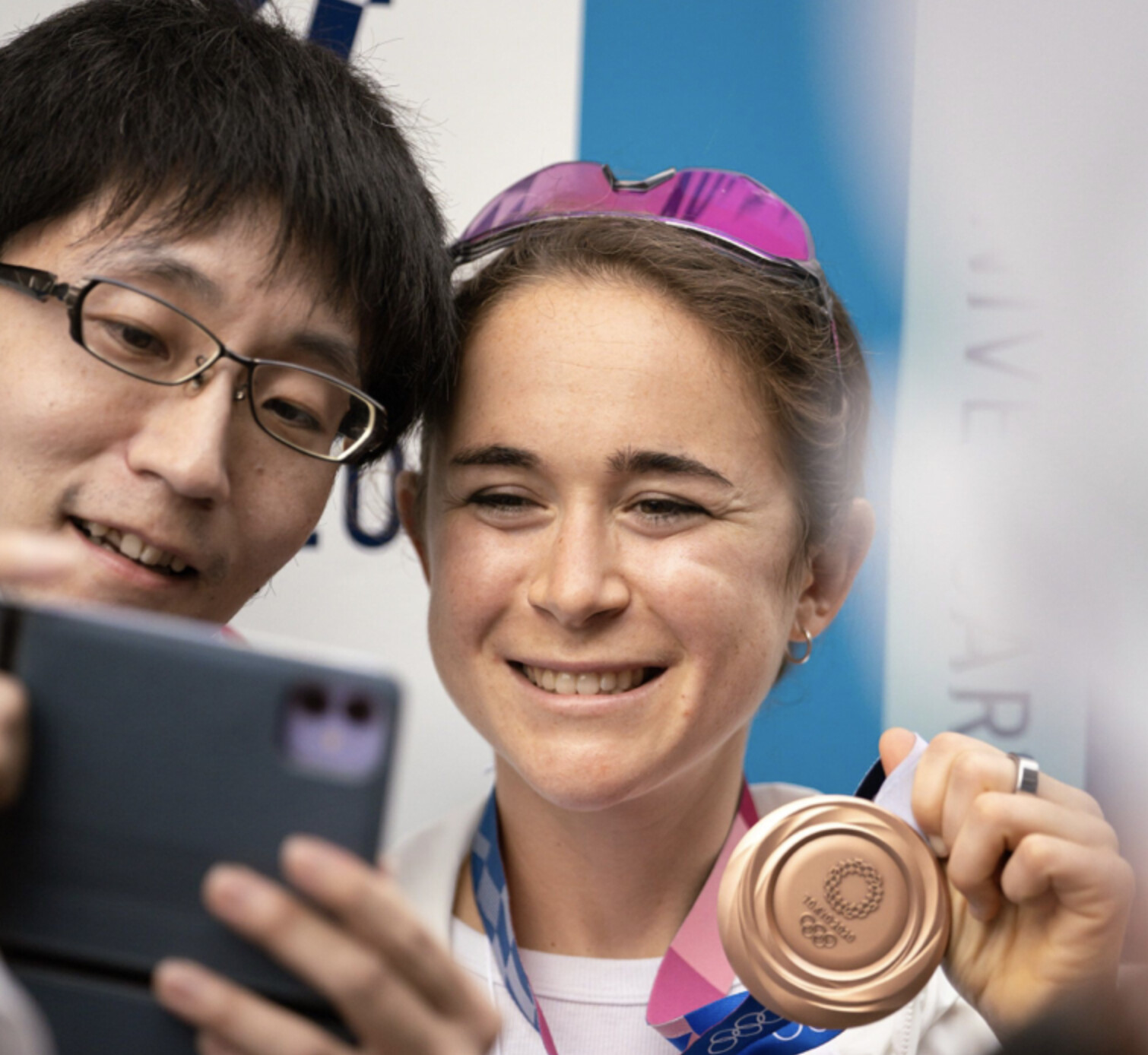
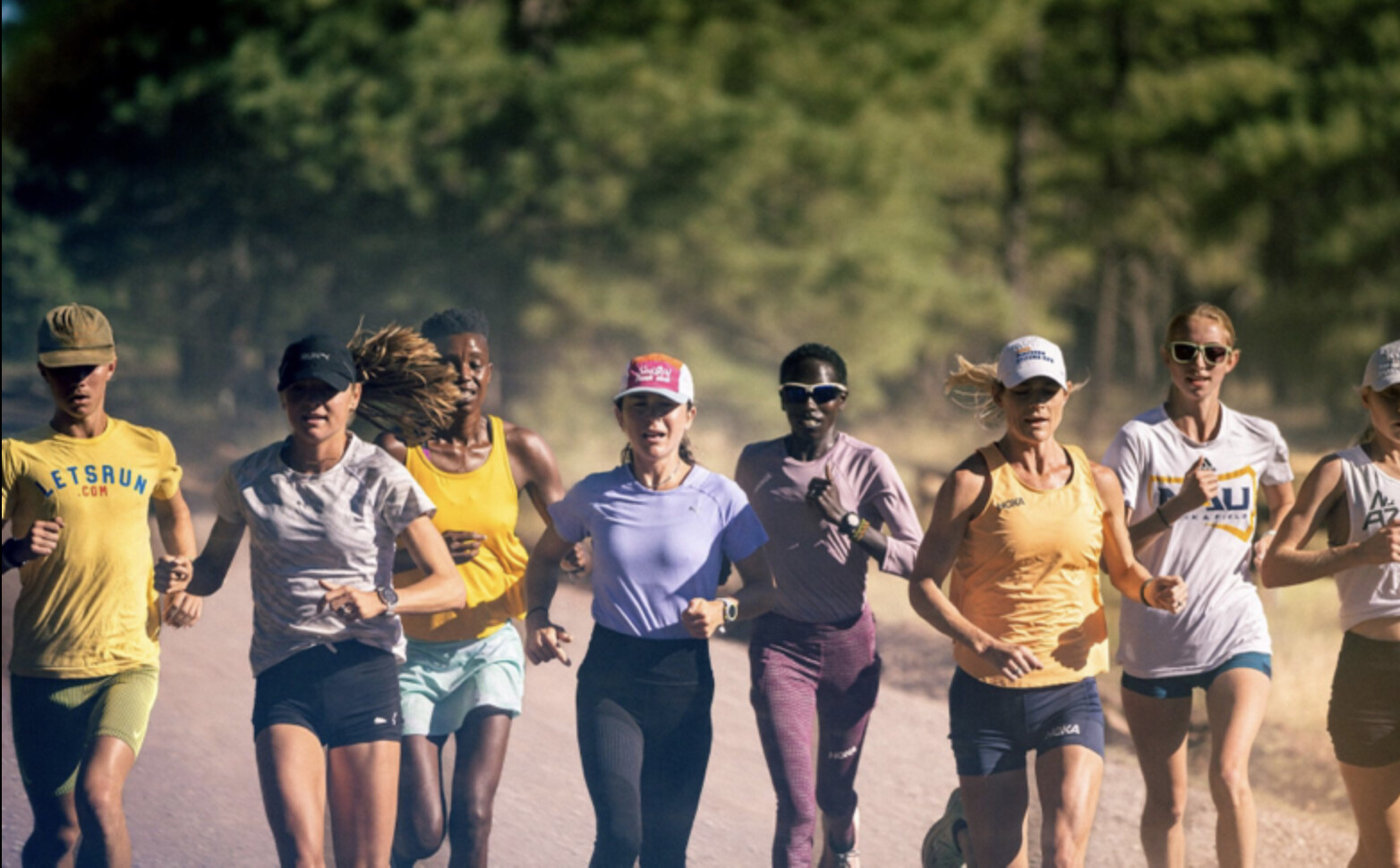
“You should run the Olympic Trials,” her sister, Izzy, said, as smoke swirled in the chilly air atop The Trackhouse, a retail shop and community hub on Newbury Street operated by the running brand Tracksmith. “That would be hilarious if you did that as your first marathon.”
Molly, an elite 10K racer who’d spent much of 2019 injured, looked out at the city lights, and laughed. Why the hell not? She’d just qualified for the trials, winning the San Antonio Half with a time of 1:10:27. (“The shock of the century,” as she’d put it.) True, 13.1 miles wasn’t 26.2—but running a marathon was something to do. If only because she never had before.
A four-time NCAA track and cross-country champion at The University of Notre Dame in Indiana, Molly had moved to Boston in 2017, where she’d worked three jobs to supplement her fourth: running for Saucony’s Freedom Track Club. The $34,000 a year that Saucony paid her (pre-tax, sans medical) didn’t go far in one of America’s most expensive cities. Chasing kids around as a babysitter, driving around as an Instacart shopper, and standing around eight hours a day as a barista—when you’re running 20 miles a day—wasn’t ideal. But whatever, she had compression socks. And she was downing free coffee and paying rent, flying to Flagstaff, Arizona, every so often for altitude camps, and having a good time. Doing what she loved. The only thing she’s ever wanted to do since she was a freckly fifth-grader in small-town Wisconsin clocking a six-minute mile in gym class.
“I was hustling, and I loved it. It was such a fun, cool time of my life,” she says, summarizing her 20s. Staring into Molly’s steely brown eyes, listening to her speak with such clarity and conviction about her struggles since, it’s easy to forget: She is still only 29.
After Molly had hip surgery on her birthday in July 2018, her doctors gave her a 50/50 chance of running professionally again. By summer 2019, she’d parted ways with FTC, which left her sobbing on the banks of the Charles River, getting eaten alive by mosquitoes and uncertainty. Her biggest achievement lately had been being named #2 Top Instacart Shopper (in Flagstaff; Boston was big-time).
The day after that rooftop party, Molly asked her friend and former FTC teammate Jon Green, who she’d newly anointed as her coach: “Think I should run the marathon trials?” Sure, he shrugged. Nothing to lose. Maybe it’d help her train for the 10K, her best shot—they both thought—at making a U.S. Olympic team.
“I’m going to get my ass kicked six ways to Sunday!” she told the host of the podcast Running On Om six weeks before the trials in Atlanta.
Instead, on February 29, 2020, she kicked some herself. Pushing past 448 of the fastest, most-experienced women marathoners in the country, coming in second with a 2:27:31, earning more in prize money ($60,000) than she had in two years of racing—and a spot on the U.S. trio for the 2020 Tokyo Olympics, along with Kenyan-born superstars Aliphine Tuliamuk and Sally Kipyego. “I don’t know what’s happening right now!” Molly kept saying into TV cameras, wrapped in an American flag, as stunned as a lottery winner.
Saucony who? Puma came calling. Along with something Molly hadn’t anticipated: the spotlight. An onslaught of social media followers. And two weeks later, a global pandemic and lockdown—and all the anxiety and isolation that came with it. She was drowning, and she hadn’t even landed in Tokyo yet.
The 2020 Olympics, as we all know, were postponed to 2021. An emotional burden but a physical boon for Molly, in that it allowed her to get in a second marathon. In London, she finished two minutes faster than her debut. When the Olympics finally rolled around, she was ready.
Before the race, Molly says, “I was thinking: ‘Once I cross the starting line, I get to call myself an Olympian and that’s a win for the day.’”
But then she crossed the finish line—with a finger-kiss to the sky and a guttural Yesss!—in third place with a 2:27:46, just 26 seconds behind first (Kenya’s Peres Jepchirchir). And realized: She gets to call herself an Olympic medalist forever. Only the third American woman to ever earn one in the marathon.
Lots of kids have fleeting hopes of making it to the Olympics. I remember thinking I could be Mary Lou Retton. Maybe FloJo, with shorter fingernails. Then I decided I’d rather be Madonna or president of the United States and promptly forgot about it. But Molly held tight to her Olympic aspirations. She still has a poster she made in 2004, with stickers and a snapshot of her smiley 10-year-old self, to prove it. “I wish I will make it into the Olympics and win a gold medal,” she wrote, and signed it: Molly Seidel, the “y” looping back to underline her name. In case there was any doubt as to who, specifically, would be winning the medal.
Molly grew up in Nashotah, Wisconsin, and is the eldest of three. Her sister and brother, younger by not quite two years, are twins. Izzy is a running influencer and corporate content creator for companies like Peloton; and Fritz favors Formula 1 racing and weightlifting and works for the family’s leather-tanning business. The family was active, sporty. Dad, Fritz Sr., was a ski racer in college; Mom, Anne, a cheerleader. You can tell. Watching clips of Molly’s mom and dad watching the Olympic race from their backyard patio, jumping up and down, tears streaming, is the kind of life-affirming moment you wish you could bottle. “I’m in shock. I’m in disbelief,” Molly says into the mic, beaming. “I just wanted to come out today and I don’t know…stick my nose where it didn’t belong and see what I could come away with. And I guess that’s a medal.” When the interviewer holds up her family on FaceTime, Molly breaks down. “We did it,” she says into the screen between sobs and smiles. “Please drink a beer for me.
Molly hasn’t always been unabashedly herself, even when everyone thought she was. A compartmentalizer to the core, she spent most of her life hiding a huge part of it: anorexia, bulimia, anxiety, obsessive-compulsive disorder, debilitating depression.
It started around age 11, when she learned to disguise OCD tendencies, like compulsively knocking on wood, silently reciting prayers “to avoid God getting mad at me,” she says. “It was a whole thing.” She says her parents were aware of the behaviors, but saw them more as odd little habits. “They had no reason to suspect anything. I was very high-functioning,” she says. “They didn’t realize that it was literally taking over my life.”
She wasn’t officially diagnosed with OCD until her freshman year of college, when she saw a therapist for the first time. At Notre Dame, disordered eating took hold, quietly yet visibly, as it does for up to 62 percent of female college athletes, according to the National Eating Disorders Association. As recently as the Tokyo Olympics, she was making herself throw up in the airport bathroom, mere days before taking the podium. Molly hesitates to share that detail; she fears a girl might read this and interpret it as behavior to model. “Having been in that place as a younger athlete, I know I would have,” she says. But she also understands: Most people just don’t get how unrelenting eating disorders can be.
In February 2022, she finally received a diagnosis of the root cause for all of it: ADHD. About being diagnosed, she says, “It made me feel really good, like [I don’t have] a million different disorders. I have a disorder that manifests itself in a lot of different symptoms.”
She waited to try Adderall until after the Boston Marathon in April, only to drop out at mile 16 due to a hip impingement. Initially, the meds made her feel fantastic. Focused. Free. Until she realized Adderall hurt more than it helped. She couldn’t sleep, couldn’t eat, lost too much weight. Within weeks, she devolved. “The eating disorder came roaring back,” she says, referring to it, as she often does, as its own entity, something that exists outside of herself. That ruthlessly takes control over her very need for control. “I almost think of it as an alter ego,” she explains. “Adderall was just bubblegum in the dam,” as she puts it. She ditched the drug, and her life—professionally, physically—unraveled.
In July 2022, heading into the World Championships, she bombed the mental health screening, answering the questions with brutal honesty. She’d been texting Keira D’Amato weeks prior. “Yo girl, things are pretty bad right now. Get ready…” Sobbing on the sidewalk in Eugene, Oregon, she texted D’Amato again. And the USATF made it official: D’Amato would take her spot on the team. Then Molly did what she’d been “putting off and putting off”— checked herself into eating disorder treatment for the second time since 2016, an outpatient program in Salt Lake City, where her new boyfriend was living at the time.
Somehow (see: expert compartmentalizer) mid-meltdown, in February 2022, she had met an amateur ultrarunner named Matt, on Hinge. A quiet, lanky photographer, he didn’t totally get what she did. “I didn’t understand the gravity of it,” he tells me. “I was like, Oh she’s a pro runner, that’s cool. I didn’t realize she was, like, the pro runner!”
Going back to treatment “was pretty terrible,” she says. At least she could stay with Matt. Hardly a honeymoon phase, but the new relationship held promise. “I laid it all out there,” says Molly. “And he was still here for it, for all the messiness. It was really meaningful.” And a mental shift. “He doesn’t see me as just Molly the Runner.”
Almost a year later, on a freezing April evening in Flagstaff, Molly is racing around Whole Foods, palming a head of cabbage, grabbing a thing of hummus, hunting for deals even though she doesn’t need to anymore.
“It’s all about speed, efficiency, and quality,” she says, explaining the secret to her earlier Instacart success. She checks the expiration date on a container of goat cheese and beelines for the butcher counter, scans it faster than an Epson DS3000, though not without calculation, and requests two tomato-and-mozzarella-stuffed chicken breasts. Then she darts over to the beverage aisle in her marshmallow-y Puma slip-ons that Matt custom-painted with orange poppies. She grabs a case of La Croix (tangerine), then zips to the checkout. We’re in and out in under 15 minutes and 50 bucks, nothing bruised or broken.
Other than her body. Let’s just say: If Molly were an avocado or a carton of eggs, she probably wouldn’t pass her own sniff test. The week we meet, she is just coming off a month of no running. Not a single mile. She’s used to running twice a day, 130 miles a week. No wonder she’s spraying her kitchen counter with Mrs. Meyer’s and scrubbing the stovetop within minutes of welcoming me into her new home.
The place, which she shares with Matt and his Australian border collie, Rye, has a post-college flophouse feel: a deep L-shaped couch draped in Pendleton blankets, a bar cluttered with bottles of discount wine, a floor lamp leaning like the Tower of Pisa next to a chew toy in the shape of a ranch dressing bottle. Scattered about, though, are reminders that an elite runner sleeps here. Or at least tries to. (“Pro runner by day, mild insomniac by night” reads the bio on her rarely used account on what used to be Twitter.) There’s a stick of Chafe Safe on the coffee table. Shalane Flanagan’s cookbooks on the counter. And framed in glass, propped on the office floor: Molly’s Olympic kit—blue racing briefs with the Nike Swoosh, a USA singlet, her once-sweat-drenched American flag, folded in a triangle. “I’m not sure where to hang it,” she says. “It seems a little ostentatious to have it in the living room.”
With long brown curls and a round, freckly face, Molly has an aw-shucks look so innocent that it’s hard, at first, to perceive her struggles. Flat-out ask her, though—How are you even functioning?—and she’ll tell you: “I’m an absolute wreck. There’s no worse feeling than being a pro runner who can’t run. You just feel fucking useless.” Tidying a stack of newspapers, she adds, “Don’t worry, I’ve had therapy today.”
She’s watched every show. (Save Ted Lasso, “too sickly sweet.”) Listened to every podcast. (Armchair Expert is a favorite.) She’s got nothing else to do but PT and go easy on the ElliptiGo in the garage, onto which she’s rigged a wooden bookstand, currently clipped with A History of God: The 4,000 Year Quest of Judaism, Christianity and Islam. “I don’t read running books,” she says. “I need something different.”
Like most runners—even the most amateur among us—running, moving, is what keeps her sane. “What about swimming? Can you at least swim?” I ask, projecting my own desperation if I were in her size 8.5 shoes. “I fucking hate swimming,” says Molly. Walking? “Oh, yeah, I can go on walks. Another. Long. Walk.”
The only thing she has on her schedule this week is pumping up a local middle school track team before their big meet. The invitation boosted her spirits. “Should I just memorize Miracle on Ice?” she says, laughing. “No, I know, I’ll do Independence Day.”
Injuries are nothing new for Molly. Par for the course for any professional athlete. But especially for women, like her, who lack bone density—and have since high school, when, according to a study in the Orthopedic Journal of Sports Medicine, nearly half of female runners experience period loss. Osteoporosis and its precursor, osteopenia, are rampant in female runners, leading to ongoing issues that threaten not just their college and professional running careers, but their lives.
Still, Molly admits, laughing: She’s especially accident-prone. I ask her to list every scratch she’s ever had, which takes her 10 minutes, and goes all the way back to babyhood, when she banged her head against the bathtub spout. There was a cracked spine from a sledding incident in 8th grade, a broken collarbone from a ski race in high school, shredded knee cartilage in college when a driver hit her while she was riding a bike. “Ribs are constantly breaking,” she says. In 2021, two snapped, and refused to heal in time for the New York City Marathon. No biggie. She ran through the pain with a 2:24:42, besting Deena Kastor’s 2008 time by more than a minute and setting the American course record.
Molly’s latest injury? Glute tear. “Literally a gigantic pain in the ass,” she posted on Instagram in March. Inside, Molly was devastated. Pulling out of the Nagoya Marathon—the night before her 6:45 a.m. flight to Japan, no less—was not in the plan. The plan, according to Coach Green, had been simple. It always is. If the two of them even have one. “Just to have fun and be consistent.” And get a marathon or two in before the Olympic Trials in February 2024.
She’d been finally—finally—fit on all fronts; ready to race, ready to return. She needed Nagoya. And then, nothing. “It feels like I’m back at the bottom of the well,” says Molly, driving home from Whole Foods in her Toyota 4Runner. “This last year-and-a-half has been so difficult. It’s just been a lot of doubt. How do I approach this, as someone who has now won a medal? Like, man, am I even relevant in this sport anymore?” She pops a piece of gum in her mouth. I wait for her to offer me some, because that’s what you do with gum, but she doesn’t. She’s so in her head. “It’s hard when you’re in the thick of it, you know, to figure out: Why the fuck do I keep doing this? When it just breaks my heart over and over and over again?”
We pull into her driveway. “I was prepared for the low period after Tokyo,” she says. “But this has been much longer and lower than I expected.”
The curse of making it to the Olympics, let alone coming back with a medal: expectations. Molly’s own were high. “I think I thought, after the Olympics, if I win a medal, then I will be fixed, it will fix everything.” Instead, in a way, it made everything worse.
That’s the problem that has plagued Molly for most of her running career: Her triumphs and troubles intermingle, like thunder and lightning. Which, by the way, she has been struck by. (A minor backyard-grill, summer-thunderstorm incident. She was fine.)
The next morning in Flagstaff, Molly’s feeling like she can run a mile, maybe two. It’s snowing, though, and she doesn’t want to risk the slippery track, so we meet at Campbell Mesa Trails. She loops a band around the back of her truck to stretch and sends me off into the trees to run alone while she does a couple of laps on the street.
Molly leaves for an acupuncture appointment, and we reunite later at Single Speed Coffee (“the best coffee in Flagstaff,” promises the ex-barista who drinks up to three cups a day). We curl up on a couch like it’s her living room, and she talks as freely—and as loudly—as if it was. Does she realize everyone can hear her? She doesn’t care. I guess that’s what happens when you’ve grown so comfortable sharing—in therapy, on podcasts, in a three-part video series on ADHD for WebMD—you just…share. Loud and proud.
Mental illness is so insidious, says Molly. “It’s not always this Sylvia Plath stick-my-head-in-a-fucking-oven thing, where you’re sad all the time,” she says. “High-functioning depressed people live normal successful lives. I can be having the happiest moment, and three days later I’m in a total downward spiral.” It’s something you never recover from, she says, but you learn to manage.
“I’m this incredibly flawed person who struggles so much. I think: How could I have won this thing when I’m so flawed? I look at all the people around me, all these accomplished people who have their shit together, and I’m like, ‘one of these things is not like the other,’” she says, taking a sip of her flat white. “I was literally in the Olympic Village thinking: Everybody is probably looking at me wondering: Why the hell is she here?”
They weren’t. They don’t. She knows that.
And yet her mind races as fast as she does. It takes up So. Much. Space. When she’s running, though, the noise disappears. She’s not Olympic Molly or Eating Disorder Molly, she’s not even, really, Runner Molly. “When I’m running,” she says, “I’m the most authentic version of myself.”
Talking helps, too. Molly first shared her mental health history a few years ago, “before she was famous,” as she puts it. After the Olympics, though, she kept talking and hasn’t stopped. The Tokyo Games were a turning point, she says. Suddenly the most revered athletes in the world were opening up about their mental health. Molly credits Simone Biles’s bravery for her own. If Biles, and Michael Phelps and Naomi Osaka, could come clean... then maybe a nerdy, niche-y, unlikely medaling marathoner could, too.
“Those guys got a lot more shit for it than I did,” says Molly. “I got off easy. I’m not a household name,” she laughs. She knows she can be candid and off the cuff—and chat freely in a not-empty café—in a way Biles never could. “I’m a nobody!” she laughs.
Still, a nobody with 232,000 Instagram followers whom she has touched in very IRL ways—becoming an unintentional poster woman for normalizing mental health challenges among athletes. “You are such an incredible inspiration,” @1percentpeterson posts, one comment of a zillion similar. “It’s ok to not be ok!” says another. Along with all the online love is, of course, online hate. Molly rattles off a few lowlights: “She’s an attention-seeking whore,” “Her bones are so brittle she’ll never race again,” “She’s running so badly and posting a lot she should really focus on her running more.” Molly finds it curious. “I’m like, ‘If you hate me, you don’t need to follow me, sir.’”
It’s Molly’s nobody-ness—what Outside writer Martin Fritz Huber called her “runner-next-door” persona, and I’ll just call “genuine personality”—that has made her somebody in running’s otherwise reserved circles.
Somebody who (gasp!) high-fives her sister in the middle of a major race, as she did at mile 18 of the 2021 New York City Marathon. “They shat on me in the broadcast for it,” she says. “They were like, ‘She’s not taking this seriously.’” (Except, uh, then she set the American course record, so…)
Somebody who, obviously, swears like a sailor and dances awkwardly on Instagram, who dresses up like a turkey, and viral-tweets about getting mansplained on an airplane. (“He starts telling me how I need to train high mileage & pulls up an analysis he’d made of a pro runner’s training on his phone. The pro runner was me. It was my training. Didn’t have the heart to tell him.”)
Somebody who makes every middle-aged mom-runner I know swoon like a Swiftie and say: “OMG! YOU HUNG OUT WITH MOLLY SEIDEL!!?” Middle-aged dad-runners, too. “I saw her once in Golden Gate Park!” my friend Dan fanboyed when he heard. “I waved!” Did she wave back? “She smiled,” he says, “while casually laying down 5:25s.”
And somebody who was as outraged as I was that I bought a $16 tube of French toothpaste from my hip Flagstaff motel. (It was 10 p.m.! It was all they had!) “For that price it better contain top-shelf cocaine,” she texted. Lest LetsRun commenters take that tidbit out of context: It’s a joke. It’s, in part, what makes Molly America’s most relatable pro runner: She’s not afraid to make jokes. (While we’re at it… Don’t knock her for smoking a little legal weed, either. That’s so 2009. Per the World Anti-Doping Agency: Cannabis is prohibited during competition, not at a Christmas party two months before it. Per Molly: “People would be shocked to know how many pro runners smoke weed.”)
I can’t believe I never asked to see it. Molly’s medal. A real, live Olympic medal. Maybe because it was tucked into a credenza along with Matt’s menorah and her maneki-neko cat figurines from Japan. But I think it was because hanging out with Molly felt so…normal, I almost forgot she’d won one.
People think elite distance runners have to be one-dimensional, she says. That they have to be sculpted, single-minded, running-only robots. “Because that’s what the sport has been,” she says.
Molly falls for it, too, she says. She scrolls the feeds, sees her fellow pros living seemingly perfect lives. She wants everyone to know: She’s not. So much so that she requested we not print the photos originally commissioned for this story, which were taken when she was at the lowest of lows. (“It’s been...refreshing...to be pretty open and real with Rachel [about] the challenges of the last year,” she wrote in an email to Runner’s World editors. “But the photos [were taken at] a time when I was really struggling and actively trying to hide how bad my eating disorder had become.”)
Molly finds the NYC Marathon high-five thing comical but indicative of a more serious issue in elite running: It takes itself too seriously. It’s too…elitist. Too stilted. “Running a marathon is a pretty freaking cool experience!” If you’re not having fun, she asks rhetorically, what’s the point? Still, she admits, she isn’t always having fun. Though you wouldn’t know it from her Instagram. “Oh, I’m very good at making it seem like I am,” she says.
She used to enjoy social media when it was just her friends. Before she gained 50,000 followers in a single day after the trials, and some 70,000 on Strava. Before the pandemic, before the Olympics. Keeping up with content became a toxic chore. “You feel like you’re just feeding this beast and it’s never going to stop,” she says. She’s taken to deleting the app off her phone, reloading it only to fulfill contractual agreements and post for her sponsors, then deleting it again.
As much as she hates having to post, she enjoys plugging products the only way that feels natural: through parody. As does Izzy, her influencer sister, who, like Molly, prefers to skewer rather than shill (à la their idea behind their joint Insta account: @sadgirltrackclub). “The classic influencer tropes make me want to throw up,” she says (perverse pun as a recovering bulimic not intended). “New Gear Drop!’ or ‘This is my Outfit of the Day!’ Cringe. “Hot Girl Instagram is not how I identify,” she says.
Nor is TikTok. “Sponsors tell me all the time: You should TikTok! I’m like, ‘I am not doing TikTok.’ I know how my brain works. They’ll say, ‘We’ll pay you less if you don’t’—and I’m, like, I don’t care.”
And to those sponsors who ghosted her after she returned to eating disorder treatment, good riddance. “Michelob dropped me like a bad habit,” she says. “Whatever. You have watery-ass beer anyway.”
To those who have stood by her, though, she’s utterly devoted. Pissed she couldn’t wear the Puma panther head to toe in Tokyo, Molly took off her Puma Deviate Elites and tied them over her shoulder, obscuring the Nike logo on her Olympic singlet for all the world to see. Or not see. “Nike isn’t paying my fucking bills.”
The love is mutual, says Erin Longin, a general manager at Puma. After decades backing legends like Usain Bolt, Puma was relaunching road running and wanted Molly as their guinea pig. “She’s a serious athlete and competitor, but she also has fun with it,” says Longin. “Running should be fun. Molly embodies that.” At their first meeting, in January 2020, Molly made them laugh and nerded out over their new shoes. “We all left there, fingers crossed she’d sign with us,” says Longin.
Come February, they all flipped out. Longin was watching the trials, not expecting much. And then: “We were all messaging, “OMG!!” Then Molly killed in London. Medaled in Tokyo. “What she did for us in that first year…” says Longin. “We couldn’t have planned it!”
Then came the second year, and the third, and throughout it all—injuries, eating disorder treatment, missed races, missed opportunities—Puma hasn’t flinched. “It’s easy for a company to do the right thing when everything is going great,” Molly posted in April, heartbroken from her couch instead of Heartbreak Hill. “But it’s when the sh*t hits the fan and they’re still right there with you….” She received 35,000 hearts—and a call from Longin: “You make me feel so proud.”
Does it matter to Puma if Molly never places—never races—again? “Nope,” Longin says.
My last afternoon in Flagstaff, it’s cloudy skies, still freezing. I find Molly on the high school track wearing neoprene gloves, black puffy coat, another pair of Pumas. Her breath is white, her cheeks red. Her legs churning in even, elegant strides. Upright, alone, at peace, backed by snow-dusted peaks. Running itself is what matters, not racing, she tells me. “I honestly don’t give a shit about winning,” she says. All she wants—really wants, she says—is to be healthy enough to run until she’s old and gray.
Molly’s favorite runner is one who didn’t get to grow old. Who made his mark decades before she was born: Steve Prefontaine. “Pre raced in such a genuine way. He made people feel something,” she says. “The sports performances you truly remember,” she adds, “are the ones where you see the struggle, the work, the realness.”
Sounds familiar. “I hate conversations like, ‘Who’s the GOAT?’” Molly continues. “Who fucking cares? Who’s got the story that’s going to get people excited? That’s going to make some kid want to go out and do it?”
I know one of those kids: My best friend’s daughter, Quinn, a rising track phenom in Oregon, who has dealt with anxiety and OCD tendencies. She has a picture of Molly Seidel, and her times, taped to her bedroom wall. This past May, Quinn joined Nike’s Bowerman Club. She was named Oregon Female Athlete of the Year Under 12 by USATF. She wants to run for Notre Dame.
“Quinn loves running more than anything,” her mom tells me, texting photos of her elated 11-year-old atop the podium. “But I don’t know…” She’s unsure about setting her daughter on this path. How could she not, though? It’s all Quinn wants to do. Maybe what Quinn, too, feels born to do.
It’ll be okay, I tell her, I hope. Quinn has something Molly never had: She has a Molly.
Molly and I catch up via phone in June. A team of doctors in Germany has overhauled her biomechanics. She’s been running 110 miles a week, feeling healthy, hopeful. Happy. A month later, severe anemia (and accompanying iron infusions) interrupts her summer racing schedule. She cancels the couple of 10Ks she had planned and entertains herself by popping into the UTMB Speedgoat Mountain Race: a 28K trail run through Utah’s Little Cottonwood Canyon—coming in second with a 3:49:58. Molly’s focus is on the Chicago Marathon, October 8th; her first major race in almost two years.
Does it matter how she does? Does it matter if she slays the Olympic Trials in February? If she makes it to Paris 2024? If she fulfills her childhood dream and brings home gold?
Nah. Not if—like Matt, like Puma, like, finally, even Molly herself—you see Molly the Runner for who she really is: Molly the Mere Mortal. She’s the imperfect one who puts it perfectly: What matters isn’t her time or place, how she performs on the pavement. Or social media posts. What matters—as a professional athlete, as a person—is how she makes people feel: human.
She’d been finally—finally—fit on all fronts; ready to race, ready to return. She needed Nagoya. And then, nothing. “It feels like I’m back at the bottom of the well,” says Molly, driving home from Whole Foods in her Toyota 4Runner. “This last year-and-a-half has been so difficult. It’s just been a lot of doubt. How do I approach this, as someone who has now won a medal? Like, man, am I even relevant in this sport anymore?” She pops a piece of gum in her mouth. I wait for her to offer me some, because that’s what you do with gum, but she doesn’t. She’s so in her head. “It’s hard when you’re in the thick of it, you know, to figure out: Why the fuck do I keep doing this? When it just breaks my heart over and over and over again?”
by Runner’s World
Login to leave a comment
The Road to the Paris Olympics and here is What You Need to Know.
American runners are about to begin training for the U.S. Olympic Trials Marathon
It’s early October, which means it’s the peak marathon season for many runners. But with an Olympic year on the horizon, it also means America’s top marathoners are about to hit the road to Paris.
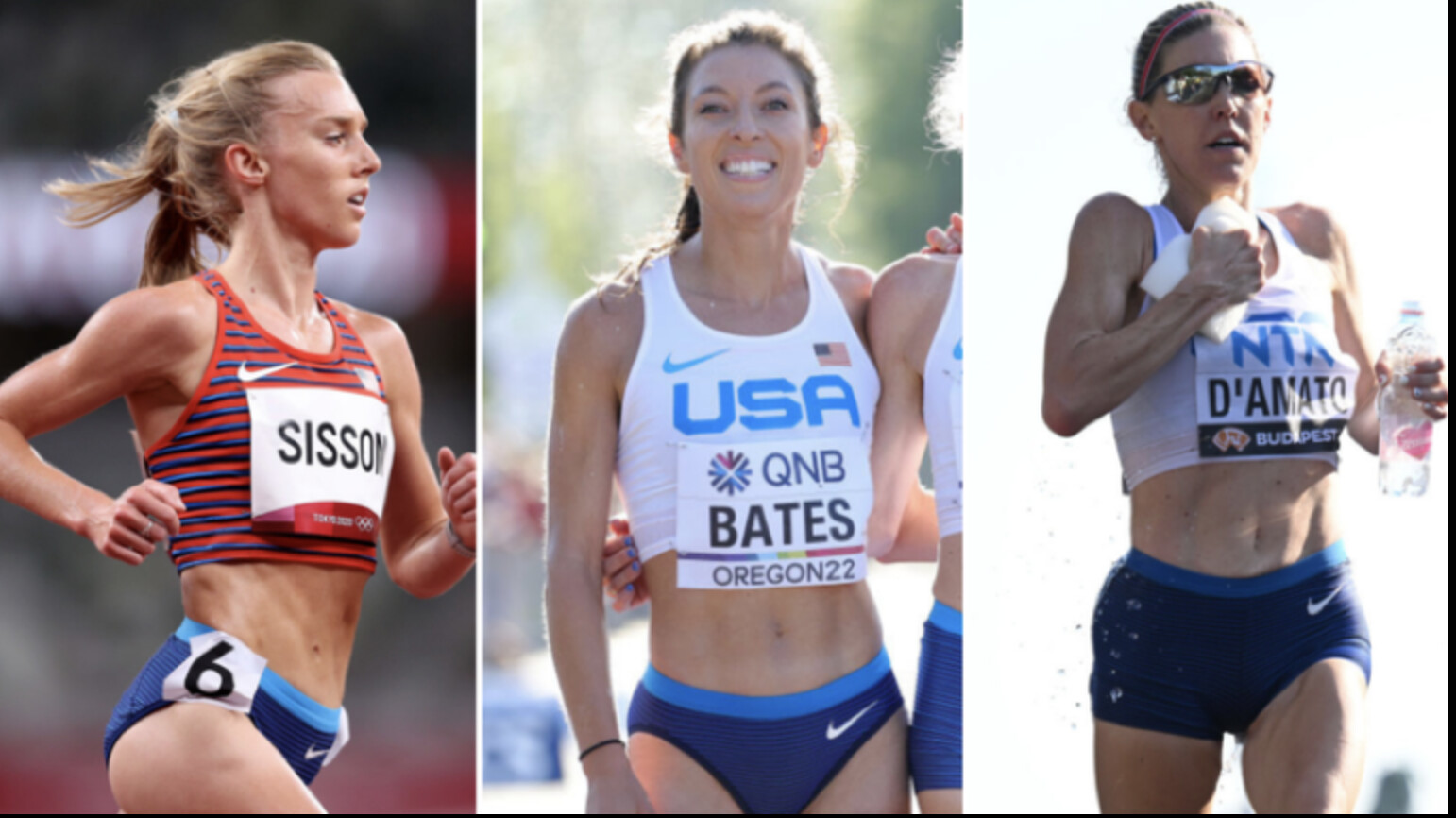
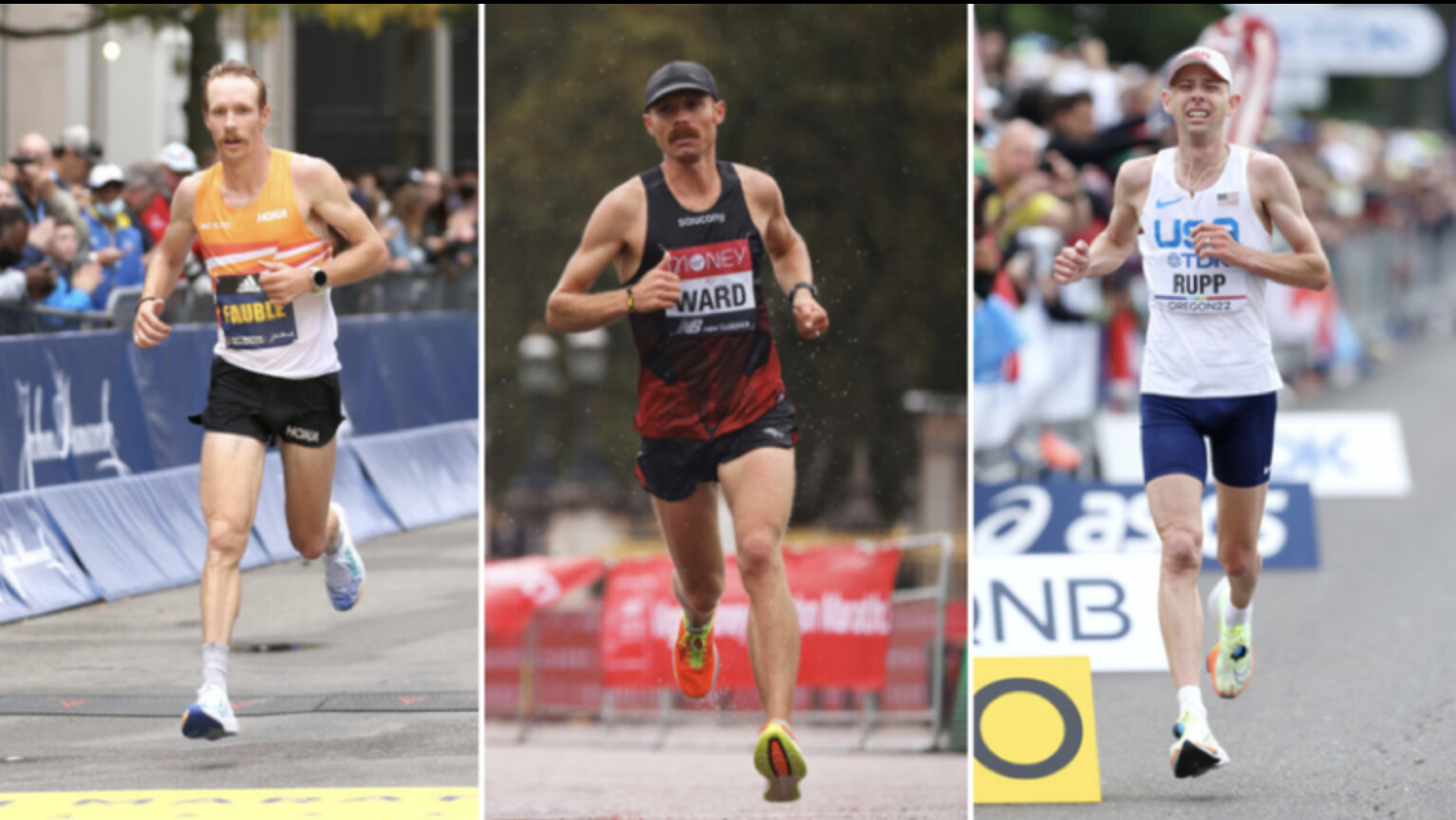
More specifically, the men’s and women’s 2024 U.S. Olympic Trials Marathon races—scheduled for February 3 in Orlando, Florida—are just four months away. And that means the top U.S. runners hoping to represent their country at next summer’s Olympics are about to begin preparing for the all-or-nothing qualifying race that decides which six runners will represent Team USA next summer on the streets of Paris.
Although several top American runners are racing the Chicago Marathon on October 8, even they have their eyes on a much bigger prize next February.
“There’s nothing in my mind that compares with being an Olympian and being in the Olympic Games,” says 26-year-old Utah-based Nike pro Conner Mantz, who returns to Chicago after finishing seventh last year in 2:08:16 in his debut at the distance. “So putting that first has been the plan for a long time. We’re just putting that first and we’re working backwards through the season with other races.”
Registration will open for the U.S. Olympic Trials Marathon in early November for runners who have surpassed the qualifying times in the marathon (2:18:00 for men, 2:37:00 for women) or half marathon (1:03:00 for men, 1:12:00 for women). The qualifying window extends through December 3—the race date of the last-chance California International Marathon, which for decades has been one of the most popular Olympic Trials qualifying races.
In 2020, a record 708 runners—465 women and 243 men—qualified for the U.S. Olympic Trials Marathon in Atlanta just before the onset of the Covid-19 pandemic. But USA Track & Field lowered the women’s qualifying standard by eight minutes from the more attainable 2:45:00 plateau, which means there will most likely be a much smaller women’s field this year.
But even so, amid the handful of runners who have a legitimate shot at making the Olympic team, there will also be dozens of dreamers, wannabes, and just-happy-to-be-there elite amateurs who have worked hard, put in the miles, and earned the chance to be on the start line of the deepest and most competitive U.S. distance-running races that only happen once every four years.
The men’s and women’s races will run simultaneously with the men beginning at 12:10 P.M. EST. and the women starting 10 minutes later. Runners have complained that a high noon start means they will be forced to race in hot, humid conditions. Over the past decade, the average temperature on February 3 in Orlando has been 69.6 degrees Fahrenheit at noon, rising to 73.3 at 4 PM. But actual temperatures have varied drastically, from 81 degrees Fahrenheit at 2 P.M. last year to 56 at the same time the year before. USATF officials have responded by saying that the start times are to accommodate live coverage on NBC and to match the expected conditions in Paris.
Here’s an update and overview of what’s next, who the top contenders are, the course, and what to expect in the next four months.
The 26.2-mile U.S. Olympic Trials course runs through downtown Orlando and consists of one 2.2-mile loop and three eight-mile loops. The marathon course will run through several neighborhoods, main streets, and business districts in Orlando, including Central Business District, City District, South Eola, Lake Eola Heights Historic District, Lake Cherokee Historic District, Lake Davis Greenwood, Lake Como, North Quarter, Lawsona/Fern Creek, SoDo District, and the Thornton Park neighborhood. It will then head east to and around The Milk District neighborhood and Main Street. (Notably, the course will come close to Disney World, which is about 15 miles to the southwest.)
Unlike the Olympic Marathon course in Paris, which will challenge runners with significant hills in the middle, the Orlando course is mostly flat. Each loop has a few minor variations in pitch, but only 38 feet separate the high and low points on the course. Ultimately, though, it’s a spectator-friendly route with chances for family, friends, and fans of runners to see the action several times.
The top women—based on personal best times and recent race results—are Emily Sisson, Emma Bates, Keira D’Amato, Betsy Saina, and Lindsay Flanagan. But the U.S. Olympic Trials races almost always produce surprises with a few great runners having off days and a few good runners having exceptional days, so there is reason to expect the unexpected.
Sisson lowered the American record to 2:18:29 last year when she finished second in the Chicago Marathon. She’s running Chicago again on October 8 along with Bates, who has said she’s hoping to break the American record. In January, Sisson, 31, chopped her own American record in the half marathon in Houston with a 1:06:52 effort, and most recently won the U.S. 20K Championships (1:06:09) on September 4 in New Haven, Connecticut. Bates, also 31, hasn’t raced at all since her sterling fifth-place effort at the Boston Marathon in April, when she slashed her personal best to 2:22:10.
While Chicago will be another good place to test themselves, both have unfinished business after Bates was seventh at the 2020 Trials and Sisson dropped out near the 21-mile mark.
The same goes for Flanagan, 32, who has been one of America’s best and most consistent marathoners for the past five years. She placed 12th at the trials in 2020. She had a breakthrough win (2:24:43) at the Gold Coast Marathon in 2022 followed by a strong, eighth-place finish (2:26:08) at the Tokyo Marathon earlier this year. In August, she ran perhaps the best race of her career, when she finished ninth (2:27:47) at the world championships in Budapest amid hot, humid conditions.
The 38-year-old D’Amato, meanwhile, just capped off another strong season with a 17th-place showing (2:31:35) at the World Athletics Championships in Budapest, a year after finishing eighth in the world championships and setting an American record 2:19:12 at the 2022 Houston Marathon. She was 15th at the Trials in 2020 in 2:34:24, just two years into her competitive return to the sport after having two kids and starting a career in real estate in her early 20s.
“It’s such a huge goal of mine to become an Olympian,” says D’Amato, who lowered Sisson’s U.S. record in the half marathon with a 1:06:39 effort at the Gold Coast Half Marathon on July 1 in Australia. “It’s really hard for me to put words into this because my whole life, wearing a Team USA jersey has been like a huge dream. And when I left the sport (temporarily), I felt like I said goodbye to that dream and I kind of mourned the loss of being able to represent my country. I feel like it’s the greatest honor in our sport to be able to wear our flag and race as hard as possible.”
Saina, a 35-year-old Kenya-born runner who ran collegiately for Iowa State University, became a U.S. citizen in late 2021. She placed fifth in the 10,000-meters at the 2016 Olympics in Rio de Janeiro while competing for Kenya. She’s spent the past several years splitting time between Kenya and Nashville, Tennessee, where she gave birth to a son, Kalya, in December 2021.
She’s returned with a strong fourth-place 1:11:40 result at the Tokyo Half Marathon last October and a fifth-place 2:21:40 showing at the Tokyo Marathon in February. In May, Saina won the U.S. 25K Championships in Michigan. Two weeks ago she broke the tape at the Blackmores Sydney Marathon in Australia in 2:26:47.
Other top contenders include but are not limited to Tokyo Olympics bronze medalist Molly Seidel (who’s personal best is 2:24:42), 2022 U.S. Olympic Trials champion Aliphine Tuliamuk (2:24:37, 11th in Boston this year), Susanna Sullivan (2:24:27 personal best, 10th in London this year), two-time Olympian and 2018 Boston Marathon winner Des Linden (2:22:38), and Sara Hall (2:20:32, fifth at last year’s world championships), plus Kellyn Taylor (2:24:29), Nell Rojas (2:24:51), Sarah Sellers (2:25:43), Lauren Paquette (2:25:56), Dakotah Lindwurm (2:25:01), Annie Frisbie (2:26:18), Sara Vaughn (2:26:23), Tristin Van Ord (2:27:07), and Jacqueline Gaughan (2:27:08).
The list of potential men’s top contenders isn’t as clear-cut, partially because there are so many sub-2:11 runners and several fast runners who are relatively new to the marathon. But all that suggests a wide-open men’s race where more than a dozen runners are legitimately in the mix for the three Olympic team spots. That said, the top runners on paper, based on both time and consistent results over the past few years, are Scott Fauble, Jared Ward, Galen Rupp, Conner Mantz, Leonard Korir, Matt McDonald, and C.J. Albertson.
The 31-year-old Fauble, who was 12th in the Olympic Trials in 2020 and owns a 2:08:52 personal best, has finished seventh in the Boston Marathon three times since 2019 and also finished seventh in the New York City Marathon in 2018. Ward is a 2016 U.S. Olympian and has three top-10 finishes at the New York City Marathon and a 2:09:25 personal best from Boston in 2019. He’s 35, but he just ran a 2:11:44 (27th place) at the Berlin Marathon in late September.
Rupp, who won the past two U.S. Olympic Trials Marathons and earned the bronze medal in the marathon at the 2016 Olympics, is nearing the end of his competitive career. He boasts a 2:06:07 personal best and has run under 2:10 more than any American in history, including when he finished 19th at the world championships (2:09:36) last year. He’s a bit of a wild card because he’s 37 and hasn’t raced since his lackluster 17th-place showing at the NYC Half Marathon (1:04:57) in March, but the world will get a glimpse of his fitness in Chicago this weekend.
Mantz followed up his solid debut in Chicago last fall with a good Boston Marathon in April (11th, 2:10:25) and solid racing on the track and roads all year, including his recent runner-up showings at the Beach to Beacon 10K in August and the U.S. 20K Championships in September.
McDonald, 30, who was 10th in the 2020 U.S. Olympic Trials, has quietly become one of the best marathoners in the U.S. while serving as a postdoctoral associate in chemical engineering at M.I.T. His last three races have clocked in at 2:10:35 (Boston 2022), 2:09:49 (Chicago 2022), and 2:10:17 (Boston 2023). The only other runner who rivals that kind of consistency is Albertson, 29, who has run 2:10:23 (Boston 2022), 2:10:52 (Grandma’s Marathon 2022) and 2:10:33 (Boston 2022) in his past three marathons and was seventh in the U.S. Olympic Trials in 2020 (2:11:49).
The men’s race will likely have a mix of veteran runners and newcomers who have run in the 2:09 to 2:10 range since 2022. Among those are 2020 U.S. Olympic Trials runner-up Jake Riley (2:10:02 personal best), who is returning from double Achilles surgery; 2016 U.S. 10,000-meter Olympian Leonard Korir (2:07:56), who ran a 2:09:31 in Paris in April; Zach Panning (2:09:28, plus 13th at the world championships in August); U.S. 25K record-holder Parker Stinson (2:10.53); Futsum Zienasellassie who won the California International Marathon last December in his debut (2:11:01) and then doubled-back with a new personal best (2:09:40) at the Rotterdam Marathon in the spring; Abbabiya Simbassa, who ran a solid debut marathon (2:10:34) in Prague this spring; and Eritrean-born Daniel Mesfun (2:10:06) and Ethiopian-born Teshome Mekonen (2:10:16), who both received U.S. citizenship within the past year; and solid veterans Nico Montanez (2:09:55), Elkanah Kibet (2:10:43) and Nathan Martin (2:10:45).
Additional sub-2:12 runners who will be in the mix are Andrew Colley (2:11:26), Clayton Young (2:11:51), Brendan Gregg (2:11:21), Josh Izewski (2:11:26), Jacob Thompson (2:11:40), and Kevin Salvano (2:11:49).
As noted previously, some top contenders will season their marathon legs one final time at the flat and fast Chicago Marathon on October 8. An even more select few will opt for the New York City Marathon on November 5. After that, nearly every American with eyes set on an Olympic berth will double-down over the holiday season for that one final, critical marathon training cycle. Expect to see a wide range in heat training, from sauna protocols, to warm weather training trips, to simply an adjusted race day strategy.
Of course, with the Olympic Marathon falling under the purview of World Athletics, qualifying for the U.S. Olympic Marathon team is not quite as simple as finishing on the podium in Orlando. Any American looking to have a breakout performance and finish within the top three at the U.S. Olympic Trials Marathon will need to have run under 2:11:30 for men and 2:29:30 for women within the qualification window, which spans from November 1, 2022 to April 30, 2024. Given the possibility of oppressively hot and humid temps on February 3 in Orlando, they’re best bet is to secure that time now.
These qualification standards are in accordance with a new rule from World Athletics, which allows national Olympic committees to circumvent the typical Olympic qualification process of running under 2:08:10 for men and 2:26:50 for women, or being ranked among the top 65 in the world on a filtered list of the top three athletes from each country. The catch, though, is that three other runners from said country must have met one of these two standards. If this sounds complicated, that’s because it is.
For the hundreds of elite amateurs on the cusp of hitting that coveted U.S. Olympic Trials qualifying time, it’s do or die mode. While a few made the cut at the Berlin Marathon on September 24, one of those opportunities was lost when the Twin Cities Marathon was canceled on October 1 because of excessive heat. Temperatures are shaping up for an auspicious day in Chicago this weekend, and many more will give it a final shot at the Columbus Marathon on October 15; Indianapolis Monumental Marathon on October 28; the Philadelphia Marathon on November 18; and the last-call California International Marathon, a point-to-point race ending in Sacramento, California on December 3.
Ultimately, only six American runners will likely continue on along the road to Paris and earn the chance to run in the men’s and women’s Olympic marathons next August 10-11. For a handful of younger runners, the 2024 U.S. Olympic Trials will be a motivation to reinvigorate the Olympic dream or keep a faint hope alive, at least until the 2028 U.S. Olympic Trials that will determine the team for the Los Angeles Olympics. But for many runners, the journey to the U.S. Olympic Trials in Orlando will lead to the end of their competitive road running careers as new jobs, young families, a switch to trail running, and other priorities will take hold.
“I think the Olympic Trials is an important part of American distance running,” says Kurt Roeser, 36, a two-time U.S. Olympic Trials Marathon qualifier who works full-time as a physical therapist in Boulder, Colorado. “I’m glad that they kept it the same event for this cycle and hopefully for future cycles because it gives people like me a reason to keep training. I’m older now and I’m not going to actually have a chance to make an Olympic team, but for somebody that’s fresh out out of college and maybe they just barely squeak in under the qualifying time, maybe that’s the catalyst they need to start training more seriously through the next cycle. And maybe four years from now, they are a serious factor for making the team.”
by Outside Online
Login to leave a comment
Stacy Ndiwa debuts World Marathon Majors in Chicago
Seven months after winning the Los Angeles Marathon, Stacy Ndiwa will be returning to American soil in search of her first World Marathon Majors title at the Chicago Marathon on October 8.
The former Commonwealth Games 10,000m silver medalist, will be up against top marathon runners across the world led by the defending champion Ruth Chepngetich.
Chepngetich has a personal best of 2:14:18. Another Kenyan Joyciline Jepkosgei (2:17:43) will also be competing.
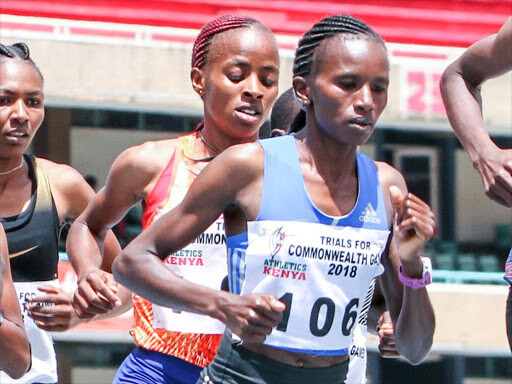
Ndiwa, who is now training in Iten, said her preparations are in top gear and she is hoping to return good results.
“This will be my first time to compete in World Marathon Majors and I am ready for the world,” she said.
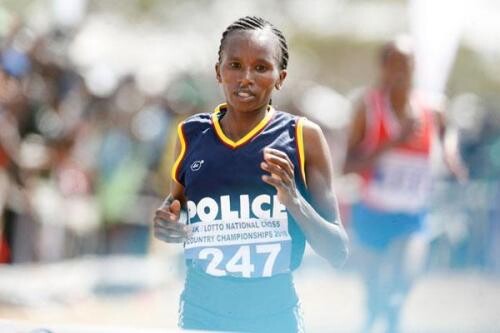
The former Africa 10,000m champion made her debut in the 42km race last year, placing fourth at the Istanbul Marathon in 2:31.53 and went ahead to win the Los Angeles Marathon in 2:31.00 in March last year.
In May, Ndiwa won the second edition of the Iten 15km Road race and went ahead to finish second at the Boston 10km in 31:25 behind champion Hellen Obiri (32:21) with Sheila Chepkirui (31:27) third in an all-podium Kenyan sweep.
“This time, I have had a very busy schedule and I need to crown it all by posting better results in Chicago,” said the athlete who compete for the National Police Service.
“This will be an avenue for me to enter into the big marathon big league. Competing at the World Majors Marathon is not a walk in the park and I really need to work hard,” she said.
Others in the race will be the Ethiopian quartet of Genzebe Dibaba (2:18:05), Tigist Girma (2:18:52), Sutume Kebede (2:18:12) and Ababel Yesheneh (2:20:51).
Emily Sisson (2:18:29) will lead the home team consisting of Des Linden (2:22:38), Emma Bates (2:23:18), Aliphine Tuliamuk (2:24:37), Nell Rojas (2:24:51), Molly Seidel (2:24:42), Dakotah Lindwurm (2:25:01), Sara Vaughn (2:26:23), Gabriella Rooker ( 2:27:38), Diane Nukuri (2:27:50) and Maggie Montoya (2:28:07).
Reigning London Marathon champion Sifan Hassan (2:18:33) from the Netherlands will also be in the contest.
by Emmanuel Sabuni
Login to leave a comment
Bank of America Chicago
Running the Bank of America Chicago Marathon is the pinnacle of achievement for elite athletes and everyday runners alike. On race day, runners from all 50 states and more than 100 countries will set out to accomplish a personal dream by reaching the finish line in Grant Park. The Bank of America Chicago Marathon is known for its flat and...
more...Ethiopian Jemal Yimer successfully defended his men’s open division crown at the 46th running of the Boilermaker 15K
Jemal Yimer of Ethiopia successfully defended his men’s open division crown at the 46th running of the Boilermaker 15K Road Race presented by Excellus BlueCross BlueShield, shattering the event record he set last year by 32 seconds.
Yimer won the event in 42 minutes and six seconds, besting Kenyans John Korir and Charles Langat who finished second and third respectively, in a race that saw the top four men beat the event record.
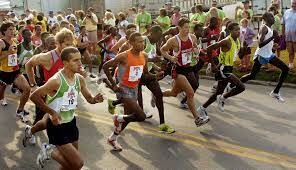
Runners took advantage of the cloudy conditions to get off to a fast start with an unusually large lead pack of about 16 runners staying together through the 2-mile mark. The lead pack dwindled to nine by the 5K mark, with Yimer, Langat and early leader Omar Ait Chitachen pushing the pace.
Yimer began to assert himself further on mile five, pushing the pace with a 4:08 split on the mostly downhill stretch. Tuliamuk fell off the pace by the seventh mile, leaving just Yimer, Langat and Korir to battle for the title. Yimer broke away from there, leading to a relatively comfortable win.
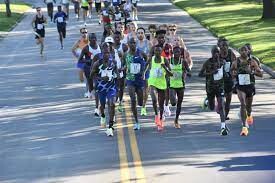
Reid Buchanan of San Diego, CA led American males with his seventh place finish, crossing the line in 43:44.
Kenyan Jesca Chelangat broke Edna Kiplagat’s 13-year old event record, taking home the women’s open division crown with a time of 47 minutes and 33 seconds. Chelangat bested Kiplagat’s record, which was set in 2010 by 24 seconds, beating fellow Kenyan Sarah Naibei by one minute and 13 seconds.
Kilpagat did not stay out of the Boilermaker record book for long, however, as her fourth overall finish in the Women’s Open Division was more than enough to break the women’s master’s division (over 40). Her time of 49:11 beat Edith Masai’s 2002 record by 1 minute and 29 seconds.
The American women’s contingent was led by Aliphine Tuliamuk of Arizona, who finished in fifth place overall with a time of 49:18. Racing at the Boilermaker as a professional for the first time, three-time 5K champion Jessie Cardin of Rochester Hills, MI, was the second best American female, finishing ninth overall with a time of 49:46.
Canadian Josh Cassidy took home the men’s open wheelchair division with a time of 33:10, beating Manuel Vergara of California who finished second with a time of 34:52.
2022 Women’s Wheelchair Open Division champion Jenna Fesemyer of Illinois defended her Boilermaker Crown, finishing in 40:32, 1 minute and six seconds in front of second-place finisher Yen Hoang of Champaign IL.
19-year-old D. Casey Malloy of New Hartford won the 5K Road Race presented by Utica National in 15:56, crossing the finish line 12 seconds ahead of second-place finisher Tyler Vega of Elkton, MD. Ashley Rathbun of Springfield, NJ won the women’s open division of the 5K, with a time of 20:23.
This year’s 15K race saw 6973 finishers with the 3125 crossing the finish line for the 5K, up from 5848 and 2469 respectively in 2022.
“Today was an absolutely amazing day for our race,” said Boilermaker race director Jim Stasaitis. “The weather turned out to be perfect for the runners and spectators alike. Seeing three records fall was something that is special and rare. We celebrate with each and every one of the record holders, including the everyday athletes who set personal bests today.”
by Running USA
Login to leave a comment
Boilermaker 15k
The Boilermaker 15K is the premier event of Boilermaker Weekend. This world krenowned race is often referred to as the country's best 15K. The Boilermaker 15K is recognized for its entertaining yet challenging course and racing's best post-race party, hosted by the F.X. Matt Brewing Company, featuring Saranac beer and a live concert! With 3 ice and water stops every...
more...Bill Thorn Ends His 53-Year Peachtree Road Race Run Streak This July 4
The 92-year-old is the only runner to have completed the famous 10K every year since it began in 1970.
This year’s running of the historic Peachtree Road Race in Atlanta will mark the end of an era. Bill Thorn, the only person to have run what has become the largest 10K in the world every year since it began in 1970, is ending his 53-year race streak. At 92 years old, Thorn thinks it’s finally time. He’s dealt with balance issues over the past few years, and has been racing with the aid of a walker.
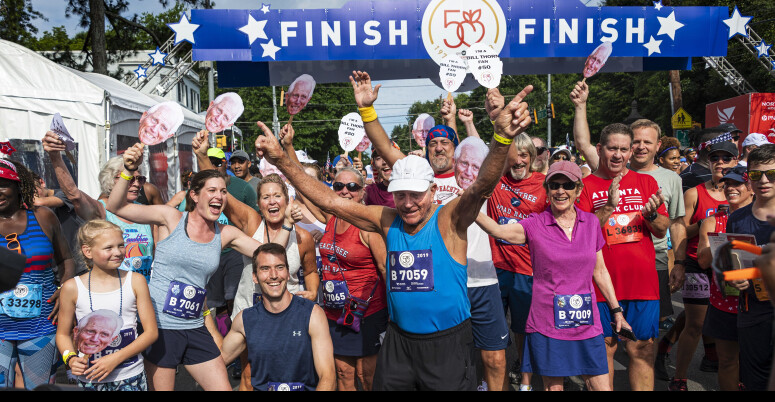
“It’s been really exciting over the years, but there comes a time when you have to let go,” he said in an Atlanta Track Club press statement.
In a year that features the deepest women’s field in the history of the race, including five women who have personal bests faster than the course record of 30:22, it’s not just the elite runners who will be anticipated at the finish line.
On Tuesday, Thorn will be honored as the Peachtree’s Grand Marshal, and he’ll be chauffeured down the 6.2-mile course that he arguably knows better than anyone else in history. Just before the finish in Piedmont Park, he’ll emerge from the vehicle to be celebrated as he crosses the finish line on foot for the last time.
“There is only one way to stop worrying about not finishing, and that is to just be finished,” he said, “I’m going into a new era.”
Thorn has been a lover and booster of running for a long time. He coached athletes across various sports for 64 years, and in 2019, he retired from Landmark Christian School in Fairburn (an Atlanta suburb) where since 1995, he’d led his teams to 42 state championships in football, track, and cross-country.
For many years, Thorn had good company as one of the “Original 110” finishers from the inaugural 1970 road race, but those numbers dwindled over time. He and Don Gamel were the only two who ran every year through 1992, and by 1993, Thorn was carrying that torch alone.
Every Fourth of July, he’s shown up on the start line and hustled up the infamous “Cardiac Hill” in the stifling summer heat and Georgia humidity, whether he was coping with an ankle sprain, heel gash, or something as serious as prostate cancer. In his younger years, he raced his fastest times in the 39-minute range, but over time, the race became more about having fun with his family—his 30-year-old granddaughter, Kenzie Bayman, was his “race day buddy” for several years. The senior runner has been completing the race virtually since the COVID-19 pandemic, running a carefully measured route in his neighborhood.
On the Peachtree’s 50th anniversary in 2019, Thorn said, “It could’ve been just a fad, but as you go along through the years, people like Julia [Emmons, the former Atlanta Track Club Executive Director] says to me every once in a while to ‘keep going’ and that was really encouraging, and so it just became a year after year thing.”
This year, Thorn will be honored with his name engraved on the Peachtree Cup, an honor that up until now has been reserved for race champions, including Aliphine Tuliamuk, Stephanie Bruce, and Jeff Galloway. This distinction is all his own. “No one else will ever be able to say they did the first 50,” he said.
You can stream the AJC Peachtree Road Race on the 11Alive YouTube channel on Tuesday for free. The elite women will start at 6:50 a.m. ET and the elite men will set off at 7 a.m. ET.
by Runner’s World
Login to leave a comment
Kiptoo, Masai seeking big performances at Bolder Boulder
It's time to be bold for NAZ Elite.
The running team is sending Wesley Kiptoo and Alex Masai to the BOLDERBoulder 10K road race in Colorado set for Monday with the hopes of making some noise on the men's side of the prestigious event after producing some solid outings on the women's side the last few years.
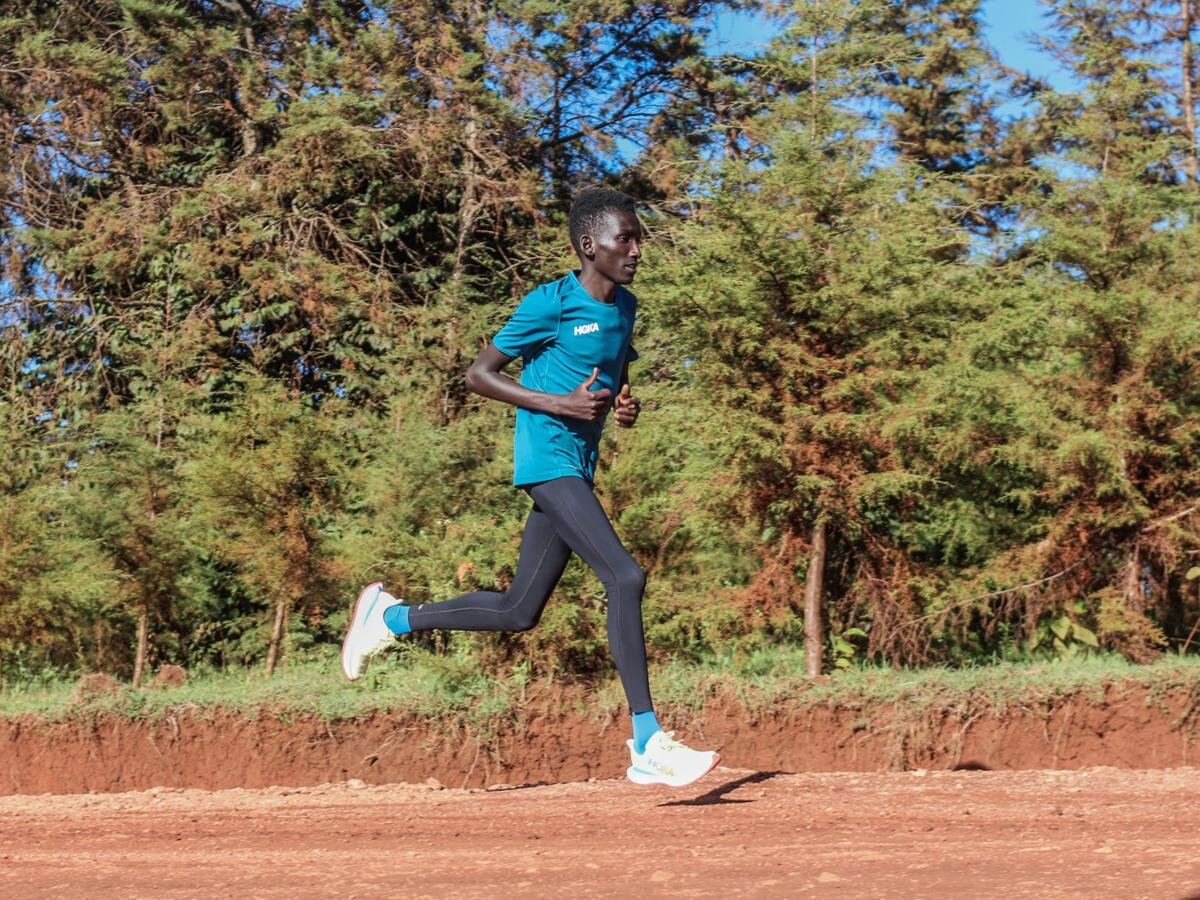
Last year's BOLDERBoulder champion, in fact, was NAZ Elite's Aliphine Tuliamuk, who finished in third place at the 2019 edition of the race and was runner-up in 2018.
“We would love to win on the men’s side, but it’s really, really hard," NAZ Elite Executive Director Ben Rosario said Wednesday.
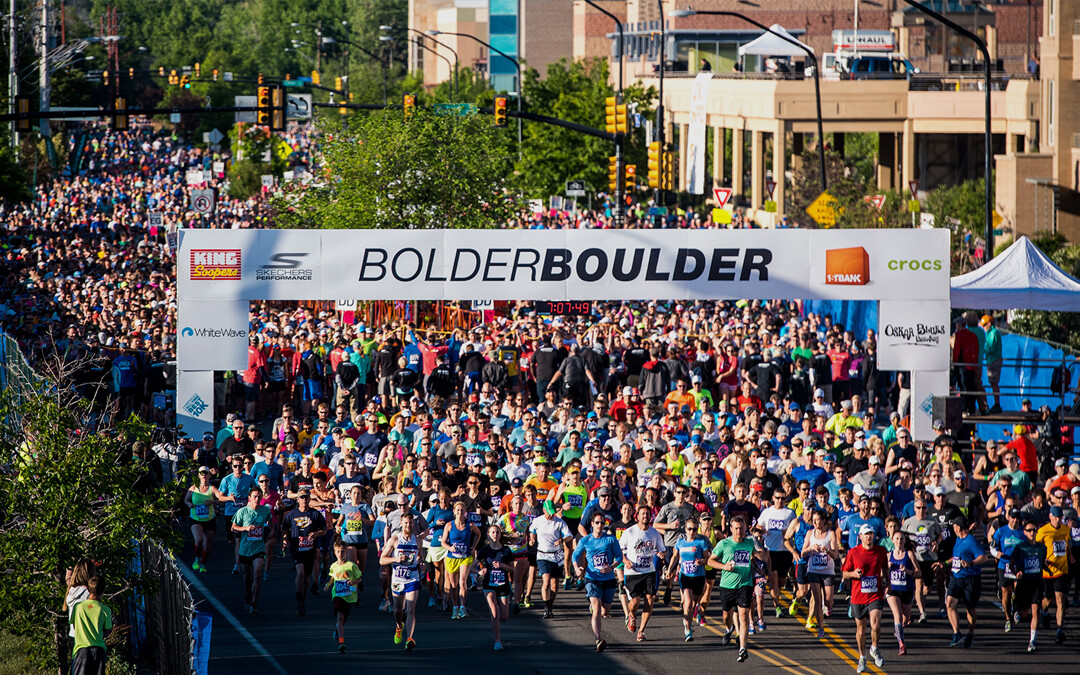
Only former member Scott Fauble has produced a top-10 finish in the men's race for NAZ Elite, taking sixth in 29:54 in 2016. This will be the eighth year that NAZ Elite has sent at least one athlete to the event since the team started racing in 2014.
The nature of the team-focused event typically leads to a loaded pack running up front, according to Rosario.
“When you have got three athletes from Kenya, three from Ethiopia, three from the U.S., et cetera, et cetera -- and they are all distance-running powerhouses -- it’s going to be hard to win the race because all these teams have somebody who could win.”
Rosario thinks that altitude also has something to do with how athletes perform at the race, which starts at 5,275 feet of elevation, peaks at 5,377 and ends at around 5,360 feet.
Fauble was born at altitude in Colorado, as was Tuliamuk, who is a Kenyan-born American. Both Kiptoo and Masai were born and raised in Kenya at an elevation higher than Flagstaff.
“It’s not a guarantee that they will run well, but I think they have a better chance to run well and race well at altitude than an athlete who was born and raised at sea level," Rosario said.
And both Kiptoo and Masai are in shape and coming off good performances.
Kiptoo won his last time out, repeating as the champion at the Pittsburgh Half Marathon on May 7. Meanwhile, Masai placed second in a 10,000-meter track event earlier this month and was fourth at the BAA 5K road race in mid-April with a time of 13:27.
“He’s look quite good in training over the last month," Rosario said of Masai, "and I would just say that he’s ready to go.”
Kiptoo normally draws energy from races that feature such strong talent up front, as the second-year pro likes competing with athletes who can produce the sort of times and results he hopes as his career unfolds.
“He’s certainly excited about the race. He’s shown so far in his young career that he enjoys these big road races, and when he is fresh and ready to go, he runs very, very well," Rosario said.
Before Monday's BOLDERBoulder, NAZ Elite will have two athletes in Krissy Gear and Katie Wasserman at Friday's USATF Distance Classic 1500m on the UCLA campus.
Rosario said there will be 17 athletes packed on the track for the "regular-season" race that will provided a chance for Wasserman to get some racing rust off her legs after a pause in racing due to illness and Gear to keep the momentum going and experience building.
Wasserman has not raced since mid-February at the USATF Indoor Championships, where she produced a 12th-place result in the 3000m.
by Mike Hartman
Login to leave a comment
BOLDER BOULDER
In 1979 we dreamt of attracting a few hundred of our friends to race though the streets of Boulder, Colorado to celebrate Memorial Day with our families. Fast forward almost 40 years and the Bolder BOULDER has grown to become one of the largest and most highly acclaimed 10K’s in the world. Almost 1.2 million runners, joggers, walkers and spectators...
more...This Elite Marathoner Plans on Running in Olympics After Pregnancy
Jess Stenson—an Australian Olympian and 2022 Commonwealth Games marathon champion—is due in September. Reigning Commonwealth Games marathon champion Jess Stenson has her sights set on competing at the 2024 Paris Olympics. If all goes according to plan, that would put her just under a year after her September 2023 due date. Yep, the Australian runner is pregnant with her second child, and told Courier Mail, “I am open to it all,” about competing in Paris.
Stenson is part of a league of other professional runners who are new moms and running fast, like Aliphine Tuliamuk and Molly Huddle. In fact, she’s already proven that pregnancy and motherhood doesn’t necessarily slow you down—she had the best year of her professional running career in 2022, after giving birth to her first child in late 2019. Stenson and her husband decided to start having children in 2018, despite the upcoming Tokyo Olympics. As is the case for many female athletes who want to get pregnant, it was a challenge to plan around her racing and training schedule.
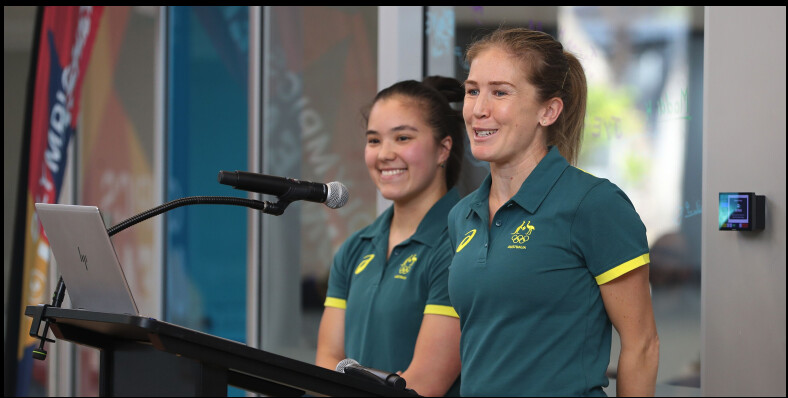
“I knew that starting that process and potentially becoming a mum, I might not get back to my best,” Stenson told Courier Mail. “I just had to be comfortable with that and know that I would try.”
Try she did, and she was back to jogging just six weeks after having her first child. The now 35-year-old ended up having to scrap her plans for Tokyo in 2021 due to a bone stress injury, but in 2022, she went on to win the Commonwealth Games marathon in Birmingham, England, and then finished ninth at the New York City Marathon in 2:27:27.
Stenson also believes her postpartum mental game is stronger than ever, and she approaches her training a bit differently than before, finding it to be more of a privilege than a task.
“I guess I saw training as just part of my job beforehand,” she said to Courier Mail. “But its importance in my life is even greater now as a mum because you do crave that time to yourself and the opportunity to just get out and free your mind.”
by Runner’s World
Login to leave a comment
Who Will Run the World Championships Marathon for the U.S. This Summer?
The three men and three women are selected by a descending order time list. But not everyone accepts their spot. Over 9 days in August, the World Athletics Championships will take place in Budapest, Hungary. The women’s marathon is scheduled for August 26, and the men’s is August 27, the last day of competition.
USA Track and Field (USATF) uses different selection procedures for this event than it does for the Olympic Games. Instead of using a Trials race, as it does for the Olympics, USATF offers spots to athletes using a descending order time list for certain marathons run between December 1, 2021, and May 30, 2023, as long as those athletes have met the qualifying criteria set by World Athletics. (The rules are complicated. For instance, the Boston Marathon is not on the list of “World Athletics approved” courses, but USATF is allowing times run at Boston in 2022 and 2023 for the descending order list.)
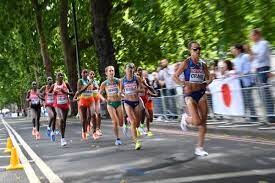
Not every American athlete will accept a spot, if offered. Some instead will choose to focus on a fall marathon, where they can earn substantial appearance fees and prize money that aren’t offered at worlds. Others won’t race at all this summer or fall, and instead they’ll train for the Olympic Marathon Trials in February 2024. How is it likely to shake out? Runner’s World reached out to the top seven men and women currently on the list or their coaches or agents to inquire about their plans. The window to run a qualifying time, however, remains open until the end of May. So a top performance in the next month could shake up the list.
Here’s what they said:
Women
Emily Sisson, 2:18:29, 2022 Chicago Marathon: Not likely, per her agent, Ray Flynn
Keira D’Amato, 2:19:12, 2022 Houston Marathon: Yes, if offered a spot
Betsy Saina, 2:21:40, 2023 Tokyo Marathon: No, she is focusing on a fall marathon
Sara Hall, 2:22:10, 2022 World Championships marathon: Has not yet decided
Emma Bates, 2:22:10, 2023 Boston Marathon: Not likely, per her agent, Ray Flynn
Susanna Sullivan, 2:24:27, 2023 London Marathon: Yes, if offered a spot
Aliphine Tuliamuk, 2:24:37, 2023 Boston Marathon: Will consider if offered a spot, per her agent, Hawi Keflezighi
Wild card: Will Molly Seidel run a May marathon?
Men
Conner Mantz, 2:08:16, 2022 Chicago Marathon: Not likely, per his agent, Ray Flynn
Scott Fauble, 2:08:52, 2022 Boston Marathon: No Elkanah Kibet, 2:09:07, 2022 Boston Marathon: Yes, currently deployed with the U.S. Army in Poland but will accept a spot if offered
Zachery Panning, 2:09:28, 2022 Chicago Marathon: Yes, per coach Kevin Hanson
Leonard Korir, 2:09:31, 2023 Paris Marathon: Did not immediately respond to a message from Runner’s World
Galen Rupp, 2:09:36, 2022 World Championships marathon: No, will run a fall marathon, per his agent, Ricky Simms
Futsum Zeinasellassie, 2:09:40, 2023 Rotterdam Marathon: Will consider if offered a spot, per his agent, Hawi Keflezighi
Wild card: Biya Simbassa runs the Prague Marathon, his debut, on May 7.
by Runner’s World
Login to leave a comment
3-time champion Molly Huddle is ready for 2023 NYC Half
The United Airlines NYC Half came into Molly Huddle‘s life in 2014 and it was one of the key turning points in the now 38 year-old’s storied career. Never a fan of cross country or indoor track, the 28-time national champion liked to de-camp from her Providence, R.I., home in the winter to put in her pre-season base miles in the warmth of Arizona. The NYC Half, with its mid-March date, was the perfect race to close-out her winter training block. Her long-time coach Ray Treacy, whom Huddle affectionately calls “The Guru,” gave his blessing and she signed-up for the 2014 race. It would be her first-ever half-marathon.
With the temperature right at the freezing mark, Huddle ran the entire race with the leaders. She went through the first 10-K in 33:01, and the second in a much faster 32:21 as the pace heated up. Although too far behind eventual winner Sally Kipyego (1:08:31), she finished a close third to eventual 2014 Boston Marathon champion Buzunesh Deba, 1:08:59 to 1:09:04.
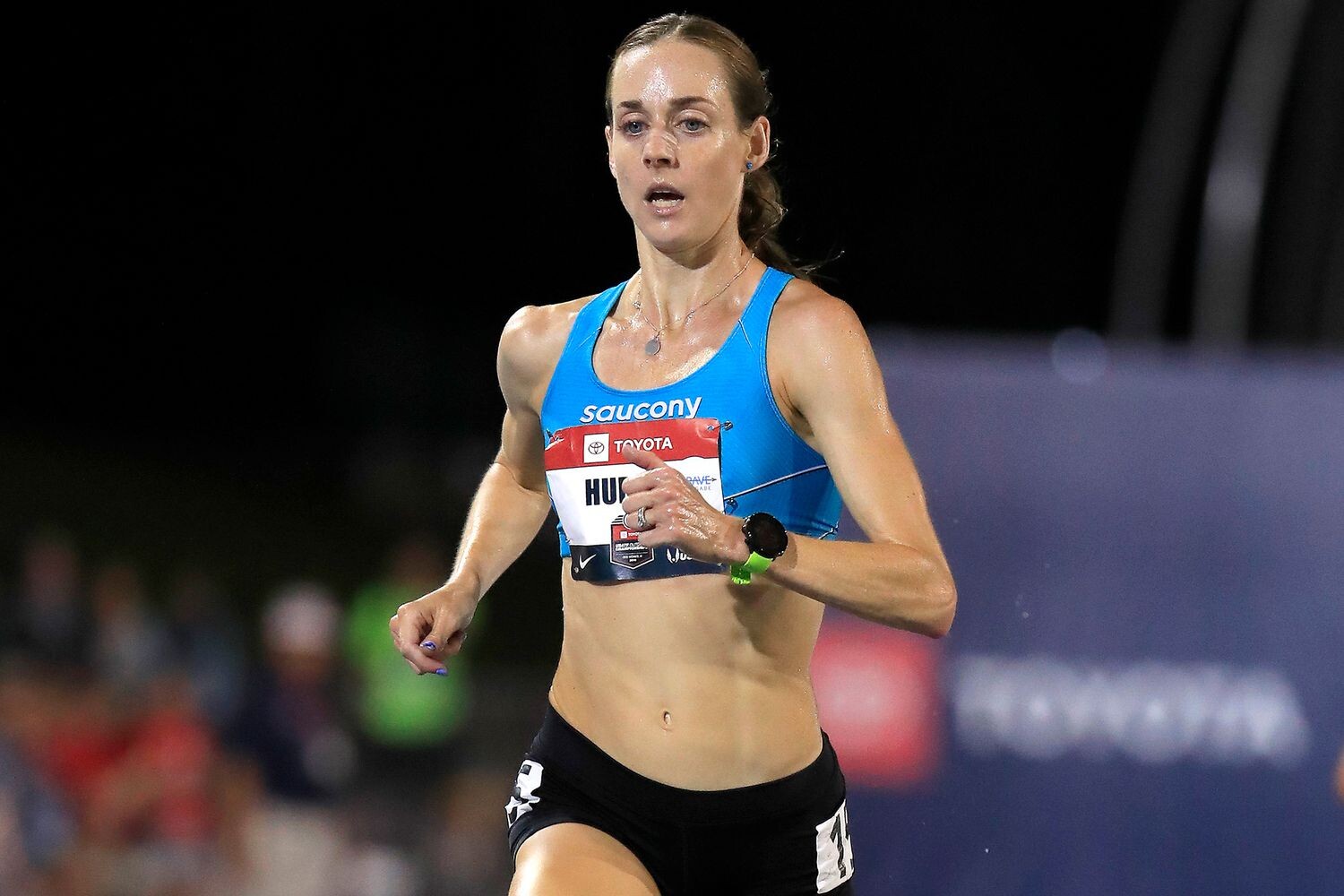
“It was good,” a shivering Huddle told Race Results Weekly’s Chris Lotsbom that day. “I think I stuck my nose in it in the beginning and the distance got to me a little in the end, but it was definitely a fun experience. I definitely want to do another one.”
The rest, shall we say, is history.
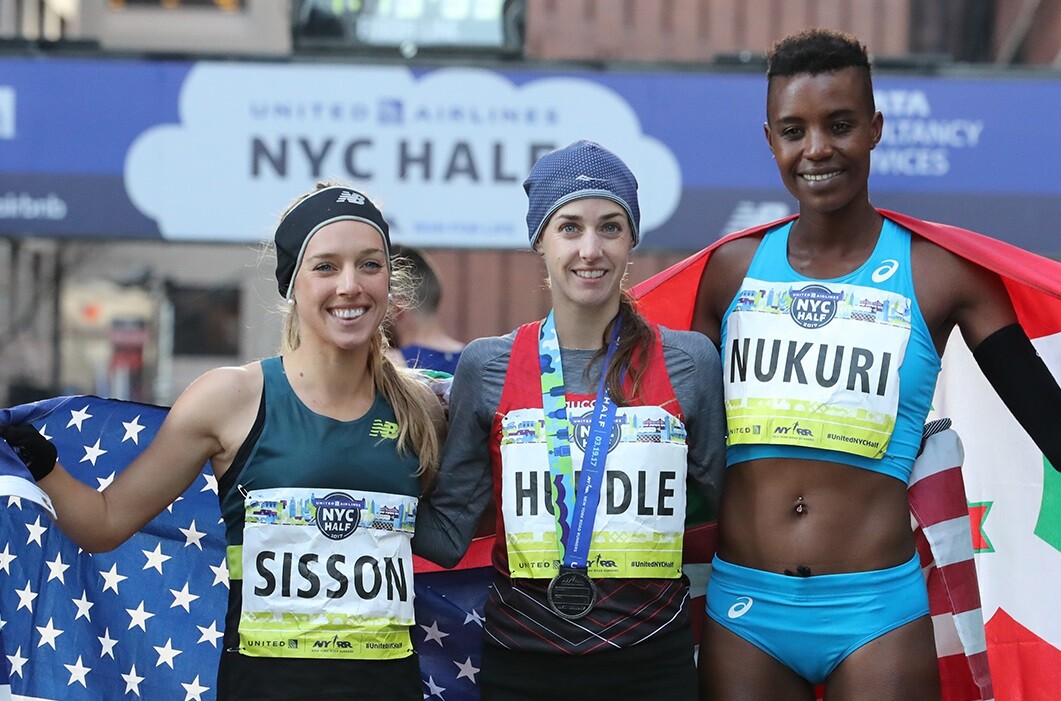
For the next three years Huddle would repeat the same winter program, training in Arizona then coming to New York for the NYC Half before starting her track season*. She won in 2015, 2016 and 2017, and in the 2016 race she set the still-standing USATF record for an all-women’s race: 1:07:41. During her reign at the top, she beat top athletes like Sally Kipyego, Caroline Rotich, Des Linden, Aliphine Tuliamuk, Buzunesh Deba, Emily Sisson, Edna Kiplagat, Diane Nukuri, and Amy Cragg. She also lowered her 10,000m personal best from 31:28.66 to an American record 30:13.17, a mark which would stand for more than six years until Alicia Monson broke it just 11 days ago at The Ten in San Juan Capistrano, Calif. She also collected $65,500 in prize money from the event which is organized by New York Road Runners.
Huddle returns to the NYC Half for the first time in six years on Sunday, but she’s no longer focused on winning. The race comes about 11 months after she, and husband Kurt Benninger, had their first child, daughter Josephine Valerie Benninger, whom Huddle calls “JoJo.” Speaking to Race Results Weekly at a press event yesterday in Times Square, she reflected on her history with the race.
“The last time I did the Half was 2017, I think, so a long time,” said Huddle, wearing a warm hat and jacket on a cold, late-winter day. “Great to be back. Great to be running again seriously after having the baby in April. So, this will be a good test.”
Huddle has been slowly building her fitness since giving birth to Josephine. She first returned to racing last August at the low-key Bobby Doyle Summer Classic 5 Mile in Narragansett, R.I., –very close to her home– clocking 29:17. Since then she has run in a series of local races in New England –a pair of 10-K’s, a 5-K cross country, and a half-marathon– to regain her racing chops.
Then, in January of this year, she ran the super-competitive Aramco Houston Half-Marathon and clocked a very good 1:10:01, a mark which qualified her for the 2024 USA Olympic Team Trials Marathon. She went back to training, and the NYC Half should give her a good reading on her progress.
“I’m really happy to fit it back in the schedule,” said Huddle, who is still breastfeeding and will be pumping while she is in New York (Kurt is with Josephine at home in Providence). “I feel like I’m having more baseline workouts now, less of a building phase and more back to normal. I’ve had a few little injury problems last month, but I’m coming around.”
A well-traveled athlete, Huddle is sticking close to home for her races now. New York is a three and one-half hour drive (or train ride) from Providence.
“I love racing within a drive distance of home now because of the baby, and this is an easier race for me to get to,” Huddle said. “So that’s good.”
Sunday’s race has yet another purpose for Huddle. It will kick-off her training for her next marathon, a distance that she hasn’t taken on since the 2020 Olympic Trials in Atlanta when she was forced to drop out with an injury. Although she wasn’t at liberty to reveal which race it will be, she said that the timing of the NYC Half was perfect, just like it always was.
“So, I’m really focusing more on the roads now; it fits in really well with that plan now,” Huddle said. She continued: “This is going to kick off a marathon build-up for me, so this will be a really good race to fit into my marathon block as we go forward the next two months.”
by David Monti
Login to leave a comment
United Airlines NYC Half-Marathon
The United Airlines NYC Half takes runners from around the city and the globe on a 13.1-mile tour of NYC. Led by a talent-packed roster of American and international elites, runners will stop traffic in the Big Apple this March! Runners will begin their journey on Prospect Park’s Center Drive before taking the race onto Brooklyn’s streets. For the third...
more...New Mom and Elite Runner Molly Huddle is Ready to Take on the NYC Half
Molly Huddle admits making time for running is considerably more challenging since giving birth to a baby girl last April, but she’s excited to be back racing at a high level as a healthy and fit mother.
The 38-year-old two-time U.S. Olympian ran so well at the Houston Half Marathon on January 15, she’s optimistic about racing a late spring marathon. Next up, Huddle will be racing in the deep women’s elite field at the United Airlines NYC Half on March 19 for the first time since taking her third consecutive victory in the event in 2017.
Huddle began to gradually increase her training late last summer under the guidance of longtime coach Ray Treacy and ran a couple of moderately fast 10Ks and a half marathon last fall. But then she had a big breakthrough when she ran 1:10:01 in Houston. Even though that was well off the 1:07:25 PR she recorded while setting an American record in 2018, it was still an impressive effort.
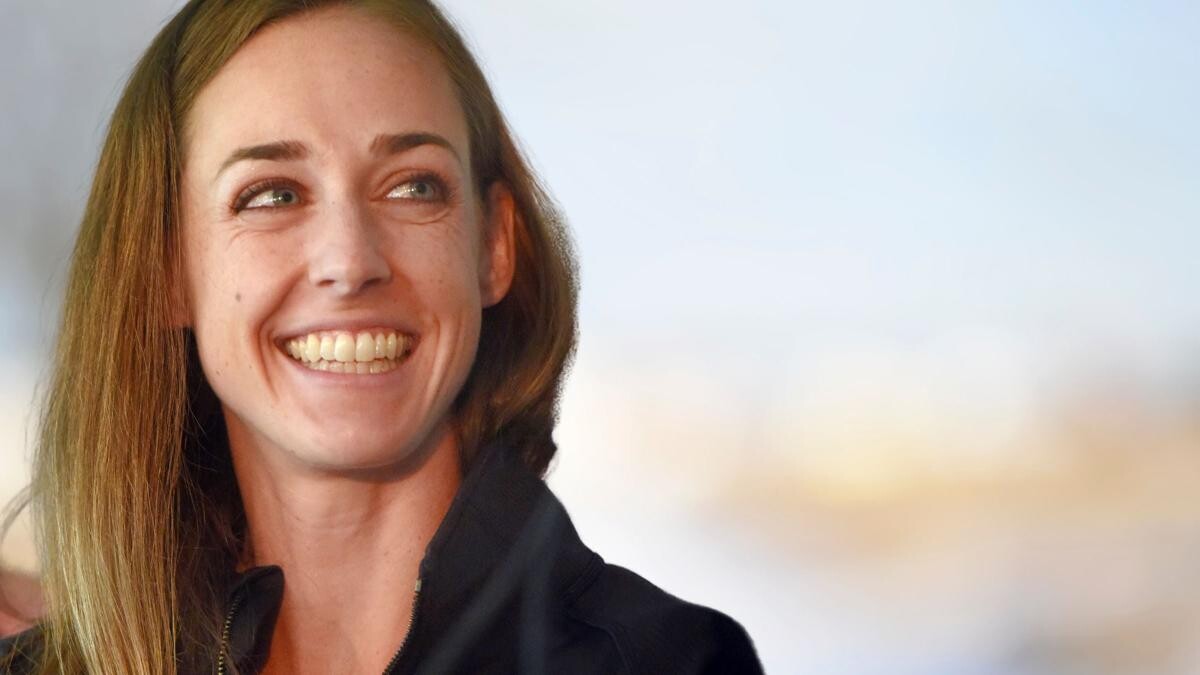
“I wasn’t sure if I’d get back to even doing that, so that was good,” Huddle said. “Sometimes it’s good to just start 100 percent over and slowly build back. I think that was the only way I was gonna do it. I haven’t really been tested at a level that would be like trying to PR or qualify for a U.S. team, so we’ll see how it goes. But I think there’s a lot out there. I mean, just because you’re not making the Olympic team, you can still do a lot in the sport.”
Huddle said she generally felt good while running about 40 miles a week through eight months of her pregnancy, but then backed off and did whatever she could manage in the final month before Josephine was born on April 26. After giving birth, Huddle took extra time to recover until she felt like she could run consistently, but she also consulted with a pelvic floor specialist to make sure she wouldn’t risk injury by incorporating too much training intensity too soon.
While she’s earnestly back to training at a high level, she admits she’s still managing the physical challenges of breastfeeding, as well as the new time constraints as she and her partner, Kurt Benninger, the head cross country coach and assistant track coach at Brown University, juggle their schedules to maintain their professional lives while prioritizing their efforts to care for their daughter.
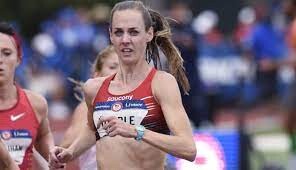
Huddle is grateful for the continued support from her longtime sponsor Saucony, as well as the increased honest public and social media conversations among women athletes becoming mothers. She says she’s taken cues, inspiration and advice from fellow elite-runner moms Aliphine Tuliamuk, Faith Kipygeon and Sara Vaughn, among others.
“It’s just a long timeline, but it’s been great to see other women do it,” Huddle says. “It takes some time and some, you know, intentional exercises and some pacing yourself, but then once you get the green light after, you know, a certain amount of months, I feel like you can do everything you were doing before.”
Huddle won the NYC Half in 2015, 2016, and 2017,with her winning time of 1:07:41 from 2016 setting an event record that stood until last year. She’ll line up against Ethiopia’s two-time Olympian Senbere Teferi, who last year broke Huddle’s event record while winning in 1:07:35. She is also a two-time world championships silver medalist and the 5K world-record holder (14:29) for a women-only race.
Other Notable Runners for the NYC Half
Two-time Olympic medalist and seven-time world championships medalist Hellen Obiri of Kenya, three-time Olympian and four-time European Championships medalist Eilish McColgan of Scotland, and two-time U.S. Olympian and 2018 Boston Marathon champion Des Linden will also toe the line in New York. Other top Americans include Dakotah Lindwurm, Erika Kemp, Maggie Montoya, Annie Frisbie and Jeralyn Poe.
Huddle hasn’t announced which marathon she’ll run in late April or early May. Her last effort at 26.2 miles was four years ago this spring, when, despite having had an off day in London, she finished 12th place in a new PR of 2:26:33. She was considered one of the favorites to finish in the top three at the 2020 U.S. Olympic Trials Marathon in Atlanta three years ago this week, but dropped out near mile 20, partially because she was still struggling with an Achilles injury.
by Brian Metzler, Melanie Mitchell
Login to leave a comment
United Airlines NYC Half-Marathon
The United Airlines NYC Half takes runners from around the city and the globe on a 13.1-mile tour of NYC. Led by a talent-packed roster of American and international elites, runners will stop traffic in the Big Apple this March! Runners will begin their journey on Prospect Park’s Center Drive before taking the race onto Brooklyn’s streets. For the third...
more...Thomson and Tuliamuk came out on top at USATF Half marathon championships
FORT WORTH, TX — The racing strategies were different, but the end result was the same for Jacob Thomson and Aliphine Tuliamuk Sunday morning in Fort Worth, Texas, as both runners claimed victory at the USATF Half Marathon Championships.
On-demand race videos and coverage of the USATF Half Marathon Championships hosted by the Cowtown Marathon, the second stop on the 2023 USATF Running Circuit.
A conservative early pace in the men’s race kept together the entire starting field, as Olympian Jared Ward jumping to the lead and taking on the pacing duties. He was joined up front by fellow Saucony pro Brian Shrader, as the 18-man lead pack passed through 5 km in 15:23. Just past the 5 km split, Thomson decided to push the pace, jumping to the lead and opening up a nearly five second gap. Thomson would continue to string the field out, running 30 seconds faster for the next 5 km split, as the Under Armour pro came through 10 km in 30:16.
As Thomson came through 10 km, defending champion Leonard Korir, 2022 runner-up Futsum Zienasellassie, Shrader, and Abbabiya Simbassa led the pack, bridging the divide and catching up to Thomson. The quickening of pace diminished the lead group, leaving a pack of 10 with half the race to go.
As mile 10 came about, Shrader jumped to the lead and started to push the pace. The pack of 10 strung out again, with only Thomson, Korir, Zienasellassie, and Simbassa able to maintain contact. For the next three miles, the five-man pack ran stride for stride, each feeling out when the right time to make a push to the finish would be. With one final turn before the finish, Thomson made the decisive move, surging ahead, using the momentum from the final turn to propel himself into the lead.
Thomson locked his eyes on the finish, pumping his arms wildly, and in the end was able to fend off the field to claim his first USATF title in 1:02:38. A stride behind Thomson, Korir and Zienasellassie battled to the finish for the second year in a row, with Korir able to withstand the kick of Zienasellassie, placing second in 1:02:39.
Zienasellassie carried his momentum from his USATF Marathon Championships victory in December to earn another top three USATF Running Circuit finish, finishing with the same time of Korir in 1:02:39. Simbassa came home fourth overall in 1:02:41, placing just ahead of Shrader, who hung on to take fifth in 1:02:43. Of note, Thomson, Korir, and Shrader will meet again next Saturday on the streets of Jacksonville, Florida, as all three are entered in the USATF 15 km Championships. Scott Fauble finished sixth in 1:02:49, while Tyler McCandless also broke the 63-minute barrier with his seventh-place finish of 1:02:52. Colin Bennie finished eighth in 1:03:08, Colin Mickow took home ninth place in 1:03:22, and Matt McDonald claimed tenth in 1:03:43, all earning points towards the USATF Running Circuit overall standings.
Unlike the conservative pace of the men’s early miles, the women’s field got off the start line and immediately hit an honest pace. HOKA Northern Arizona elite teammates Lauren Paquette and Tuliamuk jumped to the front, with Paquette in particular pushing the pace.
As Paquette led the way through the first 5 km, passing through the split in 16:31, she and Tuliamuk built an early ten second lead over the rest of the field. That lead would grow to 50 seconds over the next 5 km, as the duo came through 10 km in 32:45. Paquette did much of the pace setting over the next 5 km, with Tuliamuk just off her shoulder, both coming through 15 km in 49:16, now over a minute and a half clear of the chase pack.
At this point in the race, Tuliamuk took over the lead, and while for a moment it looked as if the two would continue to run stride for stride, Tuliamuk’s move to the front pushed the pace just enough to where Paquette started to fall off the pace and Tuliamuk built a few second lead over her teammate over the next mile.
Tuliamuk continued to push, building her lead to 12 seconds with one mile to go. As Tuliamuk came down the final straightaway, she glanced over her shoulder, then charged ahead to cross the finish line with a smile on her face, claiming her seventh USATF title in 1:09:36. Behind Tuliamuk, Paquette held on and finished a fantastic race in second place in 1:09:51.
The two teammates embraced at the finish line and then watched the rest of the top women race to the finish. Veteran Nell Rojas pulled away from the chase pack of four women over the final two miles of the race, separating herself to easily cross the finish in third place, clocking 1:11:08. Molly Grabill earned a fourth-place finish in 1:11:16, while Jessa Hanson took fifth in 1:11:26. Tuliamuk’s and Paquette’s other teammate in the race, Paige Wood, finished sixth overall in 1:11:32. Rounding out the top ten finishers, Katja Goldring scored a seventh-place finish in 1:12:36. Olympian Molly Seidel finished eighth in 1:13:07, while Bridget Belyeu and Lindsey Bradley finished ninth and tenth in 1:15:05 and 1:15:12.
The USATF Running Circuit resumes next Saturday, March 4, as the USATF 15 km Championships take place in Jacksonville, Florida, with the Gate River Run hosting the third stop on the circuit
Login to leave a comment
Here's Why It Feels Like Every Elite Runner Is Changing Sponsors Right Now
Tim Tollefson celebrated the new year shoveling a lot of snow, dreaming about a summer of possibility, and changing his shoes.
After six years with Hoka, Tollefson, 37, the well-known elite American ultrarunner from Mammoth Lakes, California, signed a new multi-year sponsorship deal with Craft. It might seem like a curious move this time of the year, but, in reality, most athlete sponsorship contracts in running are one-year partnerships that end on December 31. That typically gives brands the upper hand in these situations because they can have an easy out whenever an athlete doesn't have a great year of results, or they no longer fit with their marketing goals. It always comes down to the money, though sometimes it's in the athlete's best interests to start fresh, to leverage their recent results and social media platform to find a better deal with a brand that better fits their racing goals.
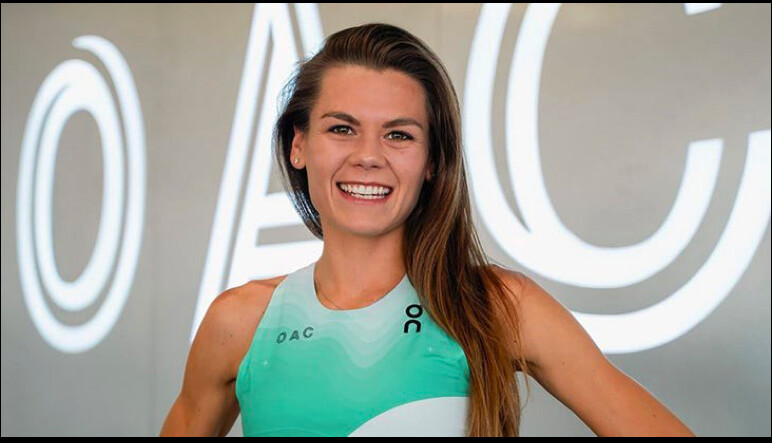

Because there are more brands partnering runners than ever before, and presumably more sponsorship money available, top-tier distance runners who are still at the top of their game-like Tim Tollefson, Allie McLaughlin, Josette Norris, Paige Stoner, David Ribich, Dani Moreno, Erin Clark, Natosha Rogers, Colin Bennie, Dillon Maggard, Camille Herron, and others-have been able to seek out new opportunities to continue their careers with the necessary support.
The terms of the newly signed deals haven't been disclosed, but there is a huge range in pay for professional distance runners-roughly $15,000 on the low end for a partially sponsored trail runner without significant international results, to $300,000 at the high end for a top-tier marathoner with Marathon Majors podium results. Certainly that means some live a life of luxury, while others are forced to work part-time jobs and pinch pennies to get by.
But there are also often signing bonuses, as well as premiums paid for earning appearance fees, major victories, global medals, podium finishes, breaking records, and other incentives, so running faster can be a fast track to a boost in income. However, most athletes are considered independent contractors, and many have to pay for their own healthcare, body work, and travel, depending on the details of their brand partnership.
"You start getting an idea of who's going to be available, for one reason or other, in the last few months of the year, and that's when brands and athletes start talking," said Mike McManus, Hoka's global sports marketing director. "As an athlete, you're as valuable as whatever money anyone wants to give you, but it's a process and all about negotiating. Sometimes you can match the money being offered; sometimes it just doesn't make sense for the partnership."
What Tollefson liked about Craft was similar to what he liked about Hoka six years ago-an upstart brand ready to make an impact in trail racing, its new line of trail shoes, and the trail community overall. Craft sees Tollefson as a runner with name recognition and several significant race wins in the past three years, not to mention a leader in the sport who started the Mammoth Trail Fest last year.
"This [new partnership with Craft] has reignited my deep passion for the sport and has reminded me of the things I want to accomplish," he said. "It's almost like a start-up situation led by passionate people who are excited to make an impact and want to support the people who are along for the journey. Curiosity drives me and I like a challenge. I know I am going to have some lifetime achievements ahead."
More Big Moves in Trail and Ultra
After an extraordinary year of racing on the trails, Allie McLaughlin changed from On to Hoka as her primary sponsor. The charismatic 32-year-old from Colorado Springs won the daunting Mount Marathon race in Alaska, placed among the top five in several Golden Trail Series races, and won both gold and bronze medals in the inaugural World Mountain and Trail Running World Championships in Thailand. She'll be representing the U.S. in this year's World Championships in Austria, in June, while also returning to the OCC 54K race, as part of the Ultra-Trail du Mont-Blanc (UTMB) festival in Chamonix, in August.
"It was really interesting to see how much trail means to them [Hoka], not only with their sponsorship of UTMB, but in general how they're helping push the sport forward," said McLaughlin, who had been with On since 2021. "There are a lot of reasons I like what Hoka is doing, but ultimately, the emphasis they're putting on the team and their athletes is really exciting."
Other trail and ultrarunners who have switched brands include Erin Clark, who finished 7th at last year's CCC, who left Hoka to sign with Nike, even though her partner, Adam Peterman, the 2022 Western States 100 champion and ultrarunning world champion, re-signed with Hoka.
Spanish trail runner Sara Alonso has changed from Salomon to ASICS, while Craft also signed Arlen Glick, a prolific 100-mile specialist from Ohio, and Mimmi Kotka, a Swedish runner with numerous podium finishes in Europe, to its team. Meanwhile, previously unsponsored American trail runners Tabor Hemming (Salomon) and Dan Curts (Brooks) are among those who have signed new deals.
Meanwhile, Dani Moreno, a world-class mountain runner from Mammoth Lakes, California, and Camille Herron, a record-setting ultrarunner from Warr Acres, Oklahoma, are both also leaving Hoka for yet-to-be-announced brands that offered better deals.
Bigger Transitions for Road and Track Runners
For track athletes and marathon runners, a change of shoe brands is often a more involved change, mostly because it often means changing training groups and coaches, too.
For example, Josette Norris, the fifth-place finisher in the 1,500m at the 2022 World Athletics Indoor Championships, not only switched from Reebok to On, but she left Reebok's Virginia-based Boston Track Club, and coach Chris Fox, and moved west to Boulder, Colorado, to join the On Athletics Club under Dathan Ritzenhein.
Similarly, David Ribich, one of the best American mile runners on the track last year, switched from the Seattle-based Brooks Beasts track club to the Nike-backed Union Athletics Club under Pete Julian.
Colin Bennie, the top American finisher in the Boston Marathon in 2021-previously with Reebok but unsponsored last year-signed with the Brooks Beasts but will be training on his own in San Francisco. Dillon Maggard, who was second at the U.S. cross country championships and ninth in 3,000m at the indoor world championships in 2022, is returning to Seattle to train with the Brooks Beasts, after being unsponsored last year. Natosha Rogers, who was a finalist in the 10,000m at last summer's World Athletics Championships in Eugene, Oregon, has changed from Brooks to Puma, but will continue to train on her own in Colorado. Middle-distance runner Cruz Culpepper, after short stints at the University of Washington and the University of Mississippi, gave up his remaining college eligibility to sign with Hoka and its NAZ Elite (NAZ) team.
Last summer, Paige Stoner left the Virginia-based Reebok group and Fox, her longtime coach, to train in Flagstaff, Arizona, partially because she didn't have other marathoners to train with on a regular basis in Charlottesville. She increased her volume last fall training with Sarah Pagano and Emily Durgin and won the U.S. championship at the California International Marathon in December with a course record of 2:26:02, her debut at the distance.
In January, Stoner parlayed that into a new deal with Hoka, as she also joined the Flagstaff-based Northern Arizona Elite and will be training with a group of strong marathoners-including Aliphine Tuliamuk, Alice Wright, Kellyn Taylor, and the recently unretired Stephanie Bruce-under the guidance of coaches Alan Culpepper, Ben Rosario, and Jenna Wreiden.
"I was especially drawn to NAZ because they have proven to be a powerhouse in the marathon, which will likely be my primary focus in the years to come," Stoner said. "I believe the team has all of the tools it takes to compete at the highest level in the sport, and I am eager to begin this new chapter."
Learning the Ropes
For track and road running, the path to success for elite-level, post-collegiate athletes typically includes earning a sponsorship right after the track season in June and joining a sponsored training group and coach. From there, it's all about improving times and placing high in U.S. championship races, with hopes of becoming fast enough to earn a spot in elite track meets in Europe or one of the World Marathon Majors.
But most road and track runners have agents to help smooth out those transitions, whereas most trail runners do not. Plus, trail running is considerably more unstructured, with a greater range of race distances and a lot more unknown variables. That means the challenge of figuring out what opportunities exist on the trails-what races to run, how to train on trails, what gear is needed, how to race considerably longer distances, and how to attract sponsors-often requires them to learn on the fly.
Those are all reasons professional trail runner Andy Wacker recently formed The Trail Team, a non-profit organization that will help guide young runners along the path becoming successful, potentially sponsored trail runners, while also playing a role in boosting the level of competitive trail running in the U.S.
The Trail Team put out a call for candidates to become one of six inaugural team members in 2023. Once selected this spring, those athletes will go through a training camp, receive a stipend, get continued mentorship from Wacker, McLaughlin, Adam Peterman, and Grayson Murphy, and prepare for a variety of U.S. races.
"I've reached out to a lot of young athletes and the main thing I found is they need a mentor," said Wacker, a Salomon-sponsored athlete. "They don't necessarily need a coach-a lot of them have a college coach that they might continue working with-but they need someone who is going to help them with all of their questions and translate everything to trail running.
"It's still really hard to be an individually sponsored athlete, and I think it's hard for a young athlete to get recognition and build their brand, so we're hoping to help with that," he added. "There are more participants and more excitement than ever in trail running, but there are also growing pains. So there are a lot of ways we think we can help so they don't have to figure it out on their own."
Like Wacker, Tollefson is one of those athletes who did have to figure it out on his own. He was a good runner in high school and college, but he never qualified for the state meet and never earned All-American honors. But, with a relentless work ethic, he's become one of the most successful American trail runners of the past decade, having placed second at the CCC 100K in Chamonix, in 2015, and twice placed third in the Ultra-Trail du Mont-Blanc 171K in 2016 and 2017.
Although his personal race plans aren't finalized yet, those deals are allowing him to step away from his career as a physical therapist and become fully immersed in running for the first time in his career.
"All of us athletes are multidimensional; we're more than just a pretty face rocking a bib," Tollefson said. "Everyone has a unique story. I think there are more brands interested in telling those stories, and Craft is definitely one of them. Some people have written me off, but I'm confident my best races are ahead of me. Craft believes in me, and I feel like I need that belief to get the best out of myself."
by Trail Runner Magazine
Login to leave a comment
B.A.A. announces women’s elite field for 127th Boston Marathon
The Boston Athletics Association (B.A.A.) has revealed the women’s elite field for the 127th Boston Marathon on Monday, April 17. The field features 16 women who have run under 2:21, including the 2022 world marathon champion Gotytom Gebreslase and two-time Boston champion Edna Kiplagat.
Three other notable athletes who are making their Boston debuts are 2022 world championship bronze medallist Lonah Salpeter of Israel, 2022 NYC Marathon champion Sharon Lokedi, and 2022 Valencia Marathon champion (and third fastest woman of all-time 2:14:58) Amane Beriso of Ethiopia.
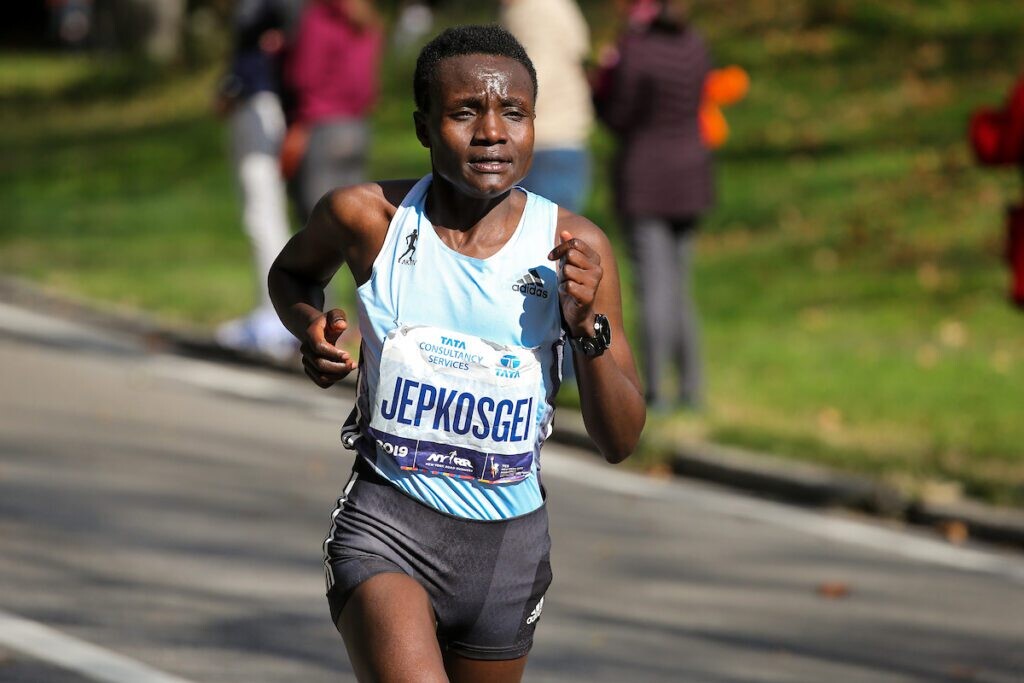
“I am very excited to run the B.A.A. Boston Marathon this year,” said Salpeter in a press release. “It has always been my dream to run on this course and to experience the incredible atmosphere.” Salpeter is coming off a second-place finish at the New York City Marathon in November and a bronze medal in the 10,000m at the European Championships in August.
Last year’s second and third-place finishers in Boston, Ababel Yeshaneh of Ethiopia and Mary Ngugi of Kenya, both return with hopes of claiming the top spot on the podium. Yeshaneh came within four seconds of victory, while Ngugi placed second and third in Boston in back-to-back years.
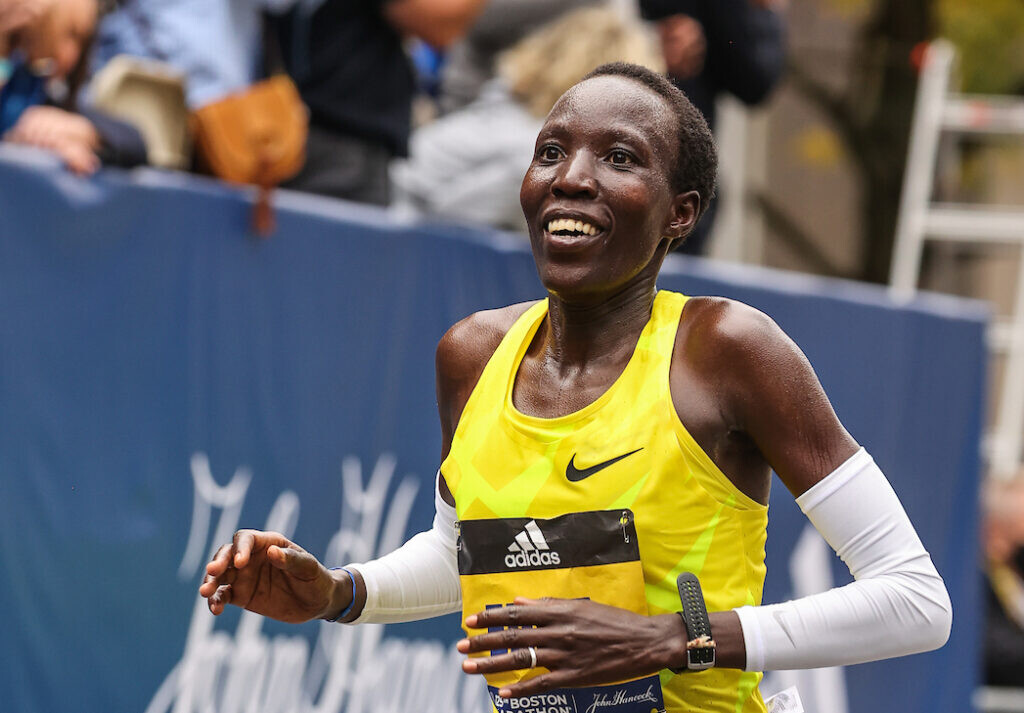
Also back is Joyciline Jepkosgei of Kenya, a past winner of the New York City and London Marathons. Jepkosgei fell shy of her expectations in her 2022 debut, with a seventh-place finish. She will look to better her time of 2:24:43 in 2023.
Among the American contingent are Sara Hall, Aliphine Tuliamuk, Emma Bates, Nell Rojas and 2018 champion Des Linden. Rojas has finished as the top American at Boston two years in a row (fifth in 2021 and 10th, 2:25:57 in April 2022), while Hall and Bates were fifth and seventh in the marathon at the 2022 World Athletics Championships in Eugene, Ore.
Canada will be well represented in Boston with three athletes on the elite list. Liza Howard, the top Canadian at the 2022 Chicago Marathon, will lead the way with the top qualifying mark of 2:35:29. Howard is an up-and-coming marathoner out of Toronto, who had a breakthrough 2022 with a 19th-place finish in Chicago and a 12th-place result at the Canadian 10K Championships in Ottawa last May.
Other Canadians on the elite list are 2004 1,500m Olympian and masters athlete Carmen Hussar, who has returned to racing recently, coming off a Boxing Day 10 Miler win in Hamilton, Ont., and Julie Lajeunesse of Montreal, with a personal best of 2:44:49 from the 2022 Chicago Marathon.
by Marley Dickinson
Login to leave a comment
Boston Marathon
Among the nation’s oldest athletic clubs, the B.A.A. was established in 1887, and, in 1896, more than half of the U.S. Olympic Team at the first modern games was composed of B.A.A. club members. The Olympic Games provided the inspiration for the first Boston Marathon, which culminated the B.A.A. Games on April 19, 1897. John J. McDermott emerged from a...
more...Who Wore Which Shoes at the New York City Marathon?
The running shoe hype train was high in New York City with a few fast yet-to-be-released shoes in the men’s and women’s elite fields.
For a few miles early in the New York City Marathon, Desi Linden surged into the lead of the women’s elite field. The two-time Olympian and 2018 Boston Marathon champion didn’t think she’d run away and win the race that way, but she was just trying to keep the pace honest.
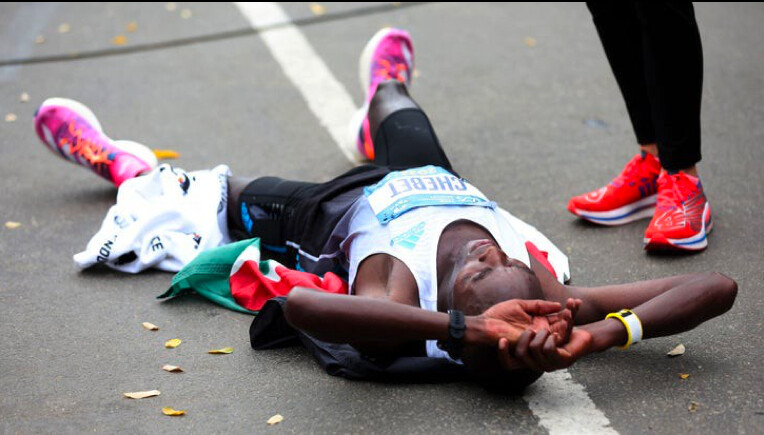
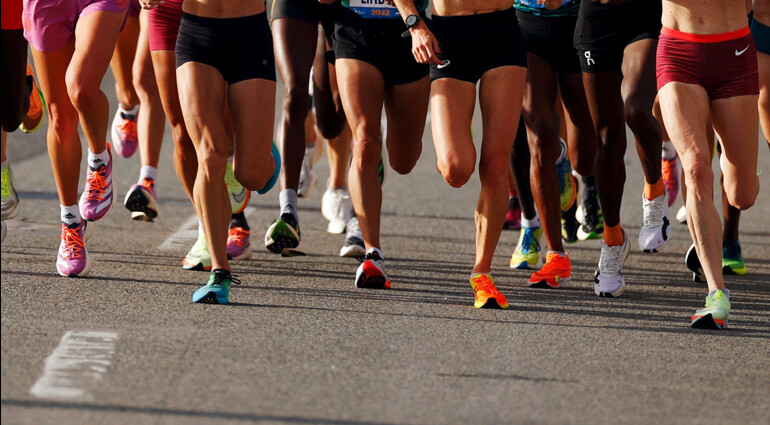
However, hiding in plain sight on her feet as she was off the front of the pack was a yet-to-be-released pair of orange, white and black Brooks prototype racing shoes. A day later, no one is willing to give up any details of the shoe, except that, like all of the other top-tier racing shoes in both the men’s and women’s elite fields, it features a carbon plate embedded in a hyper-responsive foam midsole. And although it’s all in accordance with World Athletics regulations, it won’t be released in Spring 2024 … so we’ll all have to wait a bit to see what that shoe is all about.
Linden’s shoes weren’t the only speedy outliers among the top 25 men’s and women’s finishers. While Nike, Adidas and ASICS shoes were the most prevalent brands among elite runners, there were several shoes that aren’t yet available to the public.
For example, the first runner to cross the finish line of this year’s New York City Marathon, women’s winner Sharon Lokedi, was wearing a pair of Under Armour Velociti Elite shoes. That’s notable for several reasons—because it was Lokedi’s first marathon, because the shoe won’t become available until early 2023 and because it’s the first podium finish at a major international marathon for a runner wearing Under Armour shoes.
There were also three pairs of yet-to-be-released Hoka Rocket X 2 shoes on the feet of three Hoka NAZ Elite runners — two of whom set new personal best times, Aliphine Tuliamuk (7th, 2:26:18) Matthew Baxter (12th, 2:17:15). Those fluorescent yellow shoes with orange, white and blue accents and blue laces were on the feet of Hoka pros at the Boston Marathon in April and Ironman World Championships in Hawaii in October, but they won’t be released to the public until late February or early March.
Meanwhile, the winner of the men’s race, Evans Chebet, was wearing a pair of Adidas Adizero Adios Pro 3, a shoe worn by four other runners in the top 25 of the men’s race and six among the women’s top 25, making it the second most prevalent model among the elites. Oddly, that was the same shoe worn by Brazil’s Daniel do Nascimento, who went out at record-setting sub-2:03 pace on his own, only to crumple to the ground at mile 21 after succumbing to fatigue and cramping.
The most common shoe among the top finishers was the Nike ZoomX Vaporfly Next% 2, which was on the feet of 11 of the 50 runners among the women’s and men’s top 25 finishers. There were eight runners wearing either the first or second version of the ASICS MetaSpeed Sky.
Six runners wore Nike Air Zoom Alphafly Flyknit shoes, three wore Nike Air Zoom Alphalfy NEXT% 2. There were two pairs of On Cloudboom Echo 3 in the field, including those worn by Hellen Obiri who finished sixth while running a 2:25:49 in her marathon debut, while three runners wore Puma Fast R Nitro Elite.
And what about actor Ashton Kutcher? He wore a pair of purple Nike Air Zoom Alphafly NEXT% Flyknit shoes and finished in a very respectable 3:54:01.
Matt James, the former lead of the Bachelor, finished in 3:46:45 with Shalane Flanagan as his guide wearing a pair of New Balance FuelCell Comp Trainer shoes. Flanagan wore Nike Air Zoom Alphafly Next% Flyknit shoes, as did Meghan Duggan, an Olympic gold medalist hockey player who ran a solid 3:52:03. Lauren Ridloff, actress from “The Walking Dead,” ran in a pair of Brooks Glycerin 20 and finished in 4:05:48, while Chelsea Clinton, daughter of Bill and Hillary Clinton finished in 4:20:34 wearing a pair of Brooks Ghost 14 and Tommy Rivers Puzey (aka “Tommy Rivs,” a former elite runner who survived a deadly bout of cancer in 2020, wore a pair of Craft CTM Ultra Carbon Race Rebel and finished in 6:13:54.
Here’s a rundown of what was on the feet of the top 25 women’s and men’s finishers in the Big Apple.
1. Sharon Lokedi (Kenya) 2:23:23 — Under Armour Velociti Elite
2. Lonah Salpeter (Israel) 2:23:30 — Nike ZoomX Vaporfly Next% 2
3. Gotytom Gebreslase (Ethiopia) 2:23:39 – Nike ZoomX Vaporfly Next% 2
4. Edna Kiplagat (Kenya) 2:24:16 — Nike ZoomX Vaporfly Next% 2
5. Viola Cheptoo (Kenya) 2:25:34 — Adidas Adizero Adios Pro 3
6. Hellen Obiri (Kenya) 2:25:49 — On Cloudboom Echo 3
7. Aliphine Tuliamuk (USA) 2:26:18 — Hoka Rocket X 2
8. Emma Bates (USA) 2:26:53 — ASICS MetaSpeed Sky+
9. Jessica Stenson (Australia) 2:27:27 – ASICS MetaSpeed Sky
10. Nell Rojas (USA) 2:28:32 — Nike Air Zoom Alphafly Flyknit
11. Lindsay Flanagan (USA) 2:29:28 – ASICS MetaSpeed Sky
12. Gerda Steyn (South Africa) 2:30:22 — Adidas Adizero Adios Pro 3
13. Stephanie Bruce (USA) 2:30:34 — Hoka Rocket X 2
14. Caroline Rotich (Kenya) 2:30:59 — ASICS MetaSpeed Sky+
15. Keira D’Amato (USA) 2:31:31 — Nike Air Zoom Alphafly Flyknit
16. Des Linden (USA) 2:32:37 — Brooks Prototype
17. Mao Uesugi (Japan) 2:32:56 — Adidas Adizero Adios Pro 3
18. Eloise Wellings (Australia) 2:34:50 — Adidas Adizero Adios Pro 3
19. Sarah Pagano (USA) 2:35:03 — Adidas Adizero Adios Pro 3
20. Grace Kahura (Kenya) 2:35:32 — Nike ZoomX Vaporfly Next% 2
21. Annie Frisbie (USA) 2:35:35 — Puma Fast R Nitro Elite
22. Molly Grabill (USA) 2:39:45 — Nike Air Zoom Alphafly NEXT% Flyknit
23. Kayla Lampe (USA) 2:40:42 — ASICS MetaSpeed Sky+
24. Maegan Krifchin (USA) 2:40:52 — Adidas Adizero Adios Pro 3
25. Roberta Groner (USA) 2:43:06 — Nike Air Zoom Alphafly NEXT% 2
1. Evans Chebet (Kenya) 2:08:41 — Adidas Adizero Adios Pro 3
2. Shura Kitata (Ethiopia) 2:08:54 — Nike ZoomX Vaporfly Next% 2
3. Abdi Nageeye (Netherlands) 2:10:31 — Nike ZoomX Vaporfly Next% 2
4. Mohamed El Aaraby (Morocco) 2:11:00 — ASICS MetaSpeed Sky+
5. Suguru Osako (Japan) 2:11:31 — Nike ZoomX Vaporfly Next% 2
6. Tetsuya Yoroizaka (Japan) 2:12:12 — Nike ZoomX Vaporfly Next% 2
7. Albert Korir (Kenya) 2:13:27 — Adidas Adizero Adios Pro 3
8. Daniele Meucci (Italy) 2:13:29 — ASICS MetaSpeed Sky+
9. Scott Fauble (USA) 2:13:35 — Nike Air Zoom Alphafly NEXT% 2
10. Reed Fischer (USA) 2:15:23 — Adidas Adizero Adios Pro 3
11. Jared Ward (USA) 2:17:09 — Saucony Endorphin Pro 3
12. Matthew Baxter (New Zealand) 2:17:15 — Hoka Rocket X 2
13. Leonard Korir (USA) 2:17:29 — Nike ZoomX Vaporfly Next% 2
14. Matthew Llano (USA) 2:20:04 — Under Armour Velociti Elite
15. Olivier Irabaruta (Burundi) 2:20:14 — On Cloudboom Echo 3
16. Hendrik Pfeiffer (Germany) 2:22:31 — Puma Fast R Nitro Elite
17. Jonas Hampton (USA) 2:22:58 — Adidas Adizero Adios Pro 3
18. Alberto Mena (USA) 2:23:10 — Nike ZoomX Vaporfly Next% 2
19. Jacob Shiohira (USA) 2:23:33 — Nike Air Zoom Alphafly Flyknit
20. Edward Mulder (USA) 2:23:42 — Nike Air Zoom Alphafly Flyknit
21. Jordan Daniel (USA) 2:24:27 — Nike ZoomX Vaporfly Next% 2
22. Nathan Martin (USA) 2:25:27 — ASICS MetaSpeed Sky+
23. Jeff Thies (USA) 2:25:45 — Nike Air Zoom Alphafly NEXT% 2
24. Shadrack Kipchirchir (USA) 2:28:15 — Puma Fast R Nitro Elite
25. Abi Joseph (USA) 2:29:16 — Nike Air Zoom Alphafly Flyknit
by Outside
Login to leave a comment
Orlando will host US Olympic Marathon Trials for Paris 2024
Orlando will host the United States Olympic Marathon Trials for Paris 2024, USA Track & Field (USATF) and the United States Olympic and Paralympic Committee (USOPC) have announced.
The top three men and women at the event, due to be held on February 3 in 2024, will be chosen to represent the US in the French capital, providing they have achieved the necessary qualifying criteria.
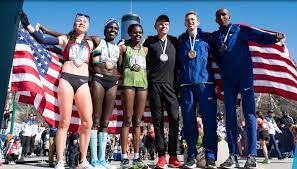
Chattanooga in Tennessee was the only other city known to be interested in bidding for the event.
"We look forward to a fantastic marathon on the streets of Orlando in selecting USATF’s first six 2024 Olympians," said USATF chief executive Max Siegel.

"The competition is the culmination of months of preparation on their journeys to gold and we’re excited to see great competition and fast times."
Orlando, home to more than a dozen theme parks, including Walt Disney World, is the first Florida city to be awarded the event.
This will mark the 15th time the men's marathon trials have been held, with the first at Alamosa in Colorado for Mexico 1968.
It will be the 11th time the women's marathon team has been selected in a Trials event.
The inaugural women's marathon trials were held at Olympia in Washington to select the team for Los Angeles 1984.
The winner of those trials, Joan Benoit, went on to be crowned the first women's Olympic marathon champion.
The trials for the last Olympics in Tokyo were held in February 2020, less than a month before the Games were postponed by a year because of the coronavirus pandemic.
The men’s race was won by Galen Rapp of the US and the women’s by compatriot Aliphine Tuliamuk.
The race is set to be organised by Track Shack, a race management company led by Jon and Betsy Hughes that stages a number of events in the Orlando area.
The Olympic marathons at Paris 2024 are scheduled to be held on August 10 and 11.
"On behalf of the U.S. Olympic & Paralympic Committee, I offer congratulations to the city of Orlando for being selected to host the 2024 U.S. Olympic Trials - Marathon and look forward to celebrating this great event on the road to Paris 2024 with the athletes, fans, and our partners at USATF," said USOPC chief executive Sarah Hirshland.
"As the pathway for making Team USA, the US Olympic Team Trials stand out as remarkable sporting events, and we have no doubt Orlando will welcome our elite runners and put on a world-class event."
by Duncan Mackay
Login to leave a comment
Paris 2024 Olympic Games
For this historic event, the City of Light is thinking big! Visitors will be able to watch events at top sporting venues in Paris and the Paris region, as well as at emblematic monuments in the capital visited by several millions of tourists each year. The promise of exceptional moments to experience in an exceptional setting! A great way to...
more...Aliphine Tuliamuk says the weather at the NYC marathon was not as bad as she expected as she finished first American in 7th place
It did not take long for Aliphine Tuliamuk to find air conditioning after finishing seventh as the top American in the warmest New York City Marathon since 1985.
She picked up her giggling 21-month-old daughter, Zoe, and placed her face directly in front of the cool air.
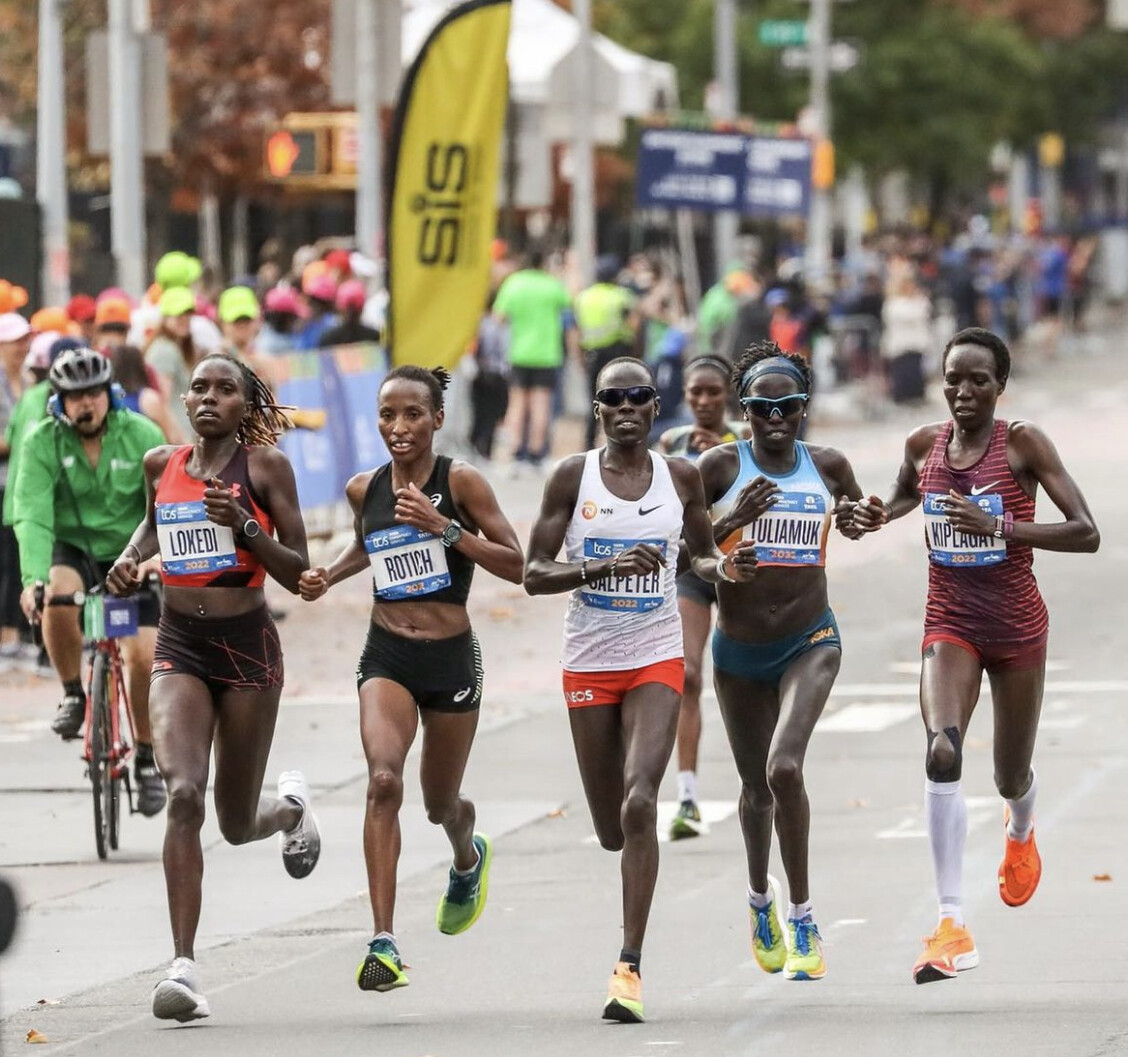
“To be honest with you, I don’t think it was actually as bad as I expected,” Tuliamuk said of the temperature, which reached 73 degrees when she crossed the Central Park finish line. “I was on point with my hydration.”
She clocked a personal-best 2:26:18, despite ankle swelling hampering her build up. She estimated that she only had five weeks of training before taking the last two weeks to taper.
“I excel when the conditions are not perfect,” she said. “I rise to the occasion, and I believe that today that was the case.”
Seventh was the lowest placing for the top American woman in New York City since 2015, when Laura Thweatt also finished seventh.
“I remember going into the race thinking, if I could get top seven, that would be really good,” Tuliamuk said. “I obviously wanted more.”
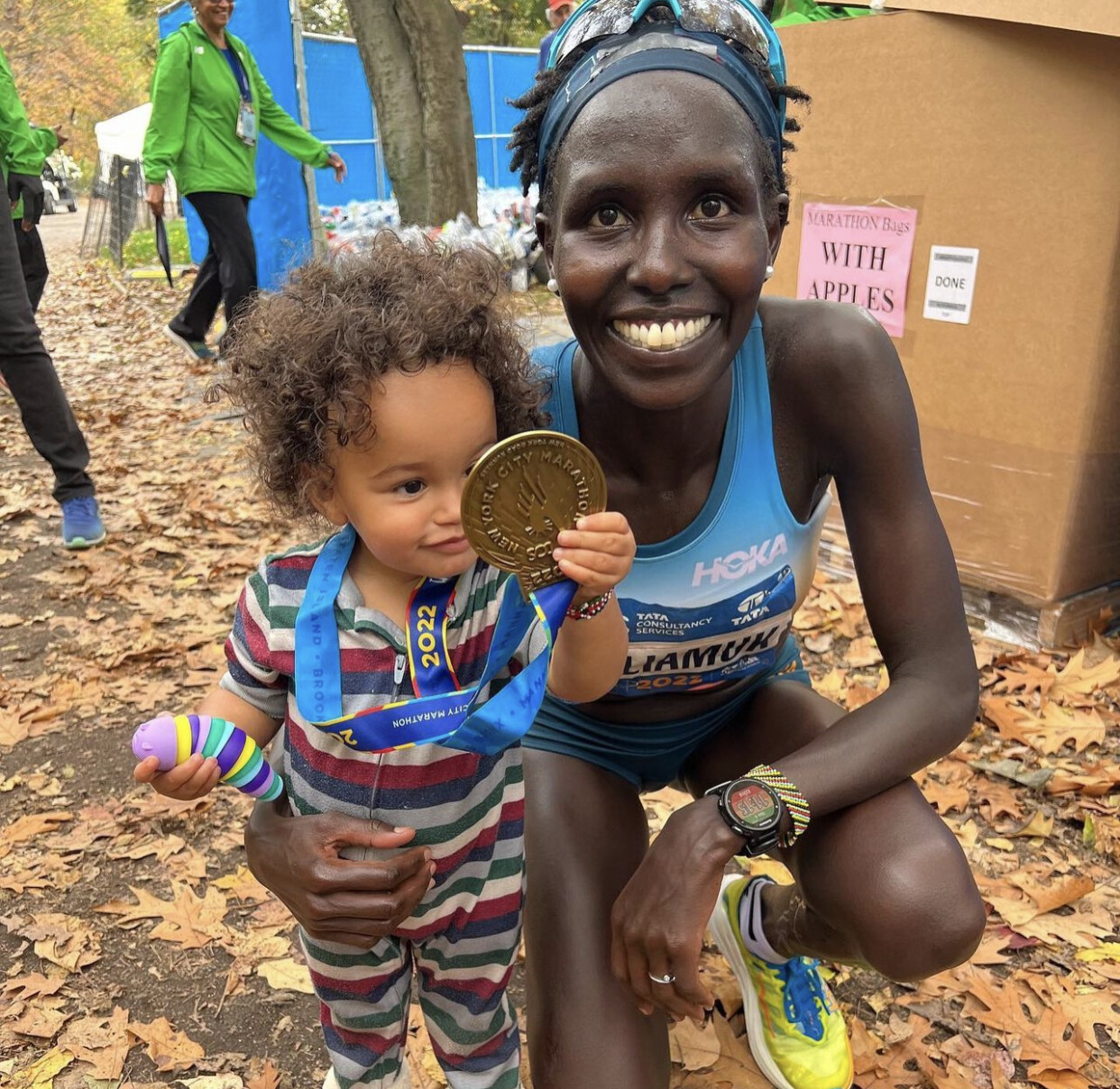
Tuliamuk is beginning to turn her attention to the Olympic Trials in the first quarter of 2024 at a to-be-announced site.
She plans on running a spring 2023 marathon, which could be her final marathon before trials, where the top three are expected to make up the team for the Paris Games.
“Once the [trials] schedule is out,” she said, “we’ll work backwards from that.
“I think that next Olympic team is going to be really, really hard to make.”
Tuliamuk identified Emma Bates, Keira D’Amato, Molly Seidel and Emily Sisson as her toughest competition. Sisson broke the American record at October’s Chicago Marathon, clocking 2:18:29 to lower D’Amato’s record from Jan. 16 by 43 seconds. Seidel claimed the bronze medal at the Tokyo Olympics.
“There’s so many Americans right now that are doing amazing,” Tuliamuk said. “It’s like you just have to have a perfect day.”
Tuliamuk made her Olympic debut at the Tokyo Games. She did not finish the race, seven months after she gave birth.
“I really want to make the next Olympic team,” she said. “The last one, the pandemic and having a child, I never really got to represent my country the way I wanted it.”
Tuliamuk will be 35 in 2024. The U.S. Olympic women’s marathon team included a 35-year-old at three of the last four Games.
“I really want a medal for my country,” she said. “I think that I have a lot of running in me. I have a lot of speed.”
Bates, 30, finished 35 seconds behind Tuliamuk for eighth place on Sunday.
“Those hills were a lot harder than I imagined,” said Bates, who revealed that she did not look at the course map before the race.
Bates wore a matching snake ring and earrings as she made her New York City debut, one year after placing second at the Chicago Marathon.
“I think I’m going to take some more risks next time,” she said. “Hopefully I’ll do better next time. I want to be top five.”
It was a big 48 hours for Bates, who was inducted into the Boise State Hall of Fame on Friday. She planned on celebrating with a Modelo beer.
Tuliamuk envisioned a tamer celebration, including showing Zoe around Central Park and other tourist attractions.
“I’m really grateful that I’m able to do all of it,” she said. “I’m able to run at the very highest level of our sport and be a mom at the same time.”
Login to leave a comment
TCS New York City Marathon
The first New York City Marathon, organized in 1970 by Fred Lebow and Vince Chiappetta, was held entirely in Central Park. Of 127 entrants, only 55 men finished; the sole female entrant dropped out due to illness. Winners were given inexpensive wristwatches and recycled baseball and bowling trophies. The entry fee was $1 and the total event budget...
more...The Kenyan duo won the elite races in 2:23:23 and 2:08:41 at the NYC Marathon having to make up significant ground on the long-time leaders
Sharon Lokedi displayed remarkable discipline to win the TCS New York City Marathon on her debut at the distance, while Evans Chebet’s patience paid off to win the men’s contest at the World Athletics Elite Platinum Label road race on Sunday March 6.
Lokedi flew under the radar heading into the women’s race as most of the focus was on world champion Gotytom Gebreslase, two-time world 5000m champion Hellen Obiri, who was making her marathon debut, and world bronze medallist Lonah Chemtai Salpeter.
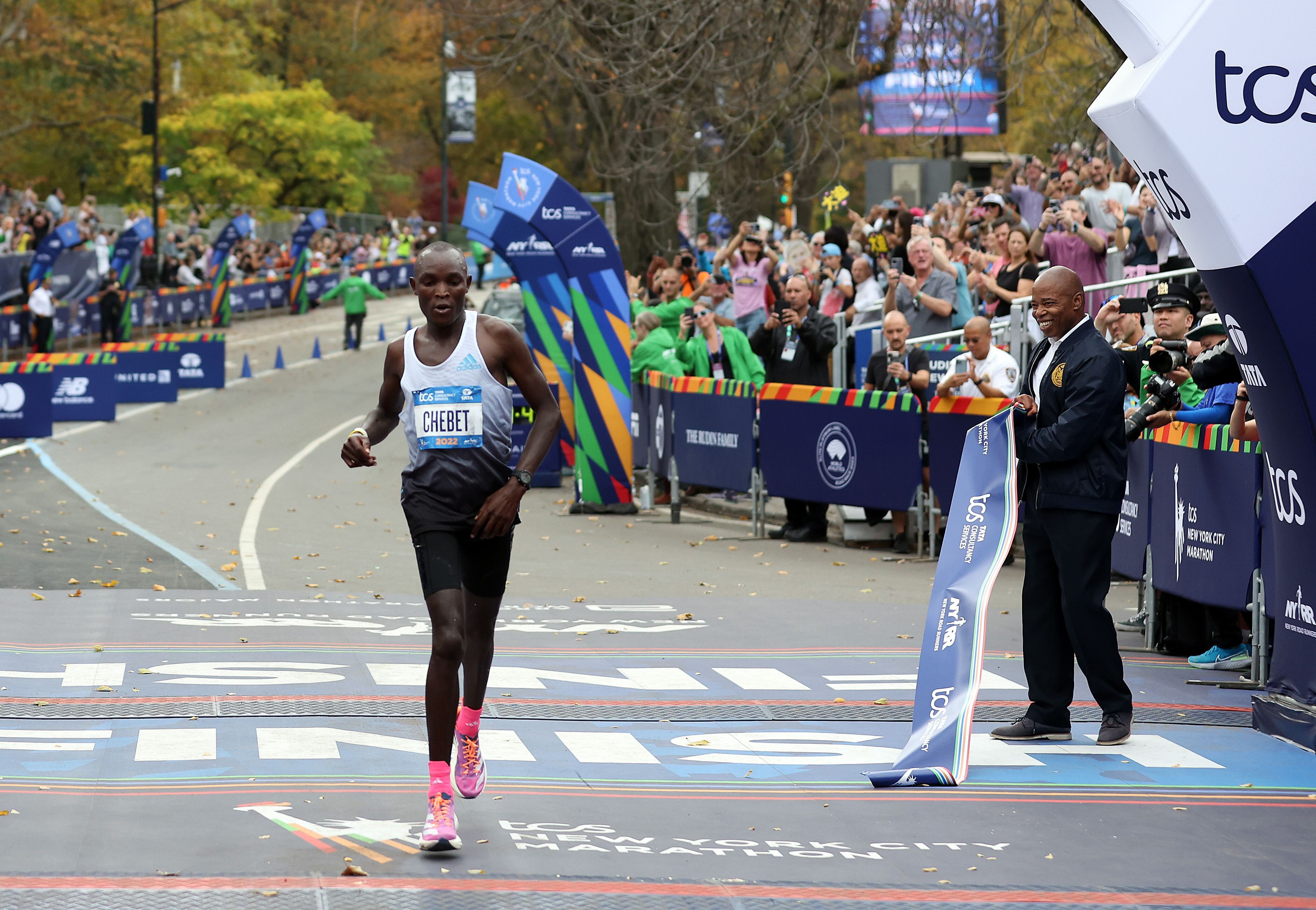
All four women featured in the large lead pack for the first half of the race as they passed through 10km in a conservative 34:24 before reaching the half-way point in 1:12:17. A few kilometres later, the pack had been whittled down to eight women, with two-time world champion Edna Kiplagat among them.
By 30km, however, three women had broken away from the rest of the field as Gebreslase, Obiri and Kenya’s Viola Cheptoo reached that checkpoint 1:42:27. At that point, Salpeter, Lokedi and Kiplagat were in a five-woman chase pack about 11 seconds adrift.
A few kilometres later, Salpeter and Lokedi caught the lead trio, then Cheptoo began to fade. It left Obiri, Gebreslase, Lokedi and Salpeter as the only four women in contention as they raced through Central Park in the closing stages.
Of those four, Obiri was the first to fall back, but she was far enough into the race to know that her debut marathon would not be a bad one. Somewhat surprisingly, Gebreslase was the next to slip out of contention, the world champion resigning herself to the third step on the podium.
It then left Salpeter and Lokedi to duel for the victory and for a moment it seemed as though Salpeter was the more comfortable. But with one mile to go, Lokedi dug deep and started to pull away from the Israeli runner.
Lokedi reached the finish line in 2:23:23 to win by seven seconds from Salpeter. Gebreslase took third place in 2:23:39 with Kiplagat, nine days shy of her 43rd birthday, coming through to take fourth place in 2:24:16 – more than four minutes quicker than her winning time in this race in 2010.
Cheptoo held on for fifth place in 2:25:34 and Obiri finished sixth in 2:25:49. Olympian Aliphine Tuliamuk was the top US finisher in seventh, 2:26:18.
“It was amazing,” said the US-based Lokedi. “I came in just wanting to be in the thick of the race. I knew I was strong and had really good training, so I wanted to go in and put myself in it and see where I ended up. I expected to run well, but it ended up being an even better outcome than I had hoped for.”
The men’s race played out quite differently, as South American record-holder Daniel Do Nascimento made an early break from the rest of the field.
The Brazilian led by 97 seconds at 10km, reached in 28:42 – just two seconds slower than his 10,000m track PB – and went on to reach half way in 1:01:22, more than two minutes ahead of the rest of the field and well inside course record pace.
A six-man chase pack – which included Chebet, Olympic silver medallist Abdi Nageeye, and 2020 London Marathon champion Shura Kitata – went through the half-way point in a more comfortable 1:03:35.
Do Nascimento continued to lead, although his lead started to wane – especially when he had to briefly take a visit to one of the road-side portable toilets. He passed through 30km in 1:29:09, now just over a minute ahead of Chebet, who had broken away from the rest of the chasers. By 20 miles, Do Nascimento’s lead was down to just 40 seconds. Not long after, and clearly struggling, he stopped running and crashed to the ground.
While medics helped Do Nascimento, Chebet cruised past. The Kenyan, who had won the Boston Marathon earlier this year, found himself with a 30-second lead over a three-man chasing group which included Kitata and Nageeye.
Despite a strong finish from Kitata, Chebet managed to hold on to the lead and crossed the finish line in 2:08:41. Kitata followed 13 seconds later, while Nageeye took third place in 2:10:31.
“The race was hard for me, but I was thankful for my team and have so much gratitude toward my coach,” Chebet said. “My team gave me motivation and I know that after winning Boston I could come to New York and also do well.”
Leading results
Women
1 Sharon Lokedi (KEN) 2:23:232 Lonah Salpeter (ISR) 2:23:303 Gotytom Gebreslase (ETH) 2:23:394 Edna Kiplagat (KEN) 2:24:165 Viola Cheptoo (KEN) 2:25:346 Hellen Obiri (KEN) 2:25:497 Aliphine Tuliamuk (USA) 2:26:188 Emma Bates (USA) 2:26:539 Jessica Stenson (AUS) 2:27:2710 Nell Rojas (USA) 2:28:32
Men
1 Evans Chebet (KEN) 2:08:412 Shura Kitata (ETH) 2:08:543 Abdi Nageeye (NED) 2:10:314 Mohamed El Aaraby (MAR) 2:11:005 Suguru Osako (JPN) 2:11:316 Tetsuya Yoroizaka (JPN) 2:12:127 Albert Korir (KEN) 2:13:278 Daniele Meucci (ITA) 2:13:299 Scott Fauble (USA) 2:13:3510 Reed Fischer 2:15:23
by World Athletics
Login to leave a comment
TCS New York City Marathon
The first New York City Marathon, organized in 1970 by Fred Lebow and Vince Chiappetta, was held entirely in Central Park. Of 127 entrants, only 55 men finished; the sole female entrant dropped out due to illness. Winners were given inexpensive wristwatches and recycled baseball and bowling trophies. The entry fee was $1 and the total event budget...
more...2022 New York City Marathon Sharon Lokedi and Evans Chebet Complete a Kenyan Sweep
In record heat for November, Kenyans dominate the New York City Marathon.
Evans Chebet was among the runners who watched as Daniel do Nascimento separated himself from the rest of the men’s field at the New York City Marathon on Sunday. Do Nascimento, a 24-year-old Brazilian who is known for being — what is the word? — assertive, was a blur as he surged into the lead, then a speck off in the distance, and then gone from view entirely.
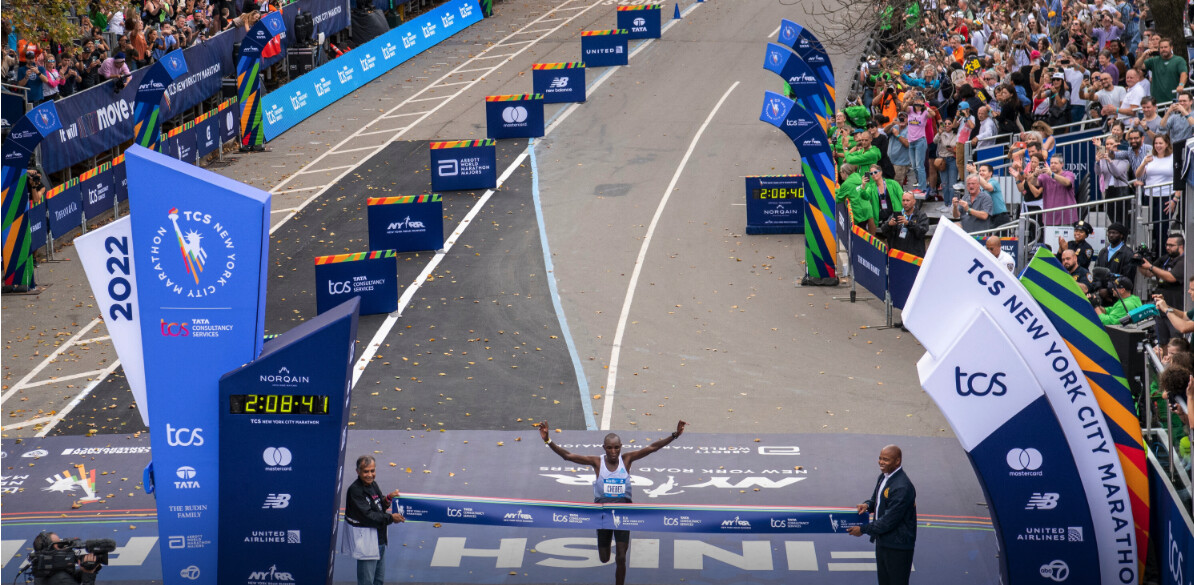
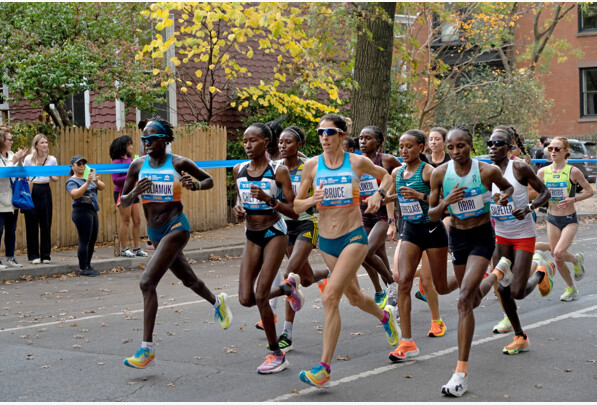
Chebet, a soft-spoken Kenyan who arrived in New York having already won the Boston Marathon this year, opted to exercise patience. Sure enough, as he approached the 21st mile of Sunday’s race, he saw do Nascimento again: face down by the side of the road, being tended to by medical personnel.
“I felt bad for him,” Chebet said in Swahili through a translator, “but I had to continue the race.”
On an unseasonably warm day, Chebet survived both the conditions and the competition, winning in 2 hours 8 minutes 41 seconds to complete a clean sweep for Kenyan men in all six of the world marathon majors this year. Chebet, 33, did his part by winning two of them — and two of the toughest. Of course, considering what Chebet had done in Boston, no one was surprised to see him tackle New York with great composure.
“Boston was actually harder,” said Chebet, who wore his laurel wreath to his news conference.
The women’s finish was much more unexpected. Sharon Lokedi, a Kenyan who raced in college at Kansas, was fearless in her marathon debut, breaking free from a celebrated field to win in 2:23:23.“Perfect weather for me,” said Lokedi, 28, who splits her time between Kenya and Flagstaff, Ariz., where she trains with the Under Armour-sponsored Dark Sky Distance group. “I didn’t expect to win. I expected to run well. But it ended up being a good outcome.”
Lokedi left an all-star cast in her wake. Lonah Chemtai Salpeter, a Kenyan-born Israeli who arrived in New York with the fastest time in the field, finished second. Gotytom Gebreslase of Ethiopia, the reigning world champion, was third. Edna Kiplagat of Kenya, who, at 42, is one of the world’s most decorated marathoners, was fourth. And Viola Cheptoo of Kenya, last year’s runner-up, was fifth.
“It was hot, but I was really prepared,” said Lokedi, who was the N.C.A.A. champion in the 10,000 meters in 2018. “I picked up water at every station to pour on myself.”Do Nascimento, who set a South American record when he finished third in the Seoul Marathon this year in 2:04:51, was the story in New York for much of the morning — until it all began to go poorly for him. Easily recognizable in his lavender tights and space-age sunglasses, he built a two-minute lead more than halfway through the race. But others in the field had seen him try that sort of bold strategy before.In brutal conditions at the Tokyo Olympics last year, do Nascimento was among the leaders when he collapsed in scenes that were vaguely horrifying and was forced to withdraw.
On Sunday, his superhuman pace was beginning to slow when he pulled off the course for an 18-second pit stop at a portable toilet. He emerged with his lead intact, albeit narrower, but it was clear that he was in trouble. About six miles short of the finish, he sank to the pavement and was forced to abandon the race.
“I want to feel sorry for him when I saw him on the ground,” said Abdi Nageeye of the Netherlands, who finished third. “But I was like, ‘Come on, man, this is the second time. You did that in the Olympics.’ ”
A spokesman for the marathon said do Nascimento was recovering at his hotel.
It was not an easy day for anyone. Galen Rupp, a two-time Olympic medalist who was making his long-awaited New York debut, dropped out about 18 miles into the race with a hip injury. And Shura Kitata of Ethiopia, who finished second behind Chebet, lumbered onto the stage for his news conference as if his legs were made of concrete. A race official handed Kitata a giant bag of ice, which he placed on his thighs.“It was very hot,” he said through a translator, “and that made it very tough.”
It was the warmest marathon on record since the race was moved to its traditional early November date in 1986. The temperature in Central Park was 73 degrees Fahrenheit at 11 a.m., shortly before the elite runners began to cross the finish line.
Scott Fauble, 31, was the top American on the men’s side, finishing ninth — a solid result coming the morning after he signed a new sponsorship deal with Nike. Fauble, who was also the top American finisher at the Boston Marathon this year, had been without a sponsor for months.
After agreeing to terms on a contract at dinner on Saturday night, Fauble took an Uber to the Nike store in Manhattan to pick up sneakers. The rest of his racing gear arrived at his hotel later that night.
“It’s quite a rush to get your singlet for the next day at 10 p.m. the night before the race,” he said.
On the women’s side, three Americans finished in the top 10. Aliphine Tuliamuk was seventh, Emma Bates was eighth and Nell Rojas was 10th. Tuliamuk, 33, who won the marathon at the U.S. Olympic trials in 2020 and gave birth to her daughter, Zoe, in January 2021, had not raced in a marathon since she injured herself at the Tokyo Games last year. On Sunday, she finished in a personal-best time of 2:26:18.
“I think that I excel when the conditions are not perfect,” Tuliamuk said. “I rise to the occasion, and I believe that today that was the case.”
Still, she had to overcome some adversity. In early September, she said, she experienced swelling in one of her ankles that forced her to take a couple of weeks off from training.
“In the back of my mind, I wished that I had a few more weeks” to train, she said. “But I also decided to focus on gratitude because I didn’t know that I was going to be here. And the fact that I was able to put in some solid training and had a chance to be competitive, I was just very grateful for that.”Gina Gregorio always watches the race from the corner of Warren Street and Fourth Avenue. This year she held signs that read, “Run to the Polls.”
“I love it when we’re right before the election because we can actually ask people to get out to vote, and it’s like nonpartisan, although I have had partisan signs before because I feel like it’s a great place to have your voice heard,” Gregorio said.
Login to leave a comment
TCS New York City Marathon
The first New York City Marathon, organized in 1970 by Fred Lebow and Vince Chiappetta, was held entirely in Central Park. Of 127 entrants, only 55 men finished; the sole female entrant dropped out due to illness. Winners were given inexpensive wristwatches and recycled baseball and bowling trophies. The entry fee was $1 and the total event budget...
more...Here is everything you need to know ahead of Sunday's TCS New York City Marathon
The world’s top marathoners have assembled in NYC for the 51st running of the TCS New York City Marathon this Sunday, Nov 6. The 2022 race returns to full capacity of 50,000 runners with a stacked field of elites in the men’s, women’s and wheelchair events. Defending champion Albert Korir of Kenya returns to defend the men’s title across the five boroughs and 2022 world champion Gotytom Gebreslase of Ethiopia headlines the women’s field.
How to watch:
Unless you live on the west coast, the 2022 TCS New York City Marathon will be easy to stream and follow online. The professional women’s field will begin at 8:40 a.m. E.T. and the professional men’s field at 9:05 a.m. E.T. Viewers should note that Daylight Savings Time ends in the early hours of Sunday morning, so viewers need to remember to change their clocks back an hour.
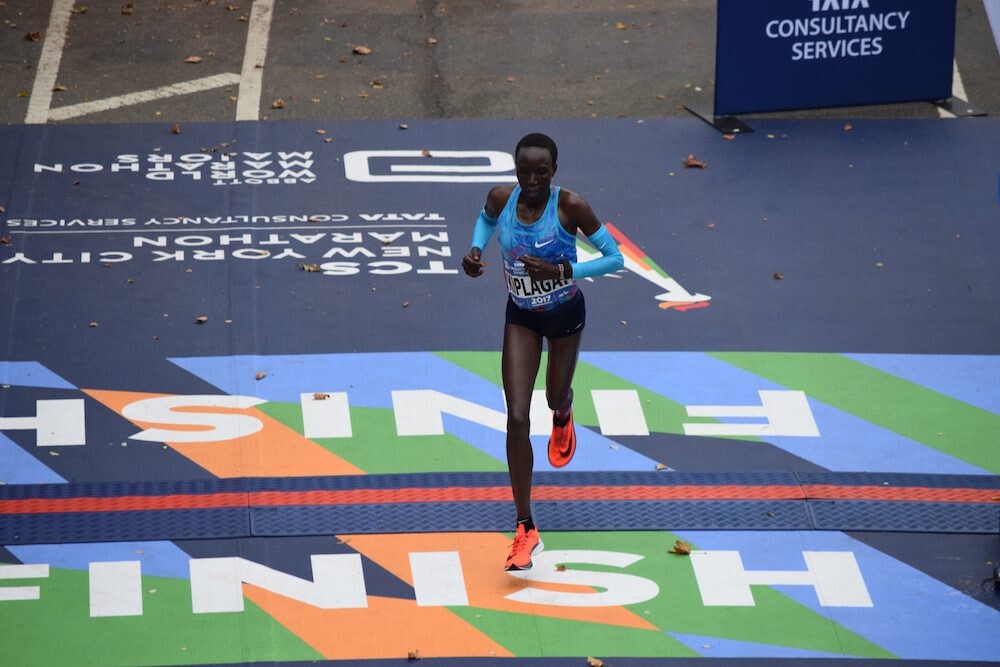
Follow @CanadianRunning on Twitter for live tweets and up-to-date news on the 2022 TCS NYC Marathon.
Women’s elite field
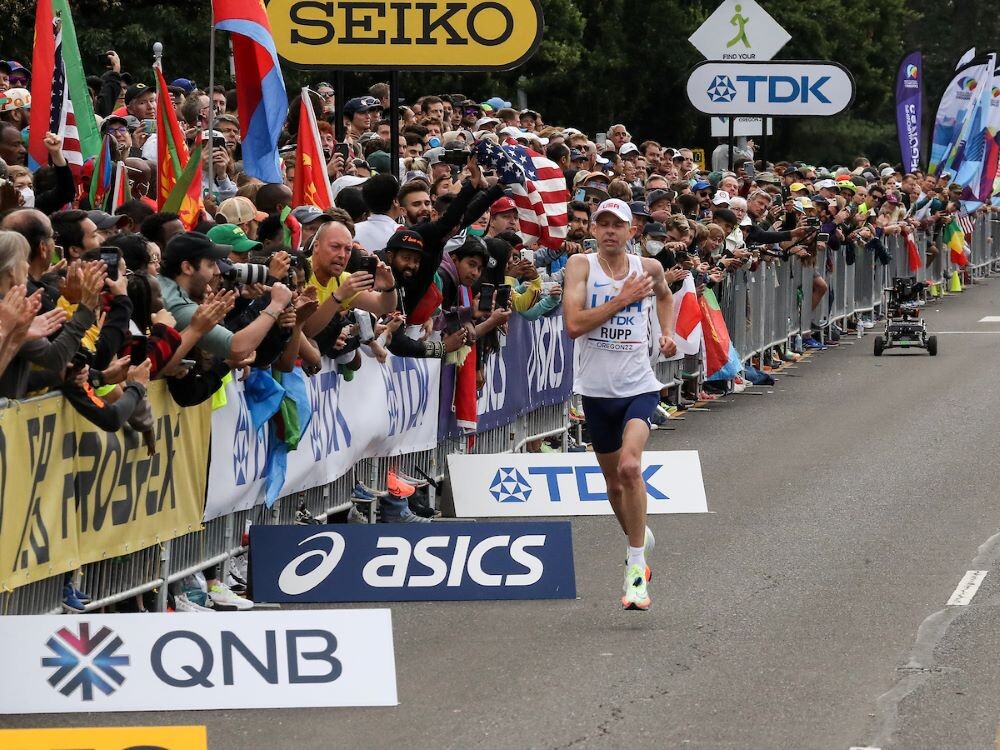
At only 27, Ethiopia’s Gebreslase has achieved much success in the marathon. In 2021, she won Berlin in her debut and followed it up with a podium finish at the 2022 Tokyo Marathon and world championship gold in Eugene this past July. Gebreslase put her talent on display in Eugene, showing that she can run at a fast pace and hold her own against the world’s best marathoners. She will be the likely favourite to win NYC Sunday.
Lonah Chemtai Salpeter is the fastest woman in the field, with a personal best of 2:17:45 from the 2020 Tokyo Marathon. Salpeter was close to an Olympic medal in Tokyo 2020 but hit a wall late and ended-up 66th. She finally got her hands on a bronze medal in Eugene this summer but was bested by Gebreslase in a late surge. Since worlds and European championships earlier this summer, Salpeter has taken some downtime to prepare for a bid at her second Abbott World Marathon Major title in NYC.
Kenya’s Edna Kiplagat will also be one to watch, with the 2011 and 2013 marathon world champion hoping to extend her record of four World Marathon Major wins to five (Boston 2021, 2017, New York 2010, and London 2014). Kiplagat was awarded the 2021 Boston Marathon title after her compatriot Diana Kipyokei was disqualified due to a positive doping test.
Many fans of the sport have long awaited the marathon debut of two-time 5,000m Olympic medallist and world champion Hellen Obiri of Kenya. She has gone through a lot of transition this year, switching training groups and moving from Kenya to Boulder, Colo., after worlds to train with On Athletics Club (OAC). It will be interesting to see how the speedy 14:18 5K runner can handle the hilly NYC course, but she could be a dark horse for the win.
Outside of the top big names, the U.S. will be well represented in NYC by former national record holder Keira D’Amato, who ran both the 2022 Berlin Marathon and World Championships only eight weeks apart, and Aliphine Tuliamuk, who won U.S. marathon Olympic Trials in 2020 and holds a personal best of 2:26:50.
Canadian Running prediction: Gotytom Gebreslase (ETH) – 2:21:42 *CR*
Men’s elite field
Kenya’s Korir has a tough job ahead of him on Sunday as he aims to defend his 2021 NYC Marathon title. In his two trips to the Big Apple, Korir has achieved a lot of success. In 2019, he finished runner-up to his compatriot Geoffrey Kamworor in 2:08:36, then followed it up with a win and 14-second course PB (2:08:22) in 2021 for his first world major win. One thing Korir has going for him is that he is consistent. In his last six of eight races, Korir has dipped under the 2:10-mark, which is a speedy time for New York’s hilly course.
Korir will face stiff competition from his Kenyan compatriot, 2022 Boston Marathon champion Evans Chebet, who will be hoping for a second major marathon win of the year. Chebet, 33, holds the fastest time in the field of 2:03-flat from the 2020 Valencia Marathon.
Ethiopia’s Shura Kitata will be another name to look out for, having finished second in 2018. Since his 2020 win at the London Marathon, Kitata has struggled to reach the podium in his last three races. His last race came in March, where he was sixth at the 2022 Tokyo Marathon in 2:06:12 for fifth. Can Kitata bounce back in NYC?
Abdi Nageeye of the Netherlands was second to Eliud Kipchoge in the marathon at the 2022 Olympics and set the Dutch national record of 2:04:56 at the Rotterdam Marathon in April. Nageeye has shown he has the experience to be there late, but it will be interesting to see how he handles the course in his debut.
The U.S. men’s field in New York is one of its best in years, with five sub-2:09 marathoners. The 2016 Olympic bronze medallist, Galen Rupp, will make his NYC debut and lead the way for the Americans with a personal best of 2:06:07. Leonard Korir (2:07:56), Scott Fauble (2:08:52), and Marty Hehir (2:08:59) are three others to keep your eye on. Fauble had a sensational run at the 2022 Boston Marathon, where he placed seventh in a personal best time of 2:08:52.
Canadian Running prediction: Evans Chebet (KEN) – 2:07:43
by Running Magazine
Login to leave a comment
TCS New York City Marathon
The first New York City Marathon, organized in 1970 by Fred Lebow and Vince Chiappetta, was held entirely in Central Park. Of 127 entrants, only 55 men finished; the sole female entrant dropped out due to illness. Winners were given inexpensive wristwatches and recycled baseball and bowling trophies. The entry fee was $1 and the total event budget...
more...SIMBASSA, BRUCE VICTORIOUS AT THE USATF 10 KM ROAD CHAMPIONSHIPS
Abbabiya Simbassa ran an incredible final mile on the men’s side, while Stephanie Bruce used a furious kick to the finish in the women’s race, both claiming victory Saturday morning in Northport, New York at the USATF 10 km Road Championships presented by Toyota.
The USATF 10 km Road Championships was the ninth stop on the 2022 USATF Running Circuit presented by Toyota.
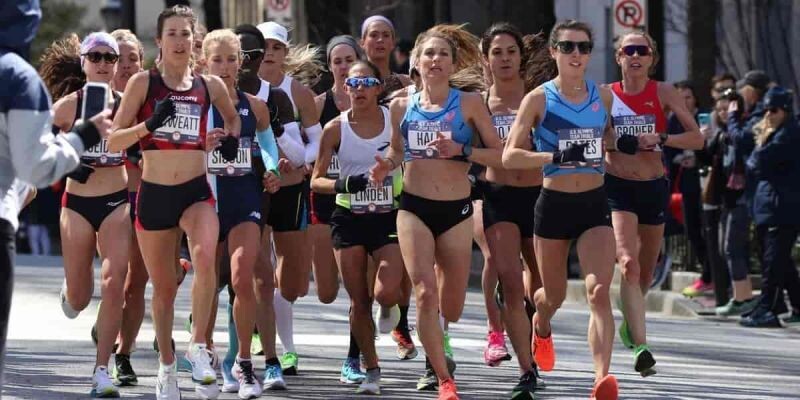
As the starting cannon sounded, the men’s field immediately strung out along the streets of Northport, with Jacob Thomson pushing the pace and taking over the early lead. The honest early pace kept the front pack small, with Thomson being joined by Sam Chelanga, Simbassa, and Korir, with a few second gap back to the rest of the field. With the halfway point in sight, Thomson opened a small lead over the rest of the lead quartet, passing through the 5 km mark in 14:21 and earning a half-way bonus.
Chelanga and Simbassa passed through two seconds back in 14:23, with Korir coming through 5 km in 14:27. Thomson would fall off pace shortly after halfway, with Simbassa and Chelanga taking over the pacing duties and pushing the pace over the next mile.
Korir sat just behind in third. With less than two miles to go, Simbassa pushed the pace and opened an immediate gap on Korir and Chelanga. Simbassa continued to push over the next mile, opening a nearly 20-second lead heading into the final mile of the race.
Over the final mile, Simbassa maintained both pace and form, extending his lead ever so slightly, on his way to claiming his third USATF Running Circuit title, crossing the finish line in 28:12, a new course record. Behind Simbassa, Korir and Chelanga waged an epic kick to the finish, with Korir pulling ahead by a step in the final meters to claim second overall in 28:34, while Chelanga placed third in 28:35.
Dillon Maggard, Futsum Zienasellassie, and Tai Dinger ran much of the race together Saturday, but in the end, it was Maggard pulling away in the final mile to claim fourth in 28:45. Zienasellassie earned another top-five finish on the USATF Running Circuit season with his fifth-place effort in 28:55, while Dinger finished a second behind in sixth in 28:56. Geoffrey Kipchumba claimed seventh overall in 29:00. Thomson slid back to eighth overall in 29:19. Ryan Kutch and Brian Barraza rounded out the top ten in 29:28 and 29:34.
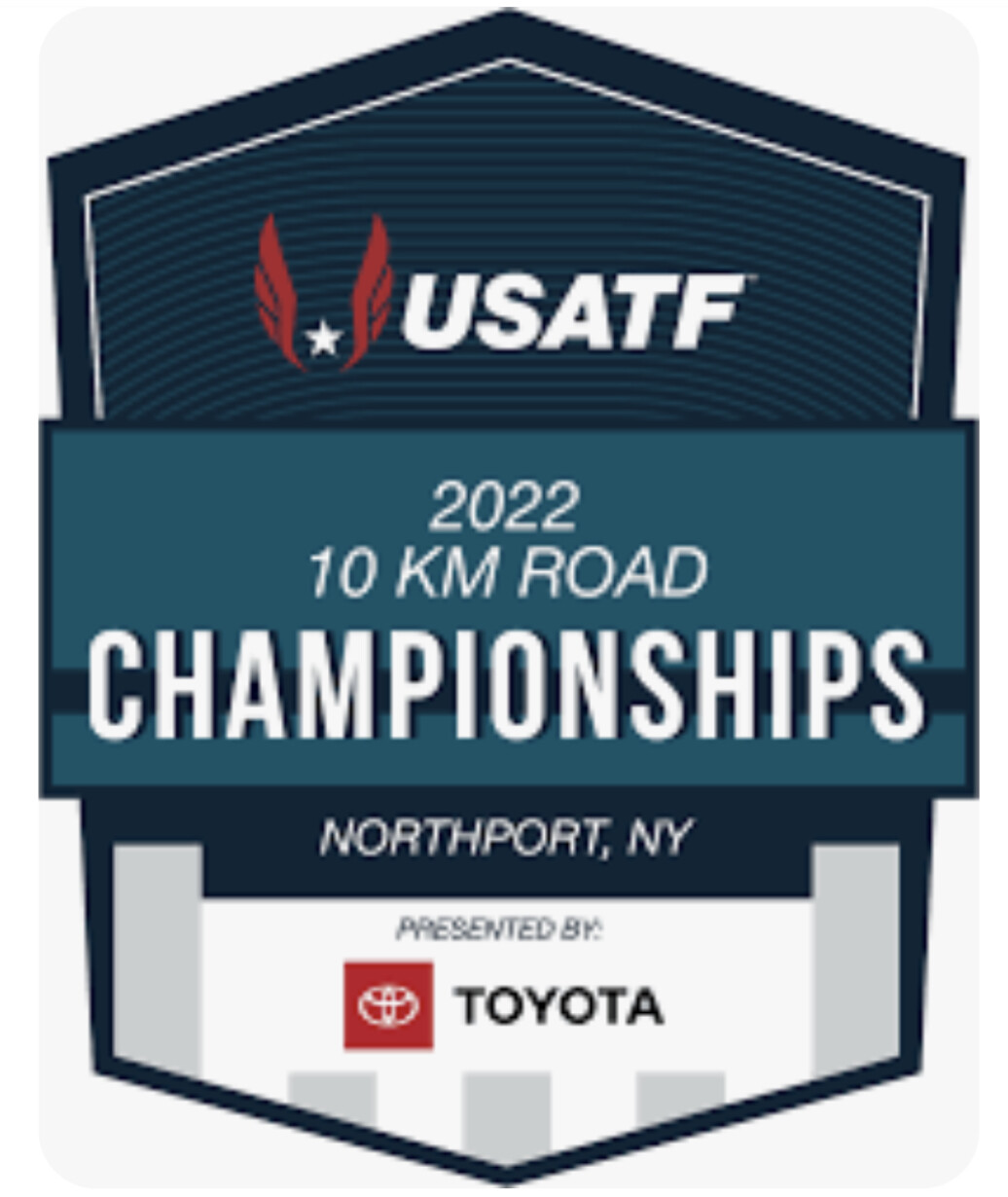
With Korir’s runner-up finish, his second of the USATF Running Circuit season, he elevated himself to an even more dominant first-place standing, with a 104 point total. Zienasellassie’s fifth-place effort added another six points to his standings total, giving him 56.5, sitting in second place overall. Chelanga’s third-place finish moved up into third place overall in the standings with 42 points.
Early in the women’s race, a pack of four women pulled away from the field, establishing a pace that no one else could manage. Bruce, Annie Frisbie, Nell Rojas, and Ednah Kurgat formed a tight pack and worked with one another along the streets of Northport.
The quartet came through the halfway point mark in 16:05, all four looking strong and able to handle the fast pace. Little changed among the top four until the final mile and a half, when Kurgat started to dip off the back of the pace, while the other three charged ahead, seemingly only a matter of time before someone made a move to try and break open the race.
Over the final mile, Bruce charged to the lead, ramping up the pace, a move that would prove decisive. Bruce pulled away from Rojas, Frisbie, and Kurgat, and never looked back, raising her arms as she crossed the line while earning her second USATF 10 km Road title and her third USATF Running Circuit victory of her career.
Bruce finished first in 31:52, while also breaking the course record. Rojas was able to break free of Frisbie and Kurgat in the final 800m to place second in 31:56, while Frisbie finished two seconds back in 31:58 and Kurgat seven seconds back in 32:03, as the two placed third and fourth, respectively.
With her runner-up effort, Rojas added 12 more points to her USATF Running Circuit standings total, giving her 33 points overall. That addition moves Rojas up into sole position of third overall, a half point ahead of Aliphine Tuliamuk, but still well behind USATF Running Circuit standings leaders Emily Sisson and Keira D’Amato, who are tied for first with 55.5 points.
After the top four women, there was a race for fifth happening over the back half of Saturday’s contest. In the end it was Emma Hurley pulling away from the field in the final mile, racing to a fifth-place finish in 32:49. Hurley finished just ahead of Amy Davis and Molly Grabill, who ran to sixth and seventh place finishes in 32:52 and 32:54. Erika Kemp, who owned the previous course record, placed eighth overall in 32:59. Carrie Verdon took home ninth place in 33:05 and Anne-Marie Blaney earned tenth in 33:21.
Next up on the USATF Running Circuit is the USATF 10 Mile Championships presented by Toyota, which take place on Sunday, October 2 in Minneapolis, hosted by the Medtronic TC 10 Mile.
Login to leave a comment
Kenya's Hellen Obiri to train in US for New York Marathon
World 10,000 meters silver medalist Hellen Obiri plans to travel to America ahead of time before making her debut in New York Marathon race on November 6.
In an interview with Nation Sport, the double 5,000m world champion said that she will be heading to Colorado, USA to acclimatize.
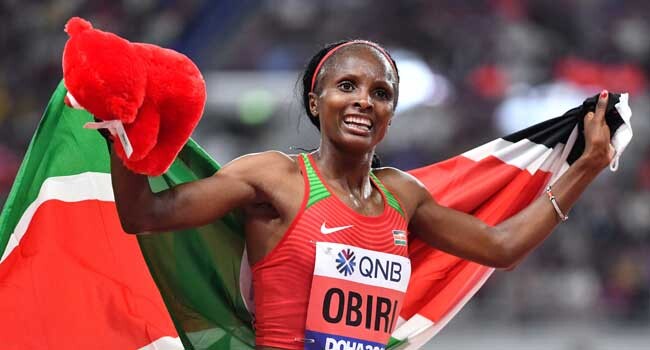
Obiri said that she will be depending on her new coach Dathan Ritzenhein, who heads On Athletics Club, for guidance.
Ritzenhein is a former athlete who has previously competed in the New York Marathon.
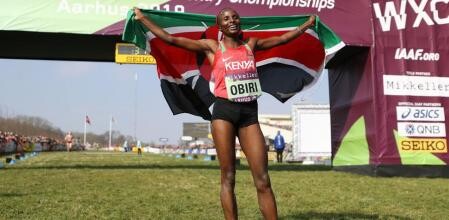
Obiri, who has plans to relocate to the US, said that she is not moving yet.
“There is still some paperwork that I’m working on before finalizing my move to the US. But, I will be going to Colorado for training because I want to acclimatize before the race. I look forward to a good race, but the most important thing for me is to learn,” she said.
The World Athletics Cross Country Championships title holder, who has been training in Ngong, Kajiado County, said that when she stepped up to marathon racing, it was not easy because the training is different.
“Marathon training is different from what I was used to while competing in track races. At fast it was tricky, but I persevered and I am now used to it,” she said.
The Olympic 5,000m silver medalist said that she was inspired to switch to marathon by two-time world marathon champion Edna Kiplagat.
“I was really inspired by Edna Kiplagat who has been doing well for long and is still competing. I have interacted with her, and when I learned that she was part of the elite field at New York Marathon, I felt encouraged that she will be racing with me,” said Obiri.
“Before the competition, I look forward to train with Edna in the US.”
The Istanbul Half Marathon champion said that she took a leap of faith to compete in full marathon after performing well in half marathon races.
Obiri clocked 64:38 to win this year’s Istanbul Half Marathon after having triumphed in the same race last year in 64:51.
The former 5,000m African champion has had a good season which climaxed in her winning a 10,000m silver medal at the World Athletics Championships in Oregon, USA on July 16.
In New York, Obiri will be up against defending champion and Olympic marathon champion Peres Jepchirchir, Edna, debutante Sharon Lokedi, Caroline Rotich and US-based Viola Lagat, who was second last year.
Other top names in the race are newly crowned world champion Ethiopian Gotytom Gebreslase and her compatriot Senbere Teferi, world bronze medalist Israel’s Lorna Chemtai Salpeter, USA’s Sara Hall and Aliphine Tuliamuk.
by Bernard Rotich
Login to leave a comment
TCS New York City Marathon
The first New York City Marathon, organized in 1970 by Fred Lebow and Vince Chiappetta, was held entirely in Central Park. Of 127 entrants, only 55 men finished; the sole female entrant dropped out due to illness. Winners were given inexpensive wristwatches and recycled baseball and bowling trophies. The entry fee was $1 and the total event budget...
more...World Championships Medalists Gotytom Gebreslase, Lonah Chemtai Salpeter, and Hellen Obiri to Join Women’s Field at 2022 TCS New York
Sara Hall, Emma Bates, Aliphine Tuliamuk, Des Linden, Nell Rojas, and Stephanie Bruce to anchor star-studded contingent of American women.
World Championships medalists Gotytom Gebreslase of Ethiopia, Lonah Chemtai Salpeter of Israel, and Hellen Obiri of Kenya will join previously announced New York City and Olympic champion Peres Jepchirchir in the women’s professional athlete division at this year’s TCS New York City Marathon on Sunday November 6. All three will make their TCS New York City Marathon debuts, with Obiri making her 26.2-mile debut across any course, and will line up against a star-studded contingent of American women that includes Sara Hall, Emma Bates, Aliphine Tuliamuk, Des Linden, Nell Rojas, and Stephanie Bruce. The 2022 TCS New York City Marathon women’s professional athlete field is presented by Mastercard®.
Women’s Open Division
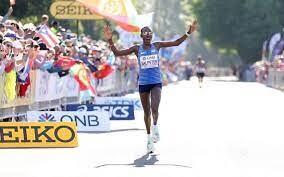
Fresh off her victory at the world championships marathon, where she finished the course in a championship-record time of 2:18:11, Gebreslase will make New York City her next stop. She will look to add a five-borough title to her resume, having previously won the 2021 Berlin Marathon and finished third at the 2022 Tokyo Marathon.
“Winning the World Championships was like a dream, and I am honored to run my next marathon in New York City,” Gebreslase said. “It’s home to the biggest marathon in the world, and many of the top athletes have run there. I understand it’s a challenging course, and I’m looking forward to seeing further success there.”
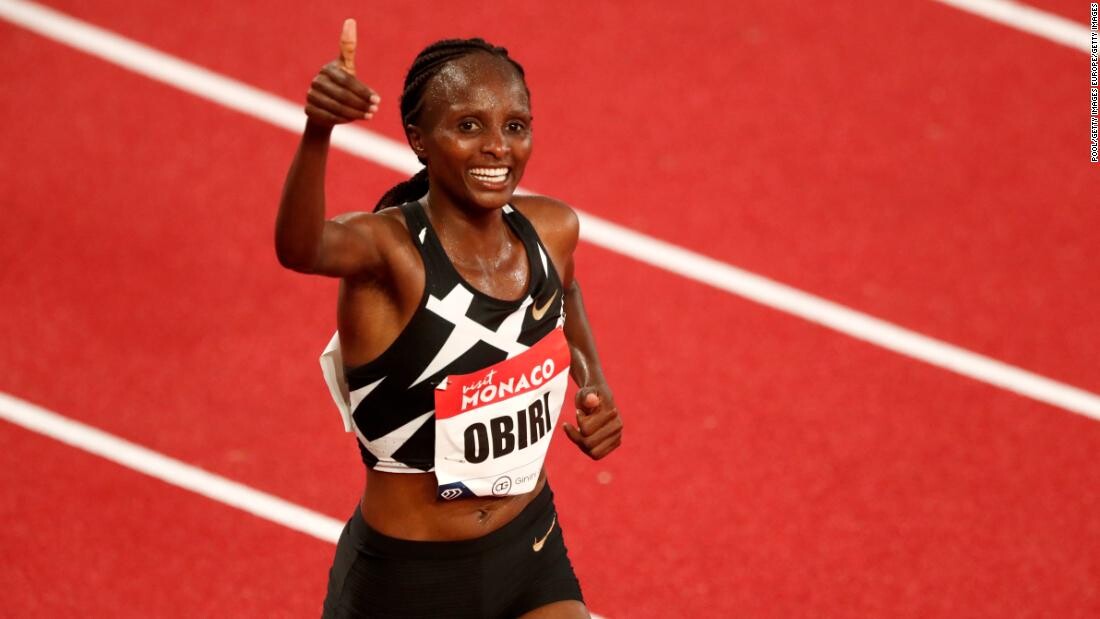
Two-time Olympian Salpeter, a Kenyan-born Israeli who won the bronze medal at the world championships marathon and was the 2020 Tokyo Marathon winner, will challenge Gebreslase once again. Obiri, a two-time Olympic medalist and seven-time individual world championships medalist, will make her highly anticipated marathon debut shortly after winning a world championships silver over 10,000 meters.
“I’m very excited to make my marathon debut at the TCS New York City Marathon,” Obiri said. “I have watched the race many times on TV and have seen my Kenyan colleagues compete there. I know New York is a tough course, but I hope my experience on track, road, and cross-country will help me navigate the ups and downs. I also plan to get advice and tips from coach Dathan Ritzenhein, who competed in the race several times in the past.”
In addition to Jepchirchir, the group will be racing against Ethiopia’s Senbere Teferi, who will look to become the first athlete to win the United Airlines NYC Half, Mastercard New York Mini 10K, and TCS New York City Marathon in one year. Three other Kenyans will also be strong contenders for podium places, including the 2010 New York City, 2014 London and 2017 Boston Marathon champion Edna Kiplagat, last year’s runner-up Viola Cheptoo, and newcomer Sharon Lokedi.
The American effort will be led by 10-time national champion Hall, who was the top world championships marathon finisher from the U.S. last month in Oregon, where she placed fifth. She is also the former half marathon national record holder, the runner-up from the 2020 London Marathon, and a two-time winner of the Mastercard New York Mini 10K. She will be joined at the Staten Island start line by Bates, who clocked a personal best to finish seventh at the world championships and was the runner-up at last year’s Chicago Marathon.
“From winning the Millrose mile to back-to-back Mini 10K wins, most of my favorite career moments have happened in NYC,” Hall said. “I’m all-in to add to that by having my best marathon yet at the TCS New York City Marathon. I can’t wait to be back racing my heart out in the five boroughs of my favorite city.”
Tokyo 2020 Olympian Aliphine Tuliamuk, and two-time Olympian and 2018 Boston Marathon champion Des Linden, will also return to New York, as will national champion Stephanie Bruce, who will race the five boroughs for the final time before retiring. The deep U.S. women’s group will additionally include Nell Rojas, the top American finisher from the last two Boston Marathons, Lindsay Flanagan, the top American finisher from the 2022 United Airlines NYC Half, Annie Frisbie, last year’s seventh-place finisher, and her training partner Dakotah Lindwurm, who won Grandma’s Marathon in June. Emily Durgin, the sixth-fastest U.S. half marathoner of all-time, will make her marathon debut.
by Running USA
Login to leave a comment
TCS New York City Marathon
The first New York City Marathon, organized in 1970 by Fred Lebow and Vince Chiappetta, was held entirely in Central Park. Of 127 entrants, only 55 men finished; the sole female entrant dropped out due to illness. Winners were given inexpensive wristwatches and recycled baseball and bowling trophies. The entry fee was $1 and the total event budget...
more...Aliphine Tuliamuk will make marathon return at 2022 New York City Marathon
For Aliphine Tuliamuk, the decision to run in the 2022 TCS New York City Marathon was a no-brainer. The 33-year-old ran the event back in 2019, finishing 12th, and she never thought it would take three years before a return trip to Staten Island’s start line.
“It was not even, you know, a matter of if – it was just when can I get to New York? So, it was not even a decision. Easy,” explains the Kenyan-born American long-distance runner, who made a name for herself in February 2020 when she won the U.S. Olympic Marathon Trials.
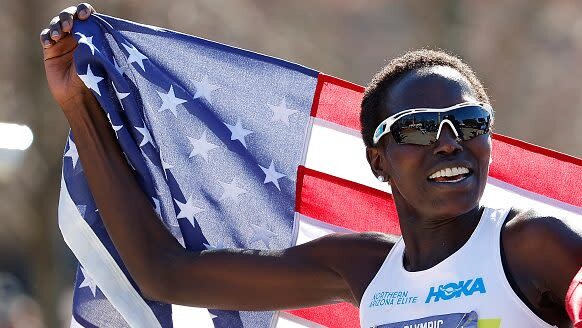
But the Covid-19 pandemic hit immediately after her Trials win, postponing the Olympics and canceling that year’s edition of the NYC Marathon. During the forced hiatus, she started a family with partner – now husband – Tim Gannon, welcoming daughter Zoe in January 2021. Injury struck later that year while she was training for the postponed Tokyo Olympics, and Tuliamuk withdrew about 20k into her Olympic debut with severe hip pain and hasn’t competed in a marathon since.
Her return to marathon competition has Tuliamuk fired up, both literally and figuratively.
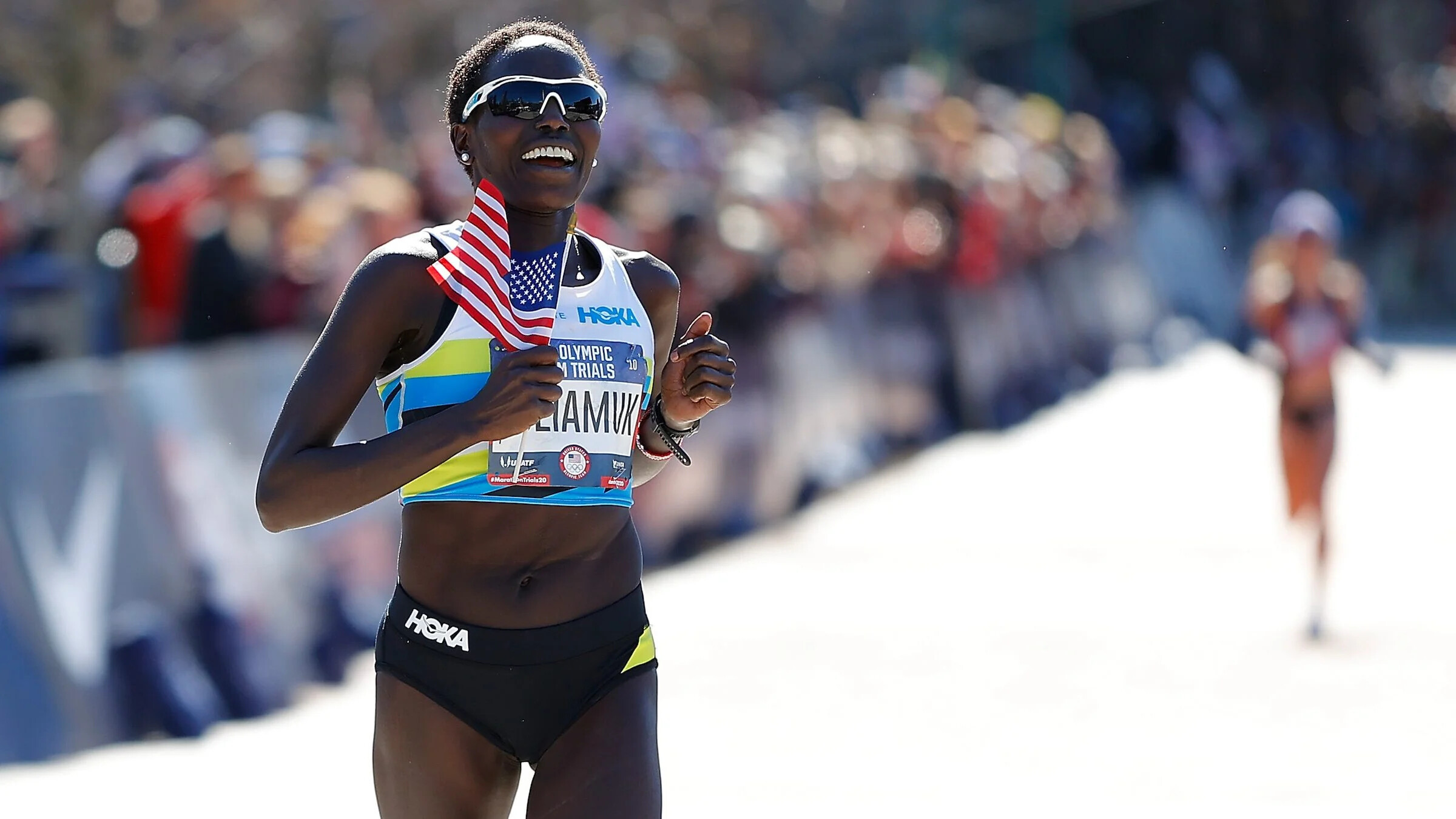
“I’m faster than I’ve ever been before,” she recently told On Her Turf. “And it kind of makes me excited and nervous to see what (the) New York City Marathon brings, because this is going to be the first time I am actually going to complete a marathon since the 2020 Olympic Trials. That’s like, almost three years. So it’s going to be super exciting.”
Tuliamuk won’t have to wait until November, however, to enjoy a visit to the Big Apple. She’ll lace up her sneakers this Saturday, Aug. 13, as a “running buddy” to the young women who participate in the New York Road Runners (NYRR) Run for the Future program. The free, seven-week program introduces 11th- and 12-grade female high schoolers to the sport of running and culminates with this weekend’s NYRR Percy Sutton Harlem 5K.
“Running transformed my life into the life that I have today,” she explains. “I mean, without running I wouldn’t be where I am today. And to know that these girls did not have running experience before, they knew nothing about running, and then they were able to get into running through New York Road Runner feeder program, and now they will be graduating, and I get to run with them? I think that’s just incredible.”
The opportunity comes with an extra layer of “grateful” after Tuliamuk’s most recent injury. She sustained a concussion in February after slipping while training in icy, snowy conditions. She also suffered headaches and temporary memory loss, both of which subsided after about a week but left a lasting impression.
“It just gives you a perspective that like your life could literally, in a second, just turn and be something else,” she says. “This is just me being dramatic, but I could have forgotten completely. And the life that I had would have been something like a past life. I think after that, I was like, ‘Okay, I’m going to try to live life to the fullest.’ I’m going try to be present as much as I can, because you just never know.”
by Lisa Antonucci
Login to leave a comment
TCS New York City Marathon
The first New York City Marathon, organized in 1970 by Fred Lebow and Vince Chiappetta, was held entirely in Central Park. Of 127 entrants, only 55 men finished; the sole female entrant dropped out due to illness. Winners were given inexpensive wristwatches and recycled baseball and bowling trophies. The entry fee was $1 and the total event budget...
more...Twelve Olympians will lead star-studded lineup at 50th anniversary of Mastercard New York Mini 10K
Twelve Olympians and five Paralympians will line up in Central Park for the 50th anniversary of the Mastercard® New York Mini 10K, the world’s original women-only road race, on Saturday, June 11, New York Road Runners (NYRR) announced today.
U.S. Olympians Emily Sisson, Molly Seidel, Aliphine Tuliamuk, and Rachel (Schneider) Smith will lead a strong American contingent that will go up against previously announced Olympic, TCS New York City Marathon, and Boston Marathon champion Peres Jepchirchir, United Airlines NYC Half champion and 5K world-record holder Senbere Teferi, and two-time Mini 10K champion Sara Hall.
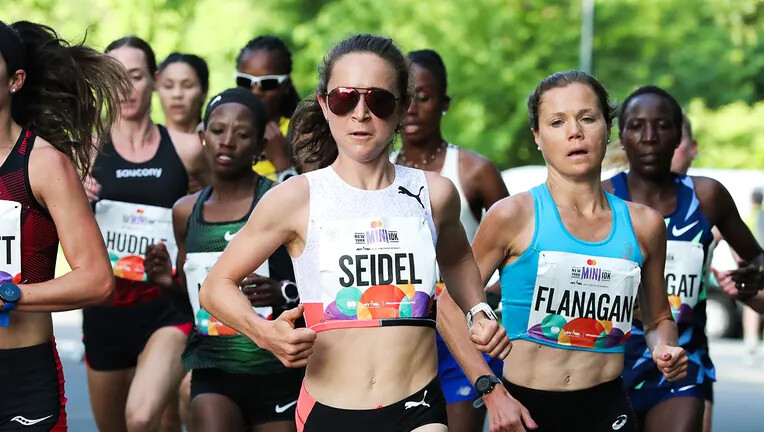
Sisson will come into the race after claiming her sixth national title last month in an American record 1:07:11 at the USATF Half Marathon Championships. She made her Olympic debut in Tokyo last summer after winning the 10,000 meters at the U.S. Olympic Track and Field Trials, where she broke the 17-year-old Trials record set by Deena Kastor in 2004. She has been very successful in her last three trips to New York, finishing as the runner-up at the United Airlines NYC Half twice and winning the USATF 5K Championships.
“After breaking the American record in the half-marathon, I’m excited to step down in distance and compete in the Mastercard® New York Mini 10K for the first time,” Sisson said. “It will be a privilege to take part in such a powerful event that has paved the way for so many women over the last 50 years.”
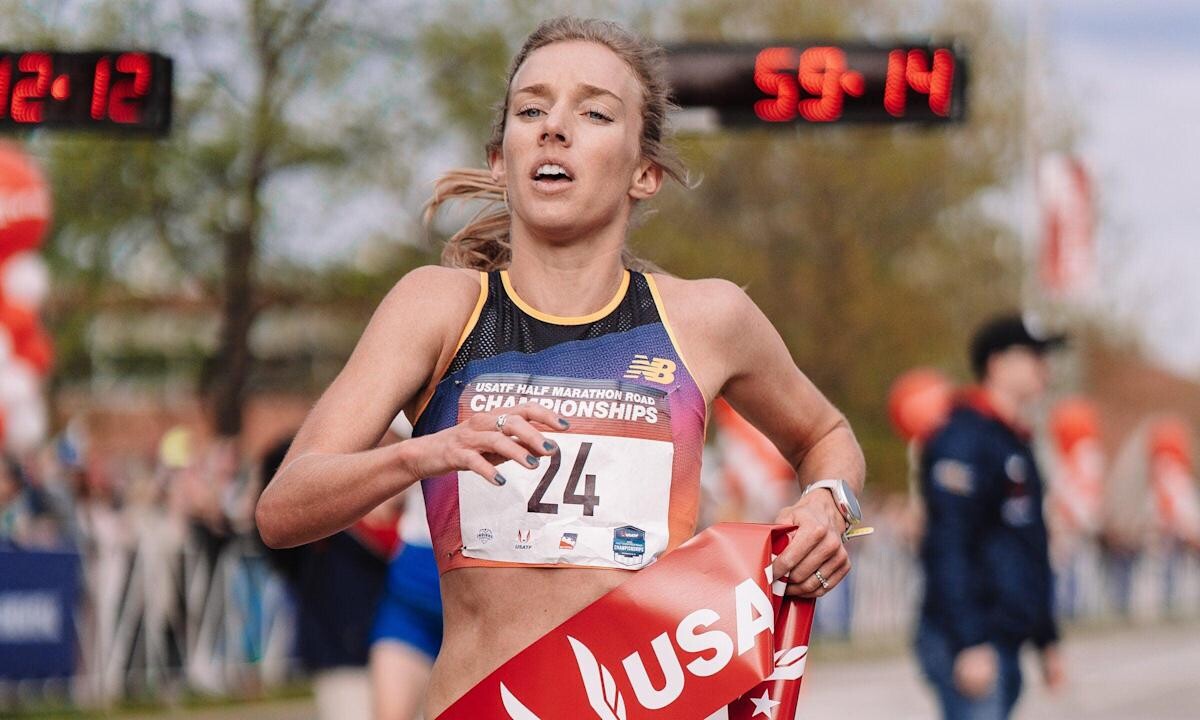
Seidel owns a bronze medal from the Tokyo Olympic marathon last year and in her last trip to New York set an American course record and recorded a fourth-place finish at the TCS New York City Marathon. Tuliamuk won the 2020 U.S. Olympic Marathon Trials and then gave birth to her daughter before running in the Olympic marathon in Tokyo. She will be making her first trip to New York since 2019 and is coming off winning the 25km national title, bringing her national title count to 11. Smith represented the U.S. at the Tokyo Olympics in the 5,000 meters after finishing third in the distance at the U.S. Olympic Track and Field Trials.
The deep U.S. women’s contingent also includes American marathon record-holder Keira D’Amato, the top American finisher at the last two Boston Marathons Nell Rojas, 2019 New York Mini 10K runner-up Stephanie Bruce, U.S. national champion Erika Kemp, and the top American finisher at the 2022 United Airlines NYC Half Lindsay Flanagan.
Returning to the event 10 years after her victory will be Kenya’s Edna Kiplagat, a two-time world champion in the marathon who won the 2010 New York City, 2014 London, and 2017 Boston marathons, and was the runner-up in Boston in 2019 and 2021.
“Winning the New York City Marathon 12 years ago changed my life, and now, 10 years after also winning the Mini 10K, I still enjoy my racing and am happy to still be competing at a high level,” Kiplagat said. “NYRR always invites the highest quality fields, so I always like lining up in New York with the best in the world. There are so many inspiring women who have participated in this race over the years who set a positive example for everyone – both runners and non-runners – and I’m lucky to be part of such a prestigious group.”
Last year’s TCS New York City Marathon runner-up and Mastercard® New York Mini 10K runner-up Viola Cheptoo of Kenya and former NCAA 10,000-meter champion Sharon Lokedi of Kenya will contend for the title as well.
The professional wheelchair division will be headlined by two-time Paralympic medalist and three-time Mastercard® Mini 10K defending champion Susannah Scaroni. Since the addition of the professional wheelchair division in 2018, Scaroni is the only athlete to have won the race.
“The Mastercard New York Mini 10K is a special one to me for so many reasons, and I’m excited at the chance to race on what will be a milestone day for women’s running in Central Park,” Scaroni said. “Not only is the Mini 10K the world’s original women-only road race, but it is also one of the only women-only wheelchair races at the present time, which will hopefully pave the way for future generations of women’s wheelchair racers in the next 50 years.”
Lining up against Scaroni will be U.S. Paralympians Jenna Fesemyer, Yen Hoang, Hannah Dederick, and Eva Houston.
The Mini 10K, which began in 1972 as the Crazylegs Mini Marathon, was the first women-only road race and has gone on to garner more than 200,000 total finishers to date. Former NYRR President Fred Lebow named the race after the miniskirt, which back then was in vogue. A total of 72 women finished the first race, and three weeks later, Title IX was signed into law, guaranteeing girls and women the right to participate in school sports and creating new opportunities for generations of female athletes.
The Mastercard® New York Mini 10K will offer $45,000 in total prize money, including $10,000 to the winner of the open division and $2,500 to the winner of the wheelchair division. The professional athlete races will be streamed live on USATF.TV beginning at 7:40 a.m. ET. Mastercard® will serve as title sponsor of the event for the second time, and as part of its on-going partnership with NYRR will also serve as the presenting sponsor of professional women’s athlete field.
by Running USA
Login to leave a comment
New York Mini 10K
Join us for the NYRR New York Mini 10K, a race just for women. This race was made for you! It’s the world’s original women-only road race, founded in 1972 and named for the miniskirt, and it empowers women of all ages and fitness levels to be active and to look and feel great on the run. Every woman who...
more...Alan Culpepper named new head coach of HOKA NAZ Elite
One of the top training groups in the U.S., HOKA NAZ Elite, has announced the hiring of two-time Olympian Alan Culpepper as their new head coach. Culpepper will take over from previous coach Ben Rosario, who will be stepping into an executive director position with the track club, focusing on content, corporate partnerships and community initiatives.
“We’ve been working on this for a full year, and I couldn’t be more pumped with the end result,” said Rosario in a press release. “Alan will head to Flagstaff, Ariz., on Friday, May 20, where he will step into the coaching position straight away.
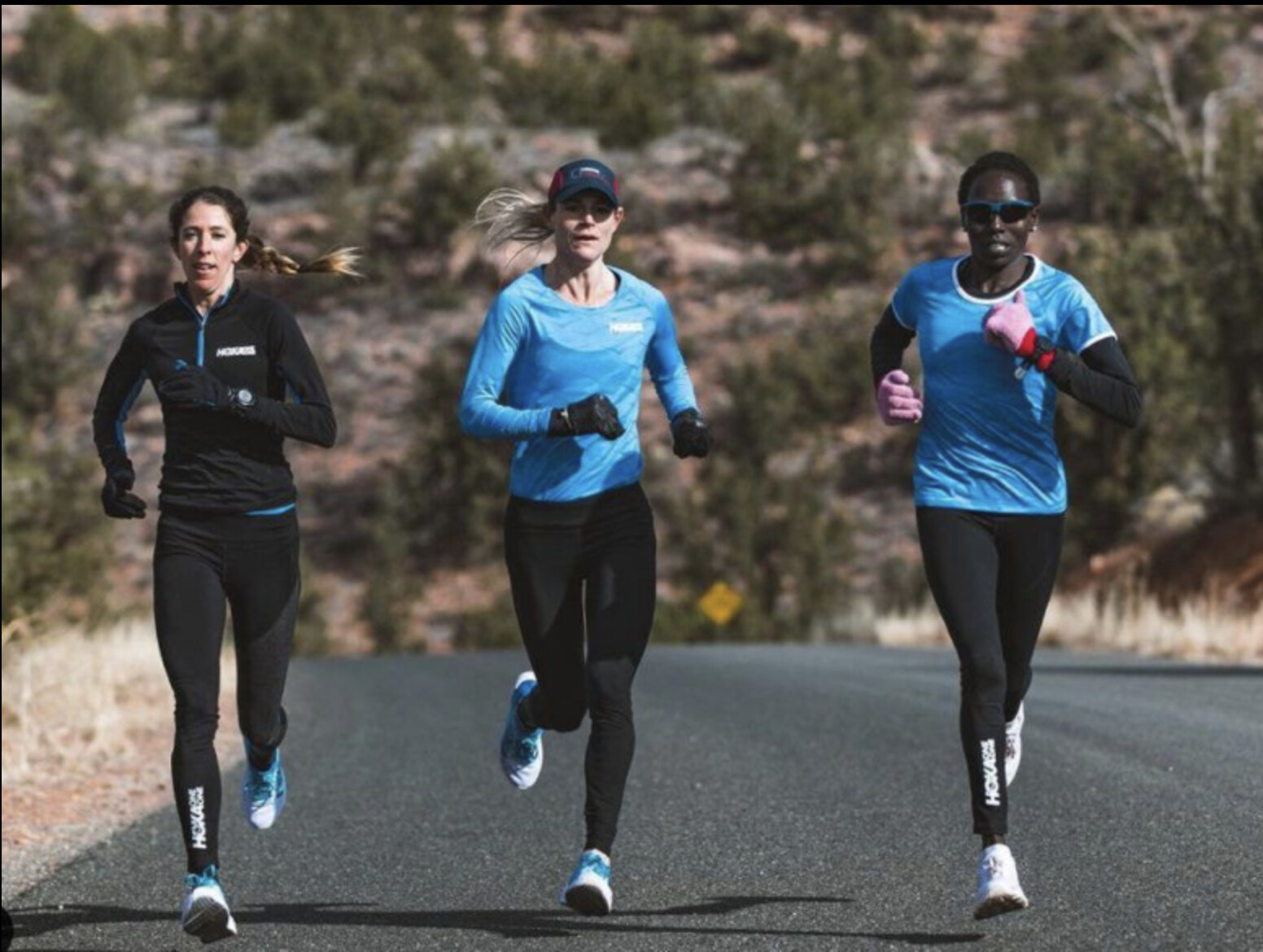
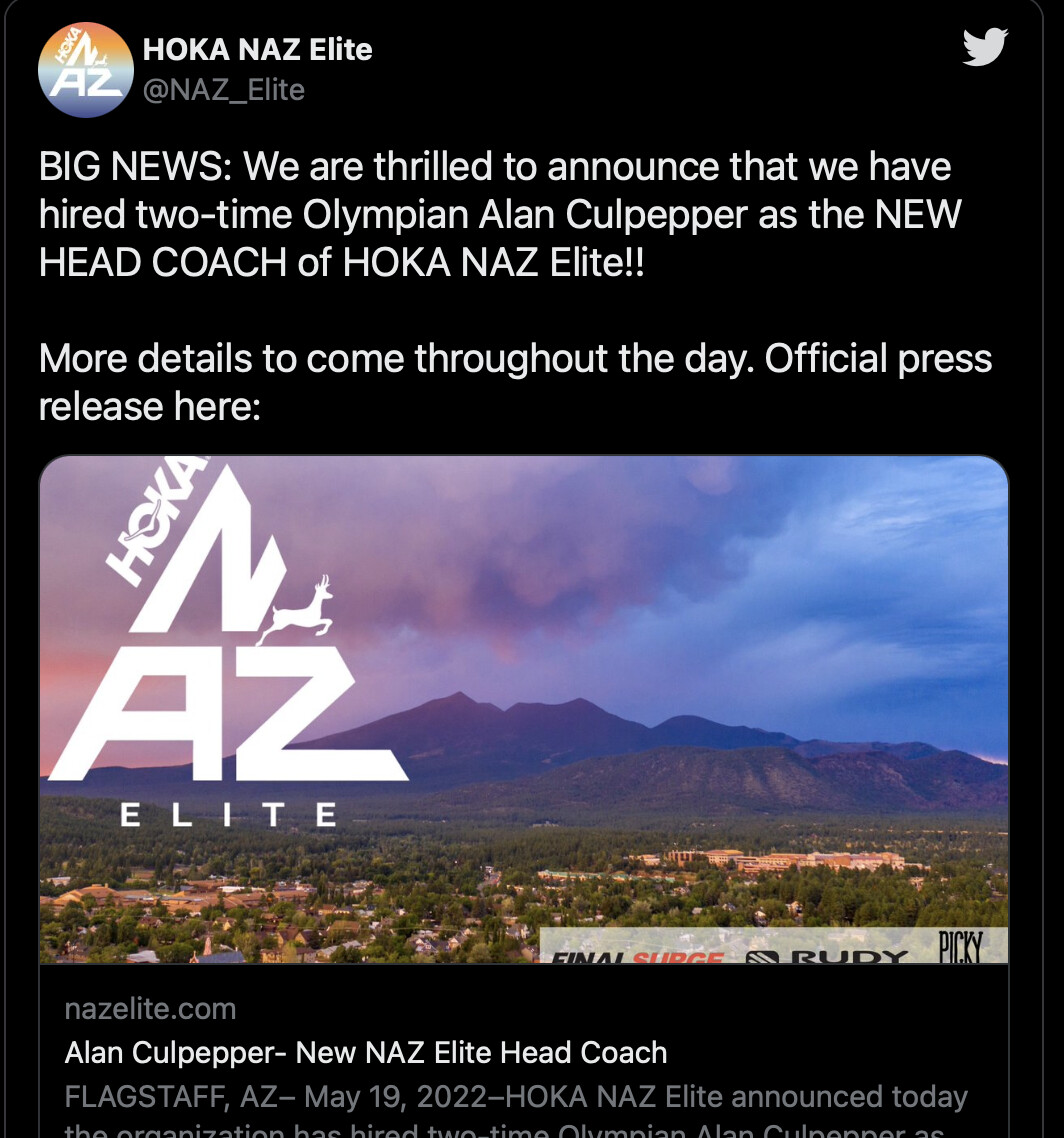
"Rosario founded NAZ Elite with his wife Jen in 2014 and coached the club for eight years. During that time his athletes won five international medals and 12 national titles; in 2020, Aliphine Tuliamuk won the U.S. Marathon Trials and in 2021 she represented the U.S at the Tokyo Olympics.Culpepper is a two-time Olympian, representing the U.S. in the 10,000m at Sydney 2000 and in the marathon at Athens 2004.
At the 2002 Chicago Marathon, Culpepper had the fastest-ever debut by an American, where he ran 2:09:41 to finish sixth. Since retiring from competition in 2008, Culpepper has coached cross-country and track programs at the high school and NCAA levels.He will step in to coach the likes of Stephanie Bruce, Kellyn Taylor, Tuliamuk and Lauren Paquette, who have already proven themselves over a variety of distances, while younger athletes such as Matt Baxter, Tyler Day, Wesley Kiptoo, Alex Masai and Katie Wasserman were all top performers on the track at the NCAA level.
Culpepper said in the press release that recruiting will be key as the team begins its expansion phase.
by Running Magazine
Login to leave a comment
Kenyan runners Wesley Kiptoo and Caroline Rotich Set Course Records at 2022 Pittsburgh Half Marathon
Rainy conditions Sunday morning in the City of Champions did not slow down Kenyan runners Wesley Kiptoo and Caroline Rotich from breaking course records and taking home the first prize of $10,000 at the 2022 UPMC Health Plan Pittsburgh Half Marathon.
In the men’s race, Kiptoo and James Ngandu took an early lead in the first mile. They stayed neck and neck until the final stretch when Kiptoo broke the finisher’s tape clocking 1 hour, one minute and twenty-five seconds. Ngandu took home second, finishing only two seconds later. U.S. Olympic marathoner Jared Ward finished third in 1:03:37.
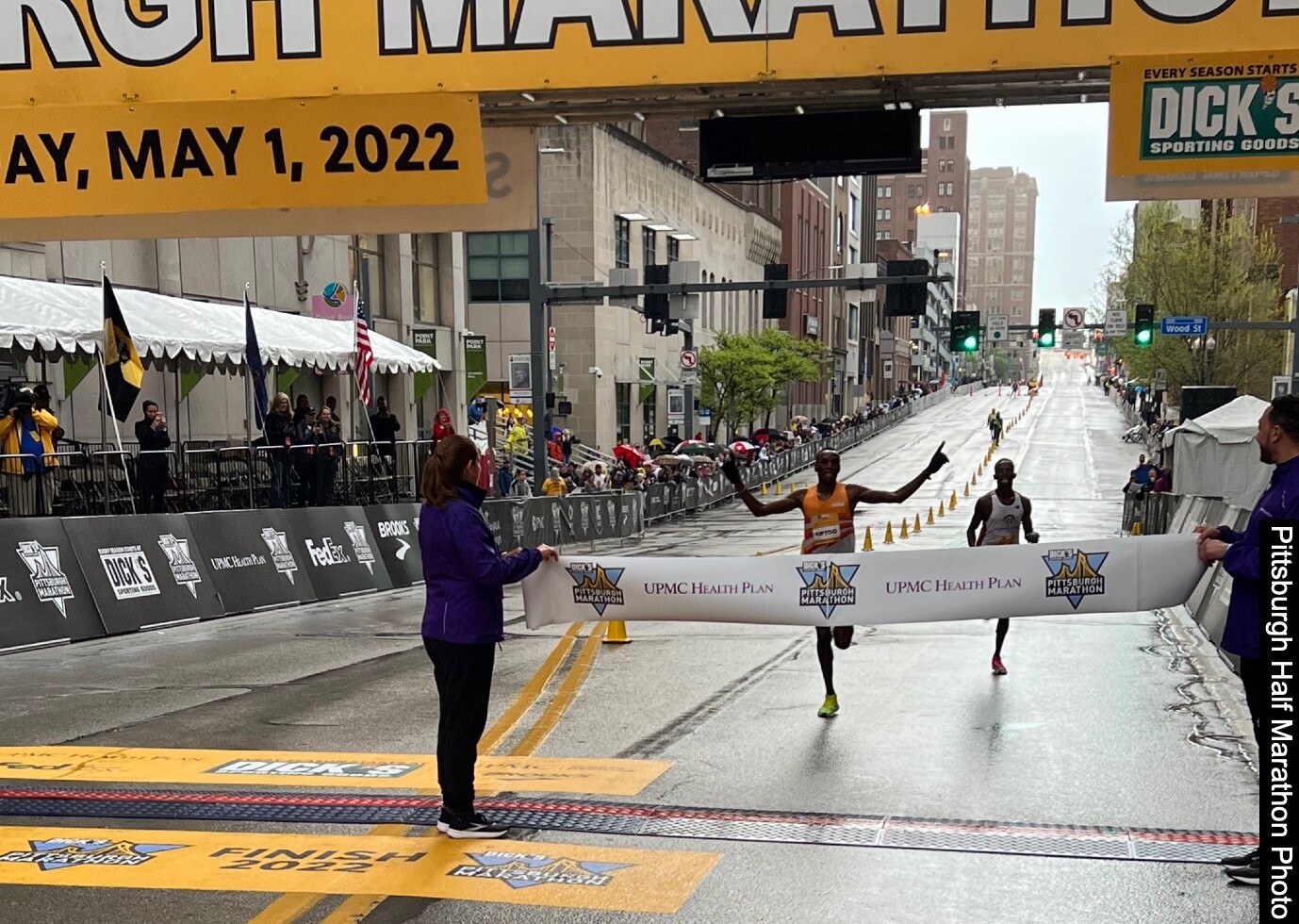
“Today was my professional road racing debut,” Kiptoo said. “I will remember this race and the City of Pittsburgh forever. I’d like to thank the organizers and race sponsors for inviting me and for making it all possible.”
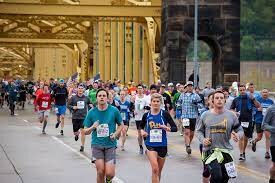
In the women’s race, Rotich smashed the UPMC Health Plan Pittsburgh Half Marathon course record by 34 seconds finishing in 1:09:30. U.S. Olympic marathoner Aliphine Tuliamuk, who previously held the course record, took home second in 1:09:54, and Sarah Sellers finished third in 1:11:51.
“It feels great to win my first race ever in Pittsburgh,” Rotich said. “It was so great seeing all the people on the course and cheering despite the rain. I can’t wait to be back!”
Login to leave a comment
Dick's Sporting Good Pittsburgh Marathon
This race is your game - however you decide to play it. As a competitor. A fund raiser. An enthusiast. A veteran. A team player. It's whatever you want it to be. It's whatever you make it. It's YOUR game..... Run it. Play it. Own it. Love it. Runners will race on the North Shore of Pittsburgh, cross each of...
more...Aliphine Tuliamuk, Jared Ward, Caroline Rotich and Abdi Abdirahman are ready to race the streets of Pittsburgh
Aliphine Tuliamuk, Jared Ward and Abdi Abdirahman are ready to race the streets of Pittsburgh in the UPMC Health Plan Pittsburgh Half Marathon, scheduled for Sunday, May 1. Each of the members of this talented trio have a special connection to the City of the Champions and will embrace the city’s renowned sports fans and spectators to help them shine on race day.
Men’s Division
Ward and Abdirahman lead a talented field of top international and American runners who will be competing for the $10,000 top prize. Abdirahman, who is a 5-time Olympian, has never been to Pittsburgh but is a big fan of the city.
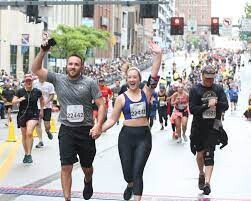
“It has been a dream of mine to race in Pittsburgh,” Abdirahman said. “It will be my first time in the city, and I am a big Steelers fan. I am looking forward to running the Pittsburgh Half Marathon. Training has been going great leading to this race, and I am excited to test my fitness.”
Ward will finally make his Pittsburgh racing debut after planning to run in 2020 and 2021 before the in-person events were canceled both years. He is excited to return to the city, which he hasn’t visited since he spent two years on Mormon mission after high school.
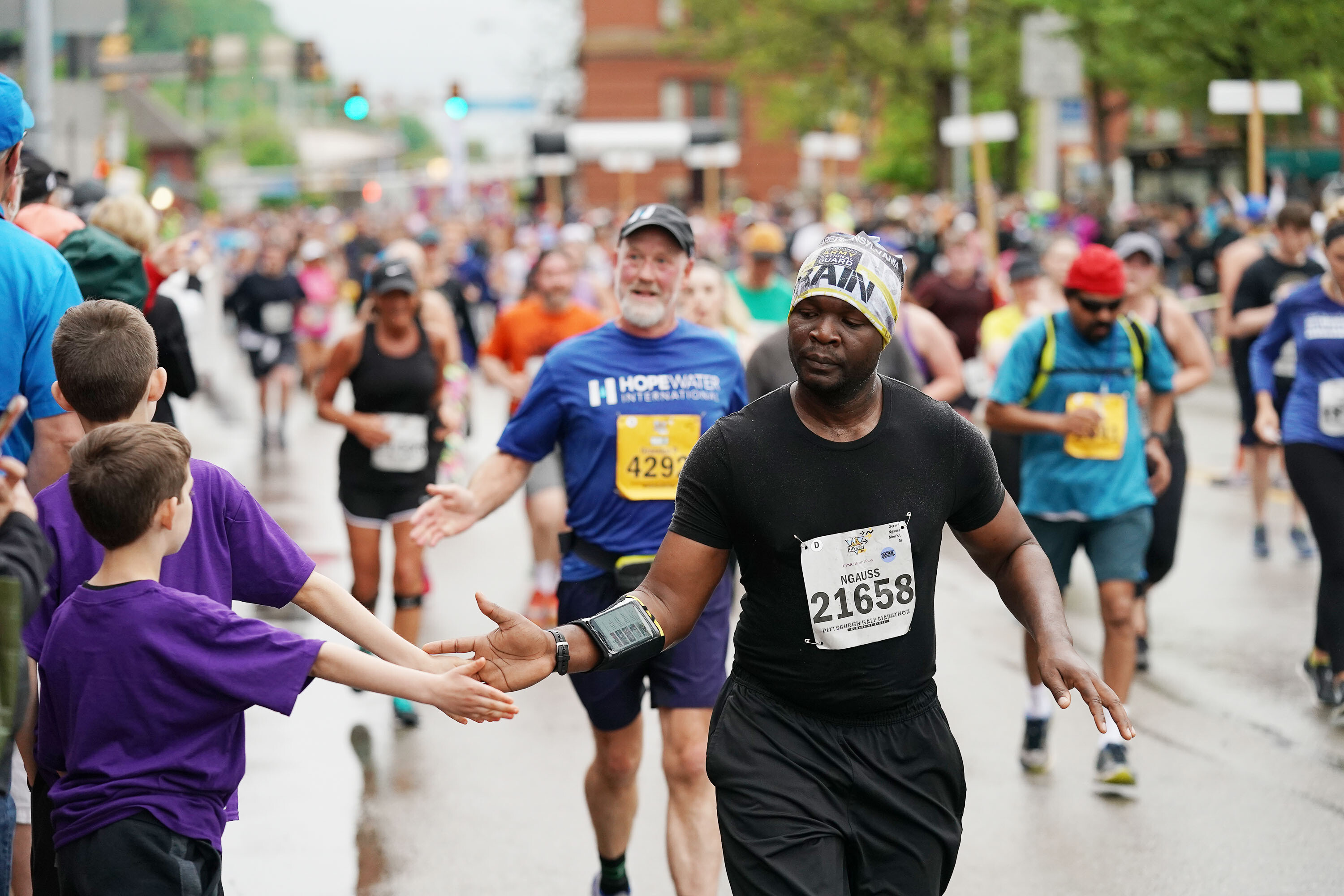
“I’m beyond excited to return to Pittsburgh,” Ward said. “I feel like I grew up here, while serving a mission for the Church of Jesus Christ of Latter-day Saints. I look forward to seeing friends and touring around ‘dahntahn’ – this time on the streets as a runner.”
Joining Abdirahman and Ward in the men’s race is James Ngandu of Kenya, who earlier this year won the Houston Marathon, and American Lawi Lalang, an eight-time NCAA champion who holds a half-marathon personal best of 1:02:49. Wesley Kiptoo, who was the 2021 NCAA Indoor National Champion at 5,000 meters, will also make his half-marathon debut at the event. Local runners Colin Martin, who holds a personal record of 1:05:19, and Nick Wolk, who won the 2021 Richard S. Caliguiri City of Pittsburgh Great Race 5K and 10K, will also race.
Women’s Division
Aliphine Tuliamuk is excited to return to Pittsburgh to run her first race since the Tokyo Olympics. In 2015, she ran her first marathon at the DICK’S Sporting Goods Pittsburgh Marathon, finishing in second in 2:34:44. She returned in 2018 to win the USA Half Marathon Championships.
“Pittsburgh has become a special city for me,” Tuliamuk said. “It’s where I learned that the marathon was painful but worth the struggle. Winning the 2018 USATF Half Marathon Championship gave me much needed confidence as I built toward the 2020 U.S. Olympic Trials. This year I am hoping for the same competitive atmosphere that Pittsburgh always brings. It will be my first race in a while, and I wanted to come to a place where I feel comfortable.”
Her speed will be tested against Caroline Rotich, who won the 2015 Boston Marathon and has a half-marathon personal best of 1:08:53.
“This will be my first time coming to Pittsburgh,” Rotich said. “It’s always exciting to travel to new places and Pittsburgh has been on my bucket list. I’m motivated to capitalize on my training this spring, rather than refocus on another marathon. I am feeling fit and ready to run fast in Pittsburgh.”
The field also includes Jordan Hasay, who is the fourth fastest U.S. women’s marathoner of all-time and Canadian cross-country skier and Olympian Anne Marie Comeau. Local Pittsburgh runner Margo Malone, who ran in the 2020 U.S. Marathon Olympic Team Trials, will also compete.
This year’s UPMC Health Plan Pittsburgh Half Marathon offers a prize of $58,000, including $10,000 each for the top men’s and women’s finishers. For the first time, the event has been awarded a World Athletics Road Race Label. Only five other U.S. races carry a label from World Athletics.
About the DICK’S Sporting Goods Pittsburgh Marathon Weekend of Events
The Pittsburgh Marathon was held annually from 1985-2003. After a five-year hiatus, the DICK’S Sporting Goods Pittsburgh Marathon was relaunched in 2009 and debuted with a sold-out field of 10,000 participants. It has grown each year since, evolving from a single race day into a weekend of events for the whole family that annually attracts nearly 40,000 runners.
For more information about the 2022 DICK’S Sporting Goods Pittsburgh Marathon Weekend of Events, visit www.thePittsburghMarathon.com.
by Running USA
Login to leave a comment
Dick's Sporting Good Pittsburgh Marathon
This race is your game - however you decide to play it. As a competitor. A fund raiser. An enthusiast. A veteran. A team player. It's whatever you want it to be. It's whatever you make it. It's YOUR game..... Run it. Play it. Own it. Love it. Runners will race on the North Shore of Pittsburgh, cross each of...
more...Molly Seidel despite being a favorite for the 2022 Boston Marathon, still struggles with confidence
The 27-year-old battled with an eating disorder to qualify for the USA Olympic team in her first ever marathon. Despite winning bronze at Tokyo 2020 and being a favorite for the 2022 Boston Marathon, she still struggles with confidence.
Molly Seidel is a rare kind of marathon talent.
The Wisconsin native first made athletics headlines when she qualified in second place for the U.S. Olympic team for Tokyo 2020, in her first ever marathon.
Despite this, many onlookers thought that her inexperience would show at the Olympic race in Sapporo. And how wrong they turned out to be.
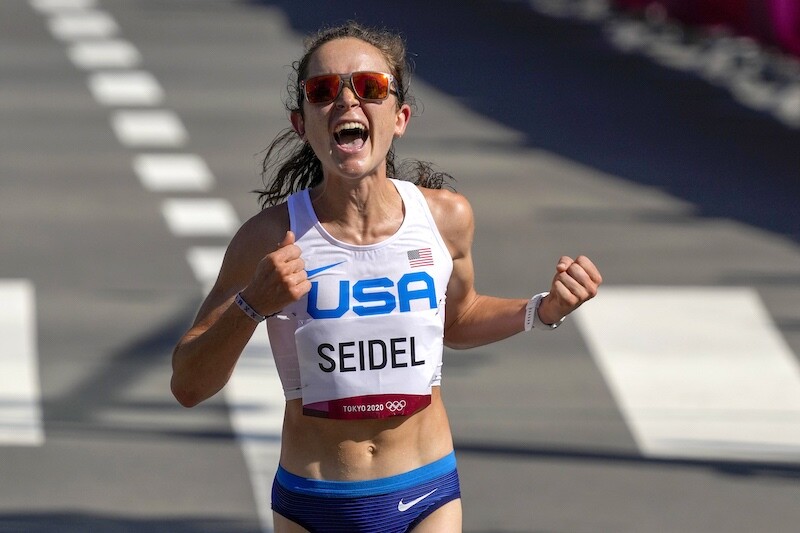
In what was just her third career marathon, she finished on the podium with an Olympic bronze medal around her neck. The only runners to beat her were a triple world half marathon record holder in Peres Jepchirchir, and marathon world record holder Brigid Kosgei.
Using that momentum, Seidel finished fourth at the New York City Marathon in November 2021. Her time of 2:24:42 made her the fastest American woman ever.
On April 18, 2022, she goes to the 2022 Boston Marathon as one of the favorites, seeking the host nation's first win since Desiree Linden in 2018.
But despite her recent successes the American star still struggles with 'imposter syndrome'.
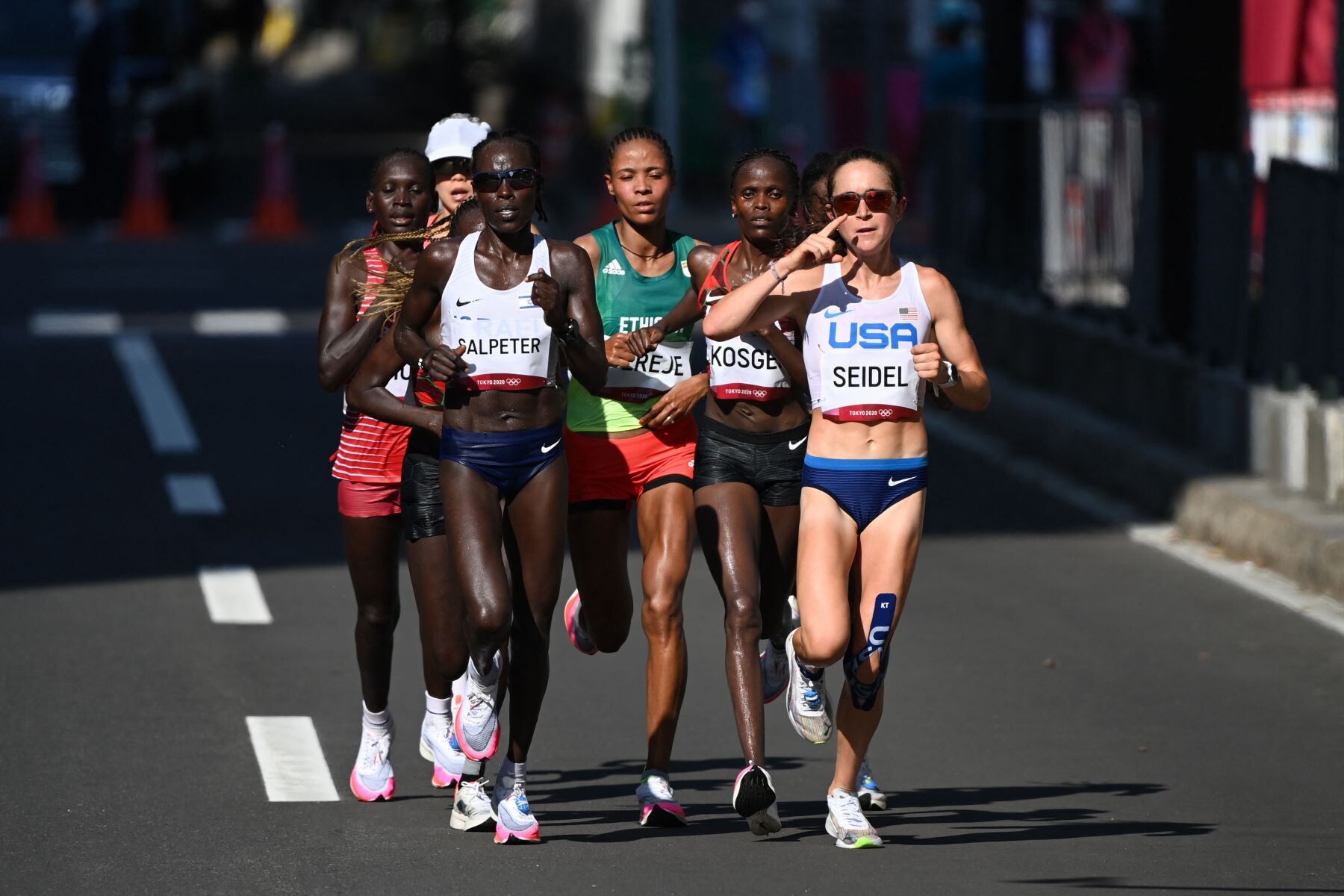
"I struggle with confidence and I struggle with wondering whether or not I belong at this level, whether I belong as a competitor on the world stage," Seidel told CNN.
The making of a front runner
Growing up in Wisconsin, Seidel was always a front runner in school sport. She broke course records and won several state track titles.
The first time her school's cross-country coach Mike Dolan first saw her attack an uphill run, he knew she was special.
“She would be a minute ahead of all the guys and all the girls," Dolan told Milwaukee Journal Sentinel.
"I knew at that time she would be a heck of a runner."
Seidel proved her coach right as she went on to win an NCAA cross country title in 2015, two NCAA indoors (3,000m & 5000m) and an outdoor 10,000m title to become the most decorated distance runner in state history.
Some onlookers even thought she could be a potential U.S. Track Olympic Team athlete for Rio 2016.
Mental health struggles
From the outside, Seidel seemed to be in the best shape of her life, but underneath she was experiencing a deep inner turmoil.
She first went public on her struggles with depression, OCD, crippling anxiety and bulimia in a podcast ran by her close friend Julia Hanlon called "Running On Om", just two months before the 2020 Olympic Trials.
“People who are close to me knew what I was going through during my time at Notre Dame (University), from 2012 to 2016. They knew my OCD had manifested itself into disordered eating,” she revealed in a follow-up interview with ESPN.
“When I was in the NCAA, it was obvious I was battling an eating disorder. It was so obvious that people would write on track and field message boards that I looked sick." - Molly Seidel to ESPN.
“They knew I struggled to eat anything I deemed unhealthy They knew I thought I had to be super lean and super fit all the time, never even allowing myself to eat a bowl of mac and cheese or go out to eat with friends without worrying about what I would order. I've never tried to hide what I went through with my family and friends.”
In 2016 she went into a treatment program for her eating disorder, which she’s still dealing with alongside the anxiety and depression.
When Seidel returned to training, she decided to stop running 5k and 10k and stepped up to the marathon.
“I always kind of dreamed of doing the marathon," Seidel told CNN.
"I think there's just this kind of like glamor and mystery around it, and especially for a younger runner who enjoys doing the distance events in high school, that's kind of the ultimate goal. Everybody wants to do the marathon."
From first marathon to Olympic medal
Her debut 42km race at the USA Trials in Atlanta landed her a place on her nation's Olympic team with race winner Aliphine Tuliamuk and third placed Sally Kipyego.
"I struggled with this kind of imposter syndrome after the trials, specifically as probably the person no one expected to make the team and the person that got probably the most criticism like: Hey, why is this girl on the team?" she continued.
"I think I really struggled with that, and I struggled going into the Games and feeling like I belonged there and trying to prove that I wasn't a mistake on that team."- Molly Seidel to CNN.
Her second marathon effort was the daunting 2020 London Marathon, where she finished sixth .
Then, just 18 months after her first marathon Seidel, who is affectionately known as “Golly Molly” earned bronze and became the third American woman ever to medal in the Olympic marathon.
In November 2021, a broken Seidel returned for her fourth marathon in New York, where she placed fourth with a personal best time despite fracturing two ribs as she prepared for the event.
It was an absolute disaster of a build up,” she recalled.
"It was really hard, not only with the mental stress that we had going on after the Games of just feeling, frankly, no motivation. And just trying to find that drive to re-up for another hard race right after an enormous race that I'd been training effectively two years for.”
Those injuries are now behind the 27-year-old, who has been training in Flagstaff.
Though she dropped out of the New York Half in March due 'setbacks in training', Seidel heads back to Boston where she lived for four years with high hopes for something special.
“Boston was like the place that made me a pro-runner. It was the first place I moved after I finished college.It was the place that kind of like rebuilt me as a runner after going through a lot of challenges through college,” she said to CBS Boston.
“Just getting to do the race in the place that made me the runner that I am and with the people that helped me become the runner that I am, it’s just enormously meaningful to me. That what makes it a lot more special than any other race.”
by Evelyn Watta
Login to leave a comment
Boston Marathon
Among the nation’s oldest athletic clubs, the B.A.A. was established in 1887, and, in 1896, more than half of the U.S. Olympic Team at the first modern games was composed of B.A.A. club members. The Olympic Games provided the inspiration for the first Boston Marathon, which culminated the B.A.A. Games on April 19, 1897. John J. McDermott emerged from a...
more...U.S. Olympian Aliphine Tuliamuk will return to Pittsburgh to run her first race since the Tokyo Olympics at Pittsburgh Half Marathon
U.S. Olympian Aliphine Tuliamuk Returns to Pittsburgh for the UPMC Health Plan Pittsburgh Half Marathon, Her First Race Since Tokyo Olympics.
U.S. Olympian Aliphine Tuliamuk will return to Pittsburgh to run her first race since the Tokyo Olympics at this year’s UPMC Health Plan Pittsburgh Half Marathon, scheduled for Sunday, May 1.
Pittsburgh has consistently been a stepping stone on Tuliamuk’s running career journey. In 2015, she ran her first marathon at the DICK’S Sporting Goods Pittsburgh Marathon, finishing in second in 2 hours, 34 minutes and 44 seconds. She returned in 2018 to win the USA Half Marathon Championships while also setting the Pittsburgh Half Marathon event record of 1:10:04.
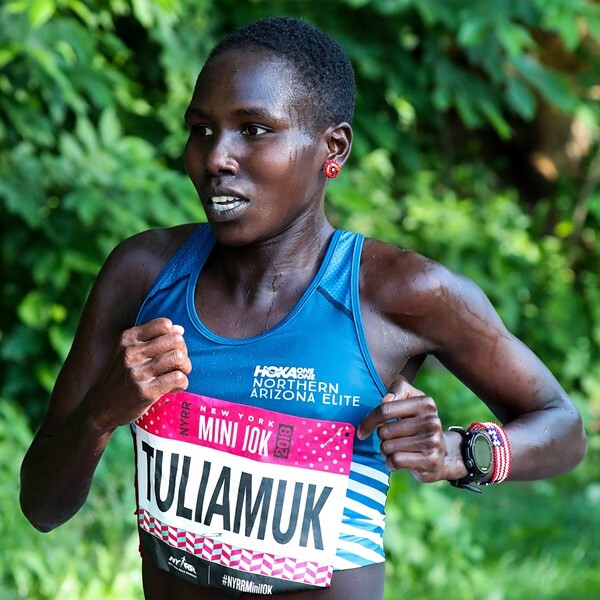
“Pittsburgh has become a special city for me,” Tuliamuk said. “It’s where I learned that the marathon was painful but worth the struggle. Winning the 2018 USATF Half Marathon Championship gave me much needed confidence as I built toward the 2020 U.S. Olympic Trials. This year I am hoping for the same competitive atmosphere that Pittsburgh always brings. It will be my first race in a while, and I wanted to come to a place where I feel comfortable.”
Preparations for the race are going well for Tuliamuk, who is currently training in Flagstaff, Ariz. Tuliamuk says her HOKA Northern Arizona Elite teammates hold her accountable and push her every day. A lot has changed since her last Pittsburgh appearance in 2018. In February 2020, she won the U.S. Olympic Marathon Team Trials, and then watched the world shut in response to the pandemic. When the Tokyo Olympics were postponed in 2020, she decided to use the time off from competing to have a child. After having her daughter Zoe in January 2021, she returned to training and competed in the 2021 Tokyo Olympics seven months later.
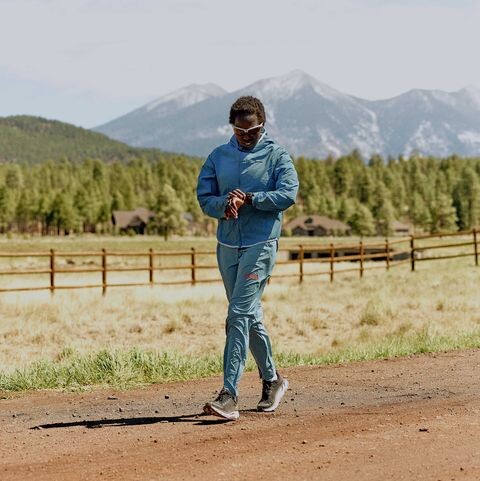
“The pandemic has reinforced to me the importance of knowing what makes you happy and living life toward that pursuit,” Tuliamuk said.
She hopes Pittsburgh will once again bring her success and allow her to demonstrate her talents as an accomplished endurance athlete.
“This is a city that values hard work and champions,” Tuliamuk said. “It is nice to feel admired and respected by anyone associated with Pittsburgh.”
Tuliamuk will join other top American and international runners competing for the $58,000 prize purse in the 2022 UPMC Health Pittsburgh Half Marathon. For the first time, the event has been awarded a World Athletics Road Race Label. Only five other U.S. races carry a label from World Athletics. The full field of elite athletes for both the DICK’S Sporting Goods Pittsburgh Marathon and UPMC Health Plan Pittsburgh Half Marathon will be announced later in April.
The Pittsburgh Marathon was held annually from 1985-2003. After a five-year hiatus, the DICK’S Sporting Goods Pittsburgh Marathon was relaunched in 2009 and debuted with a sold-out field of 10,000 participants. It has grown each year since, evolving from a single race day into a weekend of events for the whole family that annually attracts nearly 40,000 runners.
by Running USA
Login to leave a comment
Dick's Sporting Good Pittsburgh Marathon
This race is your game - however you decide to play it. As a competitor. A fund raiser. An enthusiast. A veteran. A team player. It's whatever you want it to be. It's whatever you make it. It's YOUR game..... Run it. Play it. Own it. Love it. Runners will race on the North Shore of Pittsburgh, cross each of...
more...USATF Announces Tougher Olympic Marathon Trials Standards for 2024
A major caveat: The Trials might not be held if World Athletics won’t accept the top three finishers as Olympians.
Qualifying standards for the 2024 Olympic Marathon Trials were announced today at the USA Track & Field (USATF) annual meeting, and they’re faster than the times needed to get into the 2020 race—especially for women.
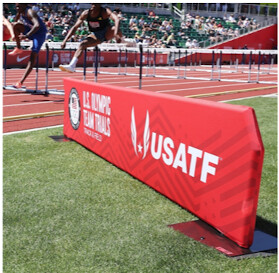
Women who want to enter the race must have qualified with a 2:37 marathon or faster, or a 1:12 half marathon or faster. The marathon time is 8 minutes faster than the 2:45 required to get into the 2020 Trials. (The half marathon time in 2020 was 1:13.)
For men, the times are 2:18 and 1:03, one minute faster at both distances than the 2020 times (2:19 and 1:04).
The qualifying window for marathon times opens on January 1, 2022 and for half marathon times, January 1, 2023.
The 2020 Trials, held in Atlanta, had a historically large field, with 511 women and 260 men qualified to run. Improved shoe technology made it easier for many sub-elite runners to hit the times they needed to qualify for the race.
The top three made the Olympic team—for the women, it was Aliphine Tuliamuk, Molly Seidel, and Sally Kipyego. On the men’s side Galen Rupp won, Jake Riley was second, and Abdi Abdirahman was third.
Behind them, the race turned into a celebration of the strength of distance running in the U.S., with hundreds of runners who had no realistic shot of making the Olympic team soaking up the crowd support along the course and celebrating their achievements.
Leaders at USATF apparently decided the field was too big. Based on the women’s qualifying list from 2020, only 83 women had a marathon time faster than 2:37. Only eight women qualified with a half marathon faster than 1:12.
Conceivably, with the stricter standards, the women’s field could go from 511 in 2020 to 91 runners in 2024.
By the same measure, the men’s field from 2020 would have been 76 people smaller in the marathon, 15 smaller in the half marathon. The men’s field would shrink from 260 to 169.
Much of this discussion may be moot. World Athletics, which governs track and field and the marathon at the Olympics, has encouraged national governing bodies to rely on world rankings to choose their national teams, rather than a one-day Trials format from which the top three make the team.
The Olympic standards are also expected to be stricter, too. In 2021, for the marathons in Sapporo, Japan, the Olympic standards were 2:11:30 for the men and 2:29:30 for the women—in other words, it wasn’t enough for Americans to have finished in the top 3 at the Trials in the marathon. They also had to have run a marathon faster than the Olympic standard to get to go to the race.
World Athletics has not yet announced what the 2024 Olympic standards will be.
USATF has not yet sent out a request for proposal (RFP) for cities to host the Trials, which puts the process well behind its typical cycle. (Atlanta was announced as the host of the 2020 Trials by April 2018, meaning bids were in to USATF months before that.) Races are not thought to be clamoring to host, after a year in which most major marathons were canceled due to the pandemic and finances are stretched in the road racing industry.
Although the Trials in Atlanta were seen as a huge success, the local organizing committees usually lose money on the race because of restrictions on which companies can sponsor the event.
by Runner’s World
Login to leave a comment
It is Going to Be a Busy 7 Weeks With All 6 World Marathon Majors Taking Place
For the first time ever, all six World Marathon Majors will be contested in the fall of the same year. Due to postponements caused by COVID-19, the Berlin, London, Tokyo, Chicago, Boston, and New York City marathons are all scheduled to take place within a seven-week timeframe.
For many athletes, these marathons will be their first 26.2 since the onset of the pandemic, and they’ve set big goals for the return of the sport.
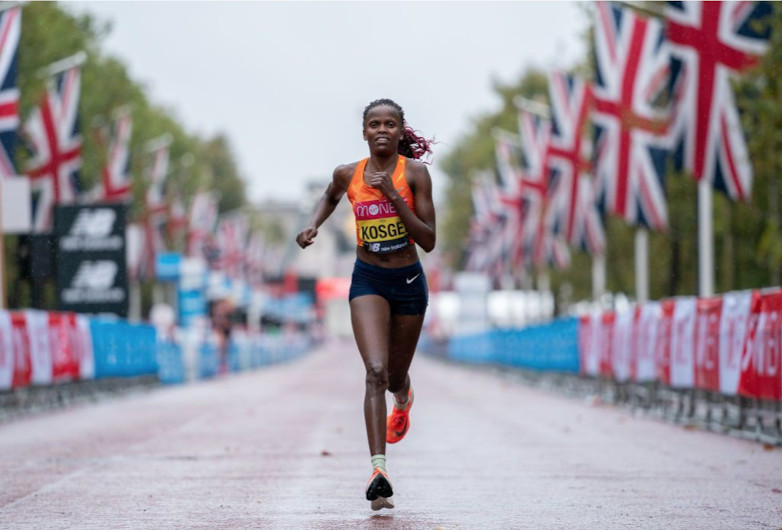
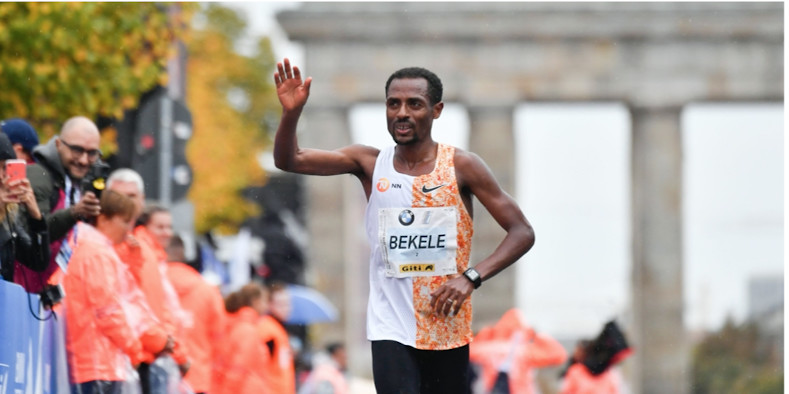
Between runners doubling in events to some chasing national records, the best marathoners in the world are taking full advantage of these highly anticipated competitive opportunities. Here, we outlined some quick takeaways and storylines we’ll be watching based on the early elite field announcements. (And we’ll keep this list updated if and when top runners throw their name into one of these amazing fields!)

Berlin Marathon—Sunday, September 26
MEN:
Kenenisa Bekele, Ethiopia (2:01:41)
Right now, the only elite runner confirmed for the Berlin Marathon is Kenenisa Bekele. Berlin will be the first of two marathons in 42 days for the Ethiopian runner, who is also scheduled to race the New York City Marathon on November 7, a grueling double that will mark Bekele’s first races since March 2020.
As three-time Olympic champion told Sports Illustrated, he is ready for the challenge.
“For a whole year, I couldn’t race and it’s been really difficult for athletes,” Bekele said. “I want to take this chance and see what is possible.”
London Marathon—Sunday, October 3
Eight weeks after winning silver at the Tokyo Olympics, Brigid Kosgei aims to defend her title in London. The world record-holder from Kenya will be going for her third consecutive victory in London against a stacked field that includes defending New York City Marathon champion Joyciline Jepkosgei and two-time Tokyo Marathon winner Birhane Dibaba.
On the men’s side, Shura Kitata will also be looking to defend his title in London after a disappointing performance in Tokyo. The Ethiopian standout struggled in the heat during the Olympic marathon in Sapporo and dropped out of the race, but he’s aiming for redemption on a course where he experienced a breakthrough last year.
“I was disappointed to have to pull out of the Olympic Games Marathon, but I just did not adapt to the weather well,” Kitata told World Athletics. “It was very cold in Ethiopia prior to leaving for Tokyo and when we got there the weather took its toll on my body and made my breathing very hard. But I’m healthy and looking forward to racing in the Virgin Money London Marathon again. I am preparing very well and my coach has me very ready to defend my title in London.”
Chicago Marathon—Sunday, October 10
Almost a year after she nearly broke Deena Kastor’s American marathon record, Sara Hall is gearing up to again chase the elusive time set 15 years ago. In Chicago, Hall aims to continue her breakthrough streak, which started during the 2020 COVID-adjusted season, and run under the record of 2:19:36.
“It has been too long since I’ve been back, and when I thought about where I wanted to chase the American record, I thought it would be more exciting to do it at home, in the U.S., and Chicago is such an epic race,” Hall said in a statement. “I’m really excited to have my best marathon yet on U.S. soil.”
After dropping out of the 2020 Olympic Marathon Trials, Hall made an impressive comeback with a runner-up finish at the London Marathon last October, and a victory at the Marathon Project in December. Hall’s winning time of 2:20:32 is her personal best and the second-fastest performance ever by an American woman.
Hall will have stiff competition up front with Ruth Chepngetich in the field. The Kenyan marathoner set the half marathon world record in April. She had an off day at the Tokyo Games and dropped out of the marathon around the 20-mile mark. Chicago will be the 2019 world champion’s first major marathon since the Olympics and her first race on U.S. soil.
Another American to watch will be Keira D’Amato; she made headlines in 2020 with huge improvements on the track and the roads, which helped her land her first professional contract with Nike at 36 years old. D’Amato was expected to be an Olympic team contender in the 10,000 meters, but she withdrew from the U.S. Olympic Track and Field Trials, citing a hamstring injury. The Chicago Marathon will be D’Amato’s first race since February.
Galen Rupp, who placed eighth in 2:11:41 at the Tokyo Olympics on August 8, is returning to race the marathon in Chicago. This marathon holds some significance for Rupp, who became the first American male athlete since Khalid Khannouchi to win the race in 2017. The last time he competed in the Windy City was during his comeback to the sport after having Achilles surgery. In the 2019 race, he dropped out just before the 23-mile mark, but he’s looking to improve this time around.
“My goal is winning,” Rupp said in a statement. “I want to come back and win. 2019 left a sour taste in my mouth. I didn’t finish that race so I cannot wait to get back out there and come back stronger than ever. It has been a wild ride since then. I’m healthy, I’m happy, and it’s going to be tremendous to come back.”
Boston Marathon—Monday, October 11
Boston will have one of the deepest elite fields on the women’s side with nine women who have run under 2:22, including Olympic bronze medalist Mare Dibaba and 2017 Boston Marathon winner Edna Kiplagat.
The race will also be Des Linden’s first of two marathons this fall. The 2018 Boston Marathon champion is entered in the New York City Marathon on November 7, a shorter than normal timeframe between major marathons. Boston will be Linden’s first major marathon since she finished fourth at the 2020 Olympic Marathon Trials. This spring, Linden set the 50K world record by averaging 5:47 pace for more than 31 miles.
Fellow Americans Jordan Hasay and Molly Huddle will also be returning to Boston after the event took a two-year hiatus due to the pandemic.
​
In the men’s field, several past podium finishers are making their return to Boston, including Kenyan standouts Wilson Chebet, Felix Kandie, and Paul Lonyangata. A large American contingent will be led by four-time Olympian Abdi Abdirahman, who finished 41st in the marathon at the Tokyo Games. Including Abdirahman, eight of the top 12 finishers from the U.S. Olympic Marathon Trials are scheduled to compete.
New York City Marathon—Sunday, November 7
The field assembled for the women’s race, especially the American contingent, is the most stacked marathon of all the fall races. Tokyo Olympians Molly Seidel, Sally Kipyego, and Aliphine Tuliamuk are all slated to return to competition in the Big Apple after representing Team USA in Sapporo.
Fellow podium finisher Peres Jepchirchir of Kenya is also returning to the distance after dominating the marathon to win gold in her first Olympic Games. She has the fastest personal best among the field after running 2:17:16 in Valencia last year. Including Jepchirchir, the New York City field includes four women who have run under 2:21.
Outside of the Olympic team, a handful of the top Americans are also gearing up for fast times in the city. Emily Sisson, Kellyn Taylor, Stephanie Bruce, Roberta Groner, and Laura Thweatt are scheduled to compete. And Des Linden will be racing her second marathon of the fall after competing in Boston on October 11.
Along with Bekele’s double, Abdi Nageeye’s performance will draw fans in to watch the men’s race in New York City. The runner from the Netherlands secured a silver medal in the Tokyo marathon by crossing the finish line in 2:09:58, a huge improvement from his 11th-place finish in Rio. He’s finished in the top 10 twice at the Boston Marathon, but this fall will mark his debut in New York City and he’s feeling confident in his chances.
“For me, winning the silver medal in the Olympic Games was not a surprise,” Nageeye said in a statement. “There were many good athletes in the race, but I knew my preparation had been good. I was ready for the conditions, and most importantly I believed in myself. I will take that same focus into my preparations for New York, and my belief and confidence in my abilities is even higher than it was in Sapporo. There is nothing I want more than to bring a New York City victory back home along with my Olympic medal.”
There will also be a couple of highly anticipated marathon debuts, including Kibiwott Kandie and Ben True. Kandie is the half marathon world record-holder and a world championships silver-medalist. True will be aiming for redemption after finishing fourth in the 10,000 meters and narrowly missing out on making Team USA at the Olympic Trials in June.
by Runner’s World
Login to leave a comment
Olympic bronze medalist Molly Seidel to run TCS New York City Marathon
Olympic bronze medalist Molly Seidel is one of several standout American women planning to run the New York City Marathon in November, race organizers announced Wednesday.
Seidel stunned even herself with a third-place finish in Tokyo this month in just the third 26.2-mile race of her career. An NCAA Division I champion at Notre Dame in the 3,000, 5,000 and 10,000 meter events, she is now the headliner for the NYC Marathon’s 50th running in her five-borough debut.
“Since the beginning of 2021, I’ve had two races circled on my calendar: the Olympic Games’ marathon on Aug. 7 and the TCS New York City Marathon on Nov. 7,” said Seidel, 27, who grew up in Wisconsin. “Winning the bronze medal in Sapporo showed that I can run with the best in the world, and on any given day, anything is possible.”
Fellow U.S. Olympians Aliphine Tuliamuk, Sally Kipyego and Emily Sisson will also be in the field, along with 2018 Boston Marathon winner Des Linden.
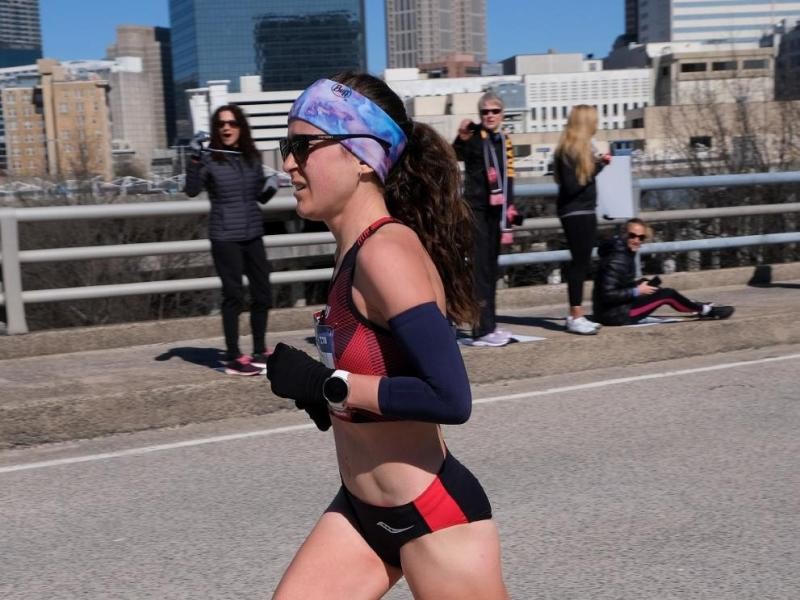
Four-time champion Mary Keitany of Kenya won’t participate for the first time since 2013.
The men’s professional field has not yet been announced.
The 2020 NYC Marathon was canceled by the pandemic, but Gov. Andrew Cuomo announced in June that the 2021 race would go on — albeit with a field limited to about 33,000 entrants, down from 55,000 in 2019.
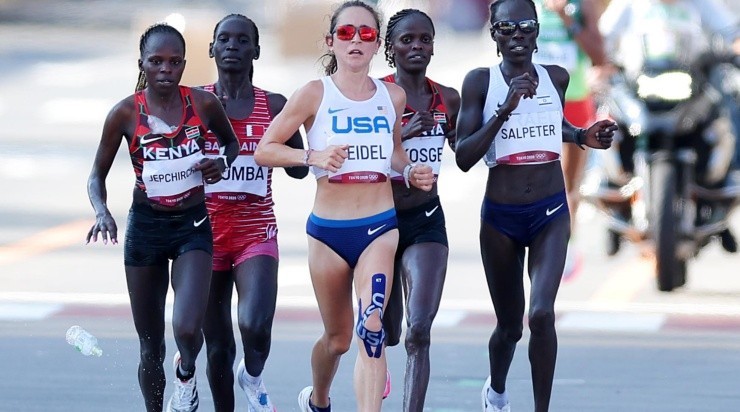
Tuliamuk, who was born in Kenya, won the 2020 U.S. Olympic marathon trials in Atlanta four years after gaining American citizenship. She gave birth to a daughter in January 2021 but still competed in Tokyo. She dropped out near the 20-kilometer mark.
“I want to inspire people, most importantly my daughter, to chase their dreams,” she said in a statement released by the NYC Marathon. “I’m a different athlete and person than I was the last time I ran the TCS New York City Marathon in 2019, so why not fulfill one more dream on Nov. 7?”
Tatyana McFadden is pursuing a record sixth NYC Marathon title in the wheelchair division but hasn’t won since 2016. She won’t have to contend with two-time defending champion Manuela Schär, who is not listed among the competitors.
by Jake Seiner
Login to leave a comment
TCS New York City Marathon
The first New York City Marathon, organized in 1970 by Fred Lebow and Vince Chiappetta, was held entirely in Central Park. Of 127 entrants, only 55 men finished; the sole female entrant dropped out due to illness. Winners were given inexpensive wristwatches and recycled baseball and bowling trophies. The entry fee was $1 and the total event budget...
more...Molly Seidel just became the new queen of Strava
In case you missed it, on Sunday, U.S. runner Molly Seidel won the bronze medal in the women’s marathon at the Tokyo Olympics. She ran the race of her life, hanging with the Kenyan leaders, Peres Jepchirchir and Brigid Kosgei, until around 37.5 km, and fended off her competition over the last stretch to secure the bronze in a time of 2:27.51. The bronze medal won’t be the only achievement she will be coming home with, as she has just been crowned ‘Strava legend’ for having the most kudos for a women’s activity ever.
n case you are unfamiliar with kudos on Strava, they are virtual thumbs up, and comparable to “likes” on Facebook or retweets on Twitter. Currently her “full send” activity sits at 32,500 kudos and is still rising. Seidel sits on the throne beside cyclist and multiple Tour de France champion Chris Froome, who received 40,000-plus kudos for a ride in Italy.
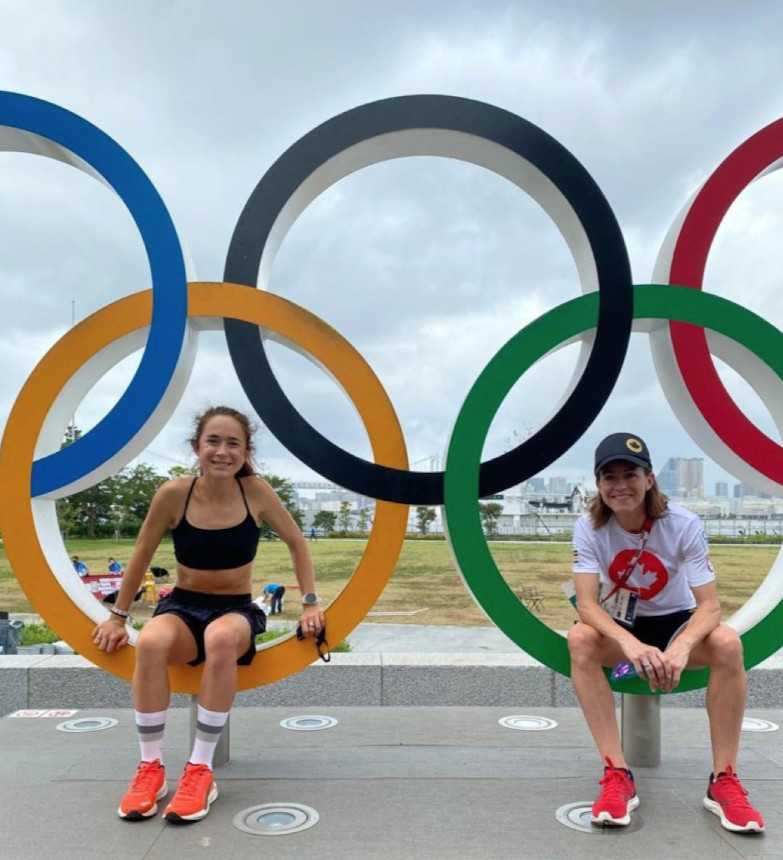
Getting to Tokyo was an achievement of its own for Seidel, as she missed the U.S. Olympic Trials in 2016 to get eating disorder treatment. Seidel qualified for the Olympics Games when she placed second at the U.S. Olympic Marathon Trials in 2020 behind fellow American Aliphine Tuliamuk.
Canadian marathoner’s Malindi Elmore and Natasha Wodak who both respectively finished within the top 15 in Tokyo were apparently apart of Seidel’s morning walking club around the athlete’s village. Seidel illustrated the importance of these two tremendous women on her Instagram and Strava.
In case you are unfamiliar with kudos on Strava, they are virtual thumbs up, and comparable to “likes” on Facebook or retweets on Twitter. Currently her “full send” activity sits at 32,500 kudos and is still rising. Seidel sits on the throne beside cyclist and multiple Tour de France champion Chris Froome, who received 40,000-plus kudos for a ride in Italy.
Getting to Tokyo was an achievement of its own for Seidel, as she missed the U.S. Olympic Trials in 2016 to get eating disorder treatment. Seidel qualified for the Olympics Games when she placed second at the U.S. Olympic Marathon Trials in 2020 behind fellow American Aliphine Tuliamuk.
Canadian marathoner’s Malindi Elmore and Natasha Wodak who both respectively finished within the top 15 in Tokyo were apparently apart of Seidel’s morning walking club around the athlete’s village. Seidel illustrated the importance of these two tremendous women on her Instagram and Strava accounts.
by Running Magazine
Login to leave a comment
Molly Seidel Shocks the World With Bronze Medal, as Kenya’s Peres Jepchirchir and Brigid Kogei Go 1-2 in 2020 Olympic Marathon
In one of the most remarkable and unlikely runs ever by an American distance runner, Wisconsin native Molly Seidel earned a bronze medal in the 2020 Tokyo Olympic marathon, running 2:27:46 in the heat of Sapporo on Saturday morning. Seidel established herself near the front of the race early, and remained there throughout. Late in the race, Seidel was in a battle for bronze with Israel’s Lonah Chemtai Salpeter, but with three miles to go, Salpeter stopped running, leaving Seidel in bronze-medal position, which she protected to the finish line.
Kenya’s Peres Jepchirchir, the world record holder in the women’s-only half marathon, pulled away from teammate Brigid Kosgei, the marathon world record holder, in the final two kilometers to take the gold in 2:27:20. Kosgei settled for the silver in 2:27:36, her first loss in her her last five marathons.
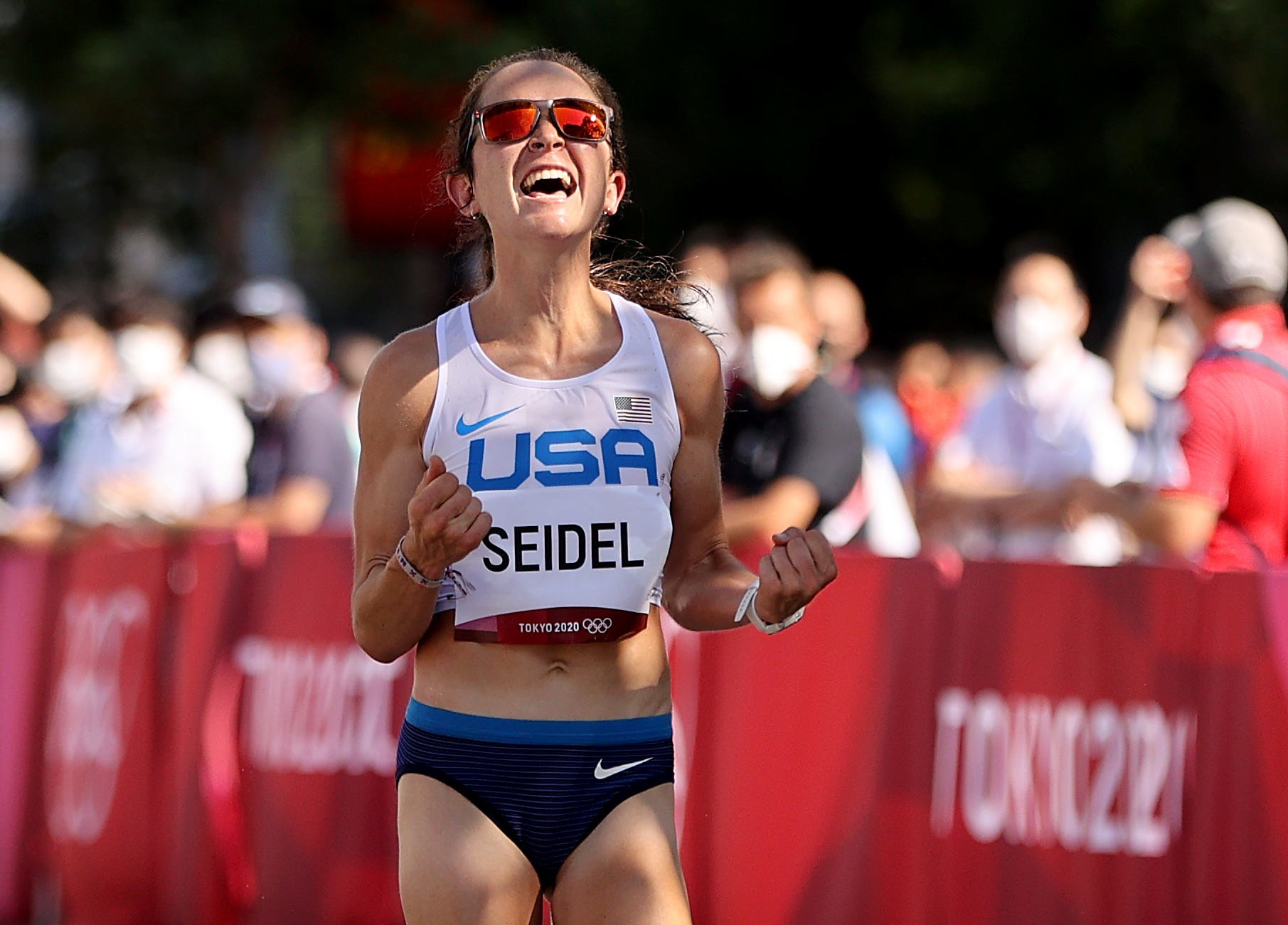
The story for American distance running fans was Seidel, running in only her third marathon of her life (her first was the Olympic Trials marathon in 2020 to get here). Seidel beat five sub-2:20 women. She entered the race with a 2:25:13 personal best and yet was in the conversation for the gold until the final 2k. She joined American running legends Joan Benoit Samuelson (gold in 1984) and Deena Kastor (silver in 2004), as the only American women to medal in the Olympic marathon.
The race
At race time, it was sunny and 76 degrees with 87% humidity, despite the race being moved up an hour because of the heat to start at 6 a.m. local.
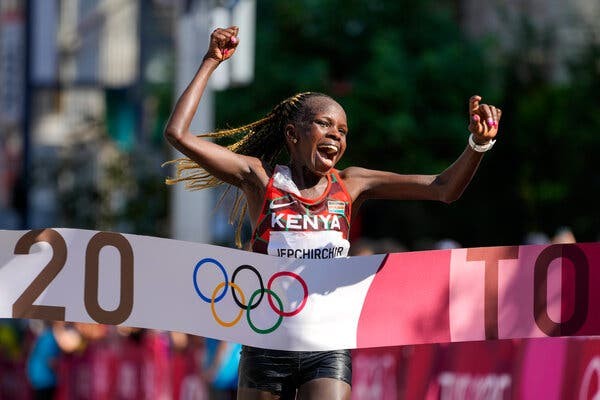
As a result, the race went out slow, with 5K and 10K splits of 18:02 and 36:16 for the leaders (2:32:50 marathon pace at 10K). The lead pack remained about 40 or 50 women strong at the 10-kilometer split, but the effect of the heat was unmistakable, with women applying ice bags on themselves and running wide to get into the shade. By this point, US champion Aliphine Tuliamuk had fallen off the pace (she would eventually drop out).
From there, as the race advanced north on a slight downhill, it picked up. Honami Maeda of Japan took a few turns at the front, as did Americans Seidel and Sally Kipyego, but it was mostly shared. The next two 5K splits (17:31 and 17:41) were quicker and reduced the lead pack to less than 20 women by 20K. Zeineba Yimer, a 2:19 woman from Ethiopia, dropped out at the 17K mark.
The lead group went through halfway in 1:15:14, and the lead group was whittled down to 11 with Ethiopian contender Birhane Dibaba falling off the back.
Americans Seidel and Kipyego remained in the lead pack of 12 at 25K (Volha Mazuronak of Belarus rejoined the lead pack between halfway and 25k), which the women went through in 1:28:51 (2:29:47 pace). Ethiopian Roza Dereje Bekele (2:18:30 pb) and Salpeter (2:17:45 pb), along with the three Kenyans, were pushing the tempo slightly.
After that split, as the women continued to weave through the north Sapporo suburbs and Hokkaido University, racers started dropping off the lead pack like flies: first Kipyego, then Mazuronak and then a big casualty — Ruth Chepngetich of Kenya, the reigning world champ, falling back around the 29K mark.
Meanwhile at the front, Seidel led the entire 18th mile in around 5:26. The lead group of nine went through 30K in 1:46:03 (17:12 previous 5K, quickest of the race). The Japanese spectators pulled for their countrywoman Mao Ichiyama, who was still there.
The 30-35K split was the quickest of the race (16:54) and those five kilometers caused the biggest carnage: four women, including Ichiyama and Dereje, the final Ethiopian, dropped off the lead pack.
Now with the group down to five and less than five miles remaining, and Seidel continuing to run with confidence and share the lead with the two remaining Kenyans, the curiosity surrounding Seidel turned into a real possibility…could she snag a medal?
Bahrain’s Eunice Chumba dropped off just after the 35K mark, making it a four-woman race for three medals: Kosgei, Jepchirchir, Salpeter, and Seidel. Women with personal bests of 2:14, 2:17, 2:17, and 2:25. But in the summer Japan heat, the strongest women would win, not the fastest.
In the 24th mile, the Kenyans finally struck, Jepchirchir throwing in a surge and Kosgei covering it. They opened up a small gap on Salpeter and Seidel immediately, and Salpeter had a few meters on Seidel.Before one even had time to process whether Seidel’s fairytale quest for a medal was coming to an end, her fortunes changed drastically. At the 38-kilometer mark, Seidel caught Salpeter, who was still less than five seconds behind the leaders, but slowing slightly. Salpeter, however, was broken. Within a span of seconds she slowed to a walk and Seidel was into the bronze position, with the leaders still in her sights, Jepchirchir in front and Kosgei sitting on her.
At 40k, Jepchirchir and Kosgei were still together with Seidel only six seconds back, 31 seconds ahead of fourth place, comfortably in bronze position, barring a blowup. Seidel appeared to be closing on the leaders. Could she even get the silver or the gold?
Not quite. Jepchirchir had one final gold-medal move, dropping Kosgei just after the 40K split and quickly opening a 10-second gap. She would extend her winning margin to 16 seconds by running the final 2.195 kilometers at 5:23 pace.
Kosgei was fading slightly but so was Seidel. Both held their positions through the line, as Seidel could not quite summon the finish to get back to Kosgei and finished 10 seconds behind her in the bronze medal position.
Seidel yelled in delight as she crossed the finish line, while Kosgei looked slightly disappointed with the silver. The third American, Sally Kipyego, finished 17th in 2:32:53.
The temperature at the finish was 84 degrees with 67% humidity.
Login to leave a comment
Tokyo 2020 Olympic Games
Fifty-six years after having organized the Olympic Games, the Japanese capital will be hosting a Summer edition for the second time, originally scheduled from July 24 to August 9, 2020, the games were postponed due to coronavirus outbreak, the postponed Tokyo Olympics will be held from July 23 to August 8 in 2021, according to the International Olympic Committee decision. ...
more...All about the marathon at the Tokyo Olympics
While the men’s marathon has been a staple of the Olympics since the first modern Games in 1896, women were not allowed to run the 26.2-mile race until the 1984 Summer Games, which were held in Los Angeles. Now both the men’s and women’s races are among the most anticipated events on the Olympic calendar.
When is the Olympic marathon?
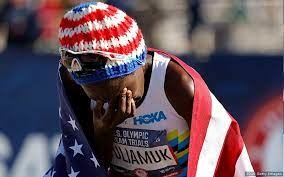
The women’s race is scheduled for Aug. 7, and the men will run on Aug. 8, the final day of Olympic competition.
Where will the Olympic marathon take place?
While the bulk of the Olympic competition takes place in Tokyo, the marathon races will be staged in Sapporo, which is located 500 miles north of the host city. Local Olympic organizers were eager to keep the race in Tokyo, but the International Olympic Committee pushed to relocate both marathons and the racewalking events in October 2019 due to concerns about high temperatures in Tokyo.
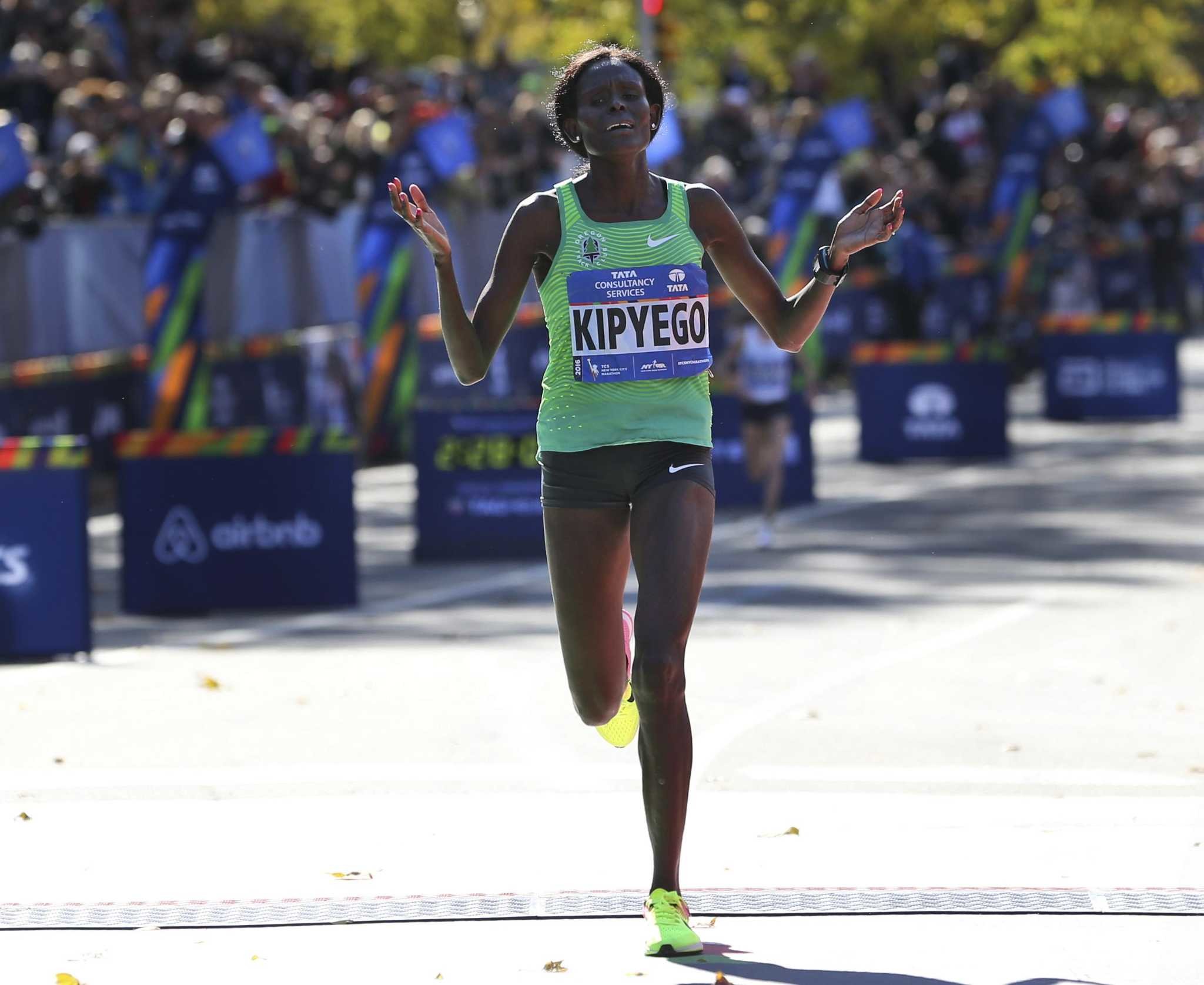
Who will represent the United States in marathon?
The United States staged its Olympic trials in February 2020, so the top American runners have had nearly one and a half years to prepare for the Sapporo course.
Galen Rupp, 35, was the top men’s qualifier, posting a first-place time of 2 hours 9 minutes 20 seconds at trials and earning a spot in his fourth Olympic Games. Rupp won silver in the men’s 10,000 meters at the 2012 Games before tackling the marathon four years later. He took bronze in the 2016 Olympic marathon with a time of 2:10:05, even though it was only the second time in his life that he tackled a 26.2-mile course.
He’ll be joined in Tokyo by fellow Americans Jake Riley and Abdi Abdirahman. Riley, 32, was 42 seconds behind Rupp at trials and was also the top American finisher at the 2019 Chicago Marathon. The Somali-born Abdirahman will be competing in his fifth Olympics and at 44 years old will be the oldest American runner to ever compete in a Summer Games.
Kenyan-born Aliphine Tuliamuk won the women’s marathon trials with a time of 2:27:23, and will be making her Olympic debut at age 32. Before the Tokyo Games were postponed due to covid-19, Tuliamuk had planned on starting a family immediately following the 2020 Olympics. The year-long delay changed her timeline and she gave birth to her daughter, Zoe, in January.
She’ll be joined at trials by Molly Seidel, who finished the trials just eight seconds behind Tuliamuk, and Sally Kipyego. The 27-year old Seidel will be making her Olympic debut. She was also the second American woman finisher at the 2020 London Marathon.
Kipyego, 35, is a decorated long-distance runner who will be competing in her second Olympics. Running for her native Kenya in 2012, she took silver in the 10,000-meter race.
by Rick Maese
Login to leave a comment
Tokyo 2020 Olympic Games
Fifty-six years after having organized the Olympic Games, the Japanese capital will be hosting a Summer edition for the second time, originally scheduled from July 24 to August 9, 2020, the games were postponed due to coronavirus outbreak, the postponed Tokyo Olympics will be held from July 23 to August 8 in 2021, according to the International Olympic Committee decision. ...
more...US marathoner Aliphine Tuliamuk infant daughter will be able to join her in Tokyo for the Olympics
U.S. long-distance runner Aliphine Tuliamuk announced Tuesday that her infant daughter was granted a visa and will be allowed to travel with her to Tokyo for the Olympics.
"The last 6 months with you baby Zoe have been the best ones of our lives, your dad and I are so blessed to get to watch you grow and teach you everything we know about this world," Tuliamuk wrote on Instagram. "And now we are beyond excited that you get to come to Japan and cheer on your mama as she goes after her biggest running goals, ZOE’s VISA ARRIVED TODAY!"
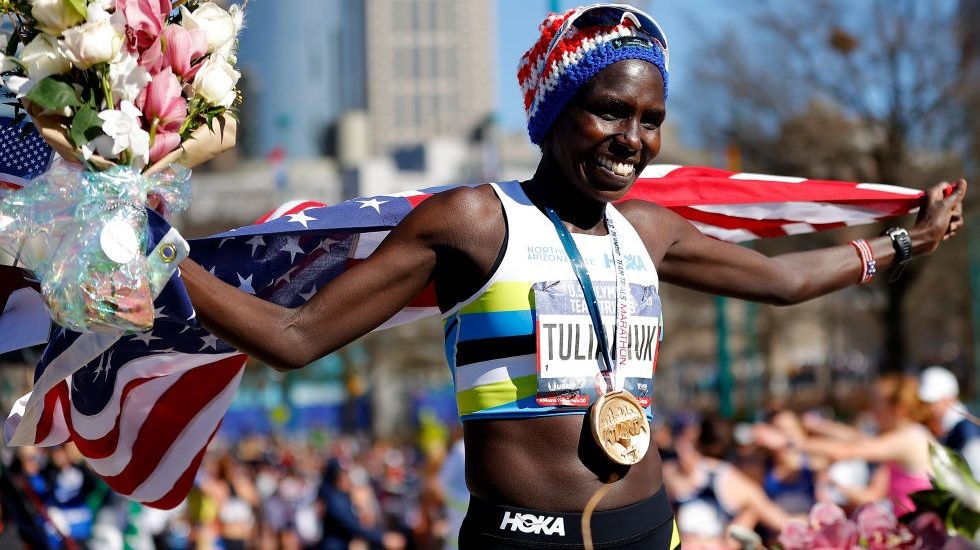
Her elation comes after the IOC's decision to allow Olympians to bring their infants who are still breastfeeding. Originally, all foreign spectators, including family members, were banned from the Olympics due to concerns over COVID-19 in Japan, but the decision was changed in June.
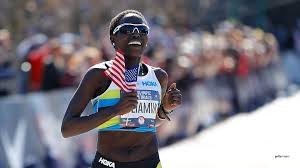
Tuliamuk, 32, won the 2020 Olympic marathon trials and is set to compete in Sapporo (where the marathon will be for the Summer Games) on Aug. 7.
Tuliamuk and several other Olympians who are mothers told The Washington Post in May that they were extremely concerned at the thought of having to make a choice between the Olympics and their children. This thought was especially scary for Tuliamuk, who may have the youngest child of all the U.S. Olympians.
“If I’m going to perform my best, she’s going to have to be there with me—and I hope she will be," Tuliamuk said. "I am still nursing Zoe and cannot imagine her not being with me."
Thankfully, she will not have to make that decision.
Aliphine Chepkerker Tuliamuk is a Kenyan-born American long distance runner. She placed first at the Women's 2020 Olympic Marathon trials in Atlanta, GA on February 29, 2020 with a time of 2:27:23 and will be representing the United States at the 2021 Olympic Games in Tokyo, Japan. She won $80,000.
by Joseph Salvador
Login to leave a comment
Tokyo 2020 Olympic Games
Fifty-six years after having organized the Olympic Games, the Japanese capital will be hosting a Summer edition for the second time, originally scheduled from July 24 to August 9, 2020, the games were postponed due to coronavirus outbreak, the postponed Tokyo Olympics will be held from July 23 to August 8 in 2021, according to the International Olympic Committee decision. ...
more...130 athletes named on the team to represent the United States at the Tokyo Olympic Games
World outdoor record-holders Sydney McLaughlin, Ryan Crouser and Keni Harrison are among the 130 athletes named on the team to represent the United States at the Tokyo Olympic Games.
The squad includes 13 medalists from the 2016 Games in Rio and six defending world champions from Doha. Experienced headliners include five-time Olympians Allyson Felix in the 400m and Abdi Abdirahman in the marathon, while the youngest athlete on the team is 17-year-old Erriyon Knighton, who twice broke the world U20 200m record last month at the US Olympic Trials.
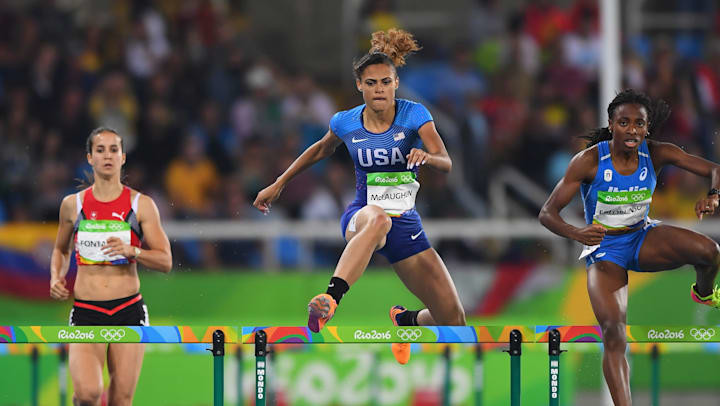
JuVaughn Harrison won both the long jump and high jump at the Trials in Eugene and he will be among the athletes contesting two events in Tokyo as he has been selected for both disciplines.
Other athletes announced on the team include world indoor 60m hurdles record-holder Grant Holloway, who was just 0.01 shy of breaking Aries Merritt’s world 110m hurdles record of 12.80 in Eugene, plus former world 400m hurdles record-holder Dalilah Muhammad, the second-fastest ever 200m sprinter Gabby Thomas and multiple global long jump gold medalist Brittney Reese.
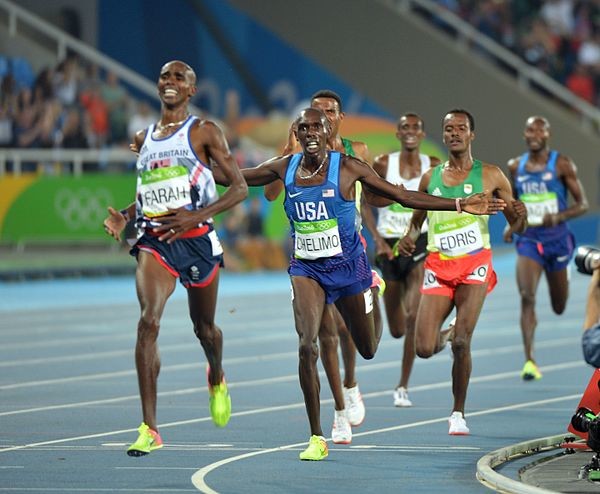
USA team for Tokyo
WOMEN
100m: Teahna Daniels, Javianne Oliver, Jenna Prandini
200m: Anavia Battle, Jenna Prandini, Gabby Thomas
400m: Allyson Felix, Quanera Hayes, Wadeline Jonathas
800m: Athing Mu, Raevyn Rogers, Ajee' Wilson
1500m: Heather MacLean, Cory McGee, Elle Purrier
5000m: Elise Cranny, Rachel Schneider, Karissa Schweizer
10,000m: Alicia Monson, Karissa Schweizer, Emily Sisson
Marathon: Sally Kipyego, Molly Seidel, Aliphine Tuliamuk
3000m steeplechase: Emma Coburn, Val Constien, Courtney Frerichs
100m hurdles: Christina Clemons, Gabbi Cunningham, Keni Harrison
400m hurdles: Anna Cockrell, Sydney McLaughlin, Dalilah Muhammad
20km race walk: Robyn Stevens
High jump: Tynita Butts-Townsend, Vashti Cunningham, Rachel McCoy
Pole vault: Morgann LeLeux, Katie Nageotte, Sandi Morris
Long jump: Quanesha Burks, Tara Davis, Brittney Reese
Triple jump: Tori Franklin, Jasmine Moore, Keturah Orji
Shot put: Adelaide Aquilla, Jessica Ramsey, Raven Saunders
Discus: Valarie Allman, Kelsey Card, Rachel Dincoff
Hammer: Brooke Andersen, Gwen Berry, DeAnna Price
Javelin: Ariana Ince, Maggie Malone, Kara Winger
Heptathlon: Erica Bougard, Annie Kunz, Kendell Williams
4x100m: English Gardner, Aleia Hobbs, Gabby Thomas (plus others selected in individual events)
4x400m: Kendall Ellis, Lynna Irby, Kaylin Whitney (plus others selected in individual events)
MEN
100m: Ronnie Baker, Trayvon Bromell, Fred Kerley
200m: Kenny Bednarek, Erriyon Knighton, Noah Lyles
400m: Michael Cherry, Michael Norman, Randolph Ross
800m: Bryce Hoppel, Isaiah Jewett, Clayton Murphy
1500m: Matthew Centrowitz, Cole Hocker, Yared Nuguse
5000m: Paul Chelimo, Grant Fisher, Woody Kincaid
10,000m: Grant Fisher, Woody Kincaid, Joe Klecker
Marathon: Abdi Abdirahman, Jake Riley, Galen Rupp
3000m steeplechase: Hillary Bor, Mason Ferlic, Benard Keter
110m hurdles: Devon Allen, Grant Holloway, Daniel Roberts
400m hurdles: Rai Benjamin, David Kendziera, Kenny Selmon
20km race walk: Nick Christie
High jump: JuVaughn Harrison, Shelby McEwen, Darryl Sullivan
Pole vault: Sam Kendricks, KC Lightfoot, Chris Nilsen
Long jump: Marquis Dendy, JuVaughn Harrison, Steffin McCarter
Triple jump: Chris Benard, Will Claye, Donald Scott
Shot put: Ryan Crouser, Joe Kovacs, Payton Otterdahl
Discus: Mason Finley, Reggie Jagers, Sam Mattis
Hammer: Daniel Haugh, Rudy Winkler, Alex Young
Javelin: Michael Shuey, Curtis Thompson
Decathlon: Steven Bastien, Garrett Scantling, Zach Ziemek
4x100m: Kenny Bednarek, Cravon Gillespie, Micah Williams (plus others selected in individual events)
4x400m: Elija Godwin, Vernon Norwood, Trevor Stewart (plus others selected in individual events)
MIXED
4x400m: Shae Anderson, Bryce Deadmon, Wil London, Taylor Manson (plus others selected in individual events).
by World Athletics
Login to leave a comment
Tokyo 2020 Olympic Games
Fifty-six years after having organized the Olympic Games, the Japanese capital will be hosting a Summer edition for the second time, originally scheduled from July 24 to August 9, 2020, the games were postponed due to coronavirus outbreak, the postponed Tokyo Olympics will be held from July 23 to August 8 in 2021, according to the International Olympic Committee decision. ...
more...Sara Hall and Sam Chelanga Take USA 10K Titles At the 52nd AJC Peachtree Road Race
Just after the sun rose in Atlanta on an unusually cool July morning, Sara Hall (Asics) and Sam Chelanga (U.S. Army) claimed the USA Track & Field 10-K road running titles at the 51st AJC Peachtree Road race in 31:41 and 28:43, respectively. Both athletes prevailed in late-race battles and each claimed $7,500 in prize money. The race was the third stop of the 2021 USATF Running Circuit.
The women started ahead of the men, and Hall was part of a 15-strong lead pack which quickly formed in the first kilometer. With her were other pre-race favorites, like Steph Bruce and Aliphine Tuliamuk (both of Hoka Northern Arizona Elite) and Gwen Jorgensen of the Nike Bowerman Track Club. But, there were also two less established runners in the lead group, Annie Frisbie and Emily Durgin (adidas).
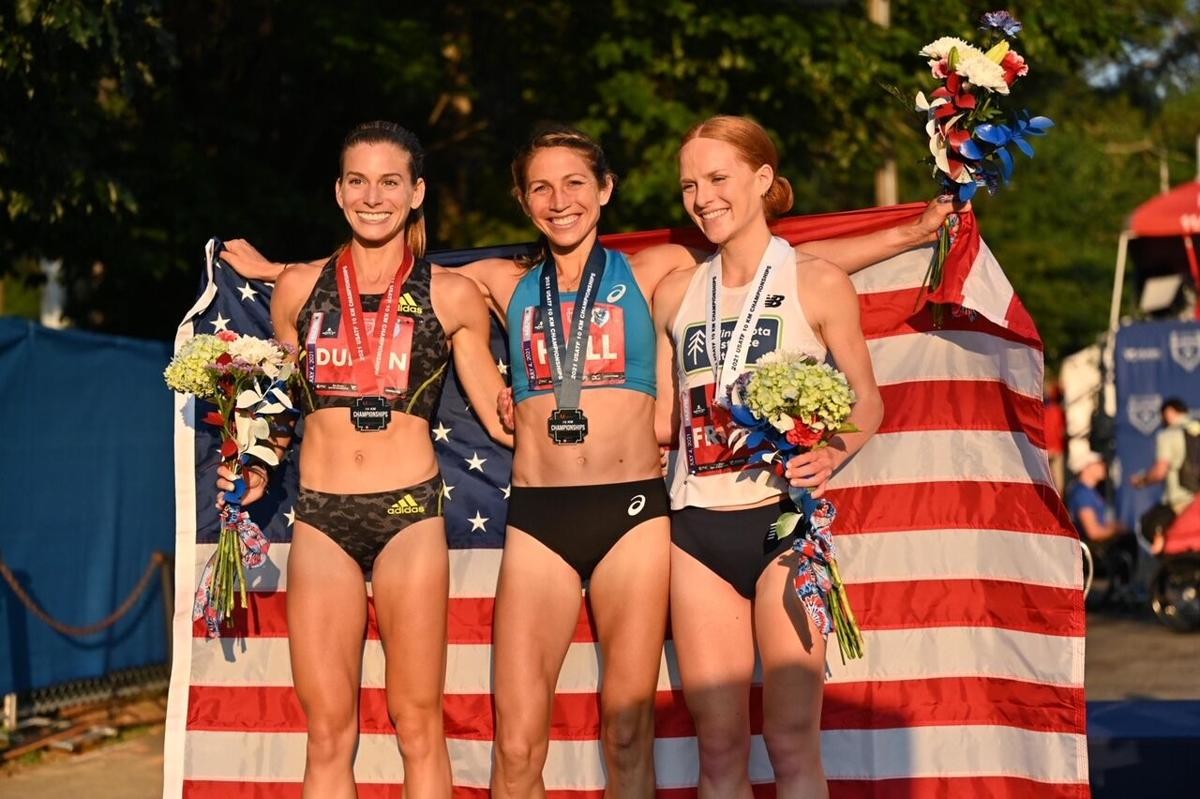
Durgin, 27, who finished ninth in the 10,000m at the USA Olympic Team Trials – Track & Field in Eugene, Ore., eight days ago, led the race through 5 kilometers in an honest 15:46. Hall remained with her as did Frisbie and Tuliamuk, but Bruce and Diane Nukuri (Asics) began to drift back. Durgin kept pressing, and 90 seconds later only Durgin, Hall and Frisbie remained in contention.
Hall, 38, who prior to today had won 10 national road running titles from the mile to the marathon, wasn’t surprised that it was Durgin who was pushing the pace. Both women live and train in Flagstaff, Ariz., and know each other well.
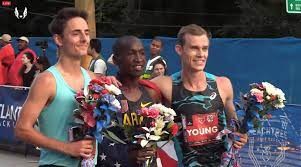
“She’s been running so strong this year,” Hall told Race Results Weekly by telephone. “At the Trials she had a great one. So, I didn’t really know who would be charging out there.”
At about the 7-kilometer mark Hall and Durgin increased the pace, and Frisbie (who is only 24) had to drop back. The two women spent most of the next three kilometers running side by side waiting for the right moment surge for the finish line. As she did at the Mastercard New York Mini 10-K on June 12, Hall finally showed her cards in the final 400 meters. She pulled away strongly from Durgin to win by eight seconds.
“That’s the first time I’ve kind of gone toe-to-toe with her in a race,” Hall said of Durgin. “She’s got a great future ahead of her. I’m excited to see what she does.” She added: “I’m really proud of her.”
Durgin set a personal best of 31:49, as did Frisbie in third (32:06). Nukuri rallied in the last two kilometers to finish fourth in 32:27, and Bruce (who won this race in 2018) got fifth in 32:35. Tuliamuk, the 2020 Olympic Trials Marathon winner, finished sixth in 32:43.
For Hall, today’s win lifted her spirits after she finished sixth at the Olympic Trials in the 10,000m, likely her final attempt at making an Olympic team on the track. She also felt like she got some payback for a bad race at the 2020 Olympic Trials Marathon, also held in Atlanta, where she was unable to finish.
“You know, I was wanting to kind of get through the hills,” Hall said of the middle portion of today’s race. “Obviously, these Atlanta hills crushed me in the Trials. So, I definitely wanted to have a strong run over those hills.” She continued: “Going into this race I just wanted to have fun out there… This was an opportunity for me to just to out there and enjoy racing.”
For Chelanga, today’s win was his first USA title since he won the 25-K crown in May, 2018, just before he said he was hanging up his racing flats.
“I had announced that I had retired after July 4th of 2018,” Chelanga said in his post-race television interview. “Then when I got back in the Army, people noticed in the physical test that I was really fast, and I ran the 10-miler for the Army team (October, 2019). So I did it. Long story, but now I’m back here.”
by LetsRun
Login to leave a comment
AJC Peachtree Road Race
The AJC Peachtree Road Race, organized by the Atlanta Track Club, is the largest 10K in the world. In its 48th running, the AJC Peachtree Road Race has become a Fourth of July tradition for thousands of people throughout the metro Atlanta area and beyond. Come kick off your Fourth of July festivities with us! If you did not get...
more...Galen Rupp and Aliphine Tuliamuk will tune up Sunday’s USATF 10 km Championships
U.S. Olympic Team Trials – Marathon winners Galen Rupp and Aliphine Tuliamuk headline Sunday’s USATF 10 km Championships presented by Toyota, as both athletes eye winning another U.S. title, while tuning up for the Olympic Games in Tokyo, which get underway later this month.The USATF 10 km Championships, hosted by the Atlanta Journal-Constitution Peachtree Road Race are the third stop on the 2021 USATF Running Circuit presented by Toyota.
Sunday’s contest in Atlanta offers Rupp, along with fellow Olympic qualifiers Jacob Riley and Abdi Abdirahman, a chance to test their fitness before departing for Tokyo. Rupp is coming off a strong sixth place finish at the U.S. Olympic Team Trials – Track and Field in the 10,000m, where he contended for a top three finish for much of the race. Rupp is in fine form and comes to Atlanta as the pre-race favorite.For Riley and Abdirahman, both of whom have had very quiet 2021 seasons, Sunday is even more important to get a quality racing effort before their marathon race in Tokyo on August 8.
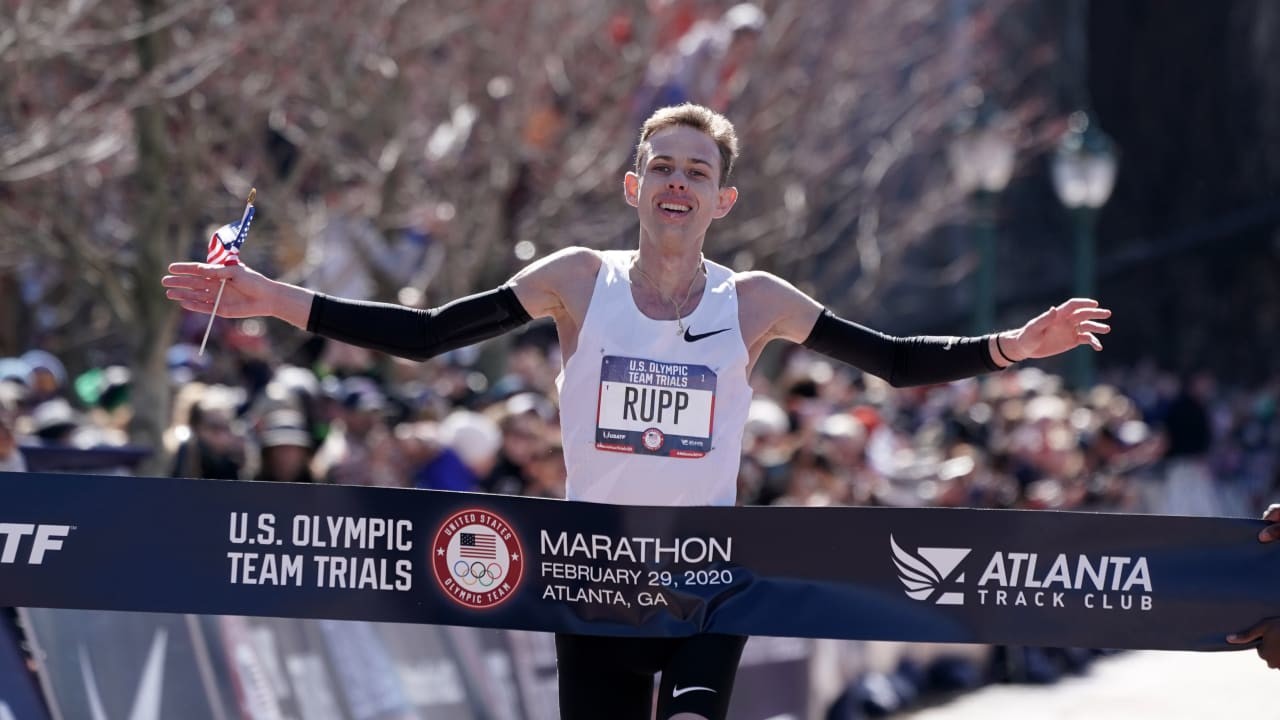
While both are strongest over the marathon distance, a top five finish for either athlete is not out of the question in Atlanta.While Rupp enters as the pre-race favorite, Clayton Young is having a strong 2021 campaign. Young currently leads the USATF Running Circuit standings with 18 points, having won the USATF 15 km Championships, his first USATF title, back in March. Young followed up the winning effort with an eighth place showing at the USATF 1 Mile Road Championships in Des Moines.Veterans Colin Bennie and Sam Chelanga are also top three contenders.
Bennie, who placed sixth at the USATF 15 km Championships and ninth in Atlanta last year at the U.S. Olympic Team Trials – Marathon, seems ready to challenge for his first USATF title, while Chelanga is in fine form coming off an eighth place showing in the 10,000m at the U.S. Olympic Team Trials – Track and Field in Eugene.Other notable entries include 2016 Olympian Jared Ward, 2020 U.S. Olympic Team Trials – Marathon fifth place finisher Augustus Maiyo, 2018 USATF 10 km Championship runner-up Haron Lagat, and veteran Elkanah Kibet.
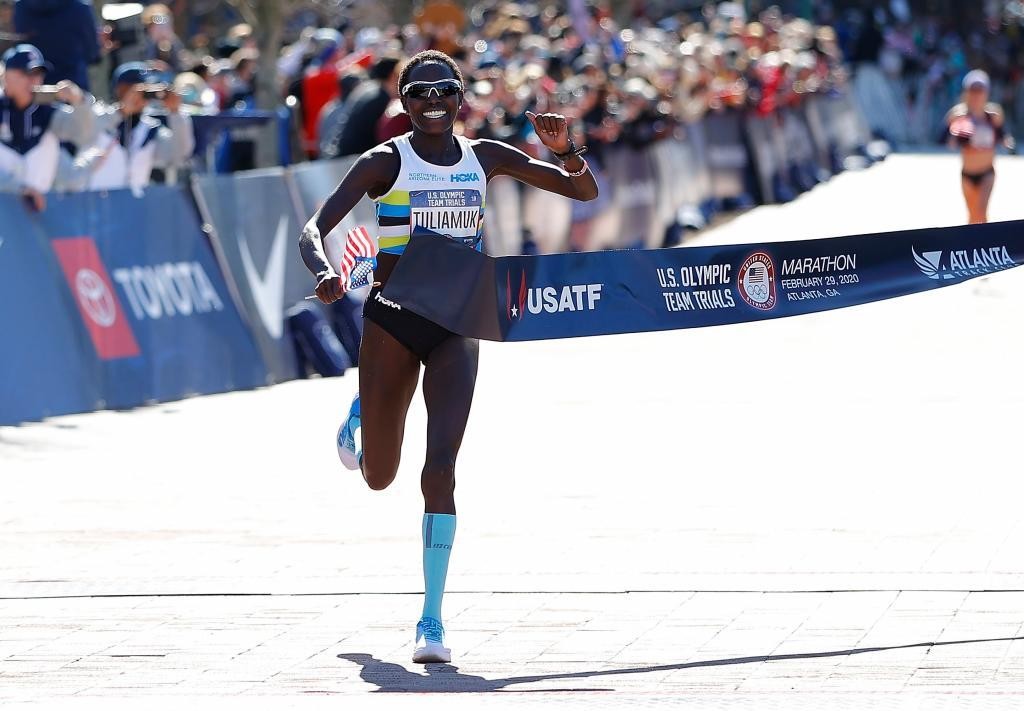
On the women’s side, Tuliamuk is entered and ready to run her first race since she qualified for the Olympic Games in February 2020. Tuliamuk, who became a mother back in mid-January, is in fine form and ready to show she’s primed for Tokyo.Tuliamuk’s top competition should come from Sara Hall. The ten-time USATF champion finished third at the USATF 10 km Championships in 2018.
This year, she’s coming off a tremendous sixth place effort in Eugene at the U.S. Olympic Team Trials – Track and Field. Hall is arguably the most versatile American distance runners, a title contender at almost any distance, and Sunday she should be at the front pushing the pace once again.Stephanie Bruce, who won the 2018 USATF 10 km Championship title, looks to add another national title to her resume.
The Flagstaff-based runner placed 13th in the 10,000m at the U.S. Olympic Team Trials – Track and Field, while also having run 1:09:55 for a half marathon win back in late-April.
Not to be overlooked, Emily Durgin is having a tremendous season. Durgin placed third at the USATF 15 km Championships earlier this season and sits a mere five points behind USATF Running Circuit overall leaders Emily Sisson and Rachel Schneider. Durgin placed ninth in the 10,000m at the U.S. Olympic Team Trials – Track and Field last month, in addition to a 1:09:47 third place effort in a half marathon in late-January.
Diane Nukuri is showing fine form this season, coming off a tenth place finish at the USATF 15 km Championships, while Allie Kieffer finished fourth at the 2018 USATF 10 km Championships and is a seasoned veteran capable of a top five finish.
Add Maegan Krifchin, Joanna Thompson, Whitney Macon, and Bridget Lyons Belyeu to the mix and this race has both talent and depth, which should make for a thrilling morning of racing in Atlanta on Sunday.
by Usaft
Login to leave a comment
Breastfeeding mothers will be allowed to bring their children to the Olympics
The International Olympic Committee (IOC) announced Wednesday morning that breastfeeding mothers will now be allowed to bring their babies to the Tokyo Olympics. This is a huge relief to several athletes who are mothers, who before this change would have been forced to choose between not competing, or leaving their infant children at home.
Among these relieved athletes is Aliphine Tuliamuk, winner of the U.S. Olympic marathon trials. In May, Tuliamuk petitioned the Olympic organizing committee to allow her to bring her four-month-old daughter Zoe to the Games, but had not received word on the decision.
At the time, she had not given an ultimatum but was still unsure of what she would do. With the IOC’s announcement today, she no longer has to make the difficult choice.
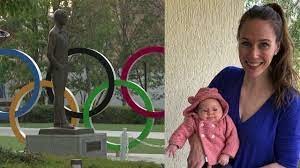
“We very much welcome the fact that so many mothers are able to continue to compete at the highest level, including at the Olympic Games,” the IOC said in a statement. “We are very pleased to hear that the Tokyo 2020 organizing Committee has found a special solution regarding the entry to Japan for mothers who are breastfeeding and their young children.”
Previously, organizers had barred all international spectators, including athletes’ families, which included their children. Several athletes have spoken out about the issues facing mothers, particularly those who are breastfeeding, including nine-time Olympic medallist, Allyson Felix, who recently qualified for her 5th Games. “I would be most sensitive to moms who are breastfeeding,” she said. “I know for me, when I competed when Cammy was under a year old — you need to be near your child.”
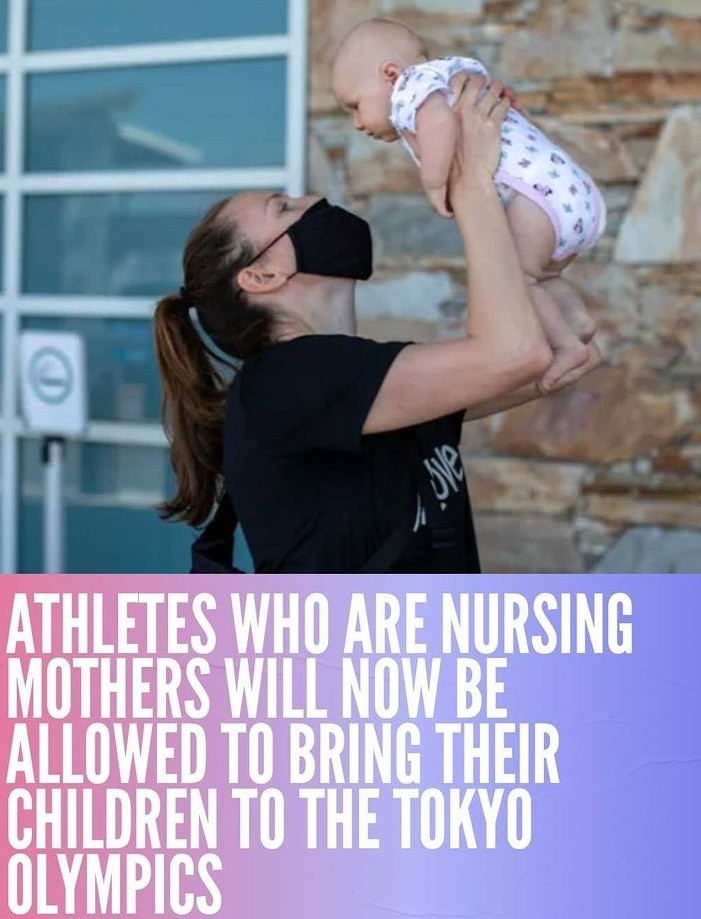
The organizers have now eased the restrictions, so women in this situation do not have to make such a difficult choice.
“Given that the Tokyo 2020 Games will take place during a pandemic, overall we must unfortunately decline to permit athletes’ family members or other companions to accompany them to the Games,” organizers said. “However, after careful consideration of the unique situation facing athletes with nursing children, we are pleased to confirm that, when necessary, nursing children will be able to accompany athletes to Japan.”
According to Reuters, these children will be staying in approved hotels outside of the Olympic Village because that area is under strict restrictions due to the ongoing pandemic. Only athletes and Olympic officials will be permitted to enter that residential area.
by Brittany Hambleton
Login to leave a comment
Tokyo 2020 Olympic Games
Fifty-six years after having organized the Olympic Games, the Japanese capital will be hosting a Summer edition for the second time, originally scheduled from July 24 to August 9, 2020, the games were postponed due to coronavirus outbreak, the postponed Tokyo Olympics will be held from July 23 to August 8 in 2021, according to the International Olympic Committee decision. ...
more...The U.S. Track and Field Athletes Who Qualified for 2021 Olympics
The team representing the U.S. in Tokyo is a mix of veterans and first-timers.
The U.S. Olympic Track and Field Trials are taking place at Hayward Field in Eugene, Oregon, from June 18 through June 27, and the top three finishers in each event will represent the United States at the Olympic Games in Tokyo. Here’s a list of those who have already qualified and have met the Tokyo Olympic Standard.
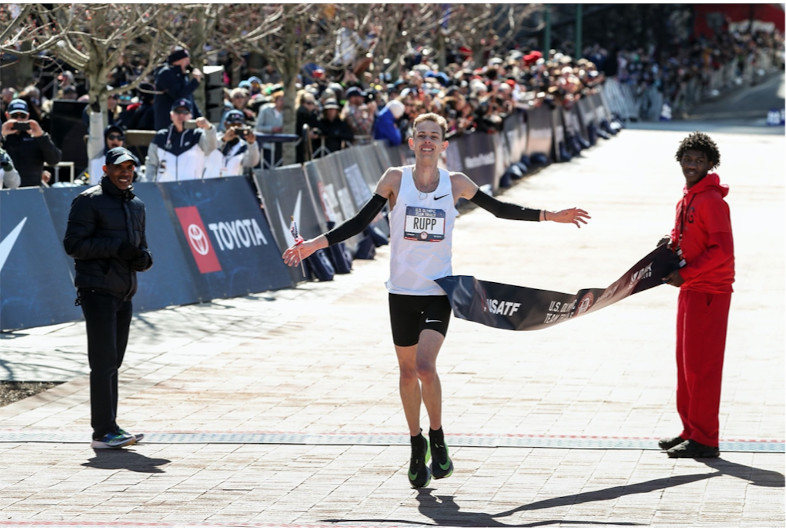
Aliphine Tuliamuk — Women’s Marathon
Qualified: First in 2:27:23
Olympic history: This will be Tuliamuk’s first Olympic appearance.
Molly Seidel — Women’s Marathon
Qualified: Second in 2:27:31
Olympic History: This will be Seidel’s first Olympic appearance.
Sally Kipyego — Women’s Marathon
Qualified: Third in 2:28:52
Olympic History: 2012 — Silver medal in the 5,000 meters.
Galen Rupp — Men’s Marathon
Qualified: First in 2:09:20
Olympic history: 2016 — Bronze medal in the marathon, fifth in 10,000 meters; 2012 — silver medal in 10,000 meters, seventh in 5,000 meters; 2008 — 13th in 10,000 meters.
Jake Riley — Men’s Marathon
Qualified: Second in 2:10:02

Olympic history: This will be Riley’s first Olympic appearance.
Abdi Abdirahman — Men’s Marathon
Qualified: Third in 2:10:03

Olympic history: 2012 — DNF in marathon; 2008 — 15th in 10,000 meters; 2004 — 15th in 10,000 meters; 2000 — 10th in 10,000 meters.
by Runner’s World
Login to leave a comment
What to Watch For in the U.S.A. Track & Field Olympic Trials
For months, they have trained in relative isolation. They have triple jumped in empty stadiums and chased qualifying standards on high school tracks. You may have heard this before, but the pandemic created challenges for American track and field athletes.
For those who managed to push through the long delay, a meet five years in the making has finally arrived: The U.S. Olympic track and field trials are set to start on Friday afternoon at the University of Oregon’s Hayward Field, a freshly renovated stadium that — barring something else unforeseen — will also host the world championships next year.
But first come the trials. As athletes from across the country bid to compete at the Tokyo Games this summer, here is a look at what to watch over the coming days:
What’s the schedule?
Glad you asked. It is a long meet — 10 days, with two rest days built in the middle — running from Friday through June 27. There are 40 events in all (20 for the women, 20 for the men), with preliminary rounds for most of them. On Friday, for example, there are preliminary rounds in events ranging from the women’s discus to the men’s 800 meters. There are also two finals scheduled for the first day, in the men’s shot put and the men’s 10,000. On Sunday, eight more champions will be crowned, including in the men’s 100. (More on that later.)
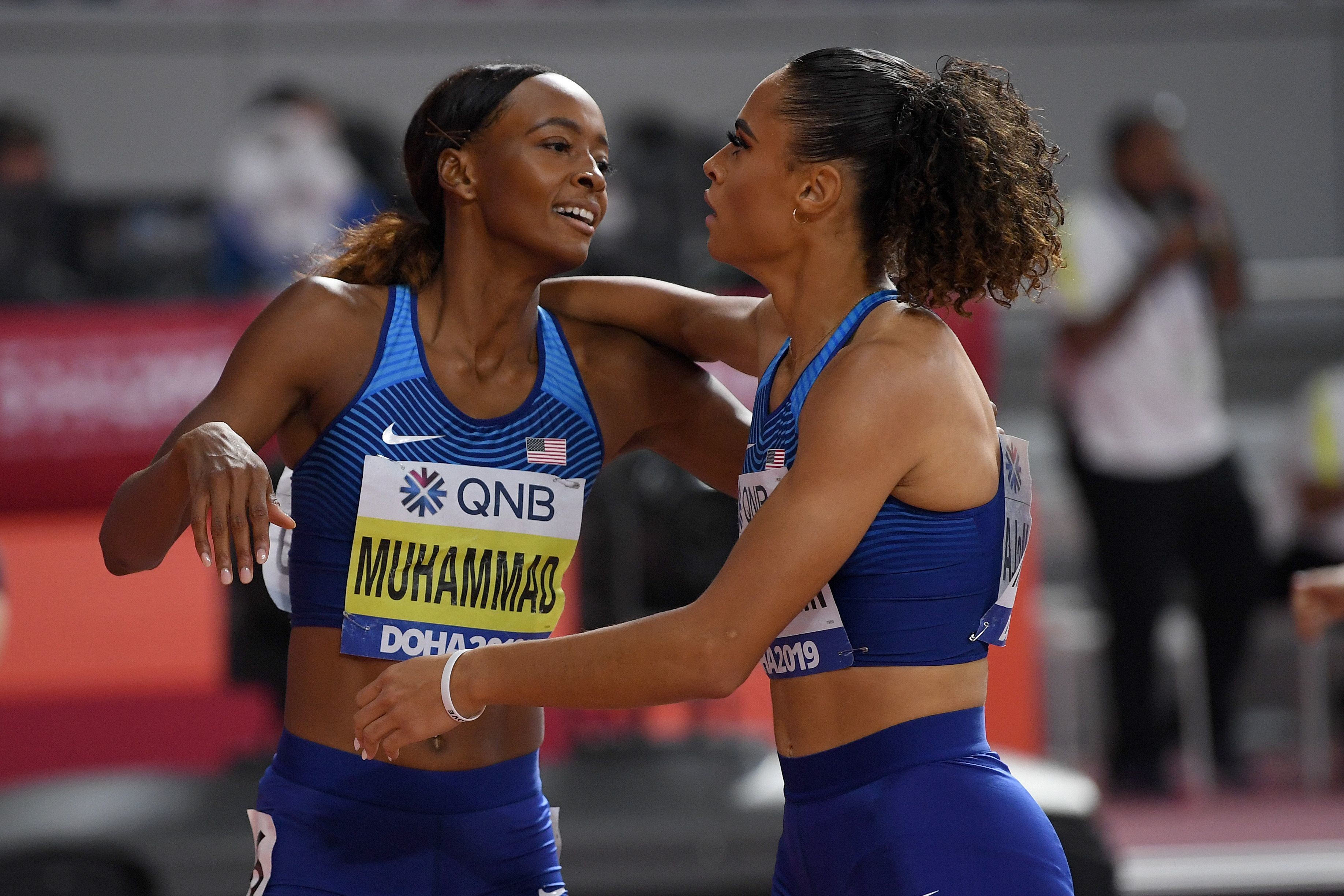
So who gets to go to the Olympics?
The top three finishers in each event qualify, provided they have reached the Olympic standard. If not, they have until July 1 to attain it.
Who are some of the most compelling athletes to watch?
Any list like this has to start with Allyson Felix, the nine-time Olympic medalist who is aiming to compete in her fifth and final Olympic Games. A onetime prodigy who is entered in the 200 and 400 meters, Felix, 35, long ago secured her place as one of the sport’s most revered and respected figures. She has advocated for gender equality since giving birth to her first child in 2018.
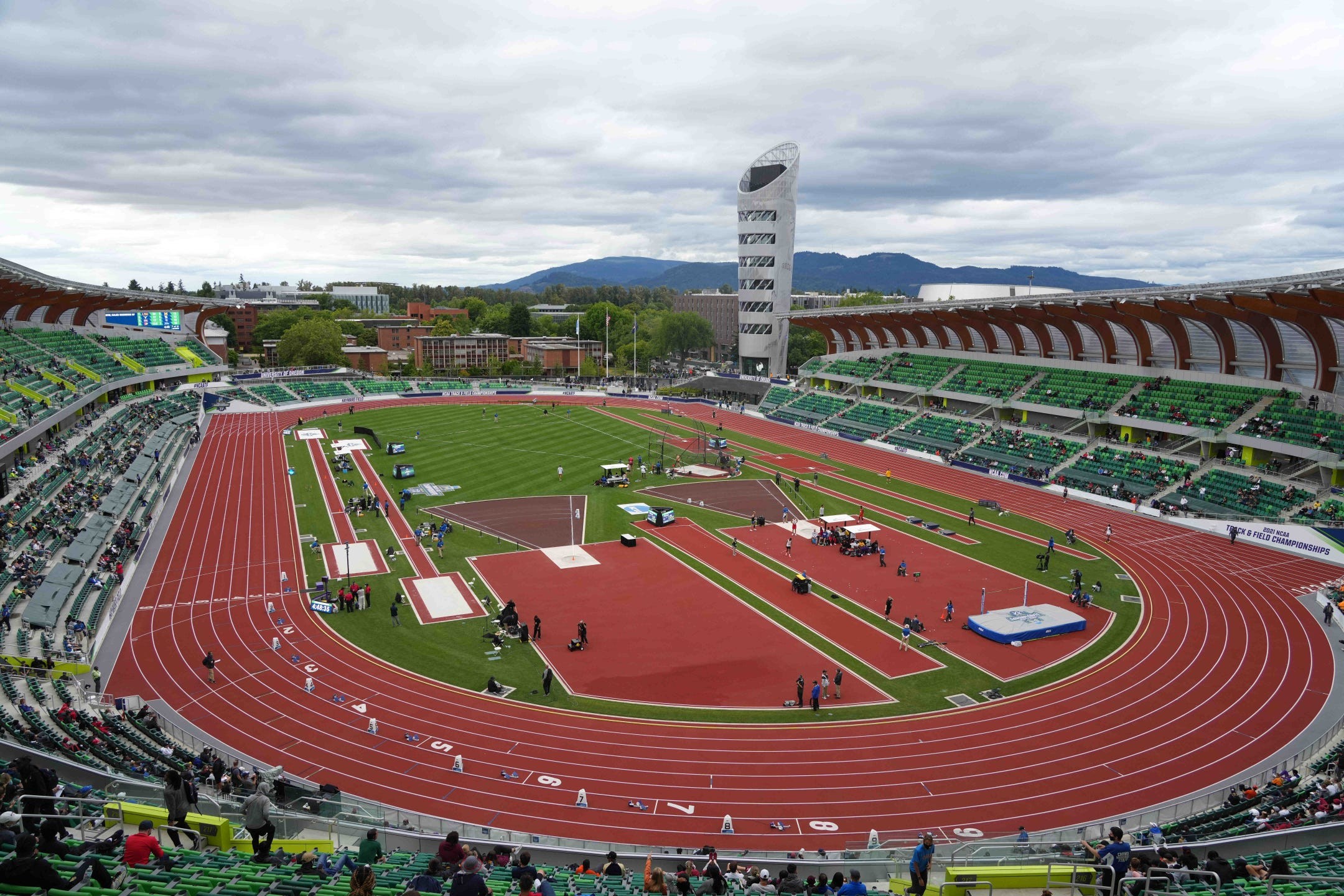
Felix’s retirement will leave a void among the American women, and Sha’Carri Richardsonseems prepared to help fill it. In April, she ran the sixth-fastest 100 in history. Richardson, just 21, is unapologetically brash while consistently coming through with fast times and big performances. She is easy to spot, too: Just look for her colorful hair.
In the women’s 1,500 meters, Elle Purrier St. Pierre is the favorite after a string of convincing victories this season. She grew up on a dairy farm in Vermont, where she would train by running to the Quebec border and back. Her sponsors include Cabot Cheese.
Donavan Brazier is the American record-holder and reigning world champion in the men’s 800. He seems determined after failing to qualify for the Olympics in 2016.
And Sam Kendricks, who has won back-to-back world men’s pole vault championships, is the heavy favorite in Oregon. His toughest competition figures to be in Tokyo, where Mondo Duplantis, who grew up in Louisianabut competes for Sweden, will be waiting. Duplantis, 21, already owns the world record but is seeking his first Olympic gold.
How about a few must-see events?
No, we didn’t forget about Noah Lyles, the world champion in the men’s 200 meters. Lyles wants to double in the 100 and 200 meters in Tokyo, and his 100-meter form has been coming along slowly. He will face a loaded 100-meter field in Eugene, Ore., headlined by the likes of Trayvon Bromell, who has run the fastest time in the world this year, and Justin Gatlin, the five-time Olympic medalist who has twice been suspended for doping. Americans have the six fastest 100-meter times in the world this year — and Lyles is not among them.
The field in the men’s 1,500 is also competitive. Matthew Centrowitz, the 2016 Olympic champion, was injured last year and benefited from the postponement. Craig Engels is the 2019 national champion, but he is equally renowned for his mullet. There is also a group of up-and-comers headlined by Cole Hocker, fresh off an N.C.A.A. title at Oregon, and Hobbs Kessler, the fastest high school miler ever.
The most anticipated showdown, though, could materialize in the women’s 400-meter hurdles. At the 2019 world championships, Dalilah Muhammad, 31, had to break her own world record to outrun Sydney McLaughlin, one of the sport’s rising stars. Muhammad, the Olympic champion in Rio, has been working in recent weeks to return to form after injuring her hamstring. McLaughlin, 21, spent much of the spring fine-tuning her speed and technique while competing in the 100-meter hurdles. If both athletes are healthy, their final — held on the final day of the meet — should be a highlight.
Who’s missing?
The trials got a harsh dose of reality this week when Shelby Houlihan, the American record-holder in the women’s 1,500 meters, was suspended from competing for four years after she had tested positive for an anabolic steroid. Houlihan has maintained her innocence, claiming she ate tainted pork from a food truck. For about eight hours Thursday, it seemed that Houlihan might still be able to run while she appealed the ban, but ultimately the U.S. Olympic & Paralympic Committee stepped in and said that she could not participate in the trials.
Speaking of suspensions, that deep field in the men’s 100 meters is missing an important name: Christian Coleman, who won the 2019 world championship under a cloud of suspicion, and was subsequently suspended for missing a series of drug tests.
Also absent will be Christian Taylor, the two-time Olympic champion in the men’s triple jump. Taylor ruptured his Achilles’ tendon at a meet last month and underwent surgery. He has vowed to make a comeback in time for next year’s world championships.
On the bright side, several American runners will not be at the trials — but only because they have already punched their tickets for Tokyo. We are referring, of course, to the marathoners, whose trials were staged all the way back in the prepandemic era, in February 2020. Galen Rupp, Jacob Riley and the seemingly ageless Abdi Abdirahman, 44,qualified for the men, while Aliphine Tuliamuk, Molly Seidel and Sally Kipyegomade the women’s team. (Rupp, a two-time Olympic medalist, is expected to compete in the 10,000 on Friday, though he told OregonLive.com last month that he would treat the race as a rigorous training run and appears to have no intention of running the track event in Tokyo.)
Is it on television?
NBC and NBCSN will provide live daily coverage of the meet.
by Scott Cacciola (NY Times)
Login to leave a comment
U.S. Olympic Marathon Trials winner, Tuliamuk Has Petitioned to Have Her Daughter Accompany Her to the Tokyo Olympics
Aliphine Tuliamuk, the winner of the U.S. Olympic Marathon Trials, has petitioned organizers of the Tokyo Olympics to allow her four-month old baby to come to the Games with her, according to The Washington Post.
Tuliamuk, who secured her Olympic berth on February 29, 2020, and her fiancé Tim Gannon were planning to start a family after the Summer Games. But when the Games were postponed because of the coronavirus pandemic, they moved their timeline up, and Tuliamuk gave birth to their daughter Zoe on January 13.
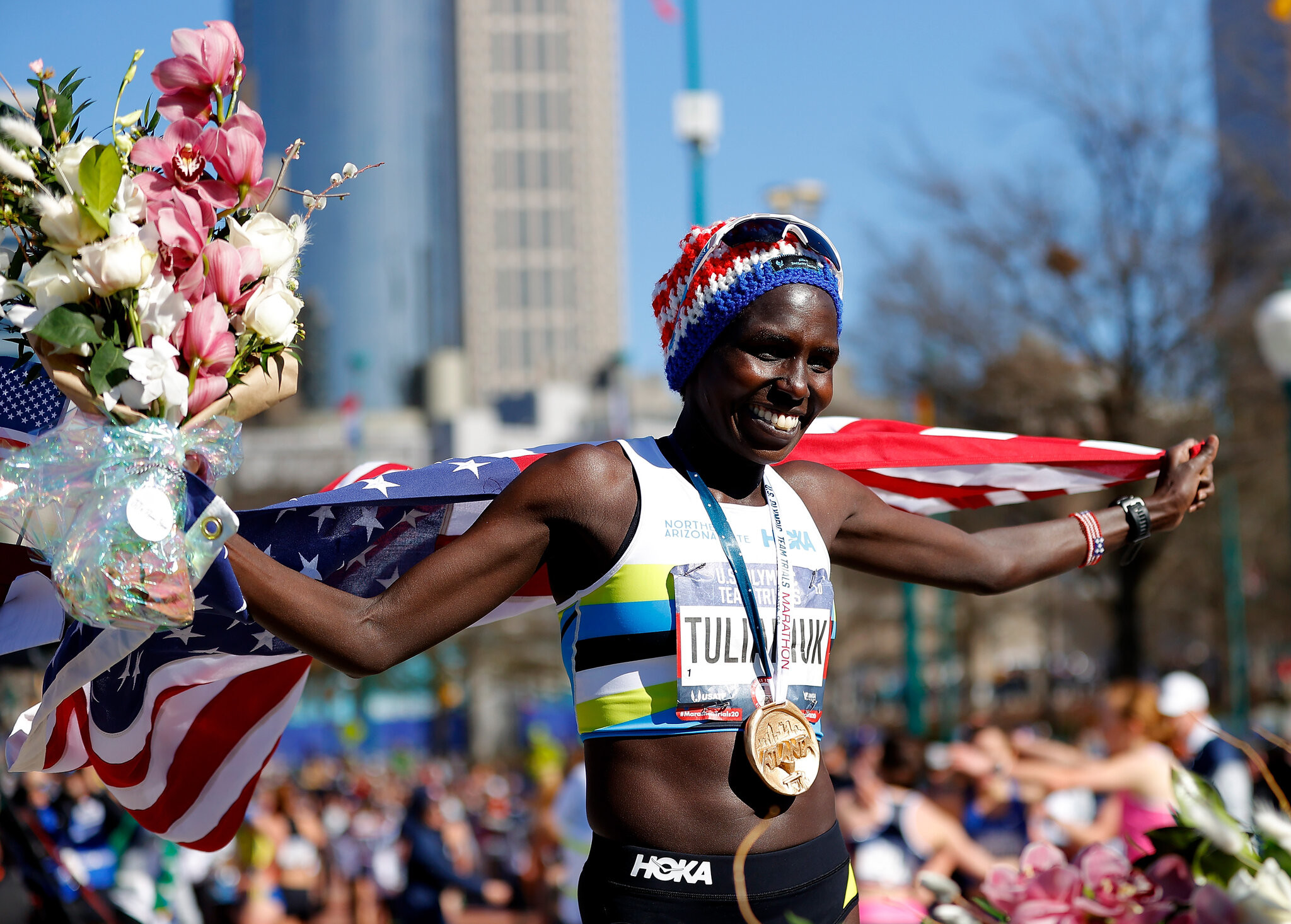
In March, the International Olympic Committee announced that no foreign spectators would be allowed at the Games in August. At the moment, this means that Zoe and Gannon wouldn’t be allowed to travel to the event.
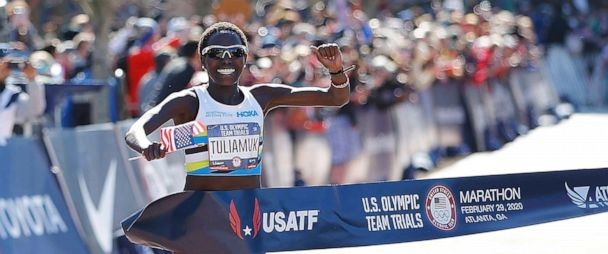
“If I’m going to perform my best, she’s going to have to be there with me—and I hope she will be,” Tuliamuk said to The Washington Post.
Tuliamuk added that Zoe is still breastfeeding and has spent very little time away from her.
In a statement to the Washington Post, the IOC said, “National Olympic Committees [NOCs] are responsible for the composition of their delegations at Games time and the IOC is aware that a small number of them have been dealing with requests from athletes to bring their children on a case-by-case basis.”
The way things are set up now, Team USA is allowed to being around 600 persons to the Games, which includes athletes, trainers, coaches, and more. If Zoe and Gannon attended, two people would have to be removed from the current roster, according to The Washington Post. No family or visitors are allowed to attend as the local government stipulations state.
The USOPC said in a statement to the Washington Post that it is handling the case, but not decision has been made yet.
Tuliamuk likely isn’t the only athlete in this situation. Other mothers in sports—such as tennis star Serena Williams, soccer star Alex Morgan, and nine-time Olympic medalist Allyson Felix—have raised similar concerns.
Tuliamuk will wait until a decision is rendered to decide what to do.
“I’m grateful to know everyone is working really hard to help make this work,” Tuliamuk said. “I’m just not ready to leave her behind.”
by Andrew Dawson
Login to leave a comment
Tokyo 2020 Olympic Games
Fifty-six years after having organized the Olympic Games, the Japanese capital will be hosting a Summer edition for the second time, originally scheduled from July 24 to August 9, 2020, the games were postponed due to coronavirus outbreak, the postponed Tokyo Olympics will be held from July 23 to August 8 in 2021, according to the International Olympic Committee decision. ...
more...

